|
| Presentation of credentials in the UN Office in Nairobi |
|
 20 March 2024 20 March 2024
Ambassador Danijela Čubrilo Martić presented credentials to the Director-General of the UN Office in Nairobi, Zainab Hawa Bangura, as the permanent representative of the Republic of Serbia to the UN Environment Programme (UNEP) and the UN Human Settlements Programme (UN-Habitat). The presentation of the credentials was followed by a discussion about Serbia's cooperation with the UN system in Nairobi. |
|
|
| Opening of the Serbian ethno corner in the Embassy of the Republic of Serbia in Nairobi |
|
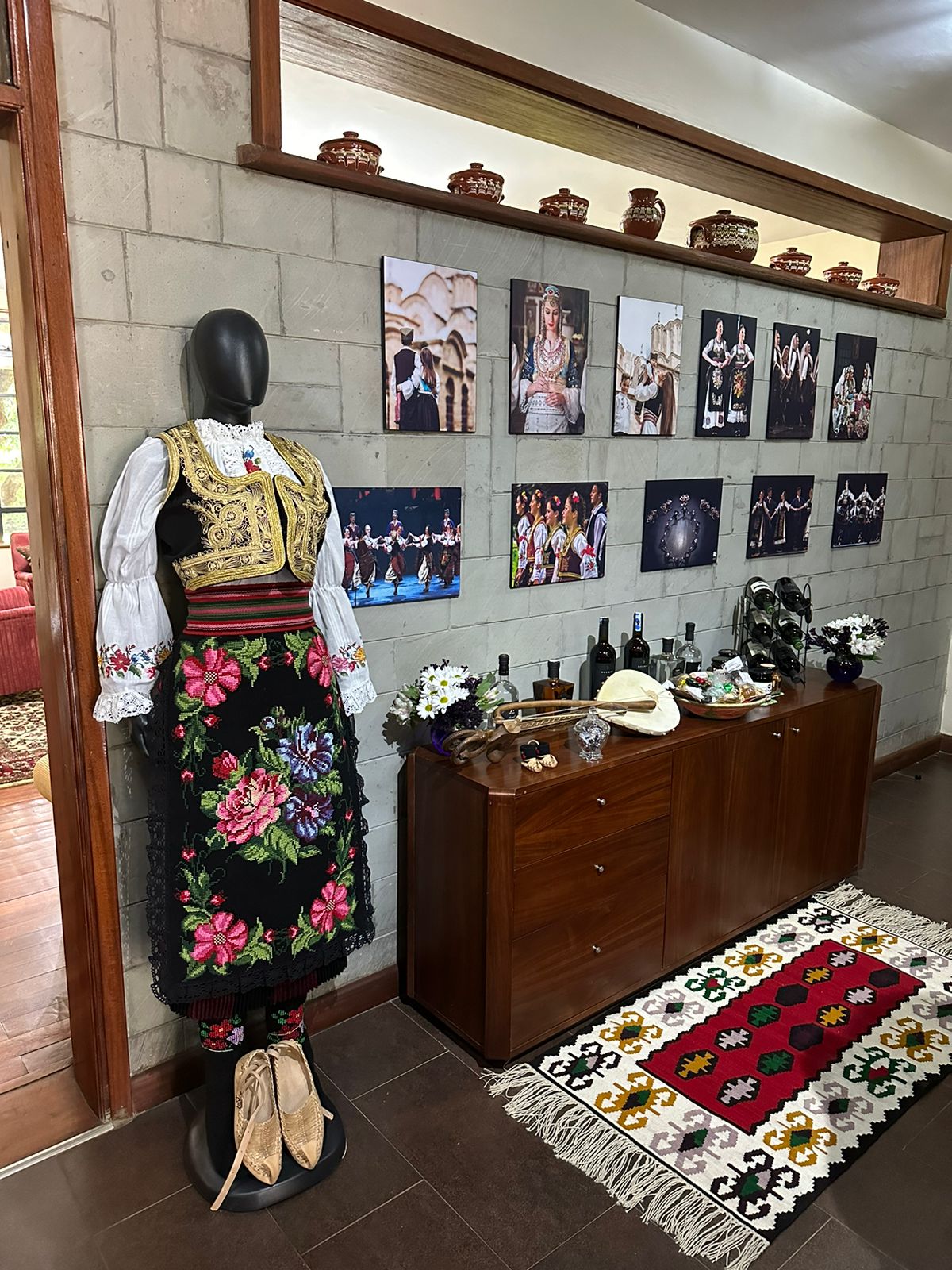 16 March 2024 16 March 2024
The ambassador of the Republic of Serbia in Kenya, Ms. Danijela Čubrilo Martić, hosted a cocktail for members of the Serbian diaspora in this African country. The gathering of our citizens was used to, with the support of the Ministry of Culture of the Republic of Serbia, officially open the Serbian ethno corner in the premises of our Embassy in Nairobi.
In the Serbian ethno corner are exhibited objects that represent the richness and diversity of our cultural heritage in the most beautiful way, which were acquired with the help of the aforementioned ministry or by ambassador Čubrilo Martić. In the coming period, these objects will decorate the premises of our Embassy in Nairobi and will serve to familiarize the local diplomatic community, Kenyan officials and the public of the host country with our culture and tradition. Some of the exhibited elements are inscribed on the UNESCO Representative List of the Intangible Cultural Heritage of Humanity.
|
|
|
| Ambassador Čubrilo Martić handed over letters of credence to the President of Kenya |
|
6 March 2024
The Ambassador of the Republic of Serbia in Nairobi, Ms. Danijela Čubrilo Martić, presented the letters of credence to the President of the Republic of Kenya H. E. William Ruto at a solemn ceremony.
In a short conversation, the possibilities for further improvement of political dialogue and cooperation between the two countries were discussed.
Ambassador Čubrilo Martić emphasized the readiness for joint work on increasing the volume of bilateral trade and investments, as well as her commitment to the promotion of Serbia, its heritage, economic potentials and national priorities.
She expressed hope that Kenya will take part in the EXPO 2027 specialized exhibition in Belgrade.
She underlined gratitude for the fact that Kenya did not recognize the unilaterally declared independence of the so-called "Kosovo", respecting the UN Charter, international law and the legally binding resolution of the UN Security Council 1244.
Speaking in Swahili, she thanked for the hospitality and said she would spare no efforts to be the best ambassador of friendship between our two proud nations.
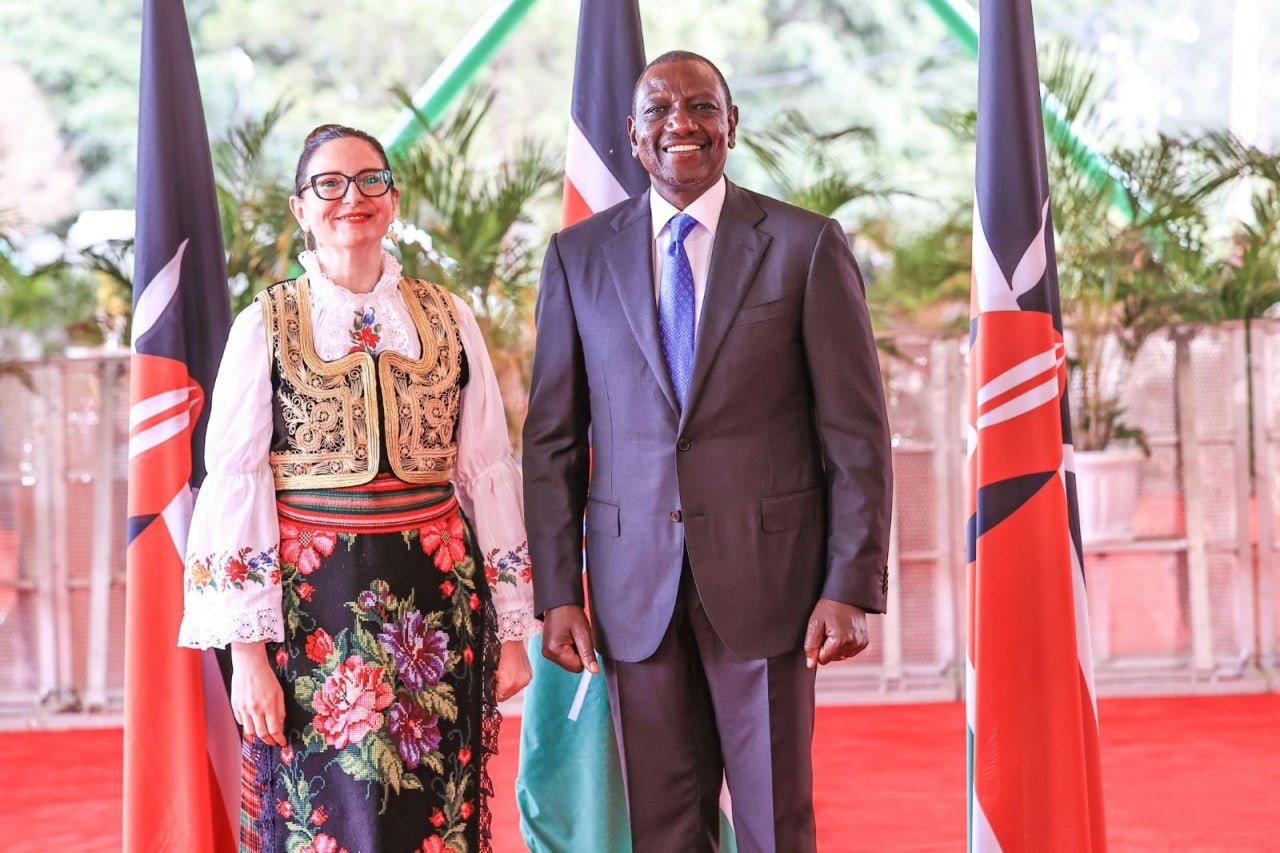
|
|
|
| Ambassador Dragan Zupanjevac met the Ambassador of Ethiopia Bacha Debela Buta. Efforts to enhance traditional friendly relations between the two countries were discussed. |
|
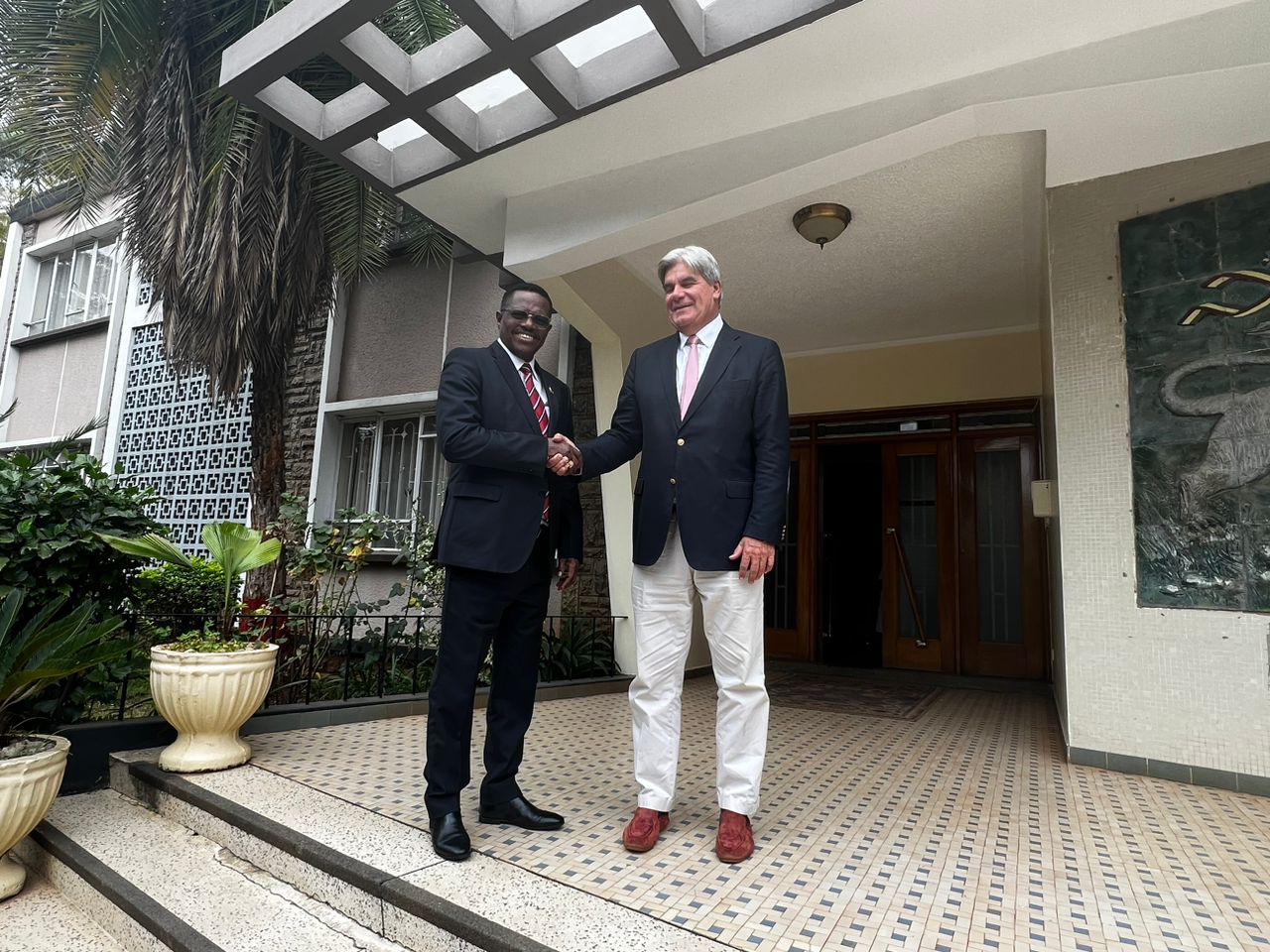 |
|
|
| 25 November 2022. Meeting Between Assitant Miniter for Bilateral Affairs of the Republic ff Serbia, Serbian Ambassador to Burundi and Assistant Minister for Foreign Affairs of Burundi |
|

Assistant Minister for bilateral affairs of Serbia Vladimir Maric and Ambassador of Serbia to Burundi Dragan Zupanjevac were received by Assistant Minister for Foreign Affairs of Burundi Syldie Manirerekana in Bujumbura and ways to enhance bilateral ties were discussed.
 |
|
|
| 18. Oct 2022. Statement by Minister of Foreign Affairs of the Republic of Serbia Nikola Selaković at the meeting of the UN Security Council on the report on the work of UNMIK |
|
Mr. President, Madam Special Representative, Ladies and gentleman, It gives me honor to address this distinguished body once again and to discuss the latest report of the Secretary-General on the work of the UNMIK. I would like to thank the Secretary-General and the Special Representative for submitting the report. We take note of the efforts that Ms. Ziadeh makes in performing this very responsible duty, especially bearing in mind the necessity of a comprehensive overview and the complexity of the situation on the ground. I also take this opportunity to underline that the Republic of Serbia highly values the activities of UNMIK in Kosovo and Metohija, established under UN Security Council Resolution 1244. We advocate for its continued operation in an unchanged and undiminished scope and capacity, especially bearing in mind that the Mission has not yet achieved the main goal of its mandate - a peaceful and normal life for all citizens of our southern province.
.jpg)
Ladies and gentlemen, Unfortunately, the last few months have not brought more stability in Kosovo and Metohija and the situation in the Province is not exactly as presented in the report. Unilateral moves of Pristina continue to consciously and systematically deepen ethnic differences, causing discrimination against the non-Albanian population. To our knowledge, 105 ethnically motivated attacks have been recorded since the beginning of this year. In addition, Pristina is actively working on administrative and bureaucratic obstacles, by taking measures that were not agreed upon in the dialogue as the basic mechanism for negotiations and reaching solutions between Belgrade and Pristina. Pristina’s approach is problematic in many ways. This irresponsible conduct of Pristina is consciously sabotaging the efforts not only of Belgrade, but also of the EU and other involved parties of the international community, with the clear intention of achieving two goals - the first being to avoid the implementation of assumed commitments. The second, the ultimate and far more alarming goal is the intimidation, marginalization and persecution of Serbs. In all previous statements before this this distinguished body, Pristina focused on what happened in the past while failing to mention, which is painful to witness, how non-Albanians in Kosovo and Metohija live today. Serbs are still intimidated in different ways, forced to leave their homes, villages and cities. Those displaced are discouraged from returning to where they were born and lived their lives. The provisional institutions work systematically to remove and erase as much as possible of the cultural and national diversity that is left. At the same time, Pristina is consciously fueling inter-ethnic tensions using all available methods. Attending religious celebrations seems to be a crime in Kosovo and Methohija. It is the case of Nikola Nedeljković who was arrested for allegedly "inciting ethnic hatred and intolerance", but actually his imprisonment was for attending the St. Vitus Day (Vidovdan) celebration. Nikola was sentenced to eight months in prison without any material evidence. On the other hand, let me remind you that even to this day there is not a single perpetrator held legally accountable for the more than 1,000 Serbs killed since 1999. Due to planned intimidation, almost all towns and villages in Kosovo and Metohija are ethnically cleansed. Representatives of Pristina are ignoring the suffering, insulting the open wounds of the Serbs who had to leave their ancestral homes, and I underline, there are more than 200,000 of them. Such conduct has not change for last 23 years and is in complete opposite to the democratic values and principles that the provisional institutions of self-government often promote in their statements. Therefore, I consider it necessary to emphasize that the true political will of the involved international actors and Pristina is necessary in order to create the conditions for the beginning of the end of discrimination on a national basis and common life in the Province. Esteemed members of the Security Council, I would like to draw your attention to the rigid, problematic and extremely irresponsible conduct of the other negotiating party within the dialogue. In achieving the above-mentioned goals, Pristina applies the so-called policy of reciprocity, a well-thought-out, malicious strategy that, unfortunately, was not constructed independently. By continuously insisting on mutual recognition as a central part of the dialogue, the so-called policy of reciprocity demonstrates the essential unwillingness of the current political leadership of Pristina to find any compromise solution. Let me remind you that the talks between Belgrade and Pristina did not start with last elections in Pristina, but have been in progress for 11 years since the technical dialogue started (8 March 2011). Therefore, we assess as inadmissible attempts to disregard the current format of the dialogue, and annul the agreements only because they are not to the liking of the current political factors. It is unacceptable that the current geopolitical circumstances are being used to simply erase what has been painstakingly worked on for years. Belgrade, I underline, was institutionally involved in the dialogue from the very beginning, while the commitment of the other side has varied and continues to vary depending on the political option that is in power. The harsher political rhetoric and narrative of the current leadership of the provisional institutions of self-government in Pristina are accompanied by concrete destabilizing steps. In the reporting period, measures on license plates were imposed, disguised as attempts at alleged integration into society. Let me remind you again, there was no agreement on such measures in the dialogue between Belgrade and Pristina. I believe, ladies and gentlemen, that even today we will hear from the representative of Pristina that their side has fulfilled all obligations, but the decision on re-registration of license plates shows that Pristina is not only failing to fulfill what has been agreed upon, but it nullifies the results of the dialogue, creating a new crisis all over again. The effect of such forcibly imposed measures is best illustrated by the fact that since the decision was made a single-digit number of re-registered vehicles with Serbian license plates has been recorded, of which only two are Serbs from the north of Kosovo and Metohija. This is another indicator that Pristina does not enjoy full support, but that, on the other hand, it continuously provokes the natural reaction of the Serbian population, which cannot endlessly be subject to the arbitrariness of temporary institutions. I believe that even today we will hear already known narrative of representatives from Pristina who try to present every reaction of the Serbs in Kosovo and Metohija as an activity organized by Belgrade in alleged attempts at destabilization. Such claims are simply not true. Serbia, for its part, cannot in any way contain the revolt present among the non-Albanian population of Kosovo and Metohija. It is an undeniable fact that citizens' protests represent a voice against many years of institutional violence and the deprivation of rights of the non-Albanian population, which, in this case, is denied the right to peaceful enjoyment of private property acquired in a legal manner. Pristina does not cease in its attempts to confiscate property, and, as is well-known, one of the targets is the Serbian Orthodox Church. By calling into question the return of property to the Dečani Monaster Pristina paradoxically does not execute the decisions of its own so-called Constitutional Court. Ladies and gentlemen, I thought for a long time how to best illustrate the true picture of everyday life of the non-Albanian population in Kosovo and Metohija. I will mention only some of the facts. Numerous ethnically motivated incidents, hate speech, intimidation, violations of the right to a fair trial, threats to the right to freedom of movement and religious rights, desecration of churches and graves were recorded in the last reporting period as well. The frequent attacks on the sites of the Serbian Orthodox Church are also unacceptable, and especially the humiliating attitude towards the Serbian cultural and spiritual heritage, including the 4 monuments that have been inscribed on the UNESCO World Heritage List. Numerous administrative and technical barriers are imposed on priests and monastic communities, making it difficult and even impossible for them to survive on church properties. When it comes to civil rights, try to imagine that the basic political and civil right to vote has been taken away from you. This is precisely what the Serbs in the Province have experienced along with frequent intimidation and violent incursions of the ROSU special forces, which are an instrument for the implementation of Pristina's goals under the pretext of allegedly fighting crime. In December last year Bratislav Nikolić the president of municipality of Štrpce has been detained, as suspected of the organized crime and corruption - still not charged, kept in detention unit in Podujevo, only for the reason to make additional and final pressure on the Serbian community living in the enclave of Štrpce. How can this be justified as the fight against crime when special forces are used to raid village festivals, schools and kidnap drivers of ambulance transporting infusion containers and medicines? What are the motives behind and how can one rationalize these actions? Just try to imagine and put yourself in the shoes of Ms. Dragica Gašić, the only Serbian returnee in Djakovica. Imagine that you are still not allowed to buy bread because of your origin and nationality, because you live in a municipality that the local Albanians proudly consider forbidden to non-Albanians. Imagine that as many as eleven Albanian civil society organizations demand your expulsion, as well as a ban on any non-Albanian ever returning to that town. Then you will realize the level of intimidation that Serb returnees are facing. It will be clear to you why the percentage of returnees is below 2% and why it is still one of the lowest in the world. Let me pose a question - are these the characteristics of a society that presents itself to the world as a fully fledged democracy and a factor of stability in the region? We are aware that the dialogue has a wider dimension and that it can affect the situation in the entire region. This is reflected in every statement given by Serbian officials, including the President of the Republic of Serbia, Aleksandar Vučić. "It is better to negotiate for a hundred years than to fight for a day" are the words of our President that best describe the policy of peace, reconciliation, and regional cooperation pursued by the Serbian leadership, which is guided by the vision of building a common and prosperous future of the Balkans. I believe that it is a duty of today's leaders to create a clear common vision for the future generations. Such a vision was shown by the leaders of Belgrade, Skoplje and Tirana by creating Open Balkan, an initiative from the region for the region, which is already producing concrete results. Serbia has on several occasions reached out to Pristina inviting it to join this initiative. We counted on an awareness of the importance of economic connectivity and progress for the benefit of the citizens of the entire Balkans. However, our invitation was not met with understating from the other side. Ladies and gentlemen, We categorically reject Pristina's argumentation regarding the alleged unconstitutionality of the formation of the Community of Serb Municipalities. It is clear that Pristina's attitude towards this obligation reflects its attitude towards the Serbian people in the Province. It also indicates that Pristina is against Serbian people being organized as an ethnic community and thus exercising their collective rights. The aim of their approach, as a preferred model, is a community without Serbs, such as those in Pristina, Djakovica or Pec, or some similar localities in the Province. For our side, it is unacceptable that Pristina has refused to fulfil its obligations and discuss the formation of the Community of Serb Municipalities for as much as 3,470 days but I assure you that, regardless of this fact, Serbia will not give up on its efforts to find a compromise solution for the current situation. I will remind you that the representatives of Pristina, although they often repeat in their statements that the case of the so-called Kosovo is a fait accompli, continue not to be recognized by the majority of UN member states for 14 years now. If the so-called Kosovo's independence is a reality, how come that we have the dialogue? And how come that Belgrade is faced with increasing pressures as regards the need for mutual recognition? What the current political leadership of Pristina refuses to accept is that Belgrade cannot be left out in the search for a final solution. The same also applies to the case of the increasingly frequent indications about Pristina's upcoming membership in international organizations. Will these moves help to create the necessary atmosphere for dialogue? Are we, in this way, rewarding Pristina's destructive behaviour and refusal of dialogue? Our view is that the attempts of the so-called Kosovo to join international organizations are an unacceptable act and Serbia will work decisively against such steps. During the last session in April this year, we could hear the calls of some members of the UN Security Council to reduce and even terminate UNMIK, with the explanation that Pristina has its own functional institutions. However, the circumstances I have presented to you and the situation on the ground remind us again that international presence in our southern province is still necessary. In this regard, we support the efforts made by UNMIK, KFOR, EULEX and OMIK within their mandates. The Serbian and other non-Albanian population in Kosovo and Metohija has the highest confidence in the international presence and considers it a guarantor of security, which additionally confirms that international missions need to remain engaged in an undiminished scope and capacity in accordance with UN Security Council Resolution 1244. In conclusion, I would like to point out that lately in all international forums we keep hearing calls for respect of the principles of the UN. We support the territorial integrity of all UN member states. But, what about Serbia? I would like to ask the esteemed members of this distinguished body whether the need to implement the principles of the UN Charter applies only to some or all of its members? As a country that consistently respects international law and still suffers the consequences of it being violated, we believe that the UN Charter and international law, including the territorial integrity and sovereignty of states, should be respected by all and apply indiscriminately to all UN member states. Ladies and gentleman, It was this body that more than two decades ago adopted Resolution 1244, which confirmed the territorial integrity of Serbia. This fact did not prevent certain countries from recognizing the so-called “Kosovo” and thus violating the UN principles, but also the resolution that they adopted, by adjusting international law to their interests and goals. Precisely because of this, the more and more frequent mentioning of the case of "Kosovo" is an indication that the precedent made opened a Pandora's box, because the strength of each principle rests on its full and universal application and unconditional adherence. You will notice that I posed a lot of questions in my statement and I express hope that today we will hear answers to at least some of them from you, esteemed members of the UN Security Council and representatives of Pristina, because the inhabitants of Kosovo and Metohija, of any nationality, whether they are Serbs or Albanians deserve it. All the inhabitants of Kosovo and Metohija have every right to expect an improvement in the atmosphere and the reduction of tensions on the ethnic level, which are a prerequisite for a normal life. For such a step to be made, we need constructiveness, which is not lacking on the Serbian side, genuine support of international actors. I emphasize that Serbia has always been and remains deeply committed to finding a sustainable solution by peaceful means, for the sake of peace, stability and a common future. Thank you. |
|
|
| 13 July 2022 |
|

Novak Djokovic seven time winner of the Wimbledon tennis tournament meets Kenyan Angela Okutoyi junior doubles champion at Wimbledon this year. Well done to both of them both Serbia and Kenya are very proud. |
|
|
| 11. May 2022. - Selaković: Serbia is actively involved in combating terrorism, radicalism and extremism |
|
Today, in Marrakesh, Minister of Foreign Affairs of Serbia Nikola Selaković participated in the Ministerial Meeting of the Global Coalition to Defeat ISIS.
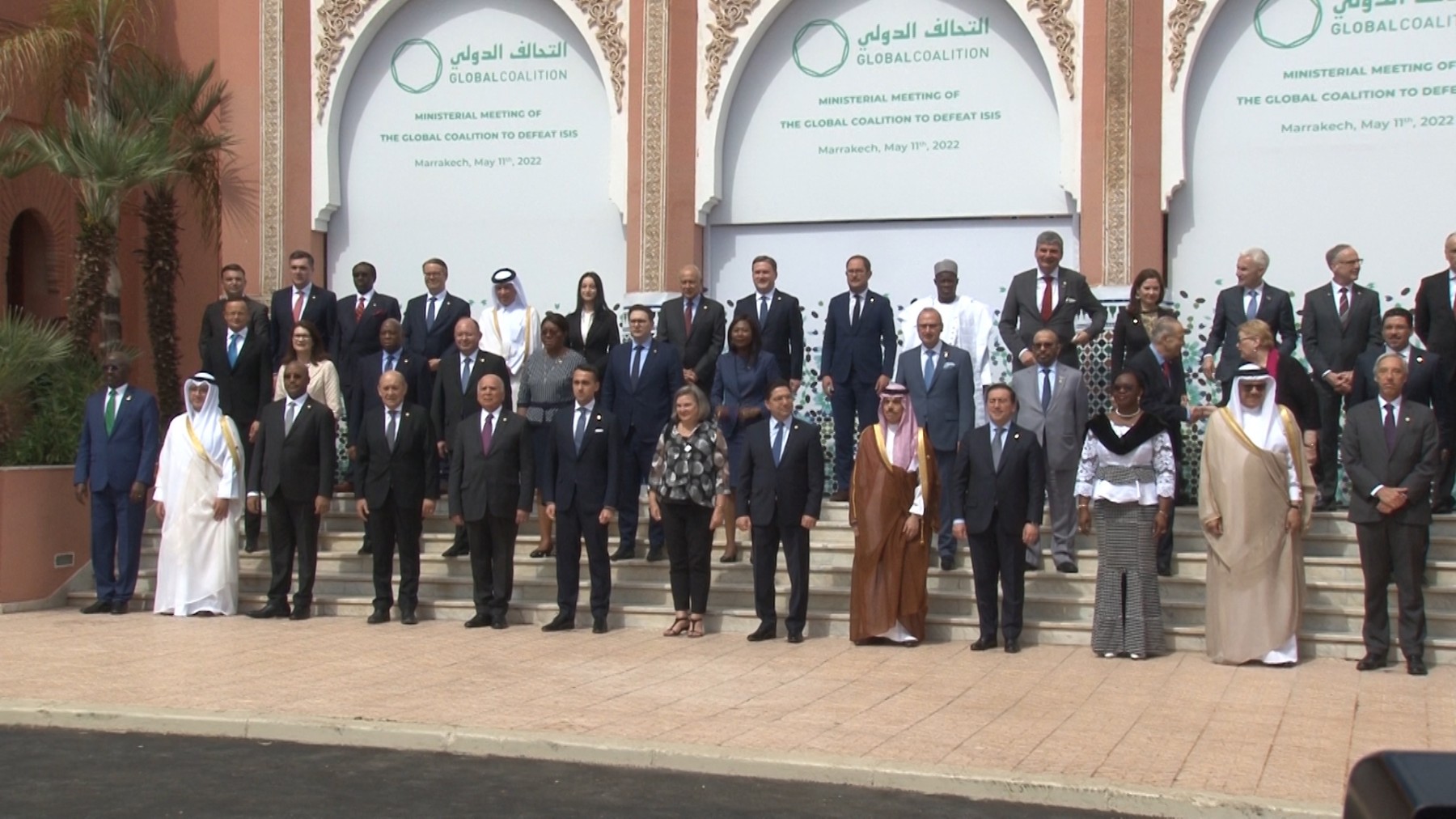 Minister Selaković said that Serbia was committed to the multilateral aspect of the fight against terrorism, adding that he firmly believed the United Nations should be the key forum for international cooperation in this field. Minister Selaković stated that Serbia was fulfilling all international obligations pertaining to the implementation of UN Security Council resolutions, especially those related to the introduction of arms embargoes, including bans aimed at non-state actors, terrorist organisations and related individuals. He emphasised that Serbia was a signatory to 15 international conventions against terrorism.“By participating in multinational UN and EU peacekeeping missions, Serbia is making a concrete contribution to preserving regional and global security,” Minister Selaković said, paying tribute to a member of the Serbian Army, Lieutenant Colonel Dejan Stanojević and his colleagues, who tragically lost their lives on March 29 in the United Nations Mission in the Democratic Republic of the Congo.“ Serbia does not diminish the importance of other international forums, which is why it joined the Global Coalition from the very beginning, and selflessly contributes to international efforts to fight ISIS, primarily through various forms of donations in military equipment, ammunition, and training in Iraqi security forces”, Minister Selaković said. He added that as a candidate country for membership in the European Union, Serbia gave its full contribution through active participation in European policies on the fight against terrorism, and had developed a strategic cooperation with EUROPOL. Minister Selaković said that Serbia was committed to the multilateral aspect of the fight against terrorism, adding that he firmly believed the United Nations should be the key forum for international cooperation in this field. Minister Selaković stated that Serbia was fulfilling all international obligations pertaining to the implementation of UN Security Council resolutions, especially those related to the introduction of arms embargoes, including bans aimed at non-state actors, terrorist organisations and related individuals. He emphasised that Serbia was a signatory to 15 international conventions against terrorism.“By participating in multinational UN and EU peacekeeping missions, Serbia is making a concrete contribution to preserving regional and global security,” Minister Selaković said, paying tribute to a member of the Serbian Army, Lieutenant Colonel Dejan Stanojević and his colleagues, who tragically lost their lives on March 29 in the United Nations Mission in the Democratic Republic of the Congo.“ Serbia does not diminish the importance of other international forums, which is why it joined the Global Coalition from the very beginning, and selflessly contributes to international efforts to fight ISIS, primarily through various forms of donations in military equipment, ammunition, and training in Iraqi security forces”, Minister Selaković said. He added that as a candidate country for membership in the European Union, Serbia gave its full contribution through active participation in European policies on the fight against terrorism, and had developed a strategic cooperation with EUROPOL.
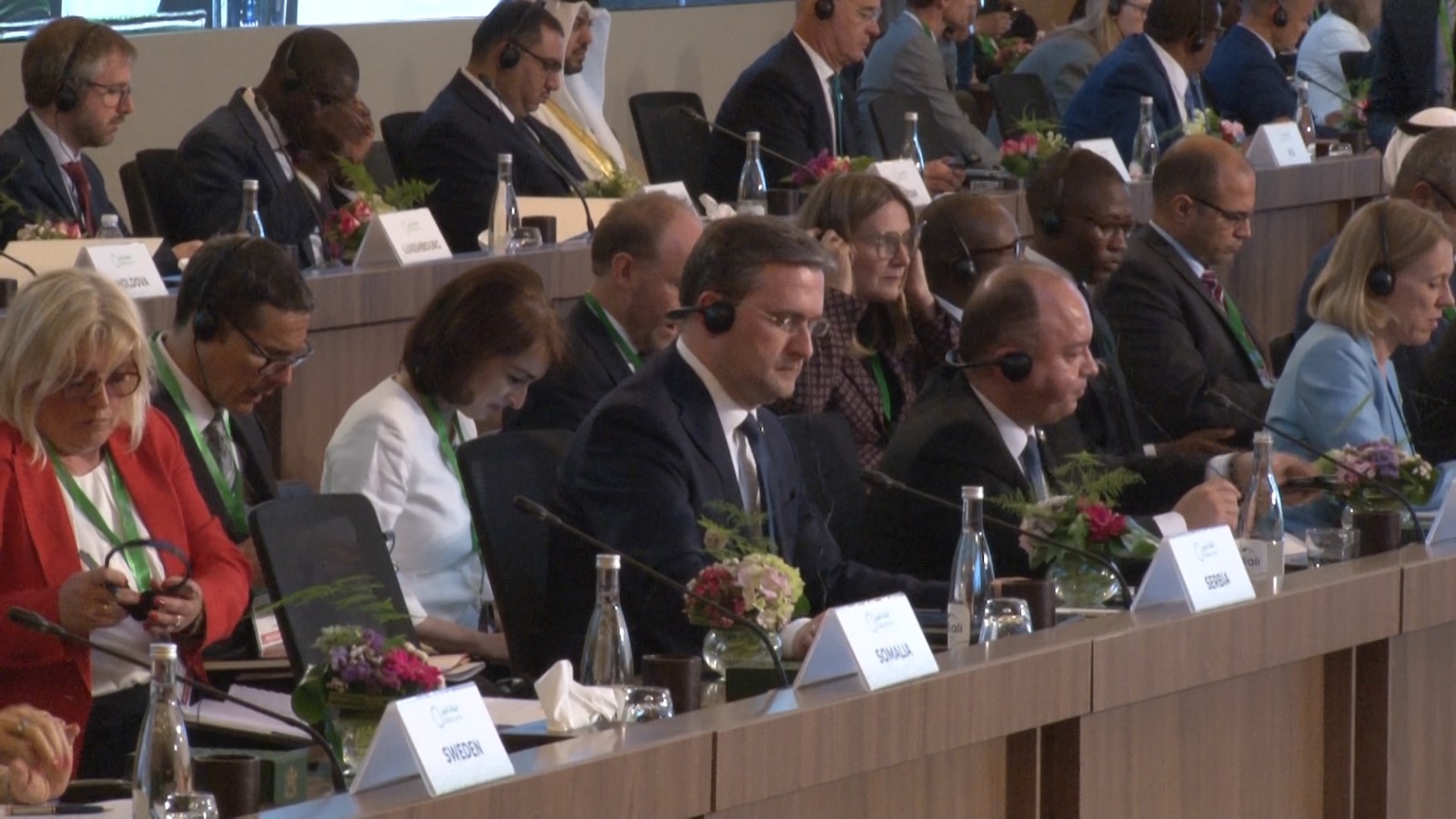
Minister Selaković noted that Serbian criminal legislation provided instruments to prevent and punish the encouragement, organisation, and participation of its citizens in wars or conflicts in foreign countries. He explained that the Serbian judicial authorities had completed proceedings against 7 persons engaged in foreign battlefields, and that several investigations against persons connected with terrorist activities were underway. Minister Selaković said that the fight against terrorism, radicalism and extremism was a priority, and that Serbia was actively involved in combating these challenges and threats at the domestic, regional, and international level. |
|
|
| 11 April 2022. Scholarship Recipients |
|

Ambassador Dragan Zupanjevac received a group of Kenyan students who have been awarded scholarships to study in Serbia under the "World in Serbia" programme. |
|
|
| Meeting with the Principal Secretary for Trade and Enterprise Development |
|

Ambassador Dragan Zupanjevac was received by the principal secretary for trade and enterprise development of the Republic of Kenya Ambassador Johnson Weru . The potential for enhancing trade, tourism and investment between Kenya and Serbia was discussed. |
|
|
| Meeting with the Mission Force Commander of the EU Training Mission in Somalia EUTM |
|

Ambassador Dragan Zupanjevac meets Brigadier General Roberto Viglietta Mission Force Commander of the EU Training Mission in Somalia EUTM in which Serbia has a medical team which General Viglietta highly commended. |
|
|
| Meeting with the Cabinet Secretary for Health |
|

Ambassador Dragan Zupanjevac met CS of Health Hon. Mutahi Kagwe and discussed the potential of health cooperation between Serbia and Kenya |
|
|
| 03. Mar 2022. FM Selaković: Serbia prepared to strengthen its cooperation with Somalia |
|
Serbian Foreign Minister Mr. Nikola Selaković spoke by phone today with the Minister of Foreign Affairs of the Federal Republic of Somalia - H.E. Mr. Abdisaid Muse Ali. Minister Selaković noted that the relations between our two countries are good, but also stressed the need to work on intensifying political dialogue and strengthening overall cooperation. Pointing out that visits at a high and highest level would further contribute to such efforts, Foreign Minister Selaković invited H.E. Minister Ali to pay an official visit to Serbia.
 The head of Serbian MFA welcomed the reopening of the Somali embassy in Belgrade, emphasizing that this decision is of great importance for the improvement of bilateral contacts. Foreign Minister Selaković particularly stressed that Serbia is interested in improving economic cooperation and trade with Somalia, especially in the fields of agriculture, commerce and IT industry. The two foreign ministers discussed the ongoing struggle of their countries against the COVID 19 pandemic, and FM Selaković said that Serbia is ready to provide assistance in vaccines, in accordance with its capacities. The ministers also exchanged views on current international events, Serbian Foreign Minister offered Serbian help in the evacuation of Somali students currently residing in Ukraine, as well as their temporary accommodation in Serbia so that they may continue their education. The head of Serbian MFA welcomed the reopening of the Somali embassy in Belgrade, emphasizing that this decision is of great importance for the improvement of bilateral contacts. Foreign Minister Selaković particularly stressed that Serbia is interested in improving economic cooperation and trade with Somalia, especially in the fields of agriculture, commerce and IT industry. The two foreign ministers discussed the ongoing struggle of their countries against the COVID 19 pandemic, and FM Selaković said that Serbia is ready to provide assistance in vaccines, in accordance with its capacities. The ministers also exchanged views on current international events, Serbian Foreign Minister offered Serbian help in the evacuation of Somali students currently residing in Ukraine, as well as their temporary accommodation in Serbia so that they may continue their education. |
|
|
| 7 March 2022 - Donation of Astra Zeneca Vaccine |
|
The Ministry of Health of the Republic of Kenya accepted today a donation of 40,000 Astra Zeneca vaccines from the Republic of Serbia.
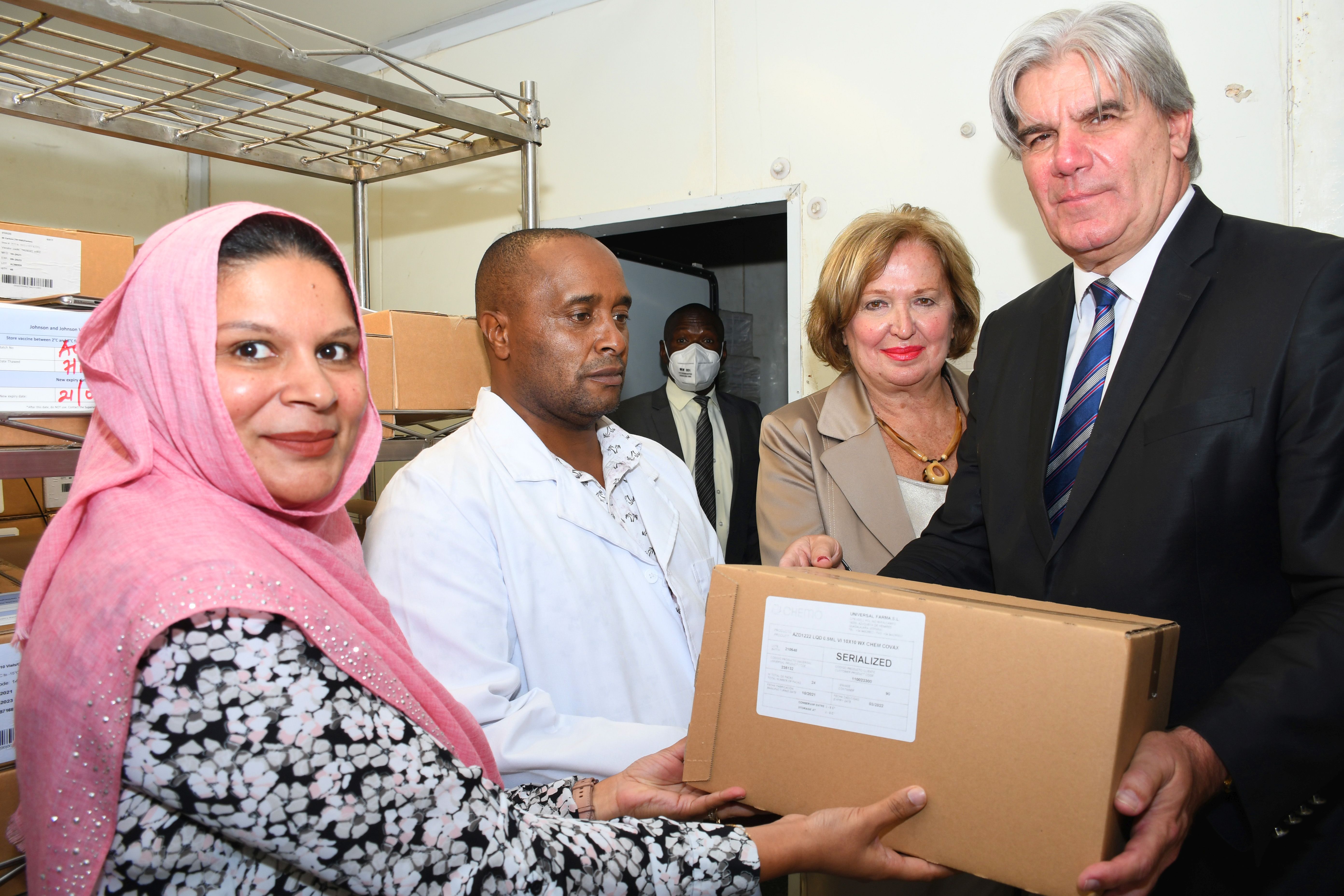
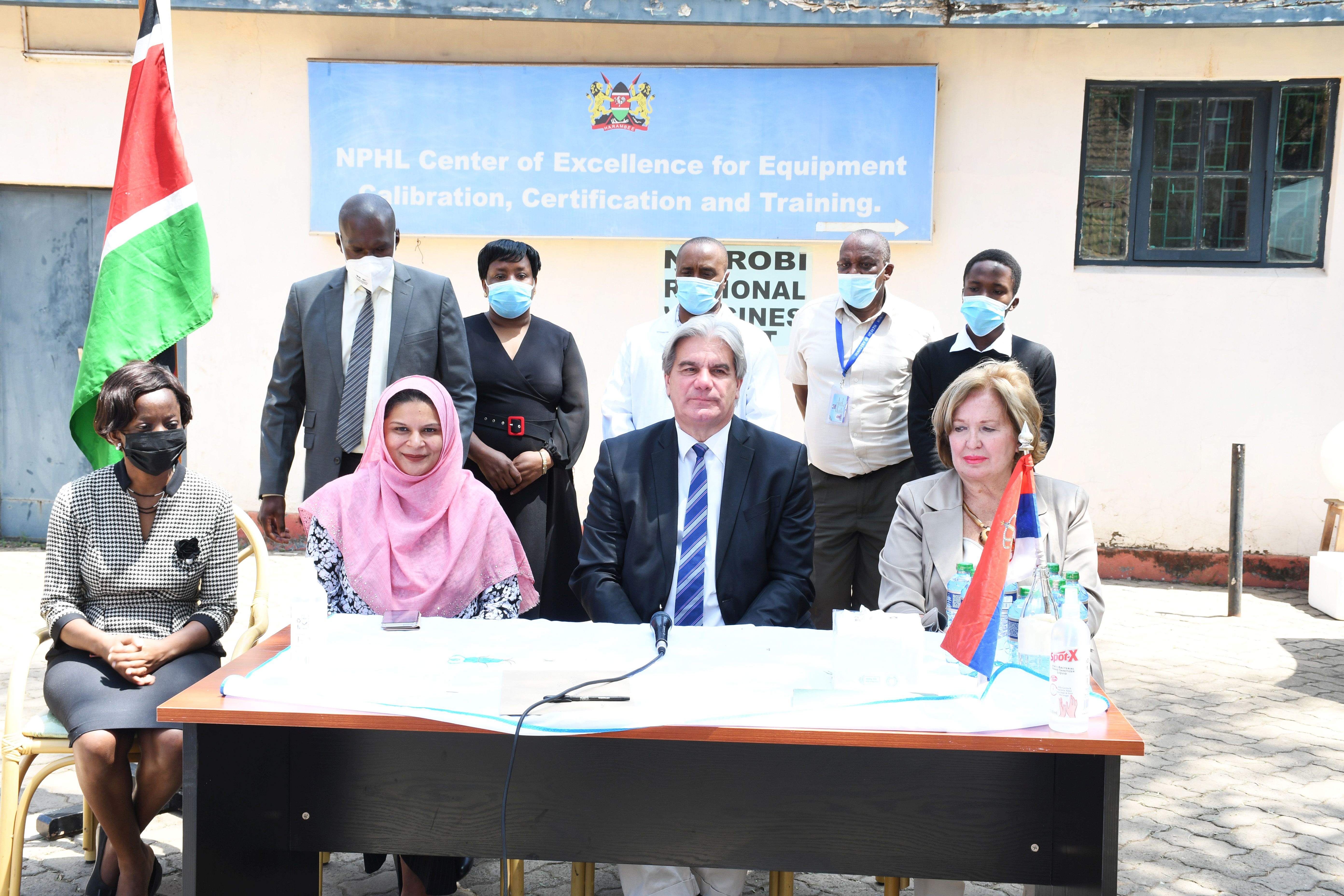
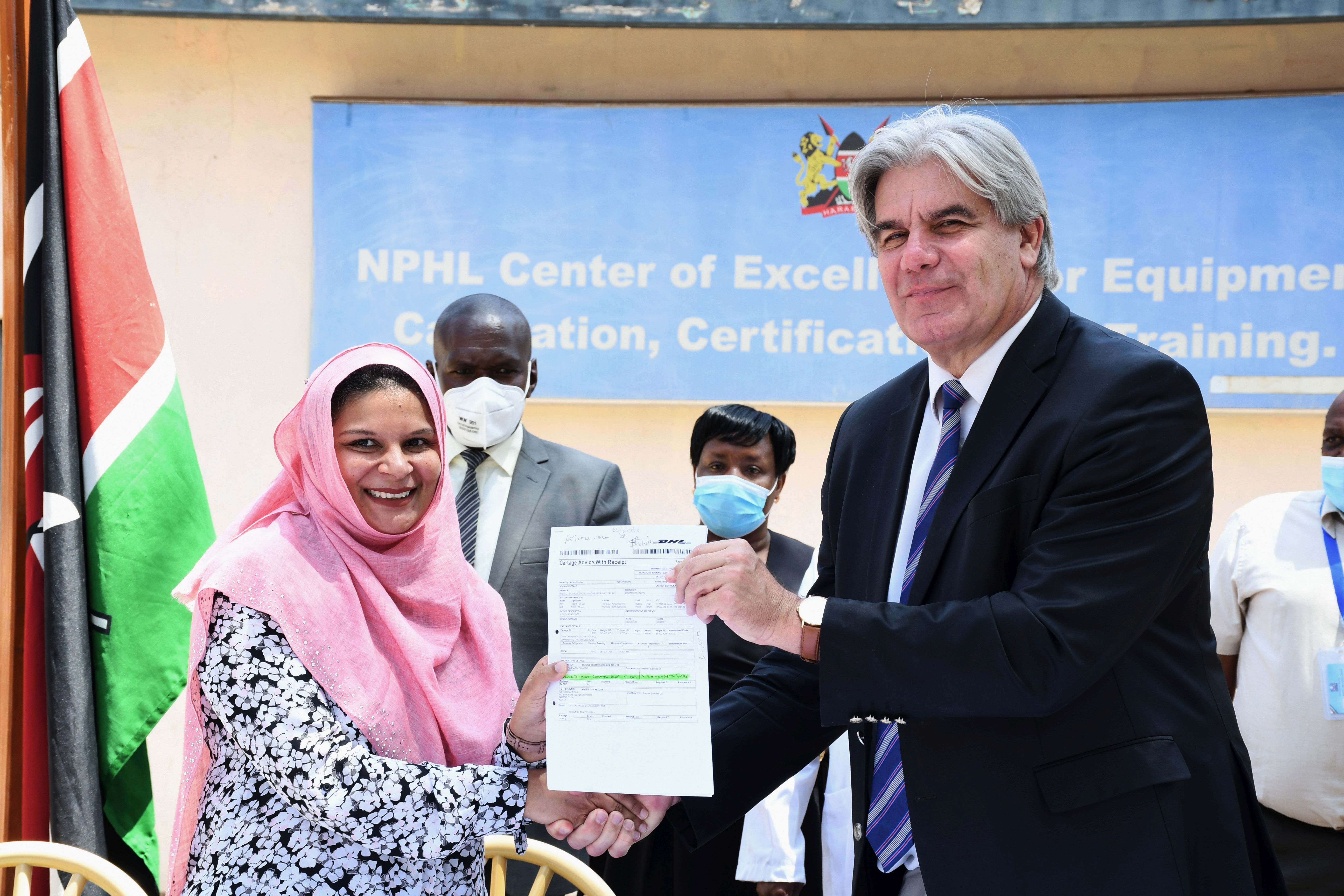
|
|
|
| 7 February 2022 - Belgrade to get Centre for Fourth Industrial Revolution |
|
Prime Minister Ana Brnabic attended today in Geneva the signing of the Agreement on the Establishment of the World Economic Forum Centre for the Fourth Industrial Revolution in Serbia, the first of its kind in the Western Balkans. The agreement was signed at the headquarters of that forum by Director of the Office for Information Technologies and eGovernment Mihailo Jovanovic and Managing Director and Head of the Forum's Centre for the Fourth Industrial Revolution Jeremy Jurgens. The centre in Serbia will be the 16th in the network of centres of the World Economic Forum in the world and the first in the region of the Western Balkans. The new centre will start operating on 1 March and will function as a non-profit organisation and a platform for public-private partnership and cooperation for the Fourth Industrial Revolution, while the focus of work will be on artificial intelligence and bioengineering. This centre will work within the Serbian government’s Office for Information Technologies and eGovernment and will cooperate with scientific institutes, state institutions and the private sector.
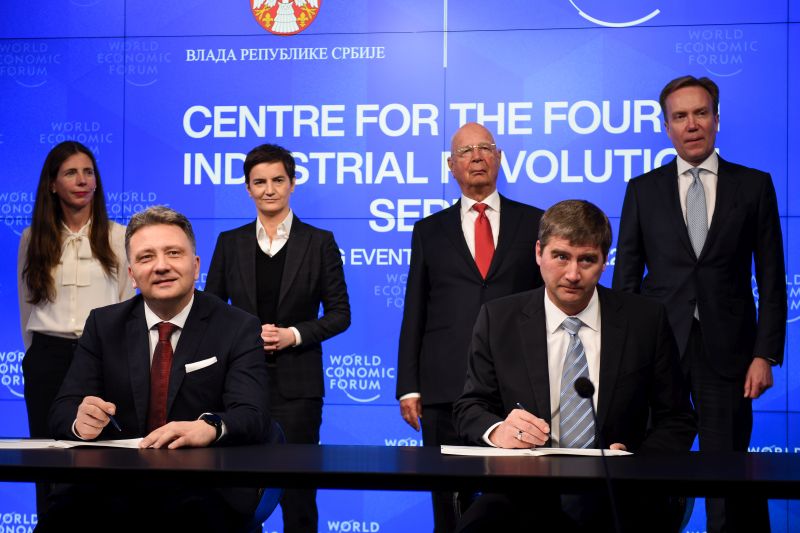
The signing of this document was also attended by founder and Executive Director of the World Economic Forum Klaus Schwab and President of the World Economic Forum Borge Brende, with whom Brnabic had previously met. Addressing the press, Brnabic pointed out that this agreement is the result of many years of joint work between Serbia and the World Economic Forum. We started talking in 2018, signed a Memorandum of Understanding, then 2020 hampered us a bit, but we continued to plan in 2021 and here we are today, she said. According to her, the centre will be focused on the development of artificial intelligence, biomedicine and biotechnology, and on the ways in which digitalisation can raise the productivity of companies and the entire economy. This is what further leads to higher salaries, a better standard of living, as well as to an economy that is mainly based on knowledge, creativity and innovation, Brnabic emphasised. Today, we have received great recognition for everything that Serbia has done in the field of digitalisation, development of high technologies and paradigm shift – from an economy that was based on labour-intensive investments to digital development. That is why this agreement shows that Serbia has been recognised as one of the leaders in the economy and IT industry in the last six years, the Prime Minister pointed out and assessed that this is the announcement of the beginning of an even closer cooperation between Serbia and WEF. She added that they will have a joint meeting with the 16 WEF centres for the fourth industrial revolution in the world every month, at which they will talk about what each of them is doing, since each has a different focus. That is how we will hear what everyone is doing every month, learn from each other and I am sure that the centre in Belgrade will be one of the best, the Prime Minister said. According to her, this gives us visibility, the opportunity to further establish Serbia as an investment destination, a country good for living and investing in new technologies and knowledge.
Jovanovic said that the ecosystem formed around the centre will use the infrastructure of the National Platform for the Development of Artificial Intelligence, the Centre for Genome Sequencing and the future bioeconomic centre – BIO4 Campus.
Izvor/Foto: Tanjug |
|
|
| 12 November 2021 - UNESCO’s role extremely important for preservation of Serbian heritage in Kosovo and Metohija |
|
Prime Minister Ana Brnabic stated today that severe examples of endangering the Serbian cultural, historical and spiritual heritage in Kosovo and Metohija are proof of the important role of UNESCO in protecting and preserving heritage.
At the 41st session of the General Conference of UNESCO in Paris, Brnabic emphasized that four jewels of the Serbian medieval cultural heritage in Kosovo – Visoki Decani, Pec Patriarchate, Gracanica and Bogorodica Ljeviska, have been preserved thanks to the fact that they are inscribed on the endangered world heritage list. Hundreds of other sites and monuments are endangered. The Serbian heritage in Kosovo and Metohija is of immeasurable importance, not only for the national identity of Serbia, but also as a part of the esteemed European and world heritage, she underlined.
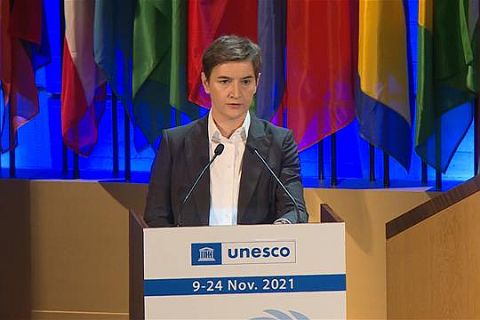
Source/Photo: www.srbija.gov.rs |
|
|
| 2nd November 2021 - Address of the President of the Republic of Serbia at the United Nations climate change conference COP26 held in Glasgow |
|
"Your Excellences, distinguished delegates, dear Sarah,
At the very beginning, I feel obliged to thank Prime Minister Boris Johnson and Her Majesty’s Government for exceptional hospitality. I feel privileged to represent the Republic of Serbia at this important place and at the highest-level world forum, in working on the most important topic of today – promoting climate awareness. We all agree that we must make investment into climate and environment. We all, likewise agree, that future generations must be educated in order not to repeat the mistakes we made, by hurting the only Planet that makes life possible. I am very honoured that the Republic of Serbia is co-chairing this year’s Conference as a Non-EU representative of the Eastern Europe Group. In concrete terms, we see the special contribution of our expert team in finalising negotiations on the implementation of Article 6 of the Paris Agreement, which refers to the establishment of the global market and non-market mechanisms for reducing greenhouse gas emissions, as well as to remaining provisions referring to advanced transparency framework and common timeframes for Nationally Determined Contributions, which are the key provisions of the Agreement that have not yet been covered by the decision that is to be adopted by the Conference, i.e. all member states. We, therefore, believe that this is an exceptional opportunity for Serbia to give its full contribution to the finalization of negotiations, which, we hope, will secure full implementation of the Paris Agreement. As a result of strong economic development, modelled for Serbia by 2050, the impact of the implementation of climate measures to employment will be optimal, through new jobs creation and creation of new industries which have not existed so far. One billion euros was raised at the first green bonds auction in Serbia, which clearly confirms the trust of international investors in our green agenda, but also to the economic and political stability of our country. Incomes from green bonds issuance will be used for financing renewables, energy efficiency, sustainable water management, prevention of pollution and circular economy development and biodiversity preservation. And as you can see, dear friends, my people made a terrific speech for me, but I am going to add a few more words and a few more questions for those that are coming from big powers and that haven’t answered yet several questions: Number one is: how are we going to finance all these activities? We’ve heard the story of trillions of dollars that are at our disposal. My question would be: what would be the interest rate, what would be the terms for taking these amounts of money, and actually how are we going to tackle that issue? Number two: how are we going to treat the nuclear power plants? Are we going to shut them all or are we going to build them more? Then, how are we going to build more renewables if we already started endorsing populist movements against wind parks, new hydropower plants, and are we going to put in jeopardy the level of our public debt to GDP ratio if we raise huge amounts of money? How are we going to treat natural gas, and how are we going to secure decent prices of natural gas and electricity power as well? And, I came here using an electric car from Edinburgh to Glasgow. But, how are we going to do mining and refining of lithium, nickel, cobalt and many other very important minerals? In the end, we all know what is our final aim, what is our final target. But, it’s not a fairytale – we’ll have to work a lot, we’ll have to be 100 per cent dedicated, and we’ll have to be more honest with each other. The health of people living in Serbia depends directly on the implementation of this Agenda, just like the health and life of each living being on Earth depends on arrangements that will be reached here and on national implementation of the respective arrangements. Perhaps it is the right time to listen and hear the cry of Mother Earth because if we lose this race against time, our children will inherit an irreparably polluted Planet. Thank you very much for listening to me."
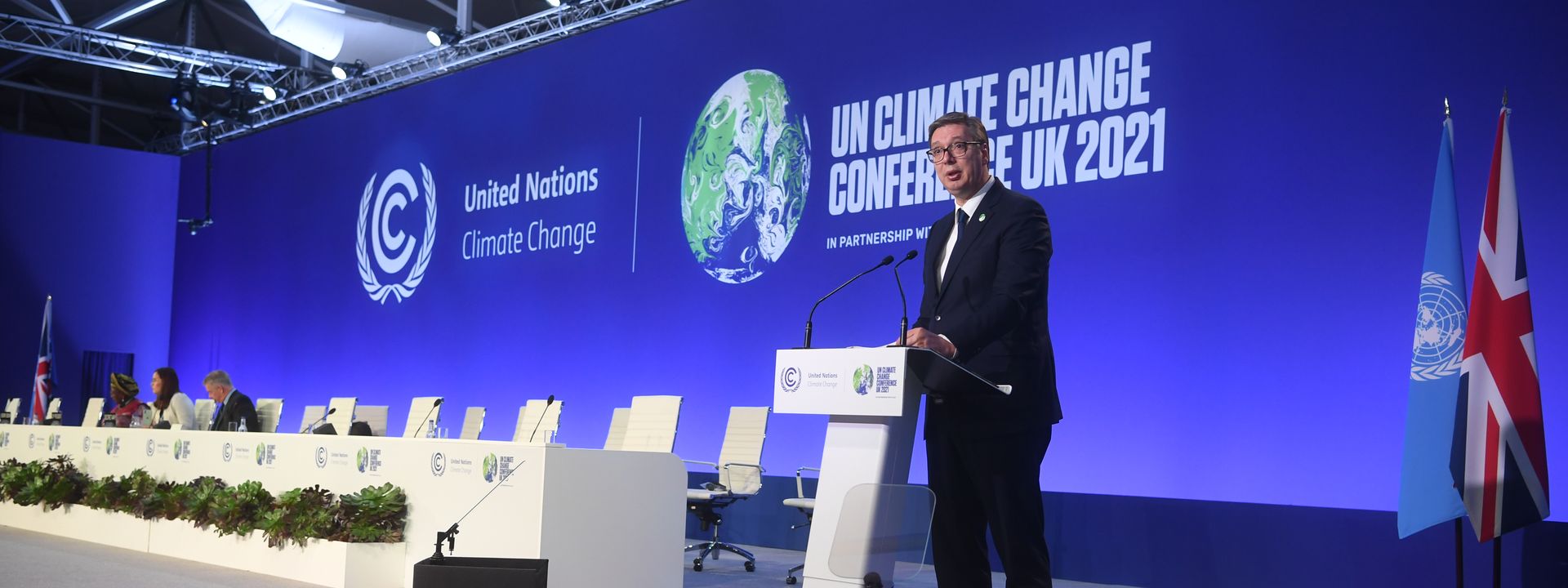 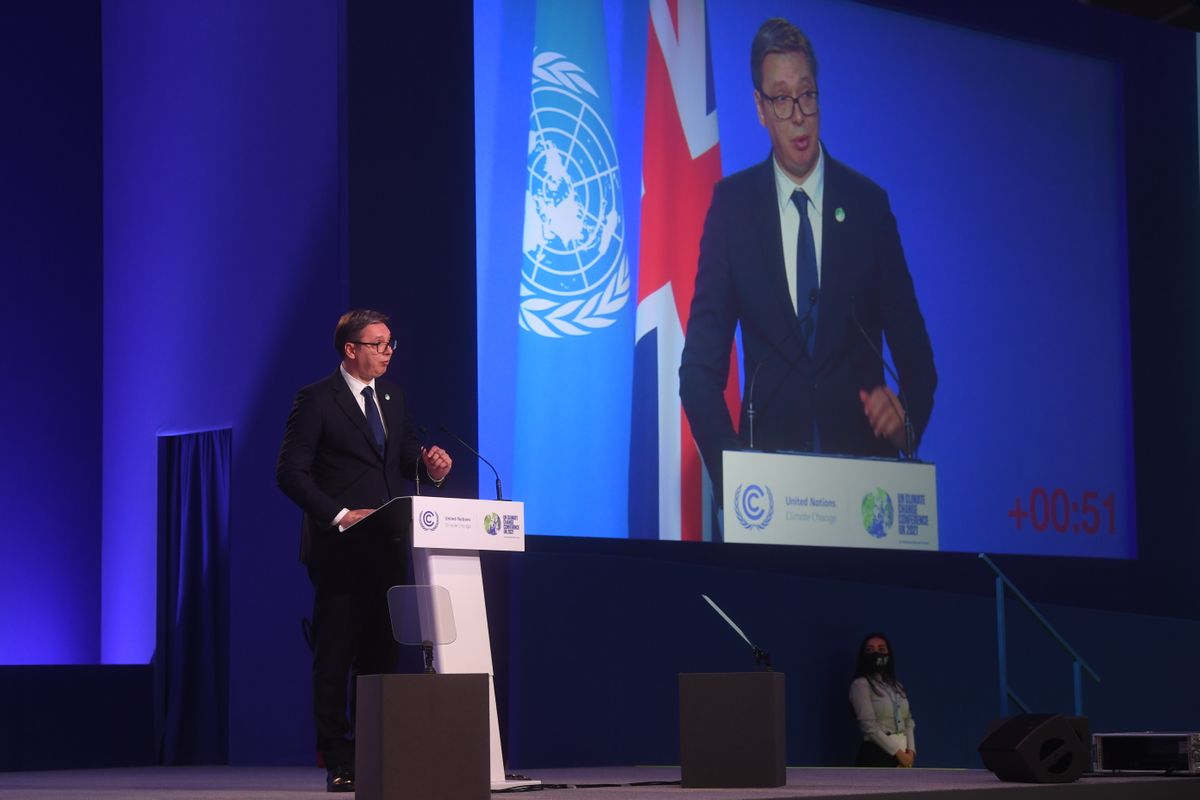 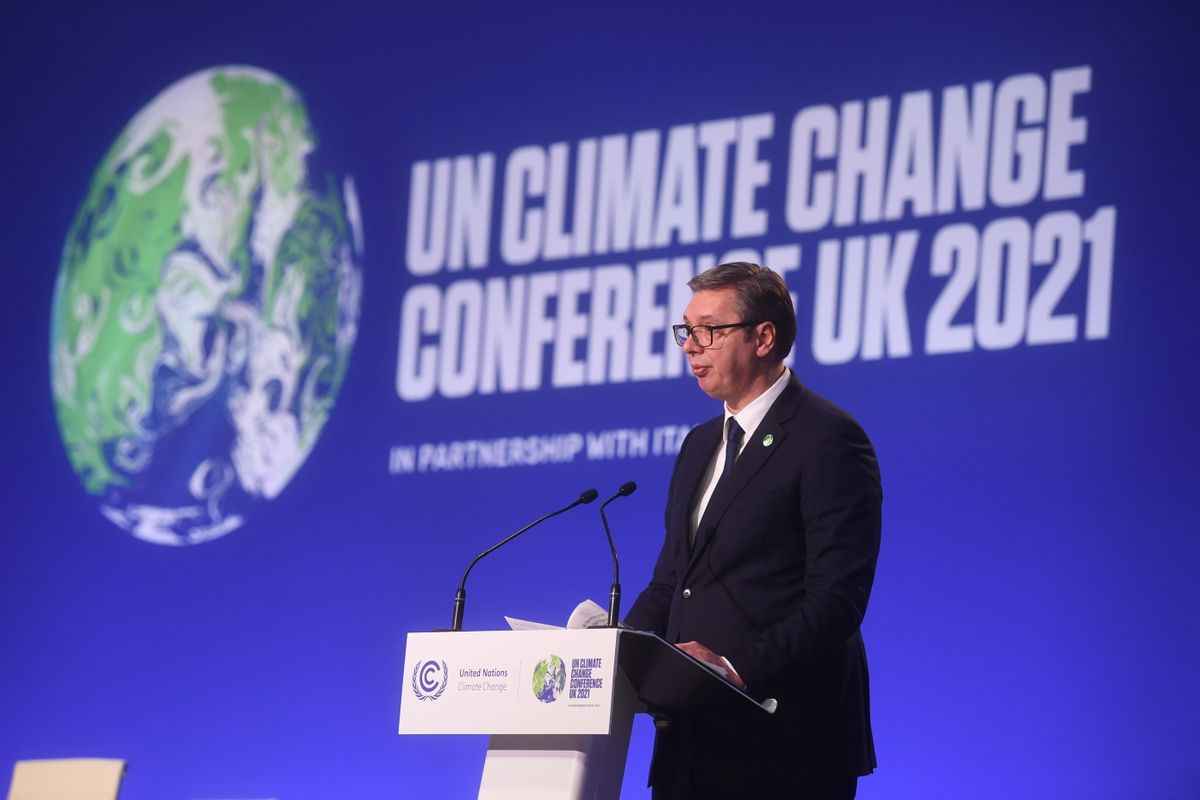
Source: www.predsednik.rs
Photo: Dimitrije Goll |
|
|
| Meeting with the Mayor of Nairobi |
|
Ambassador Dragan Zupanjevac was recieved by the Director General Nairobi Metropolitan Services, L.t.General Mohamed Badi. During the visit the possibilites of enhancing cooperation between the city of Nairobi and Belgrade and Serbia were discussed. It was agreed that a delegation of Nairobi should soon visit Belgarde and Serbia.
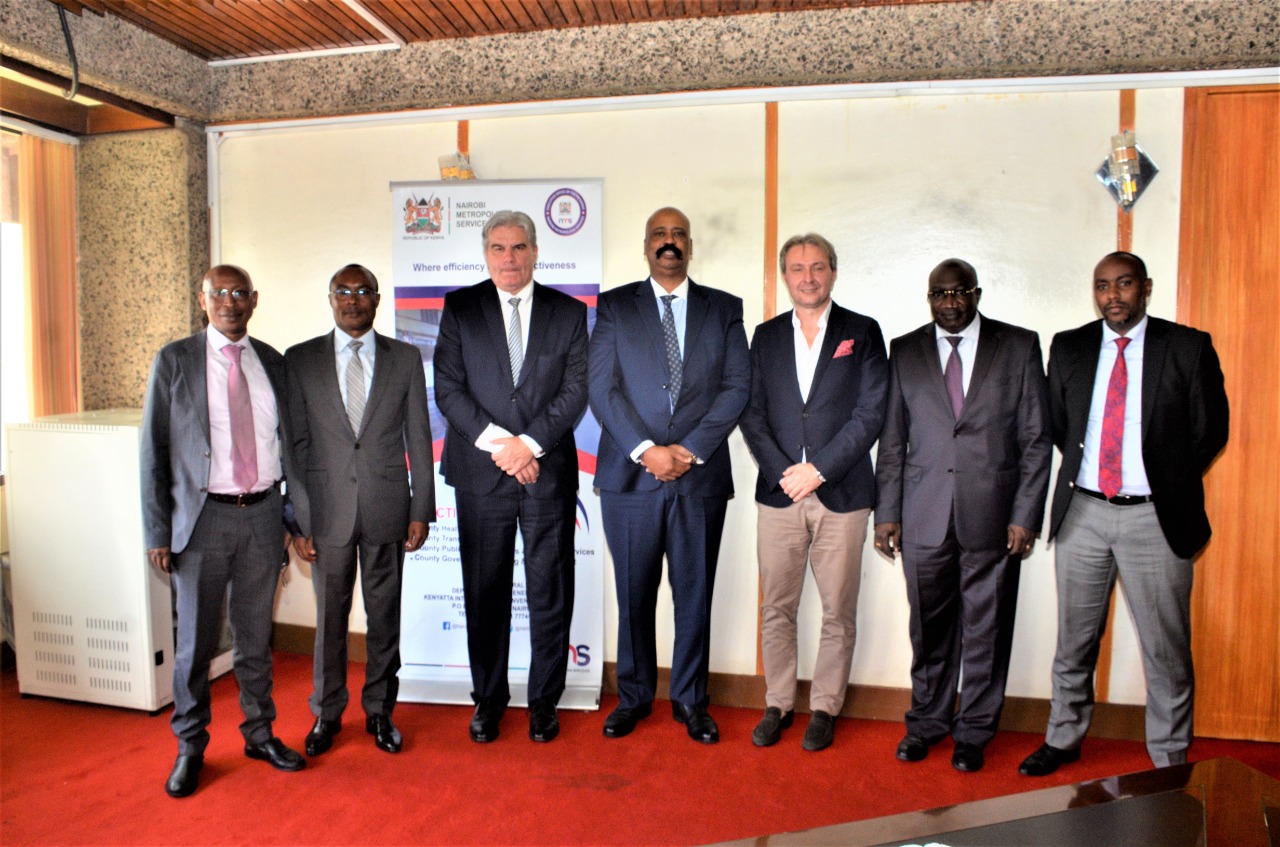 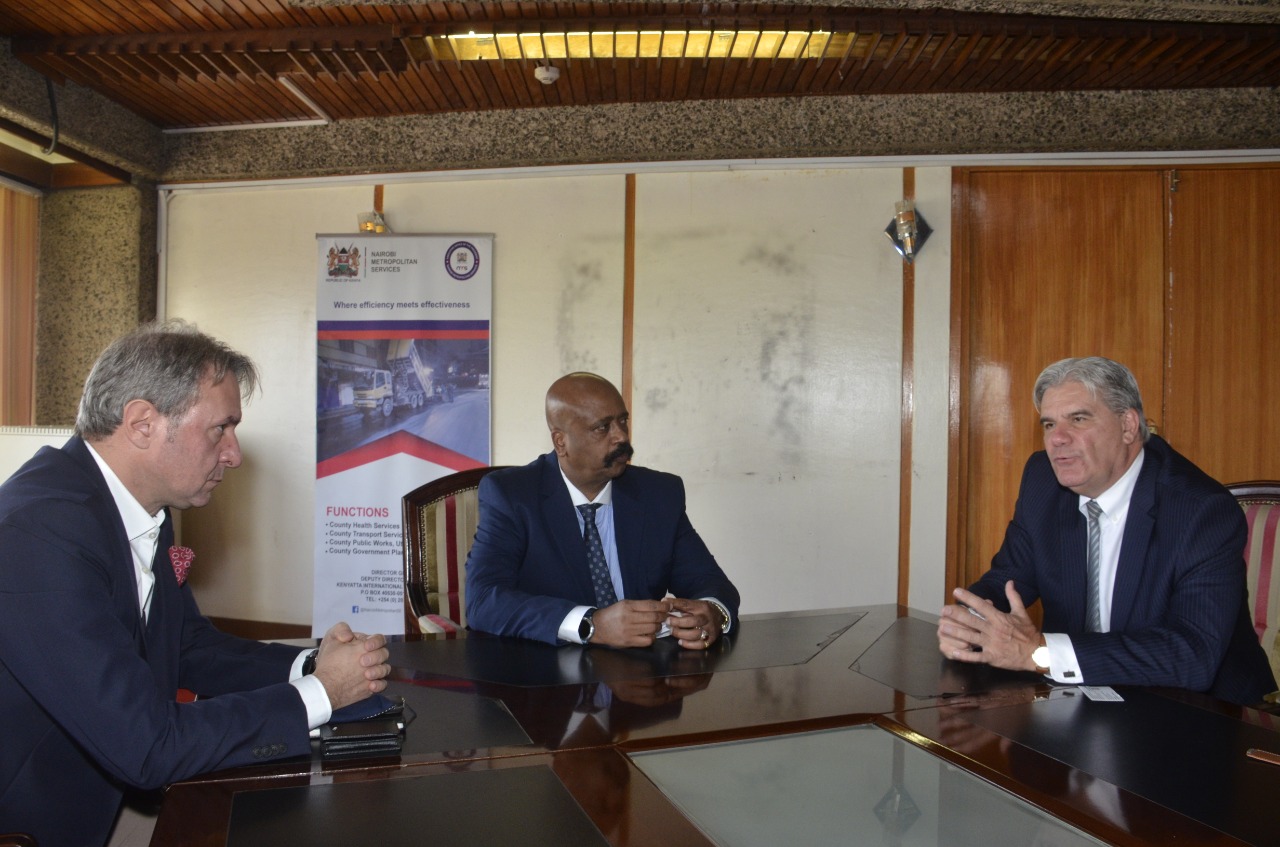 |
|
|
| The Minister of Foreign Affairs of Serbia, Nikola Selaković, spoke, on the sidelines of the commemorative gathering of the Movement of Non-Aligned Countries in Belgrade, with the Minister of Foreign Affairs of Uganda, Jeje Odongo Abubaker. |
|
It was pointed out during the meeting that the political relations between Serbia and Uganda are traditionally friendly and good, and that the memory of the role of the SFRY in the period of anti-colonial struggle still represents one of the positive foundations on which our modern relations are based.
Minister Selaković stated that the impetus for political relations between Serbia and Uganda should be given by more frequent exchange of visits at a high level. The parties called for strengthening cooperation in all fields of mutual interest, primarily in the field of economy and infrastructure construction. The head of Serbian diplomacy thanked his interlocutor for Uganda's principled support to Serbia's territorial integrity and sovereignty.
The Minister said that our country is ready to intensify cooperation in the fields of education and culture, emphasizing that we give special attention to the “World in Serbia” program, wishing that young people from Uganda will apply for scholarships and gain education in our country. On this occasion, the two ministers signed an agreement under which Serbia shall donate 40,000 AstraZeneca vaccines to Uganda.
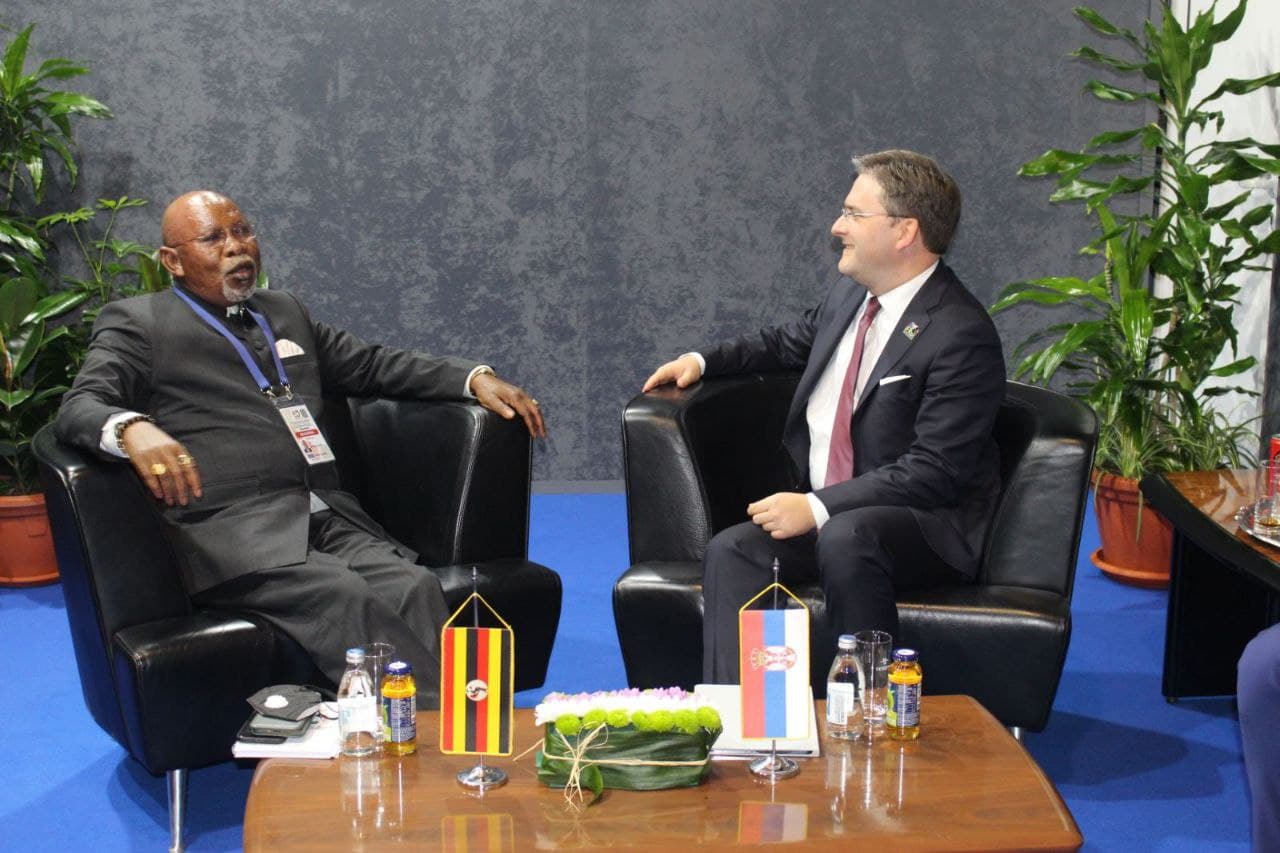 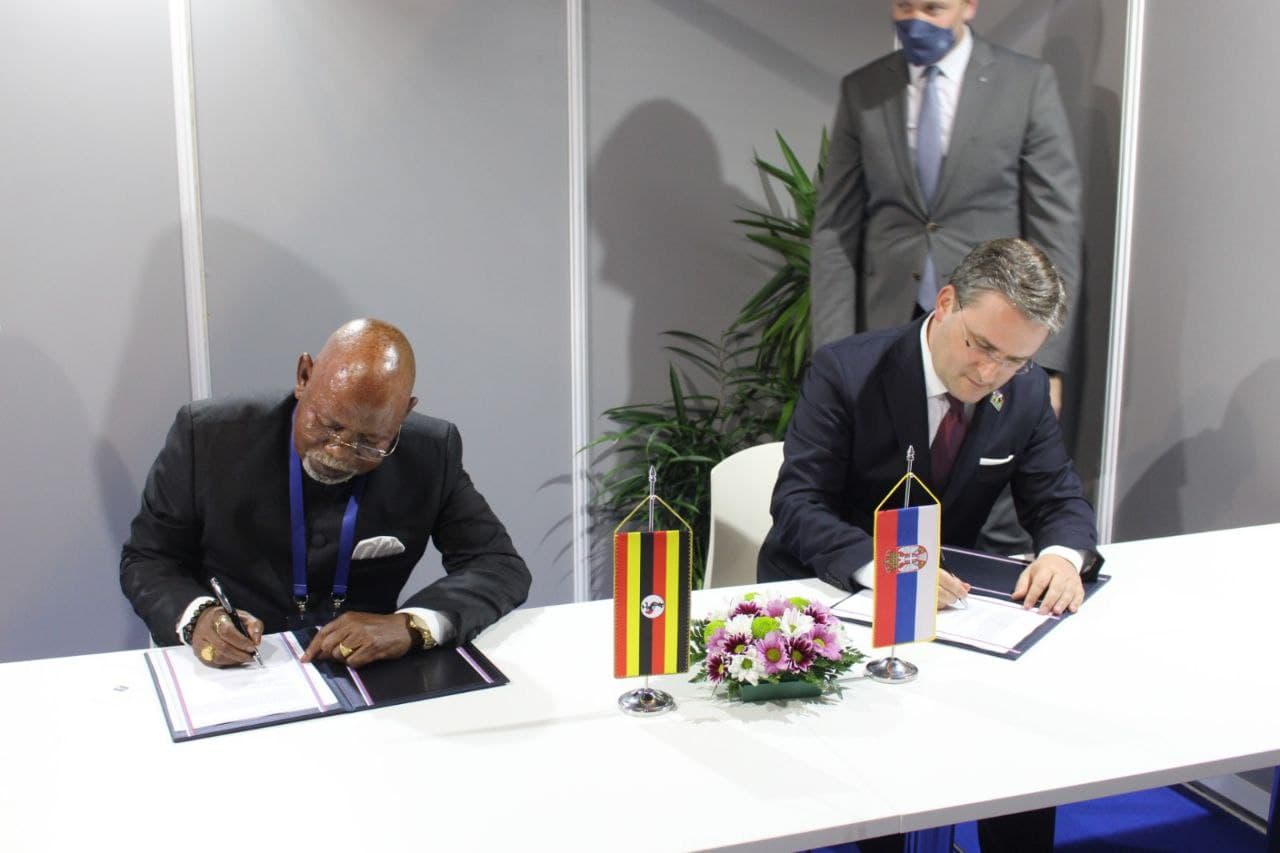 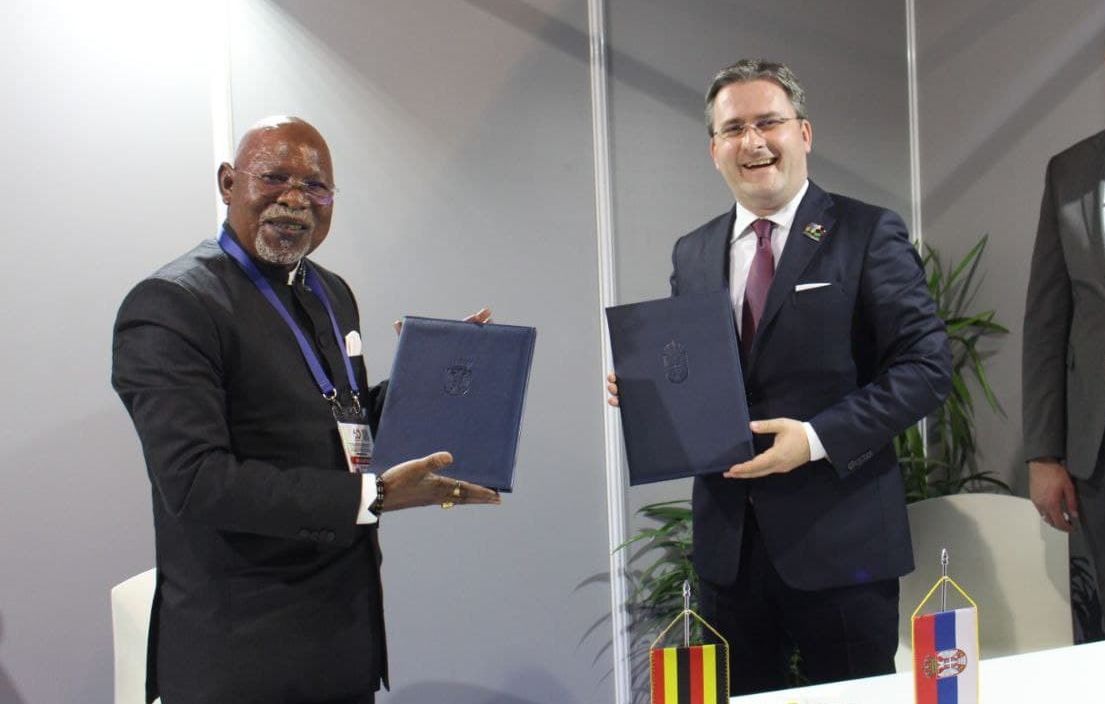 |
|
|
| 15th October 2021 - Selaković in UNSC: Dialogue and the implementation of the agreements reached are the only right way to resolve all open issues |
|
Distinguished President of the Security Council, Esteemed members of the Security Council, Distinguished Special Representative, I would like to thank Secretary-General of the United Nations Mr. Guterres and Special Representative of the Secretary-General and Head of UNMIK Mr. Tanin for the report submitted and for their efforts made towards the implementation of the UNMIK mandate. I would also like to thank the members of the Security Council for the continued attention they have devoted to the issue of Kosovo and Metohija. The Republic of Serbia highly values the activities of the Mission of the United Nations in Kosovo and Metohija and supports it in carrying out its work as efficiently as possible, pursuant to the UN Security Council Resolution 1244, and undiminished in scope, aiming to build and preserve lasting peace, stability and security in the Province. Mr. Tanin, Please accept the expressions of our gratitude for your engagement and the cooperation we achieved during your term of office. Mr. President, Deep regret and concerns are raised by the fact that the security situation in Kosovo and Metohija in the past period has been marked by an increasing number of various ethnically motivated attacks and incidents targeting Serbs, which was also stated in the Report; that the provisional institutions of self-government (PISG) in Pristina continue to take unilateral steps and refuse to implement the agreements reached in the Brussels dialogue; and that institutional discrimination against Serbs, attacks on the sites of the Serbian Orthodox Church and the undermining of the economic sustainability of Serb communities in the Province have continued. We are witnessing that dangerous provocations by Pristina are taking place every day, at an accelerated pace, thus seriously threatening the safety of Serbs in Kosovo and Metohija and directly violating the agreements and arrangements reached within the Brussels dialogue. The latest violent incursion of the so-called ROSU units into the northern part of Kosovska Mitrovica, on 13 October, is the ninth incursion of its kind. Tear gas, shock bombs and unbridled violence are becoming a matter of everyday life for Serbs in the north of Kosovo and Metohija, and that must be stopped immediately. In the last attack with firearms and chemicals used by Pristina special forces, 71-year-old Verica Djelic died as a result of chemicals used in the intervention, 10 unarmed civilians were wounded, one of them 36 years old Srećko Sofronijević was critically wounded in the back with of an automatic rifle. A three-month-old baby, who miraculously remained unharmed, was also the target of the shooting. The false excuse for the latest unilateral action, as EU High Representative for Foreign Affairs and Security Policy Josep Borrell called it, was the fight against organized crime and smuggling. Ladies and gentlemen, Serbia is strongly against organized crime and smuggling, but the members of the UNSC should know that such an important and general global goal, which we all share, was cynically used for an armed attack on unarmed civilians, which began with an automatic rifle raid of pharmacies in which patients of Serbian and other nationalities are supplied with vitally important medicines. Four days before the local elections in Kosovo and Metohija, in order to gain votes in an irresponsible and inhumane way, fully motivated by separatist goals, the current PISG regime used medicines on which people’s lives depend to prove its position on the status contrary to UNSCR 1244. Only a few days earlier, another provocation on the part of Pristina led to a dangerous crisis, when personnel of the so-called ROSU unit, armed with long firearms and reinforced with armoured vehicles, were deployed to administrative crossings between central Serbia and Kosovo and Metohija - Brnjak and Jarinje – in order to remove Serbian license plates and replace them with temporary ones, thus violently preventing the free movement of citizens. These events do not fall within the reporting period covered by the latest Report of the UN Secretary General on the work of UNMIK, but it is incumbent upon us to address them on this occasion, in order to have everyone understand how dramatic the situation on the ground has been and how serious the consequences of Pristina's unilateral actions can be. The incursions of heavily armed Pristina police formations, composed exclusively of Albanians, into the north of Kosovo and Metohija, under various pretexts and motives, with the use of excessive force, are provocations that have an extremely dangerous potential to destabilize the already sensitive security situation on the ground. The goal of the latest incursions of Pristina’s special force personnel into the north of the province was to provoke the Serbs and additionally intimidate them with a demonstration of force, as well as to provoke Belgrade to react hastily in some way. It is obvious that with such moves Pristina aims to erase the 10 years of dialogue, which is the only way to resolve open issues. These provocations once again demonstrate that the provisional institutions of self-government in Pristina, not only do not intend to implement everything agreed in the Brussels dialogue, but that their goal is to completely deny dialogue as a means of resolving problems. An effective response to Pristina's lack of credibility and their dangerous play with fire, which could have unforeseeable consequences, cannot be provided by calling on "both sides" for constructiveness and restraint, which has long been a manner in public communication of some important factors in the international community. There is only one source of destabilization, it has a name – and that is the provisional institutions of self-government in Pristina - and after the events of 13 October, it is clear that it can and needs to be stopped by urgent and decisive action of the international community. It is now quite obvious that these are no longer sporadic and isolated provocations by Pristina, but that this is an organized campaign of ethnically motivated violence and discrimination against Serbs. We also express our concern over the latest imposition of tariffs by Pristina on certain products originating from central Serbia, which was made public on 8 October. We remind you that the unilateral decision of Pristina to impose duties on products from central Serbia in November 2018 resulted in a de facto complete trade blockade and a long-term stalemate in the dialogue between Belgrade and Pristina. In contrast to Pristina, which persistently seeks to raise barriers towards central Serbia through unilateral acts, Belgrade is persistently and consistently working to liberalize the flow of people, goods, services and capital, which is the basic goal of our "Open Balkan" initiative. North Macedonia and Albania joined this initiative, but Pristina did not. Distinguished members of the Security Council, In the period from March to September this year, which is covered in the latest Report, close to 100 ethnically motivated attacks were carried out against Serbs, their private property, religious and cultural heritage sites. The increase in the frequency of attacks was accompanied by the strengthening of the intensity of ethnically motivated violence, which more and more often targets children, the elderly, women, the few returnees present there, as well as churches and other property of the Serbian Orthodox Church. This systematically intensifies the ubiquitous sense of insecurity of the remaining Serbs, but also deters potential returnees, who are in fact being told that local Albanian communities can attack them with impunity and prevent them from returning to live in their own homes. The most striking example of the position of Serbs in Kosovo and Metohija is the case of the displaced person Dragica Gašić, who moved into her apartment in the municipality of Djakovica again in early June. In that town – to which local Albanians proudly refer as a place forbidden to Serbs - Ms. Gašić, on her return, first faced physical and verbal attacks by citizens of Albanian nationality living there. Instead of being provided protection, that seriously ill woman then became a victim of institutional persecution as well, that the local self-government bodies and the police unleashed against her. Since this is a person who is the first and only Serb returnee to Đakovica after more than twenty years, it was to be expected that, at that moment, at least civil society organizations would attempt to protect her rights. However, NGOs from Djakovica soon joined the activities aimed at the expulsion Ms. Gašić, including those receiving funding from international donors for projects related to strengthening democracy and the rule of law. I must also mention the latest attack on the house of the only remaining Serbian woman in the center of Pec, retired teacher Rumena Ljubić, whose windows were stoned twice in just 24 hours on 13 October. Dragica's and Rumena’s fate is a frightening reflection of the real situation of human rights that almost every one of over 200,000 displaced Serbs and non-Albanians would face in Kosovo and Metohija - provided that they gather the courage to return to their homes in the Province after more than twenty years. I would like to remind you again that since 1999, only around 1.9% of internally displaced Serbs and other non-Albanians have achieved a sustainable return to Kosovo and Metohija. Therefore, I believe that the aforementioned will encourage the members of the Security Council and the international presence on the ground to devote priority attention in the future to the issue of the return of displaced persons, which is an important part of the UNMIK mandate under UN Security Council Resolution 1244. I therefore thank the Secretary-General in particular for keeping this extremely important issue in focus and for calling again, in the conclusions of his Report, for the creation of conditions for the sustainable return of internally displaced persons and the sustainable reintegration of returnees. Distinguished members of the Security Council, Serbian medieval monuments in Kosovo and Metohija, including monuments that, due to their exceptional value but also constantly being subject to threats are inscribed on the UNESCO List of World Heritage in Danger, are still among the most endangered cultural heritage in Europe. I wish to recall that there are over 1,300 Serbian churches and monasteries in Kosovo and Metohija. Attacks on Serbian cultural and religious heritage are at the same time attacks on the identity of Serbs in the Province and directly affect their sense of safety. A striking example of disrespect for Serbian cultural and religious monuments in the Province is the case of the Visoki Decani monastery. The monastery, which has been the target of attacks and shelling several times since 2000, is still secured by KFOR forces due to being under a threat. It is faced with a series of hostile actions, and the perpetrators are not deterred by the fact that this is a World Heritage Site. Despite frequent declaratory statements, even the decision of the so-called "constitutional court" of the PISG in Pristina five years ago confirming ownership of Visoki Decani Monastery over 24 hectares, is not respected. We welcome the assessment made by the UN Secretary General in his Report. Dear Mr. President, The Republic of Serbia remains committed to finding a compromise political solution, as prescribed under Resolution 1244, which will ensure lasting peace and stability. We firmly believe that dialogue and the implementation of the agreements reached are the only right way to resolve all open issues. As a state committed to the respect for international law and a member of the United Nations, Serbia opposes any attempt at establishing an artificial balance between the parties in the dialogue, as well as the relativization of responsibility for unilateral acts. We note with concern that not even eight years after reaching the Brussels Agreement, the establishment of the Community of Serb Municipalities has not been initiated, although Belgrade has fulfilled all its obligations under that agreement. There are also numerous and repeated examples of Pristina violating or obstructing agreements reached in dialogue, in the areas of energy, justice, freedom of movement and visits by officials. One such example is the verdict sentencing Ivan Todosijevic to two years in prison, which is also pointed out in the Secretary General's Report. The Brussels Agreement was directly breached, which was also stated by the representatives of the European Union. With its conduct Pristina caused immeasurable damage to the reconciliation process in Kosovo and Metohija. Despite the interpretation from the European Commission that this is a violation of the Brussels Agreement, because Todosijevic had to be sentenced by a panel consisting of the majority of judges of Serbian ethnicity, Pristina still does not take any action in this regard. Pristina also continued with the practice of banning Serbian officials from entering the territory of the Autonomous Province of Kosovo and Metohija. We believe that it is important that the international community, and especially the European Union, as the guarantor of the agreement, firmly insists that the provisional institutions of self-government in Pristina start implementing all the agreements reached. Distinguished members of the Security Council, As before, the Republic of Serbia remains fully committed to resolving the issue of missing persons, as also demonstrated through full cooperation with relevant international mechanisms as well as participation in the work of the Working Group on Missing Persons. We expect that the representatives of the provisional institutions of self-government in Pristina will fulfill their obligations. Bearing in mind everything I delivered here today in my address, we hold the position that the international presence in Kosovo and Metohija, pursuant to UN Security Council Resolution 1244, is still necessary. In addition to UNMIK, the presence of KFOR as the main guarantor of security and EULEX, due to its engagement in the field of the rule of law, is also important. I would like to emphasize once again that Serbia fully supports respect for international law, comprehensive implementation of UN Security Council Resolution 1244 and activities of UNMIK in an undiminished scope and with adequate financial resources, so that the Mission fulfills the mandate entrusted to it under the Resolution. Thank you.
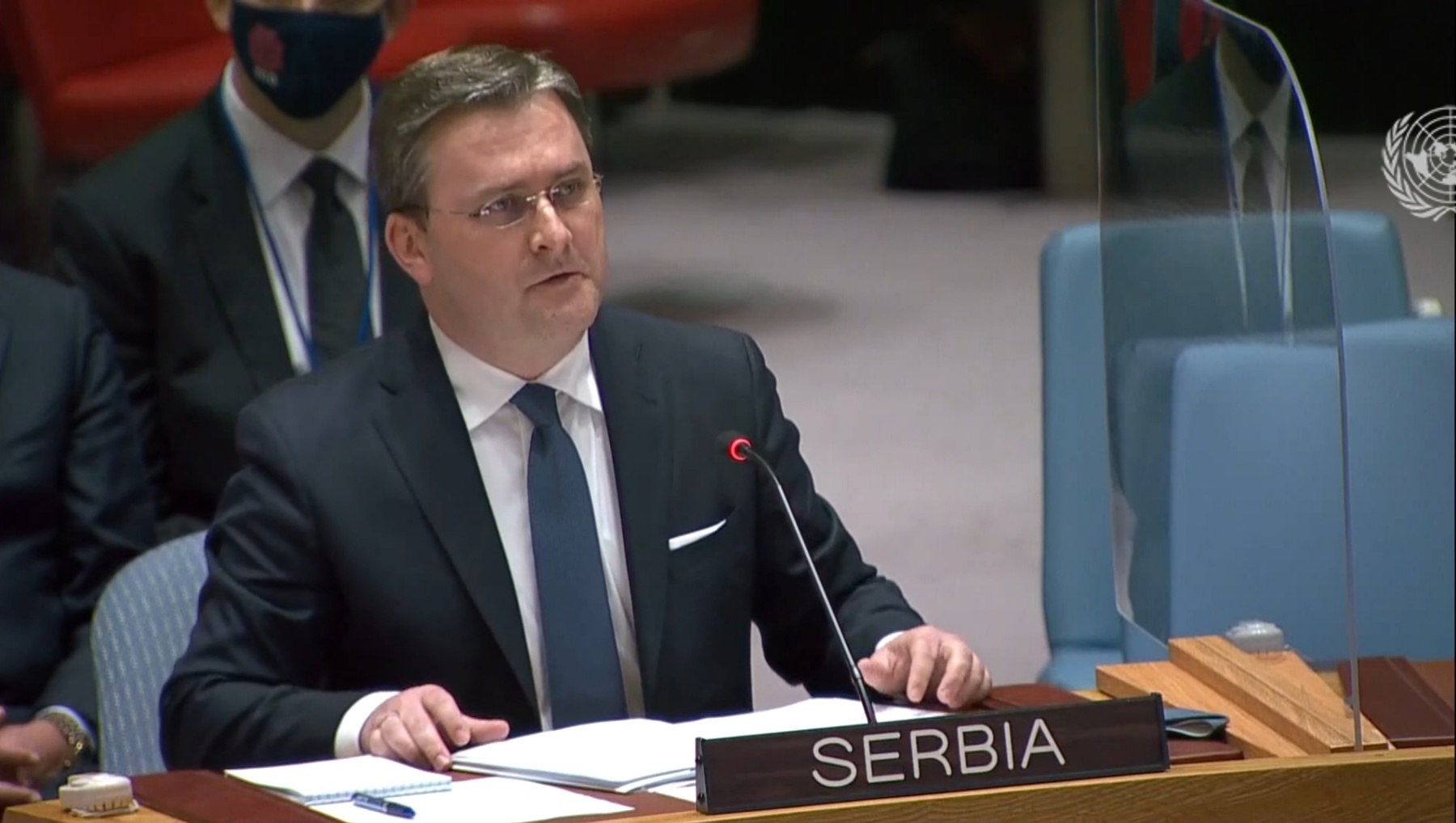 |
|
|
| The Minister of Foreign Affairs of Serbia, Nikola Selaković, met with the Chief Administrative Secretary of Ministry of Foreign Affairs of Kenya, Ababu Namwamba. |
|
Minister Selaković thanked the Kenyan delegation for attending the high-level meeting marking the 60th anniversary of the first conference of the Non-Aligned Movement, saying that the two countries have a long lasting friendship dating back to 1963, and that the Father of the Kenyan nation, Jomo Kenyatta, was very fond of the SFRY. Selaković stated that the economic cooperation of our countries is below real possibilities and levels of political relations, but he also pointed out that there is great potential for its improvement. The Minister also spoke about cooperation in the field of education, through the “World in Serbia” project, and Serbia's intention to increase the number of scholarships for students from African countries in the next academic year, expressing hope that students from Kenya will continue to apply to study in our country.
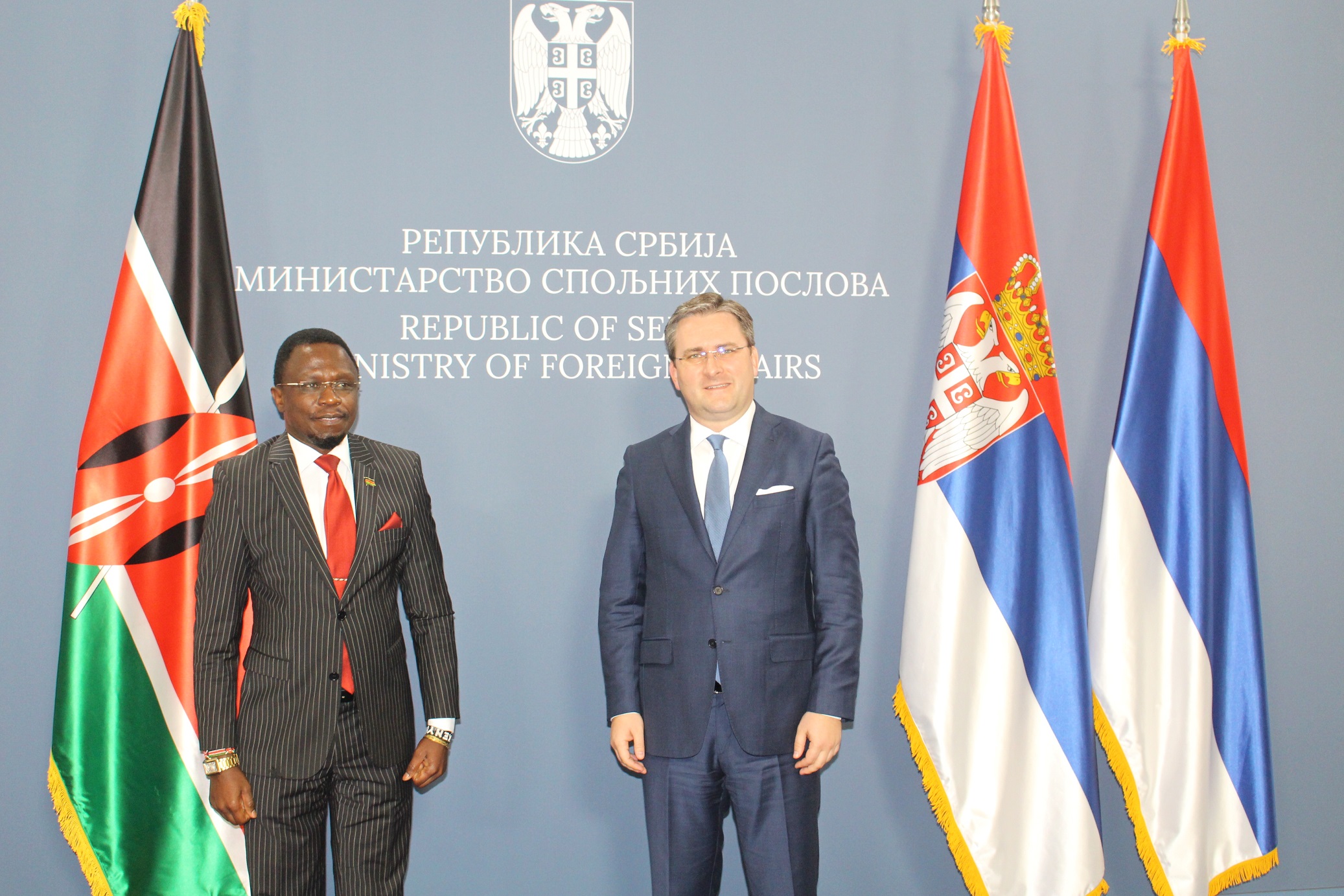 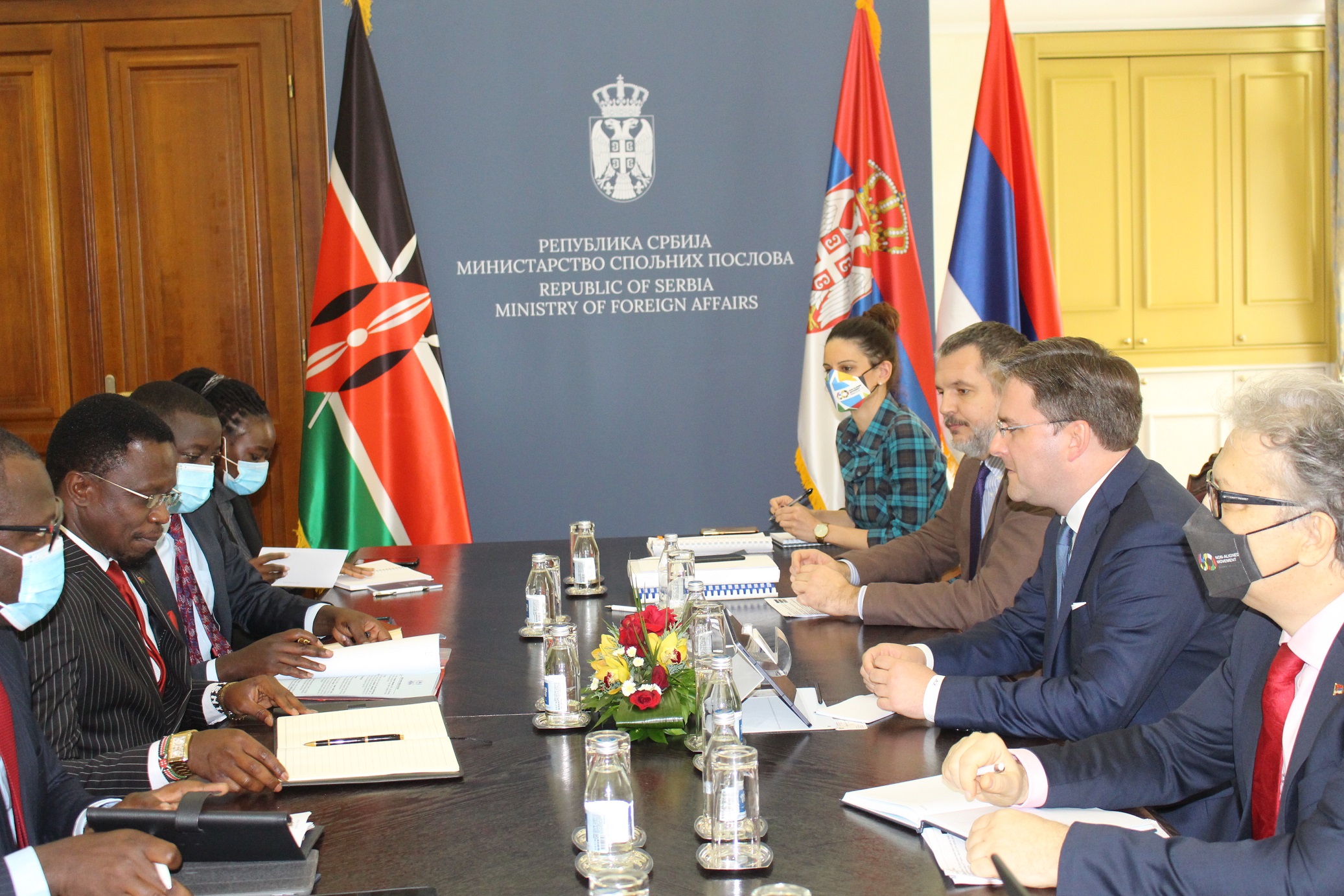 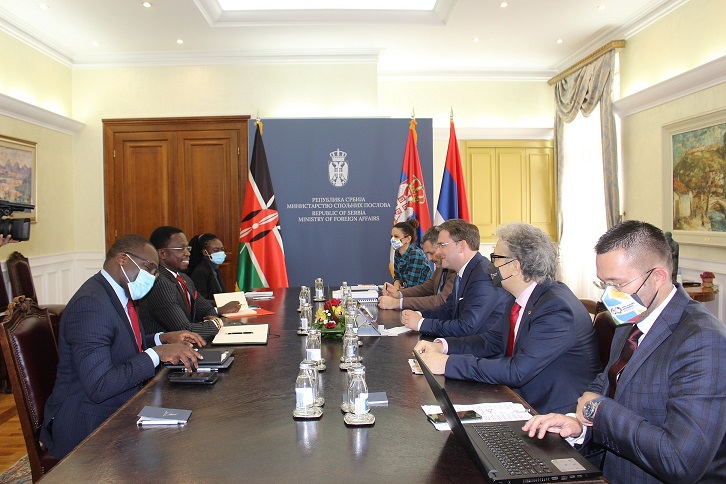 |
|
|
| The Minister of Foreign Affairs of Serbia, Nikola Selaković, met today, on the sidelines of the meeting being held on the occasion of the 60th anniversary of the first conference of the Non-Aligned Movement, with the Minister of Commerce and Industry of Somalia, Khalif Abdi Omar. |
|
During the conversation, Selaković reminded of the rich history of diplomatic relations between Serbia and Somalia, and referred to the successful cooperation between the two countries in the Non-Aligned Move At that time, the two countries had developed economic cooperation and many students from Somalia were educated in our country, and Serbia, according to Selaković, is still willing to increase the number of scholarships for young students from Somalia through the “World in Serbia” program. On this occasion, Selaković also expressed satisfaction with the reopening of the Somali embassy in Belgrade, sharing the expectation that this will contribute to the intensification and improvement of economic cooperation, especially in areas such as trade, agriculture and the IT industry.
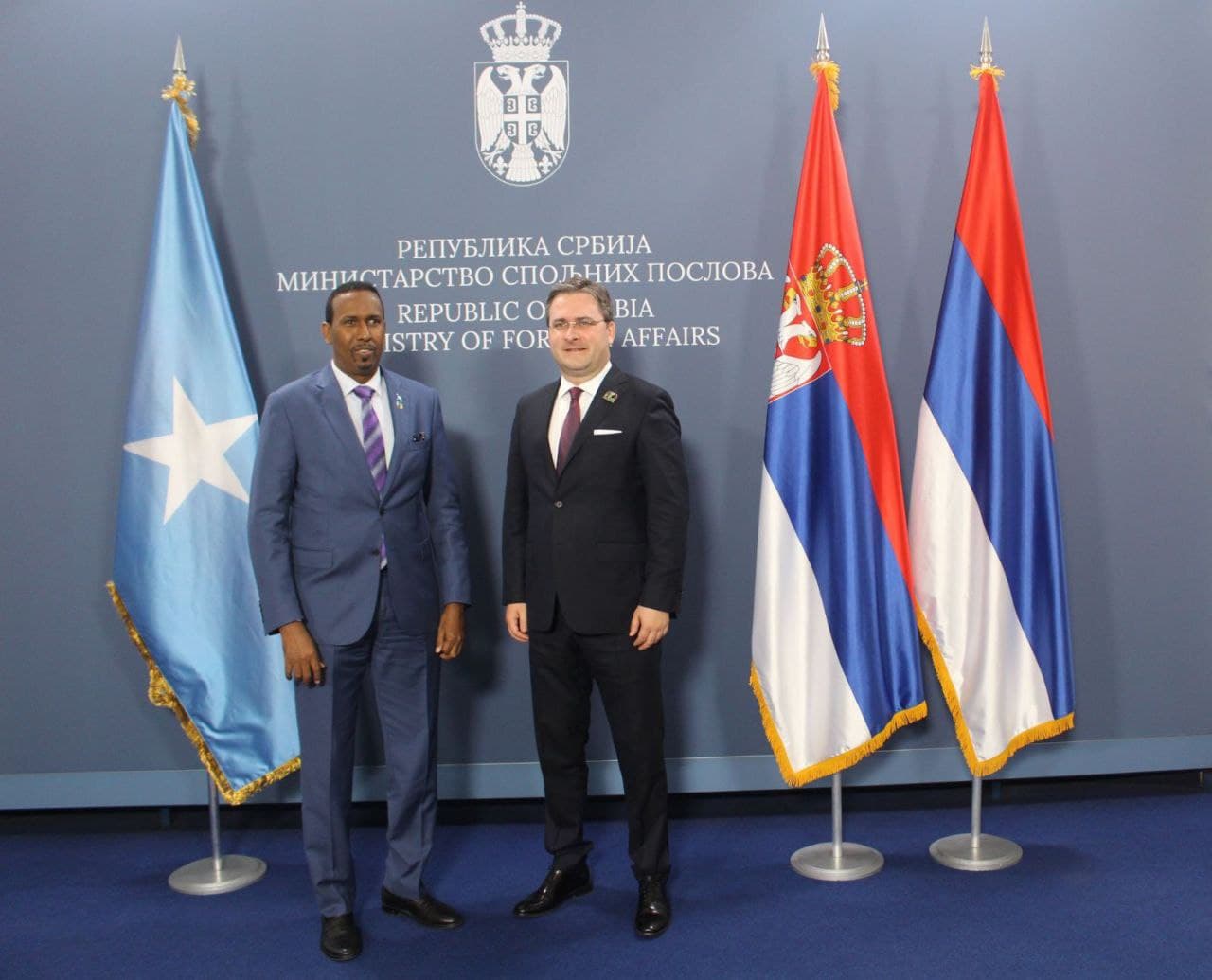 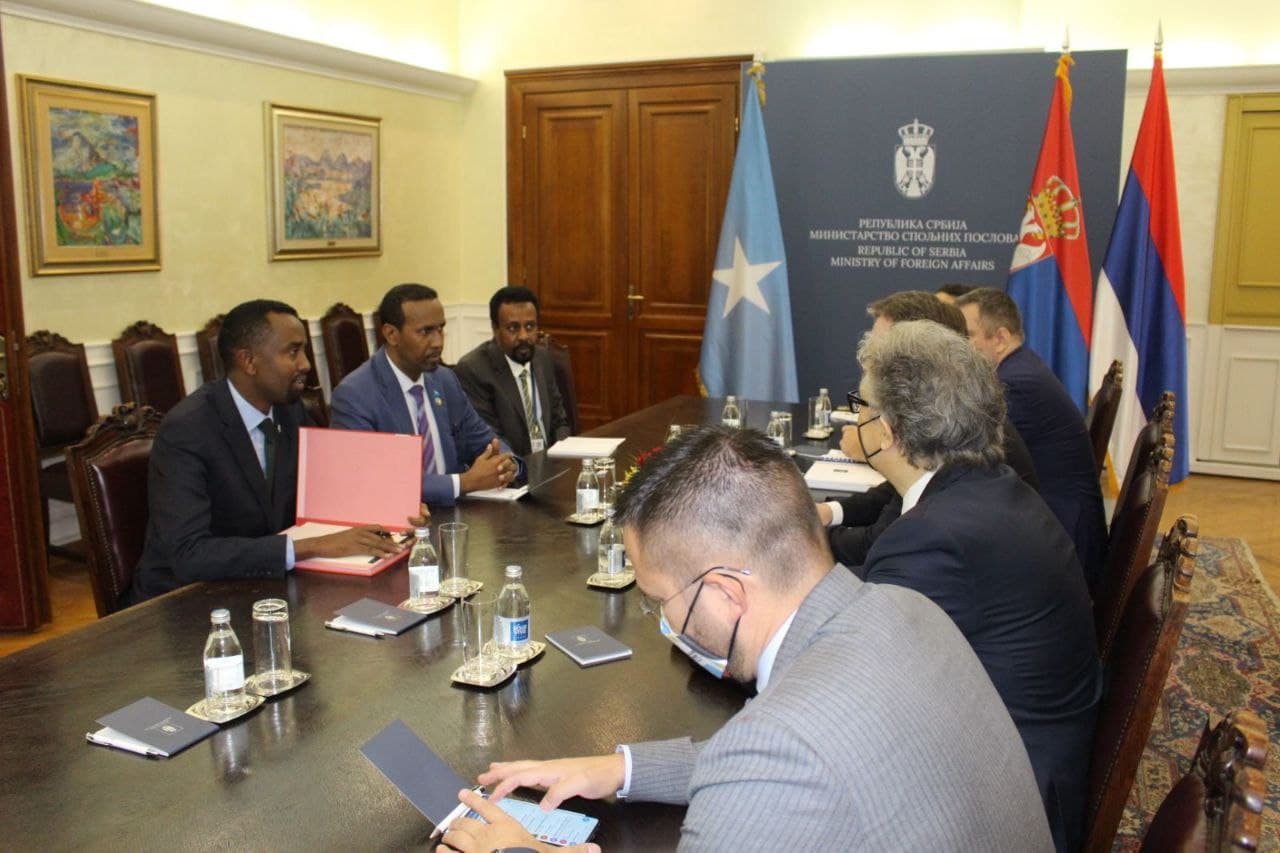 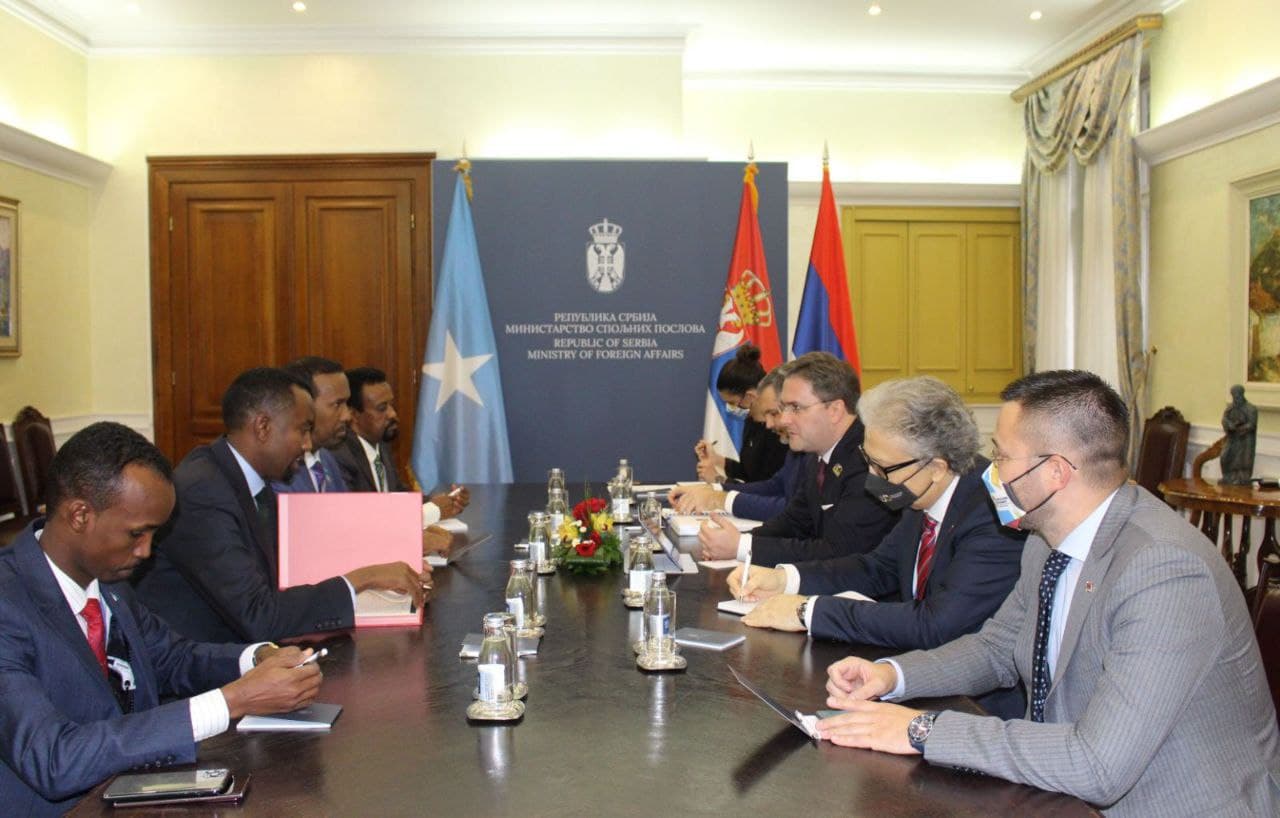 |
|
|
| The Minister of Foreign Affairs of Serbia, Nikola Selaković, met with the Minister of Foreign Affairs of Eritrea, Osman Mohammed Saleh, who participated in the gathering marking the 60th anniversary of the first conference of the Non-Aligned Movement. |
|
Minister Selaković assessed that there is plenty of space for strengthening the political dialogue at high and highest levels through the exchange of visits, as well as for the improvement of economic cooperation, reminding that next year our countries will mark ten years of diplomatic relations. The head of Serbian diplomacy stated that trade, agriculture, agro-industry and defence industry are areas in which there is room for the cooperation development.
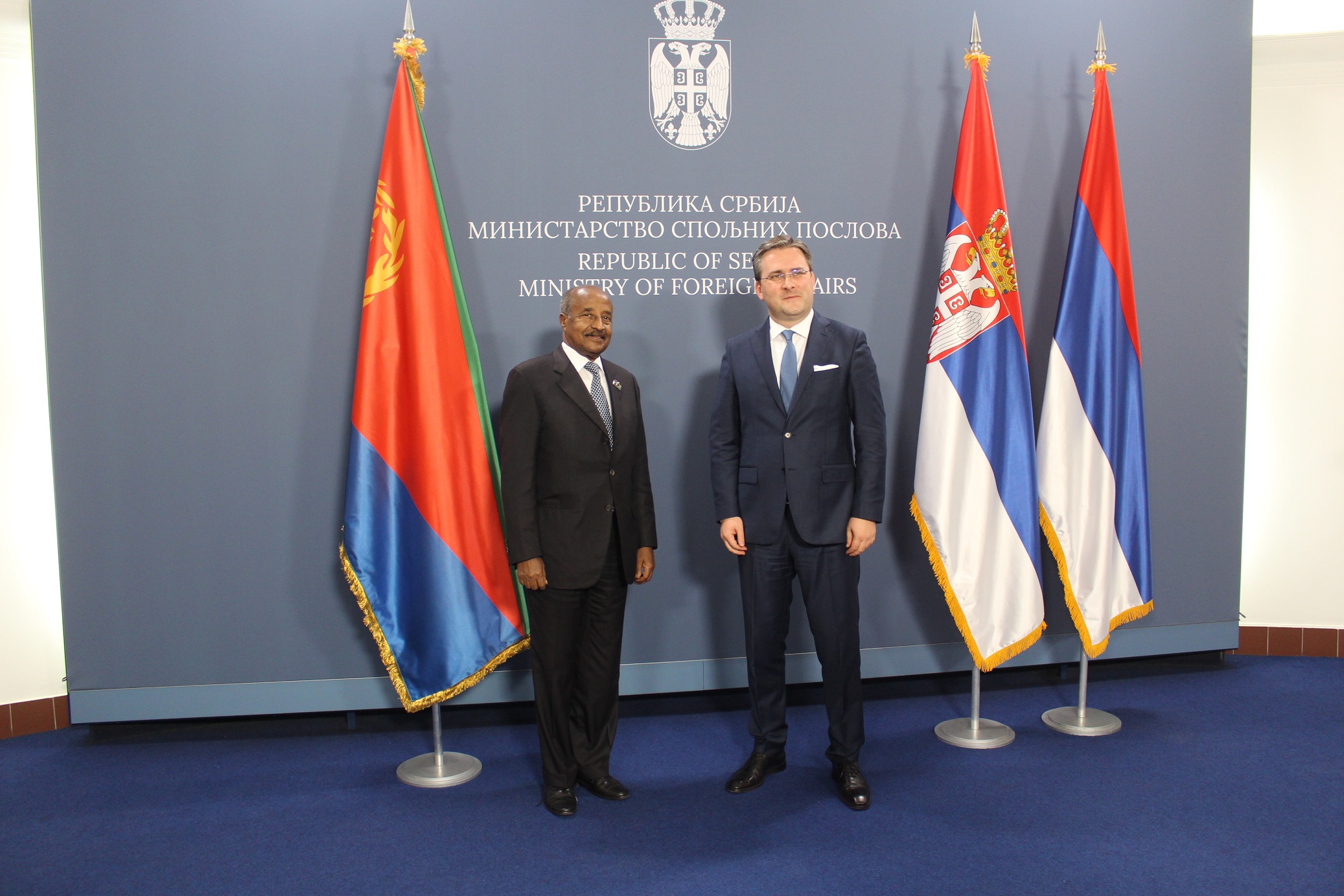 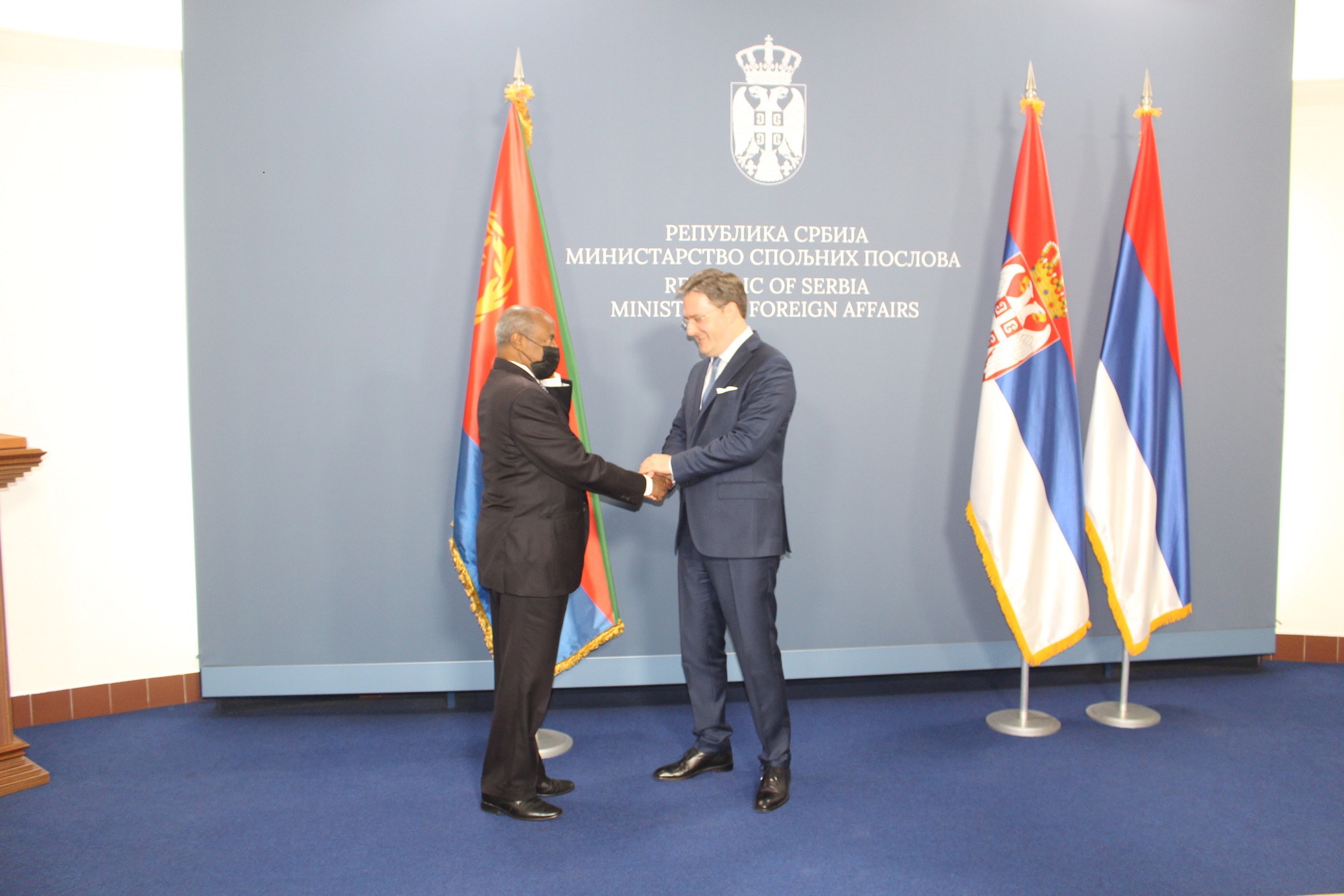 |
|
|
| 25 September 2021 - Selaković in New York with 28 foreign ministers on economic successes of Serbia and K&M situation |
|
The Minister of Foreign Affairs of Serbia, Nikola Selaković, has stated that in New York he introduced foreign ministers of 28 countries to economic success of Serbia but also to the situation in Kosovo and Metohija, which he also discussed with the Russian Minister of Foreign Affairs, Sergey Lavrov, who told him that we could count on the support of the Russian Federation, with regards to Serbian interests in K&M. Summarizing results of his visit to New York within the session of the UN General Assembly, Minister Selaković says that one of the last meetings was with Minister Lavrov, which was their third meeting in the previous nine months.The Serbian Foreign Minister says that he surely used this opportunity, too, to introduce Minister Lavrov to the latest events in northern Kosovo and Metohija, the situation of the dialog between Belgrade and Priština and very clear and unambiguous attitude of President Aleksandar Vučić regarding the continuation of the dialog and subsequent events in K&M. “We discussed the principled support of the Russian Federation, which is constantly present not just in Moscow, Belgrade, in the field, but also here in the East River, by the delegation of the Russian Federation as the permanent member of the UN Security Council. Of course, we will continue to maintain this type of dialog.
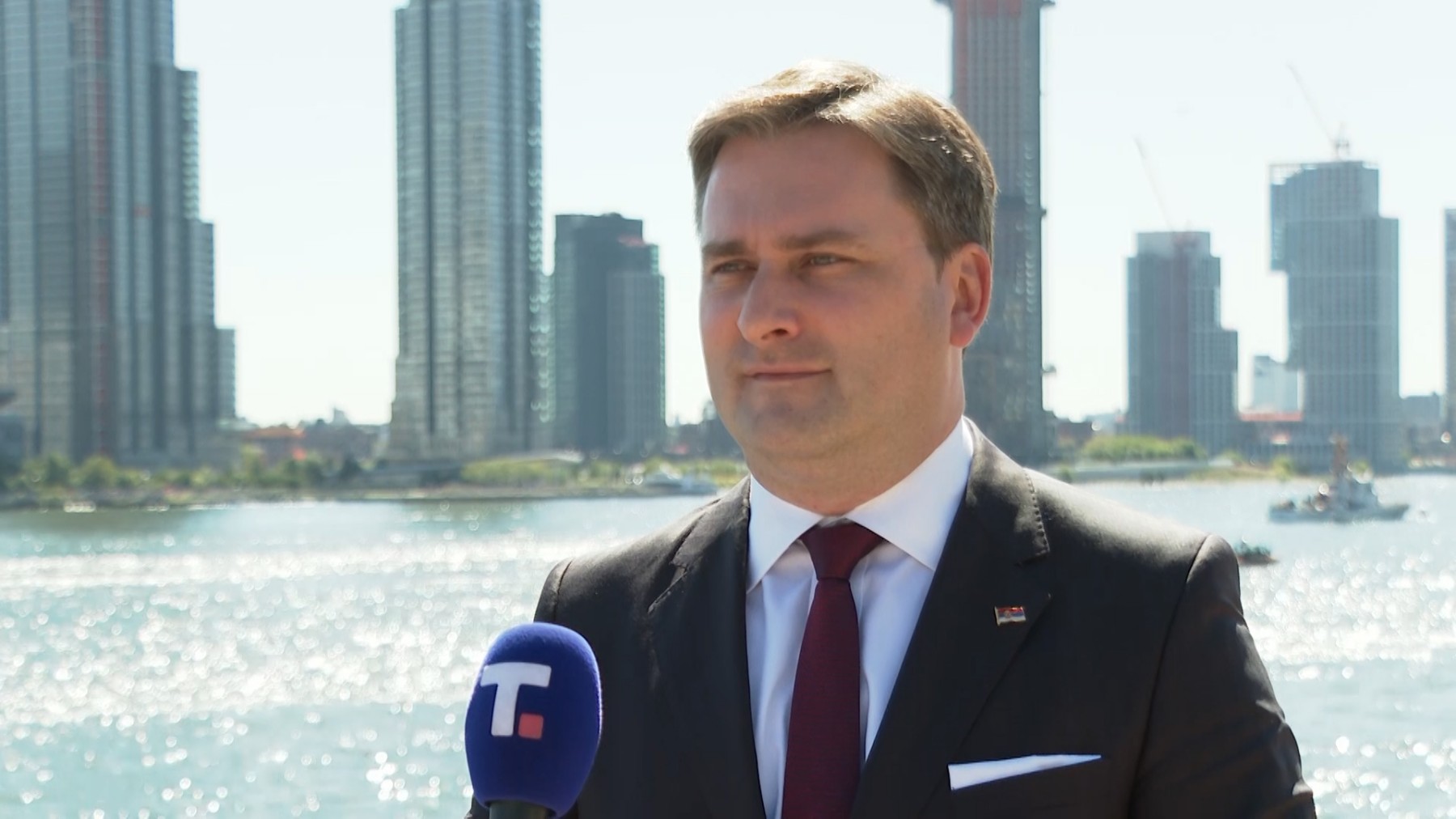
What Minister Lavrov said was that we could count on the support of the Russian Federation in future with regards to our interests in K&M”, highlighted Minister Selaković. He said that he had had the opportunity in New York to hold 33 meetings, of which 28 with ministers of foreign affairs, whom he had introduced also to topicalities related to the latest events in Kosovo and Metohija, but also to our principled position regarding the observance of the international public law, territorial integrity and sovereignty. Minister Selaković said that his colleagues at the meetings had praised the substantial and fantastic success of Serbia in the consolidation of the economic sphere and transformation of what had been on the edge of collapse and economic disaster seven years before to the fastest growing economy in Europe, which Serbia was in the past two years. He said that most of his interlocutors had supported our reforms and expressed great respect toward what President Aleksandar Vučić and Serbia had done in the previous period. Many of them, says the Serbian Foreign Minister, showed great interest in the manner in which Serbia organized the figth against Covid 19. “It was a great pleasure and pride to represent the Republic of Serbia in all these meetings. Many of my colleagues confirmed their arrival to Belgrade to the Conference on 11th and 12th October, which is dedicated to the 60th anniversary of the foundation of the Non-Allied Movement”, said Minister Selaković. He emphasized that it was not just the evidence of how much they had cared to come to Belgrade to the conference, but also to see and witness the Serbia which after several decades of attempts to fight different challenges rose to its feed, was economically consolidated and turned towards its traditional friends. “That is a great deal and our country will surely during October be one of the spots on Earth of greatest importance for multilateralism, for cooperation among the countries which share the same values, the values entered into the UN Charter and which are based on the promotion and fight for peace, equality, observance of the international public law and rights of every country to pursue its path to happiness and better and more ordered society in compliance with the wishes of its population”, said Minister Selaković. He said that the Minister of Foreign Affairs of Azerbaijan, Jeyhun Bayramov, would come to Belgrade to the conference on the occasion of the Non-Allied Movement adding that we had strategic cooperation with Azerbaijan and frequent contacts. “We agreed to realize as soon as possible after the Belgrade conference his bilateral visit to Serbia”, added Minister Selaković. He said that it had been agreed to intensify the cooperation and finalize the agreements which should be signed and after that realized when the meeting of Serbian President Aleksandar Vučić and Azerbaijan President Ilham Aliyev took place. Minister Selaković says that the Ministry of Foreign Affairs had recently received its sector for economic diplomacy and there were great expectations from it and one of the tasks was to deepen the cooperation with Azerbaijan |
|
|
| 23 September 2021 Great potential to improve cooperation of Serbia and Rwanda |
|
The Minister of Foreign Affairs of Serbia, Nikola Selaković, has met in New York today with the Minister of Foreign Affairs of Rwanda, Vincent Biruta. Minister Selaković stated in the discussion that there is a great potential for strengthening of bilateral relations, which could be encouraged by high and top-level meetings. Minister Biruta accepted the invitation of Minister Selaković and confirmed that the official visit to Serbia would soon be realized. Thanking for this, Minister Selaković expressed the expectation also that the high-level delegation of Rwanda would take part in Belgrade at the upcoming celebration of the 60th anniversary of the First conference of the Non-Allied Movement. According to words of the Serbian Foreign Minister, particular possibilities for the intensification of cooperation of our two countries exist in the fields of trade and agriculture.The interlocutors reviewed also potentials for the improvement of the relations in the field of education and scientific and technological cooperation. Selaković expressed gratitude for the fact that Rwanda did not recognize unilaterally declared independence of so-called Kosovo and introduced the interlocutor with the situation in southern Serbian province and the latest provocations of Priština.
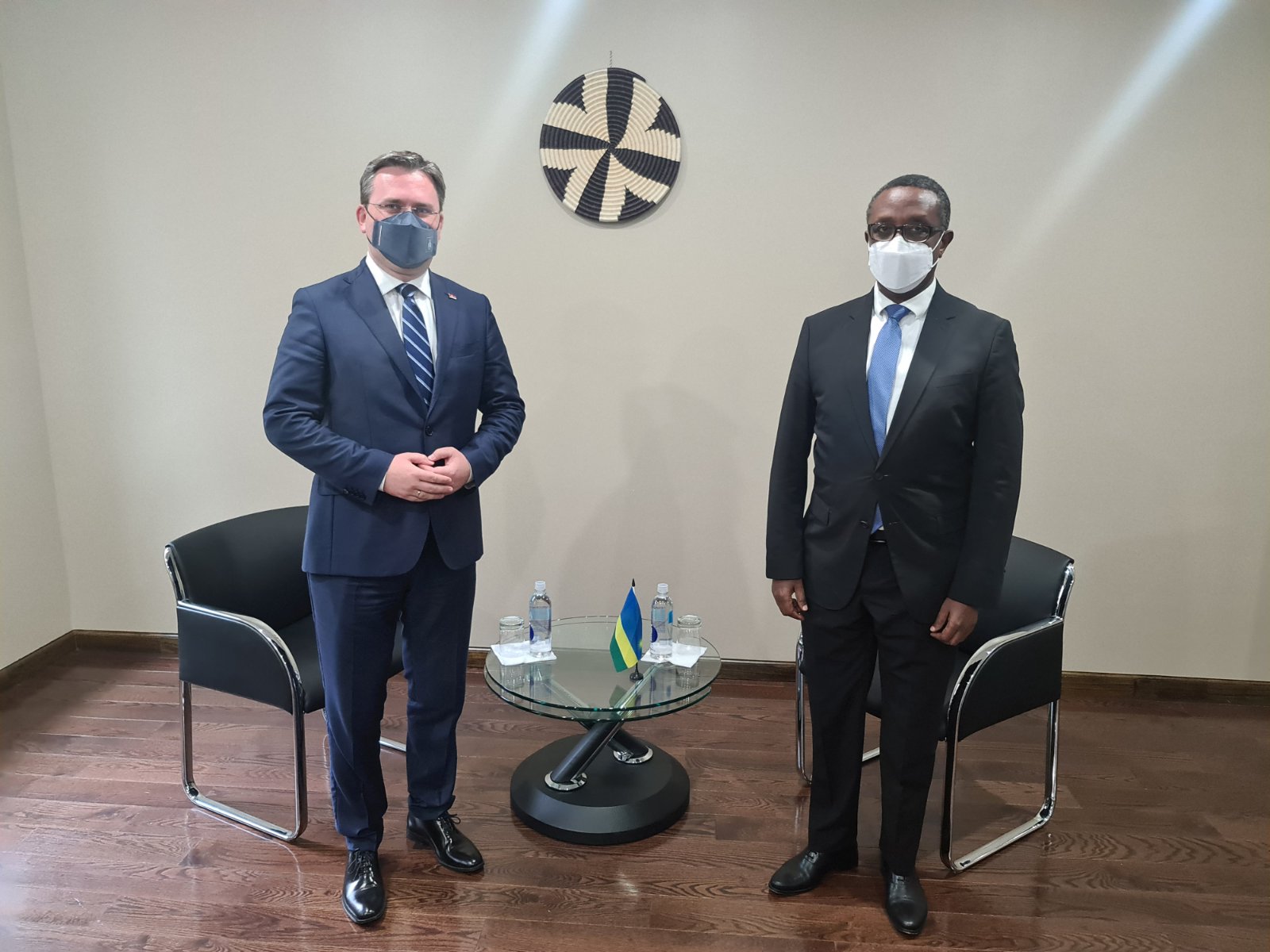 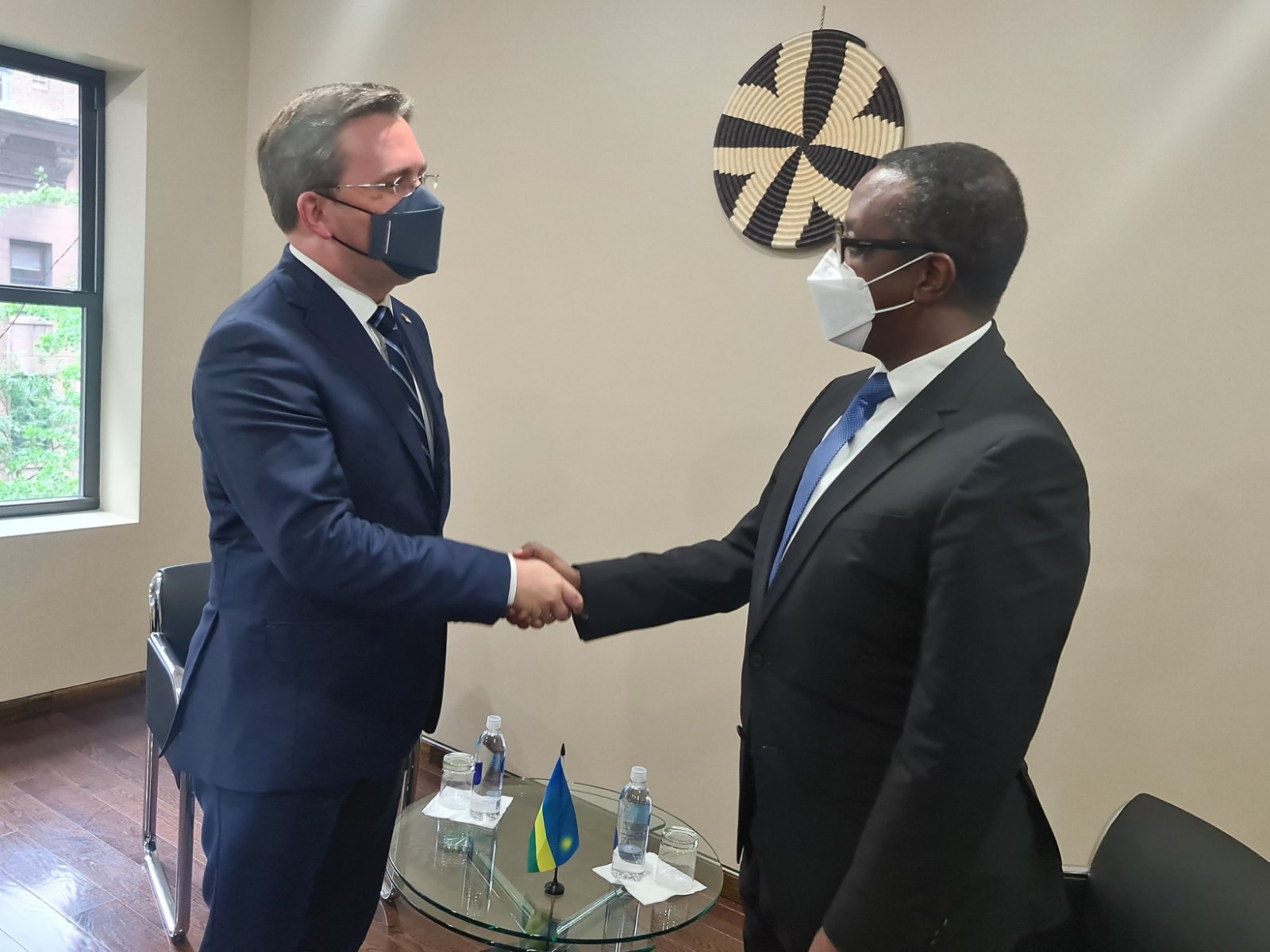 |
|
|
| 25 September 2021 - Pristina seriously jeopardized regional stability |
|
Prime Minister Ana Brnabic warned today that Pristina has seriously jeopardised local and regional stability after sending heavily armed special units to the north of Kosovo who are exerting against the peaceful Serbian population. Brnabic spoke at the general debate of world leaders, as part of the 76th session of the UN General Assembly in New York. We bring the Prime Minister's speech in its entirety:
Mr. President, Mr. Secretary General, Excellencies, Ladies and gentlemen, I have the great honor to address you today on behalf of the citizens of the Republic of Serbia. Esteemed Excellencies Mr. Abdulla Shahid, Mr. Volkan Bozkir and Mr. António Guterres, I would like thank you for the active engagement, dedication, and leadership you have shown during these difficult times for the United Nations and all of humanity. Serbia shares your conviction and we remain fully committed to supporting your efforts.This year, we come together at a decisive moment in our history. Covid-19 has shaken our foundations to the core. At the same time, we are increasingly witnessing and experiencing effects of climate change. And, finally, we are seeing significant shifts in global partnerships and alliances, trade wars between traditional partners and allies, protectionism instead of openness and free market, and overall uncertainty at an unprecedented scale. Some of the pressing and extremely emotional issues that we have locally, in the Balkans, are still unresolved and while we are trying – and Serbia is especially dedicated to this – to change the future by working together and creating alliances, through initiatives such as the Berlin process or Open Balkan, others are trying to disrupt these processes, and instead of focusing on the future, they want to recreate the past – whatever the cost of that may be. But, let me start with COVID: COVID-19 pandemic has exposed critical weaknesses in the architecture of global governance. It has threatened to erase the progress many nations have achieved in recent years. It has placed nations at a junction between isolation and collaboration, between panic and hope, between chaos and order. The pandemic questioned some of the basic tenets of the open and cooperative international order. Global exchanges, international communication, cross-border trade have all seen a vast decrease. Curfews, restrictions on freedom and lockdowns of entire societies have created uncertainty in many segments of the individual lives of our citizens or – for that matter – our own individual perception of what freedom in today’s world even means. For Serbia, this pandemic threatened to undermine everything we have been doing for the past 7 years, to crush all of the results and accomplishments of difficult reforms we initiated in 2014, and to propel us back to the times of high unemployment, rising public debt, uncontrollable deficit, and overall desperation. Much as in any other country, COVID-19 has tested our nations’ resiliency and, this time, unlike during the global financial crisis – which was of much more limited scope and incomparable in consequences to COVID-19 pandemic – Serbia stood strong. The reforms we undertook in the pre-COVID times made us more resilient than ever. The fiscal consolidation, the budget surplus we had, efficient and predictable investment environment, became a lifeline that saved us from a recession during the pandemic and one that ensured we could support our citizens and our economy during these, most difficult of times. Despite the effects of the crisis, Serbia has managed to preserve financial and economic stability. In 2020, we recorded a decline in GDP of only 0.9% – one of the best results in Europe. Our public debt remained below 60% of our GDP, average salary continued to grow by almost 10%, while despite the pandemic the number of people employed increased by over 3%. The recovery in this year has been stronger than expected – our GDP will grow approximately 7%, and perhaps even stronger. Prior to the pandemic, we have opened our borders to investment, technology, and ideas, and we managed to create peaceful and stable environment that allowed us to pursue rapid domestic transformation, with innovation and knowledge-based economy as the foundation. The innovative advances we had made allowed us to diversify our capabilities when the virus hit – through e-Government, online education and digital textbooks, or central software system for a successful vaccination rollout. We invested heavily in health infrastructure and strengthened the health system in order to respond to the current crisis, eternally grateful to the health care workers for their dedicated struggle. Our decision to put geopolitics aside, and people at the center of our policies, is the reason we were able to acquire vaccines quicker than most other nations. We did not discriminate between manufacturers, did not care whether vaccines are from the East or from the West, but chose to negotiate with all vaccine manufacturers deemed safe by regulators. This openness gave us the ability to purchase vaccines from around the world, giving our citizens the unique freedom to choose which vaccine they prefer. Excellencies, Serbia believes in solidarity between nations, multilateralism and helping others when in need. Since the beginning of this year, we have made it our mission to support our neighbors, and all those in need, with COVID-19 vaccines and we have also allowed foreign nationals to come to Serbia to receive the vaccine which will protect their lives. In total, Serbia has donated or allocated over a million doses of vaccines – of which 230.000 doses to the region; 300.000 doses for foreign nationals which came to Serbia to get vaccinated; and additional 570.000 doses to countries of Africa and Asia. We will keep doing so, to the greatest extent possible, and until COVID-19 is behind all of us. That is why we have also taken steps to acquire the technology to produce at least two types of COVID-19 vaccines to help improve global access so we can all be safe and victorious. However, as stated by dignitaries of some of the largest nations during this General Assembly, there are other pressing issues that all of us need to keep addressing without any delay and in a bold manner – and that is climate change. Serbia has redoubled its efforts to make our country safer and cleaner for its citizens, and by doing so, contribute to the fight against climate change and for environmental protection. We are strongly committed to the implementation of the sustainable development goals and the Paris Agreement on Climate Change. We are committed to global efforts and will continue to work actively to meet our obligations under the UN Framework Convention on Climate Change. We are about to submit our revised Nationally Determined Contributions to contribute to this critical global effort. We have already announced our intention to reduce greenhouse gasses for at least 33.3% compared to 1990, and 13.2% compared to 2010, which we are currently incorporating into our energy and climate strategic documents. We work strategically on planning and investments in this sector. These investments are extremely expensive, requiring years and decades of commitment and a systemic approach - but we are clearly set on the path of this transformation.
Ladies and gentlemen, Of all the challenges we face, the most worrisome for Serbia is the maintenance of peace and stability in the southern Serbian province of Kosovo and Metohija. For more than two decades, we have been constantly drawing international attention to the problems that non-Albanian population is facing in Kosovo and Metohija. Physical safety, respect for and protection of human rights, especially of minority communities, are far from satisfactory. We are now witnessing a constant increase in the number of attacks targeting Serbs, their property and religious heritage in Kosovo and Metohija. To illustrate, there were 55 such incidents in 2014, 62 in 2016, 71 in 2020, and 100 since the beginning of this year. The total number of attacks in 2020 has already been surpassed by June of this year. According to the UN, Kosovo and Metohija is still the territory with the least number of returnees (internally displaced Serbs) of all post-conflict areas in the entire world! I will give you just a few examples to depict how life of Serbs in Kosovo and Metohija looks like. On the 11th of May the house of Radoje Pumpalović, 81-years old returnee to Kosovo in the village of Dubrava, in Istok municipality, was attacked.This was the 5th attack on him in the same year. Again… he is 81 years old. Since June 2021, multiple attacks were carried out against Dragica Gašić, 59-years old woman, the first Serb returnee in Đakovica after 22 years since the end of the conflict. Attacks include stoning of her apartment, banning her from shopping for food in the local store and petitions by civil society organization demanding her eviction from the city. On 2nd of July, in the village of Gobulji near Vučitrn, a group of Albanians attacked 13-year old Nikola Perić. The attack occurred when he was returning home from the school playground with three friends. Attacks on Serbian medieval churches, monasteries and monuments in Kosovo and Metohija, make them some of the most endangered cultural heritage sites in Europe. Monastery Visoki Dečani was recently listed, by Europa Nostra, as one of the 7 Most Endangered Heritage Sites in Europe in 2021. The Advisory Panel of Europa Nostra noted that Dečani is the only monument in Europe under robust military protection for a continuous period of 20 years, although it constitutes a monument of ultimate historical and cultural importance for Europe and the world.This spiral of violence occurring in Kosovo and Metohija culminated at the beginning of this week. On the pretext of enforcing new license plate rules, Priština dispatched heavily armed special units to the north of the province. This is yet another brutal violation of the Brussels Agreement, and this irrational show of force has ignited a major crisis. It disrupted the supply of food and medication to Serb communities in the north of the province. Local Serbs who peacefully gathered to protest this measure were met with tear gas and police brutality, thus seriously threatening local and regional stability. Despite of all the challenges and daily provocations, Serbia remains strongly committed to finding a compromise-based solution that will ensure lasting peace and stability. Dialogue and the implementation of the agreements reached – are the only proper way to resolve all open issues. However, almost 9 years after reaching the Brussels Agreement, as the 1st agreement on normalization between Belgrade and Priština, the establishment of the Community of Serb Municipalities – the backbone of this agreement – has not yet even begun. I would like to appeal, once again, to the international community, and especially the European Union, as the guarantor of the Brussels Agreement, to firmly insist that the Provisional Institutions of Self-Government in Priština start implementing all of the agreements reached. The Republic of Serbia, by defending its sovereignty and territorial integrity, at the same time defends international law, the UN Charter, legally binding UN Security Council Resolution 1244, and the supreme authority of the Security Council when it comes to the preservation of international peace and security. We attach special importance to the activity of the UN mission in Kosovo and Metohija and expect it to continue to implement its mandate in the Province in accordance with this resolution. Dear friends, Our generation shares the common destiny of the modern world, which is becoming increasingly complex in terms of geopolitics, technology, health, climate. In the face of these challenges, Serbia will continue nurturing international partnerships, on a predictable and transparent basis. We will continue pursuing the rule of law reforms on our EU path, which is our strategic foreign policy goal. We see this as inseparable from achieving sustainable peace, stability and prosperity. We will host, together with the Republic of Azerbaijan as the current chair of the Non-Aligned Movement, a commemorative high-level event marking the 60th anniversary of the First Non-Aligned Movement Conference, which was held in Belgrade in 1961. We are very much looking forward to hosting our friends from all parts of the world in Belgrade in October this year. We will further enhance cooperation across the Balkans, through the Open Balkan initiative and Berlin process, by opening borders, harmonizing differences, and further integrating our region. In conclusion, Over the past 7 years, Serbia has been transformed: we sparked an economic revival, created opportunities for young people, cultivated a tech boom, and improved Serbia’s position abroad. The progress we have made has allowed Serbia to better face and survive the pandemic.The world now faces a turning point. The recovery from COVID-19 and sustainable reconstruction will not proceed if issues, new and old, are not handled by joint forces and collaborative international actions. This pandemic taught us one important lesson: unless all of us are safe, no one is safe – so we can either win together, all of us – regardless of how rich or poor, large or small, from Europe, Asia, Africa, America or Australia, or fail together. But, if anything, the COVID-19 pandemic, as well as the issue of climate change, should have taught us to stand together. Thank you.
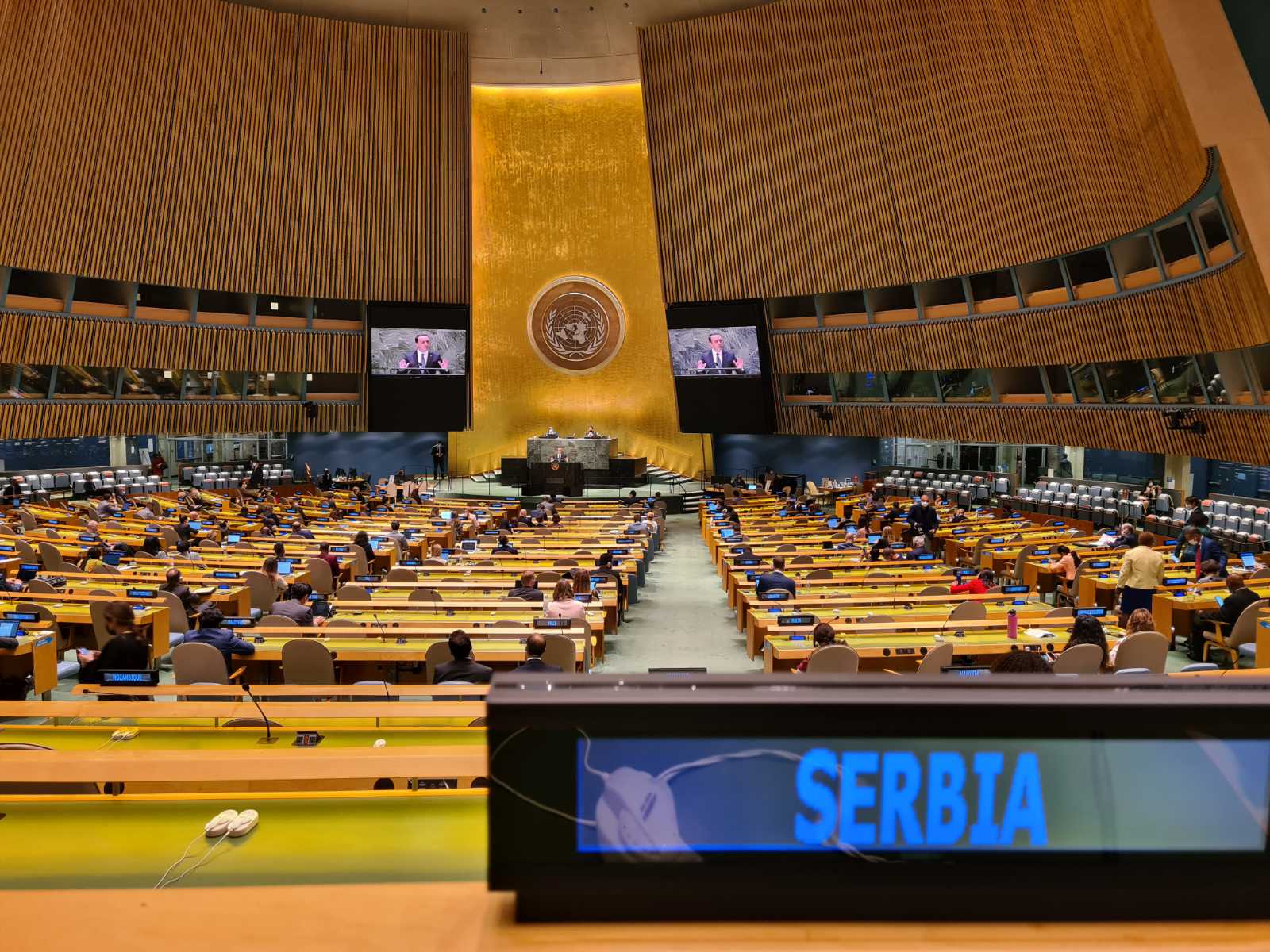
Source: www.srbija.gov.rs |
|
|
| 22 September 2021 - Prime Minister Brnabic at Global COVID-19 summit organised by White House |
|
Prime Minister Ana Brnabic participated today at the Global COVID-19 summit, organised by the White House, which was opened by US President Joseph Biden. The video messages are attended by a large number of world leaders and officials of international organizations, including UN Secretary General Antonio Guterres, European Commission President Ursula von der Leyen, British and Canadian Prime Ministers, Boris Johnson and Justin Trudeau, German Chancellor Angela Merkel and many others.
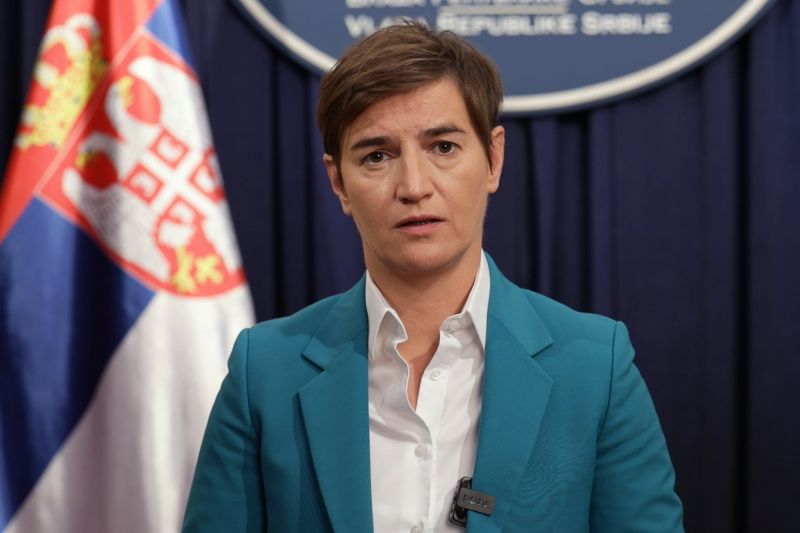 In the message, the Prime Minister pointed out that Serbia was among the first European countries to procure a covid vaccine, and that she was the first European Prime Minister to receive the vaccine. Thanks to years of investment in digitalisation and development of eGovernment, we have managed to organise a complicated and complex vaccination process very efficiently and in a way that it is focused on citizens, she explained. However, as she added, from the very beginning we were aware that this is not just a matter of our citizens and only our struggle. In the fight against the COVID-19 pandemic, we are all safe or no one is safe. That is why, in addition to procuring vaccines for our citizens, we donated vaccines to the citizens of the Western Balkans, but also to other countries, she reminded and specified that Serbia donated 230,000 doses of vaccines to the region, we vaccinated foreign citizens in Serbia with approximately 300,000 doses and set aside we have 570,000 doses of vaccines for countries in Africa and Asia. Brnabic mentioned that Serbia has already started the production of covid vaccine from one manufacturer, and that it will start production from another by the end of the year, because in that way we want to help and support all people and countries that need vaccines. This is a pandemic in which we will either win together or lose together, but we must fight together, the Prime Minister repeated. That is why Serbia supports the goals of this global summit, she emphasised, and expressed her gratitude to the United States of America and President Biden for organising the summit and supporting joint efforts in the fight against the COVID-19 pandemic. Vaccines are the only way out in the fight against the pandemic, concluded Brnabic. In the message, the Prime Minister pointed out that Serbia was among the first European countries to procure a covid vaccine, and that she was the first European Prime Minister to receive the vaccine. Thanks to years of investment in digitalisation and development of eGovernment, we have managed to organise a complicated and complex vaccination process very efficiently and in a way that it is focused on citizens, she explained. However, as she added, from the very beginning we were aware that this is not just a matter of our citizens and only our struggle. In the fight against the COVID-19 pandemic, we are all safe or no one is safe. That is why, in addition to procuring vaccines for our citizens, we donated vaccines to the citizens of the Western Balkans, but also to other countries, she reminded and specified that Serbia donated 230,000 doses of vaccines to the region, we vaccinated foreign citizens in Serbia with approximately 300,000 doses and set aside we have 570,000 doses of vaccines for countries in Africa and Asia. Brnabic mentioned that Serbia has already started the production of covid vaccine from one manufacturer, and that it will start production from another by the end of the year, because in that way we want to help and support all people and countries that need vaccines. This is a pandemic in which we will either win together or lose together, but we must fight together, the Prime Minister repeated. That is why Serbia supports the goals of this global summit, she emphasised, and expressed her gratitude to the United States of America and President Biden for organising the summit and supporting joint efforts in the fight against the COVID-19 pandemic. Vaccines are the only way out in the fight against the pandemic, concluded Brnabic. |
|
|
| 14. Sep 2021., Selaković: Friendly relations with Somalia since the Non-Aligned Movement |
|
The Minister of Foreign Affairs, Nikola Selaković, talked today with the Head of the Cabinet of the Minister of Foreign Affairs of Somalia, Abdullahi Dol, and the charge d'affaires of the Embassy of Somalia in Belgrade, Mohamed Abdullahi Ahmed.
Selaković assessed the bilateral relations between Serbia and Somalia as good, friendly and added that they are characterized by mutual understanding and trust.The Minister expressed readiness to improve the overall cooperation, expressing expectation that the reopening of the Embassy of Somalia in Belgrade will contribute to additional connection of our countries and peoples.
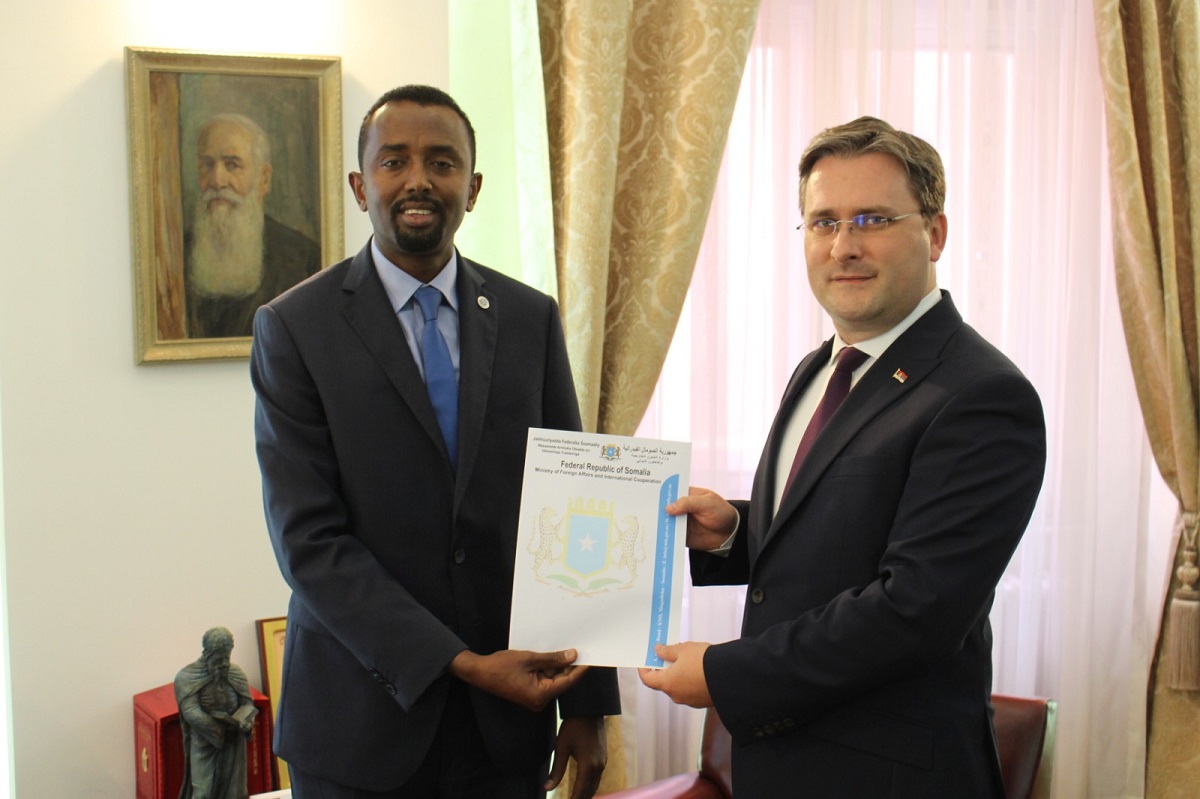
Selaković pointed out the potential for the improvement of insufficiently developed economic cooperation, as well as the interest of our side for increasing the volume of trade exchange. According to the minister, Serbia wants to hear the specific needs and priorities of Somalia, in order to work together on intensifying economic relations.The interlocutors exchanged information on the fight against the corona virus, and the head of Serbian diplomacy expressed Serbia's readiness to donate and distribute a certain amount of medical aid to Somalia.
On this occasion, the minister informed his interlocutors about the high-level gathering that will be organized on 11 and 12 October in Belgrade, on the occasion of the 60th anniversary of the first conference of the Non-Aligned Movement. The minister expressed hope that the Somali delegation and the Minister of Foreign Affairs would have the opportunity to attend the event.
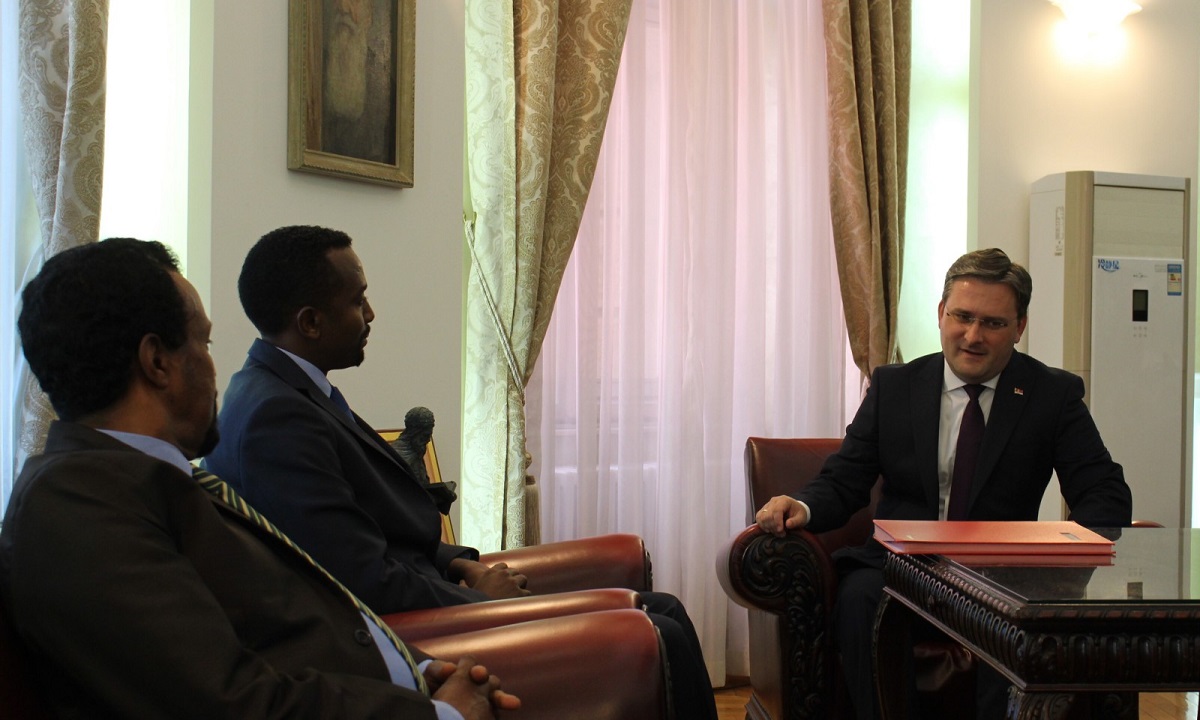 |
|
|
| 21 August 2021, Selaković: Ties between Serbia and its African friends strengthened |
|
The Minister of Foreign Affairs of Serbia, Nikola Selaković, said today, summarizing the results of his visit to Africa, during which he visited Kenya, Zimbabwe, Zambia, Namibia and Angola, that Serbia is recognized as a friendly country in that part of the world, and that there is a general mood towards renewing and improving the ties, which are based on traditionally close relations, established during the time of the former Yugoslavia. Selaković pointed out that he had received clear messages from African friends in support of our national interest and the preservation of our territorial integrity and sovereignty, because Serbia shares the same values with those countries. "How can I not be satisfied with the fact that our Serbia, which was on the verge of economic ruin only seven years ago, is giving vaccines to its African friends today. It is a great success for us, and the reactions of our friends are a serious recognition for our state leadership, for President Vučić and the Government of Serbia, for everything we managed to do to get into this situation", said Selaković. Minister Selaković pointed out that millions of people in Africa crave a vaccine against the corona virus, and that those who are ready to provide that kind of help, receive the sincerest human gratitude. "And when they remember the help that was once provided by Yugoslavia, which came from Belgrade, then it takes on a whole new dimension and then we talk about traditional friendship", Selaković explained. "The kind of friendship that you can feel here when people don't ask you for anything and when they don't condition you with anything, is something that is rarely found", said the head of Serbian diplomacy.
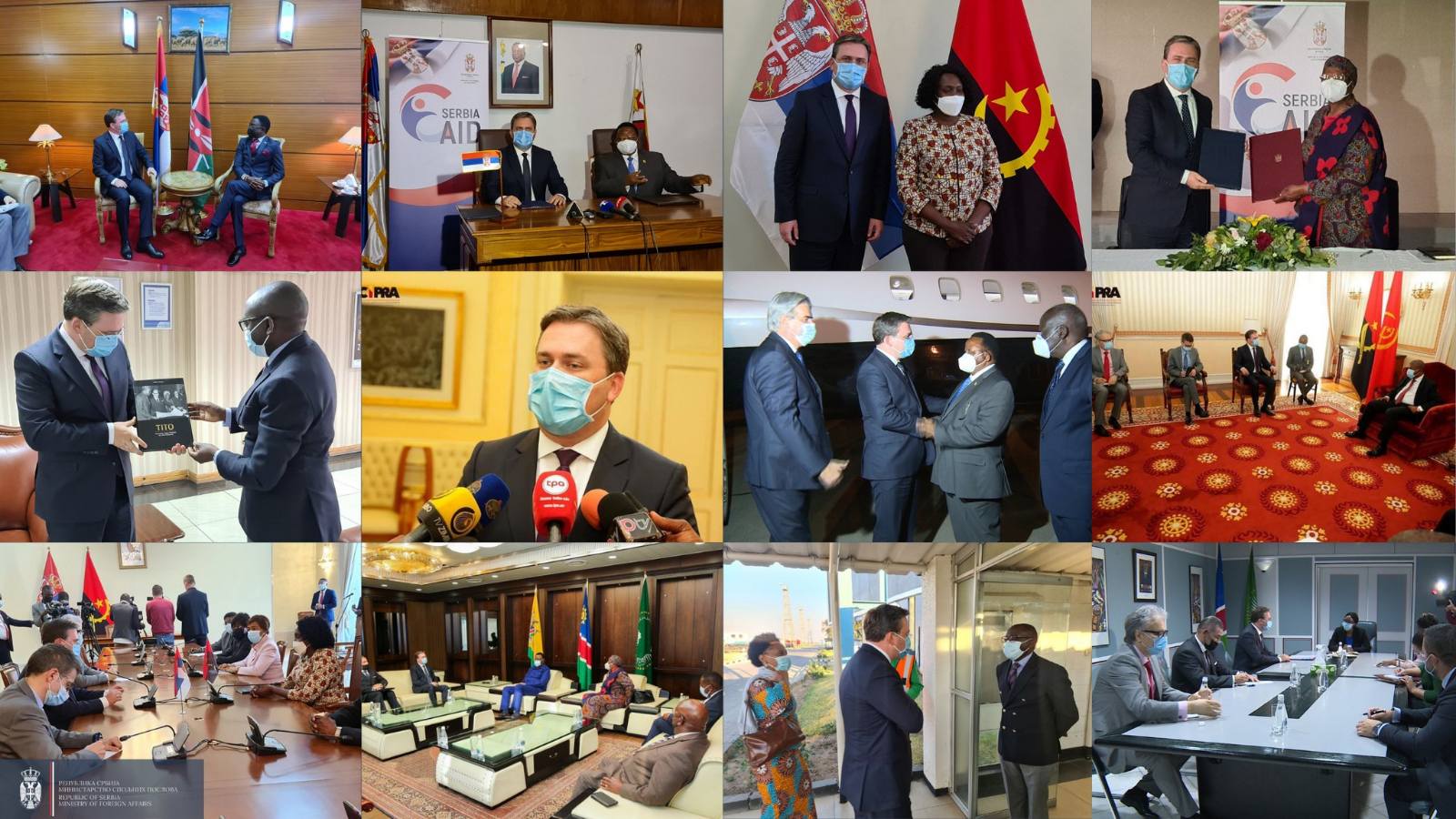
Selaković pointed out that today he received a message from the presidents of Namibia and Angola that they want to visit Belgrade so that relations between our countries may continue to deepen at the highest level, but also that a clear readiness of friendly African countries was shown to participate in the celebration of the 60th anniversary of the first conference of the Non-Aligned Movement. "Thing are like this today, when the state delegation comes, tomorrow it will be like that when the business delegation comes here. Our task is to open those doors, because the task of politicians is to open the doors to businessmen, to connect peoples and to help cooperation in all fields", Selaković said. According to him, there are many ways to cooperate with African countries for mutual benefit, exchange of experiences and providing expert assistance, but also a more significant return of Serbian companies to that continent. "People here admire what Serbia has managed to do in seven years through the reforms initiated by Aleksandar Vučić. Our African friends are also interested in those experiences, how to economically and fiscally consolidate the state, how to create a state in which it will not be most popular to work in the public sector, but to have a state in which the private sector is the engine of development", said the head of Serbian diplomacy. Selaković expressed his belief that in the near future we will have Serbian companies that will invest more and more in Africa and that will open factories on that continent. |
|
|
| 20 August 2021, Selaković: African countries support key interests of Serbia |
|
The Minister of Foreign Affairs, Nikola Selaković, stated that Zimbabwe and Zambia attach great importance to relations with Serbia and support it in defending its territorial integrity and sovereignty, and that they are also interested in deepening political and economic cooperation with our country.
Summarizing the results of the first day of his visit to South Africa, during which he handed out vaccines against the corona virus, as a donation from Serbia, Selaković said that Zimbabwe's support for our key national and state interests has lasted for 30 years. The Minister said that the reception of the Serbian delegation in Zimbabwe was proof of that, and stated that the Minister of Foreign Affairs, the Minister of Local Government and Public Works, but also the Deputy Minister of Health of Zimbabwe, key representatives of the state for the implementation of the fight against COVID-19, were present at the airport. The head of Serbian diplomacy pointed out that his colleague from Zimbabwe, Frederick Shava, expressed support for Serbia, which has not lasted for the previous five months or the previous five years, but for the last 30 years. "Zimbabwe has had a very clear attitude towards the key national and state interests of Serbia and our Serbian people for the past 30 years, and it has not changed its position on that issue. Also, we had the opportunity to hear the most beautiful expressions of gratitude expressed in a wonderful and touching way, but also the expressed intention of Minister Shava and President Mnangagwa to reopen the Zimbabwean embassy in Belgrade after 15 years", Selaković said. He reminded that 20 years have passed since the former FRY closed its embassy in Harare. "We have an embassy in Harare and a house next to the embassy where an ambassador can stay, it can be his residence. So, we have all the conditions to re-establish our diplomatic mission in Harare, and we will do that. In response to my thinking, Minister Shava immediately said that, if we do that, they will return their embassy from Rome to Belgrade", Selaković said. He mentioned that yesterday in Nairobi he talked with the State Secretary of the Kenyan Ministry of Foreign Affairs, Ababu Namwamba, for whom he says is also our great friend, about improving cooperation, and that the fact is that friendly countries from the African continent recognize what President Aleksandar Vučić and the Government of Serbia are doing, as well as the successes of Serbia, both domestically and internationally. "Belgrade is becoming the center of the region again, not only because of its political stability, economic activity and because we attract the most foreign direct investments, not only because we have economic growth that will be among the top three countries in Europe, but also because our old traditional friends recognize that, value it and want to return to Belgrade again, to open their embassies in Belgrade", said Selaković.
He emphasized that the opening of their embassies in Serbia means a new chance for the development of political, but also economic cooperation of our country with the countries of the African continent. The Minister said that the Serbian delegation had to come to the capital of Zambia, Lusaka, on a special flight, and that a little less than three decades ago there was a direct airline between Belgrade and Lusaka once or twice a week, because 5,000 of our people lived and worked in Zambia. He stated that many key facilities in the center of Harare and Lusaka, such as congress centers, hotels, state institutions, were built by our companies.
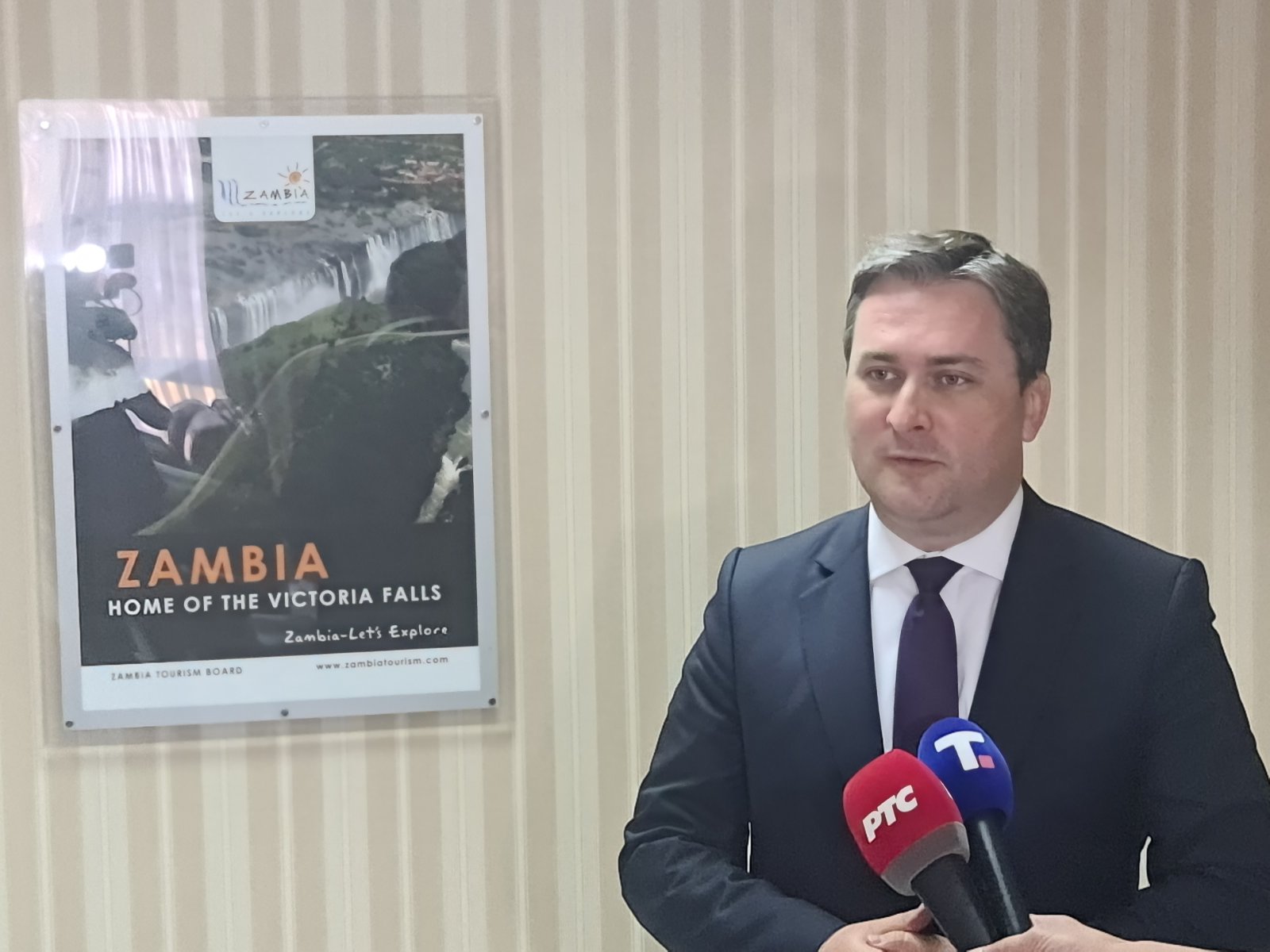
"They also built roads, airports, dams, hydroelectric power plants. This was all done by former Serbian companies in the time of Yugoslavia. I intentionally say Serbian companies, because they were from the territory of Serbia, such as Energoprojekt and Partizanski put", said Selaković. Minister Selaković emphasized that the re-establishment of direct political and diplomatic missions in our capital represents a direct line of communication, a chance for our country to strengthen our multilateral cooperation, our unity in international organizations, support for our territorial integrity and sovereignty, but on the other side, this is also a really good chance for our businessmen. He conveyed that today in Zambia, at meetings with officials of that African country, they talked exactly about deepening cooperation when it comes to agriculture, pharmaceutical industry, the defense system, but also many other areas for which, as Minister Selaković says, our friends are interested, and eager to see Serbian companies in southern Africa again. "My second presence in Africa in the last two months is something that has been noticed. It has been noticed that Serbia pays attention to the relationship with the countries of Africa, and believe it or not, this is something that each of my interlocutors drew my attention to yesterday and today, and they respect that very much", said Selaković. He emphasized that this is important because we are not in a situation to just ask them for something and call them when we need help, but that this time we are the ones who help as much as we can. |
|
|
| 19 August 2021, Traditional friendship and mutual understanding between Serbia and Kenya |
|
The Minister of Foreign Affairs of Serbia, Nikola Selaković, met today in Nairobi with the State Secretary of the Ministry of Foreign Affairs of Kenya, Ababu Namwamba, and handed him an invitation letter for the participation of representatives of that country in the celebration of the 60th anniversary of the first conference of the Non-Aligned Movement, which will be held on 11 and 12 October in Belgrade.
During the meeting at the airport in Nairobi, the interlocutors stated that the bilateral relations between Serbia and Kenya are very good and friendly, and that they are characterized by mutual understanding and trust.On this occasion, Minister Selaković pointed out that Serbia is proud of the long history of relations and cooperation, which dates back to the period of the SFRY and the joint activities in the Non-Aligned Movement.
The head of Serbian diplomacy once again thanked Kenya for its principled support for the territorial integrity and sovereignty of Serbia. Selaković stated that the economic cooperation of our countries is insufficiently developed, but also that there are great potentials for its improvement, especially in the fields of agriculture, pharmacy, construction, heavy industry and energy.
Minister Selaković also mentioned the cooperation within the "World in Serbia" project and added that Serbia intends to increase the number of scholarships for students from African countries in the next academic year. The Minister of Foreign Affairs of the Republic of Serbia, Nikola Selaković, will visit Zimbabwe, Zambia, Angola and Namibia from 19 to 21 August, where he will have meetings with high and top officials of those countries.
Minister Selaković will hand over donations of vaccines against the corona virus, as well as official invitations to participate in the celebration of the 60th anniversary of the first conference of the Non-Aligned Movement.
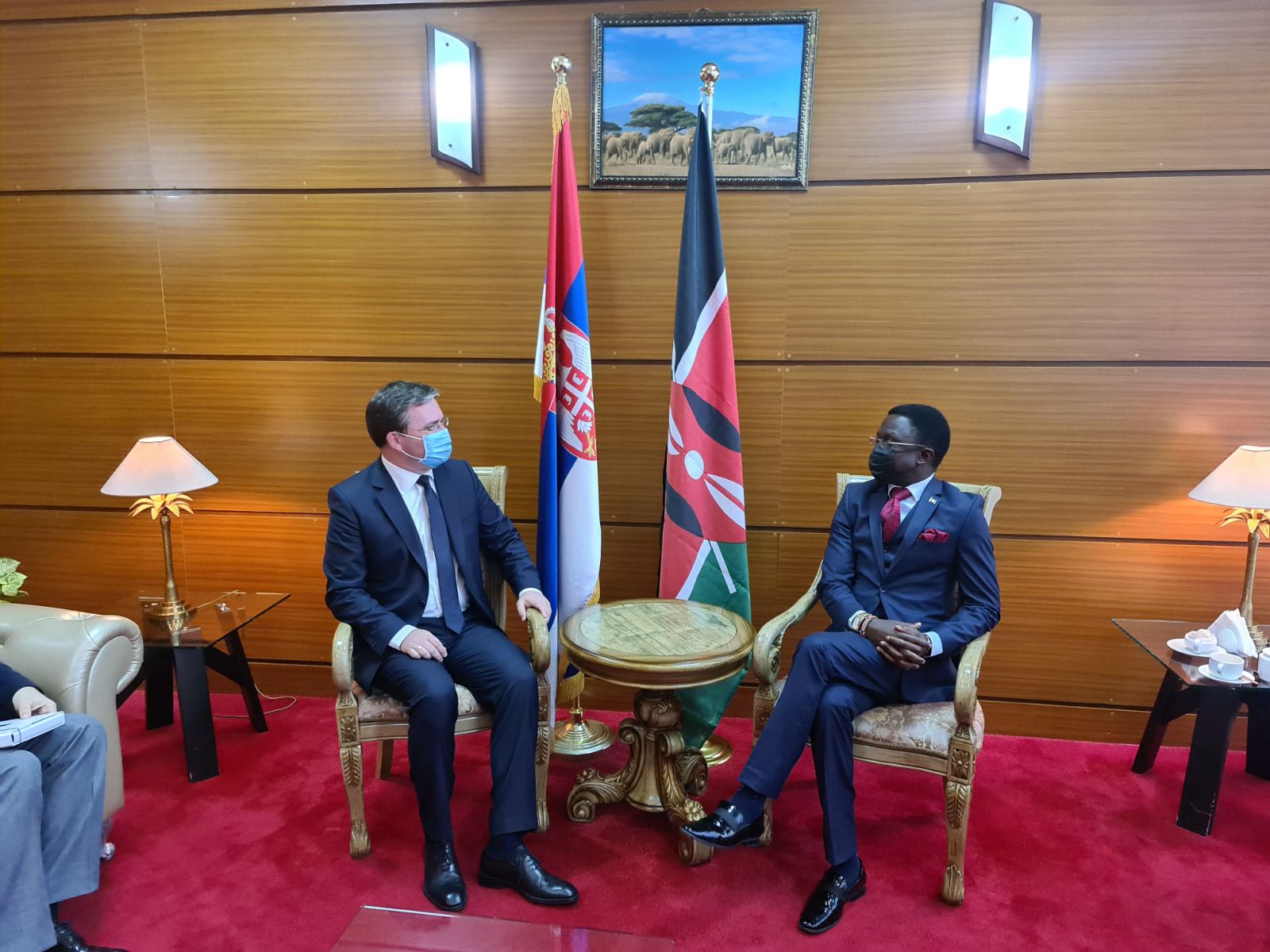 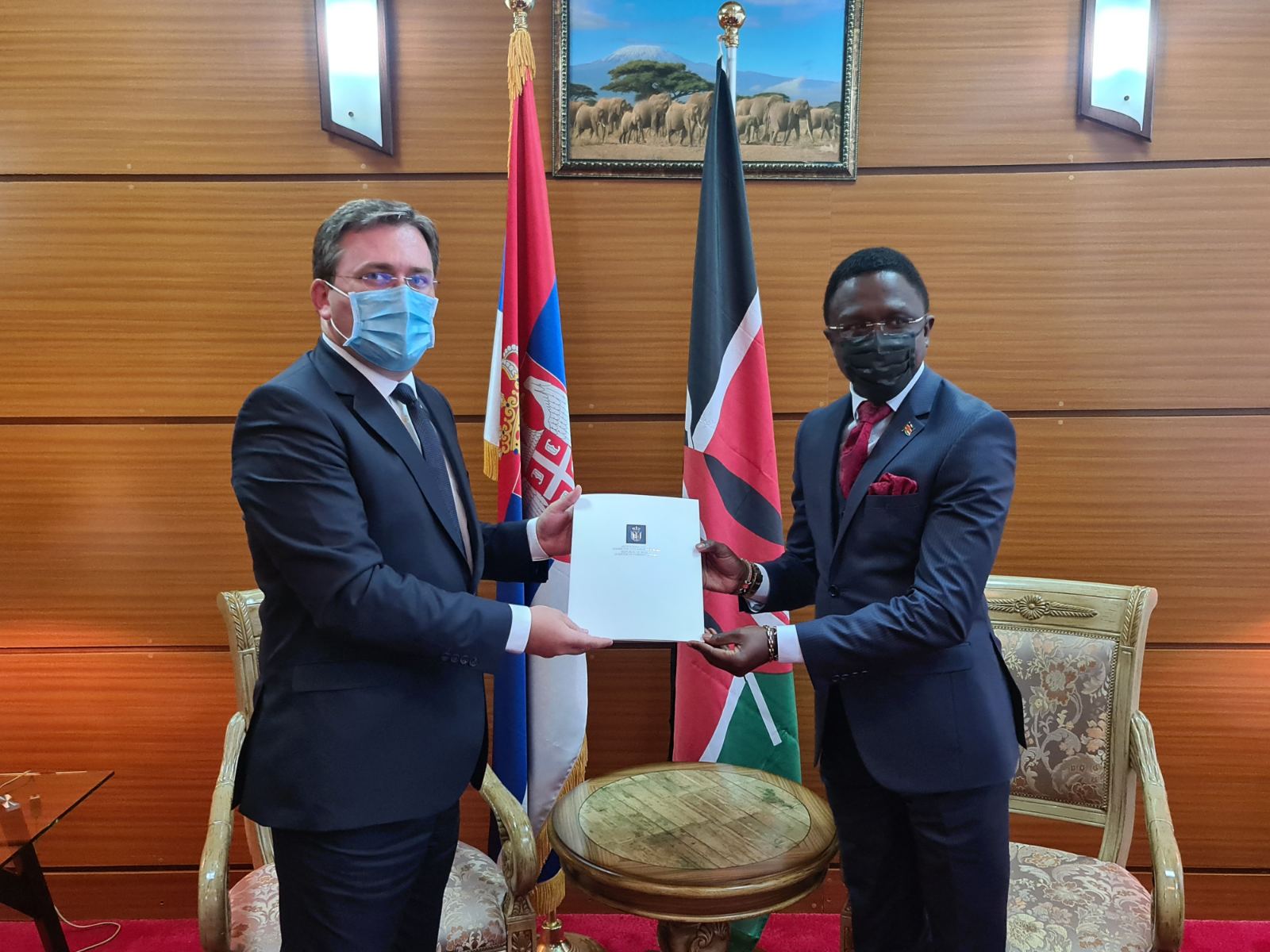 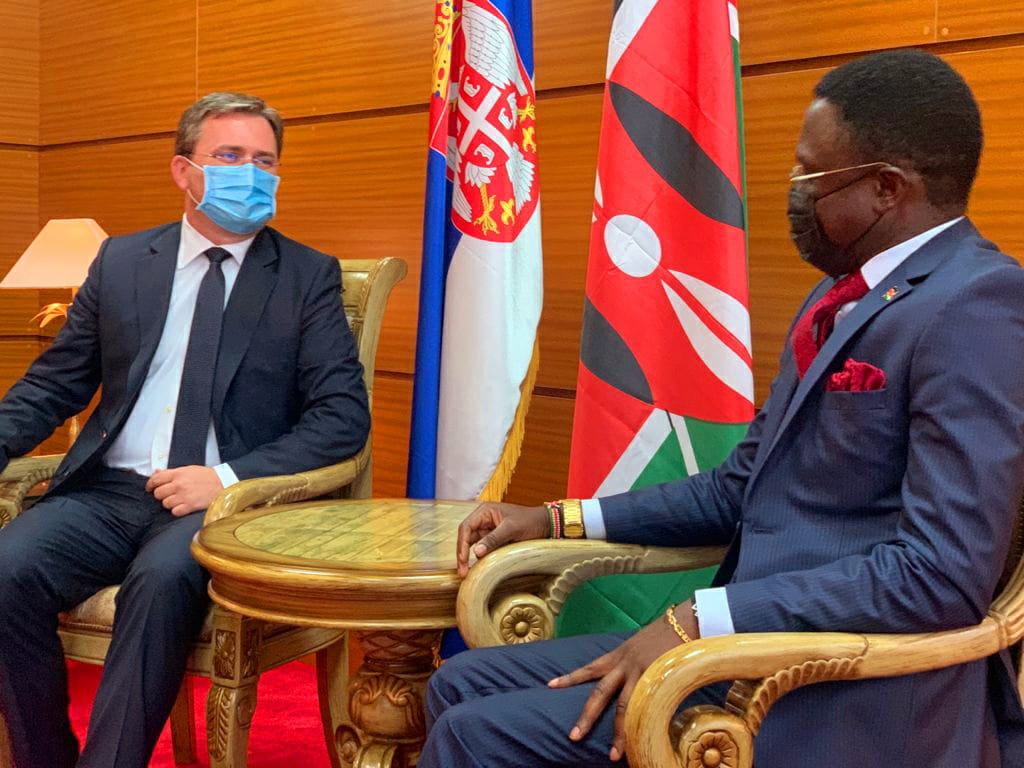 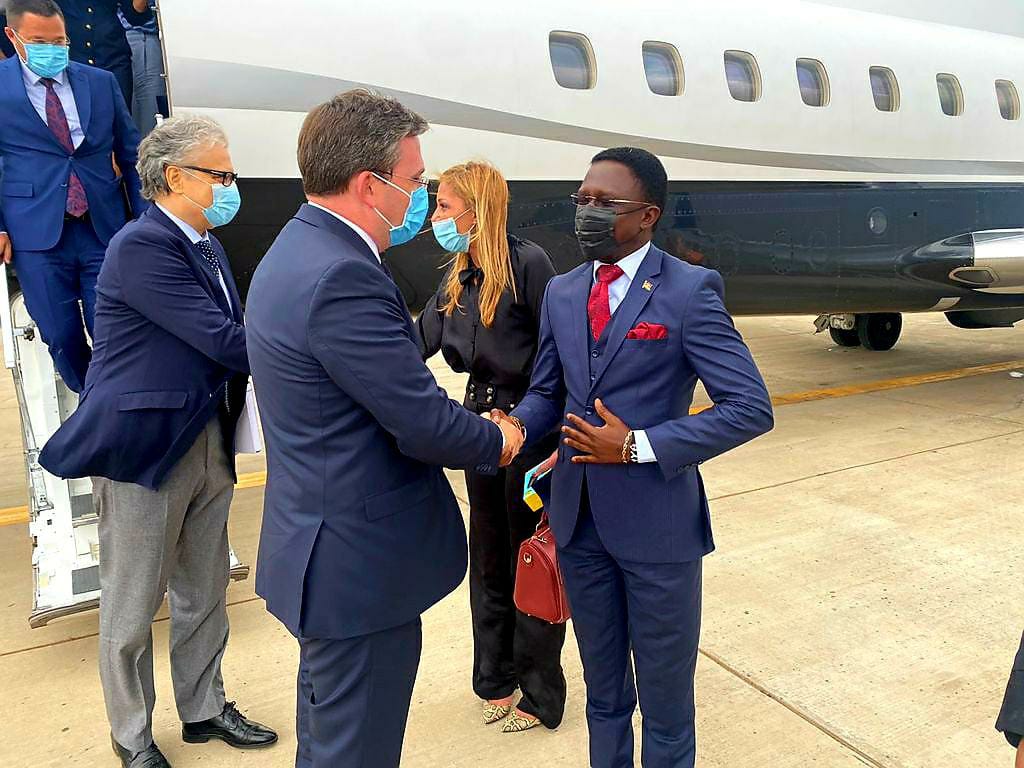 |
|
|
| 5 August 2021 Marking the Remembrance Day of all Serbs who died and were expelled in the armed operation "Storm" |
|
The President of the Republic of Serbia, Aleksandar Vučić, attended the marking of Remembrance Day of all the victims and expelled Serbs in the armed operation "Storm" and said that Serbia remembers!
"Today, when we remind ourselves again of what happened in August 1995, the terrible pogrom, the expulsion of more than 250,000 Serbs, the exodus and ethnic cleansing, we, at the same time, and finally, remind ourselves of who we are, what we are, where we come from and where we are going. Thank you all for being here together tonight and for showing how much we love our people", said President Vučić, adding that we will not forget any of the things that the Krajina people had to go through.
"For us, these are not just terrible numbers of victims", said President Vučić and emphasized that Serbia will not forget. "History has never been rewritten like today. That is why I want to remind us all not only of what others have done to us, not wanting us to exist, but also of what we have done to ourselves, just as if we ourselves did not want to exist", said the President, noting that we must never again allow Serbia to forget its silent heroes.President Vučić emphasized that we must never again cover our eyes, ears, and mouths in front of something that truly was a pogrom and the downfall of all humanity.
"Pretending that this is not true, avoiding saying it, is a crime not only against the victims, but also against ourselves, every living Serb, people from Krajina, as well as Serbia and its future", said President Vučić and underlined that people can stand up straight and live with themselves and the others without hesitation, fear and doubt, only if they remember. President Vučić pointed out that Serbia must fight for peace and cradles with children, as well as that not remembering annuls and erases us from the history and the future, depriving us of the right to tomorrow.
"Our mission is a happy future for us and for the new generations! Today's Serbia is based on a clear identity and a culture of remembrance", said President Vučić and reminded that everything that had been neglected for decades had been done, and that a strong Serbia has become the master of its own destiny.
"Eternal glory to you, Serbian martyrs who perished in the "Storm" and all other pogroms. Your children are in their Serbia, taken care of, loved and successful. Sleep peacefully, Serbian falcons, the future of your children is our vow", concluded President Vučić and thanked everyone who showed that night how much they love their country and that Serbia remembers.
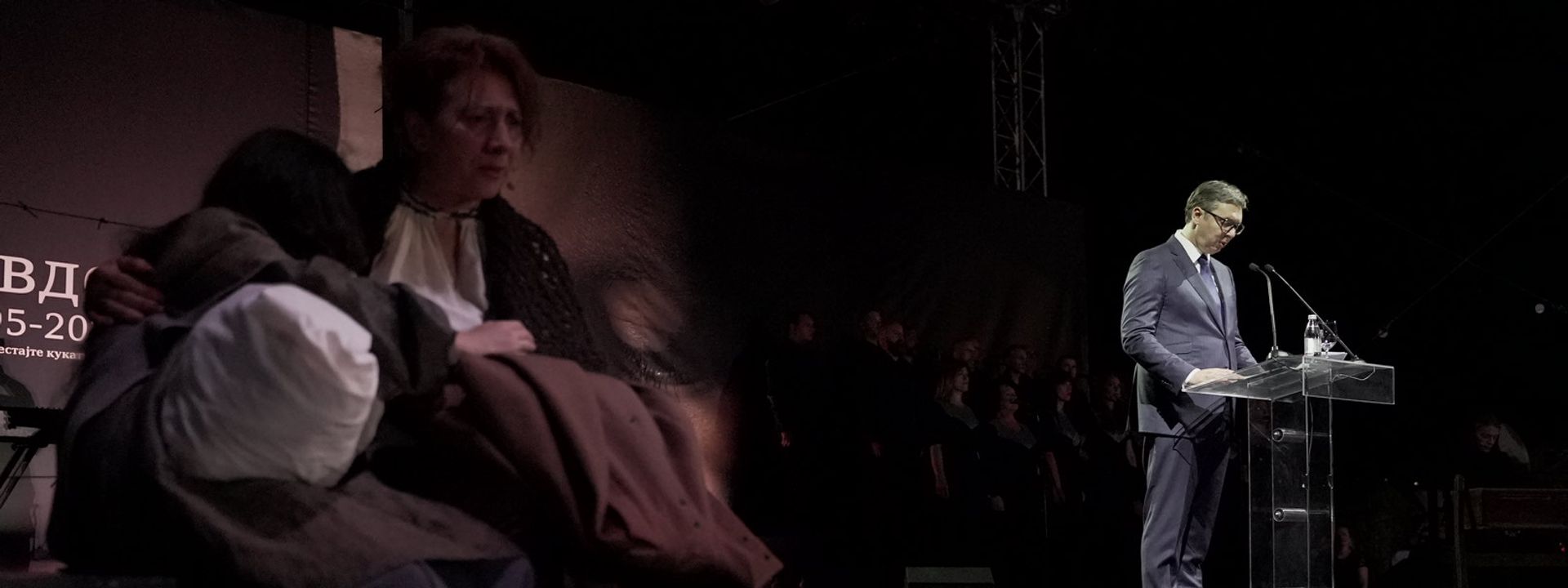
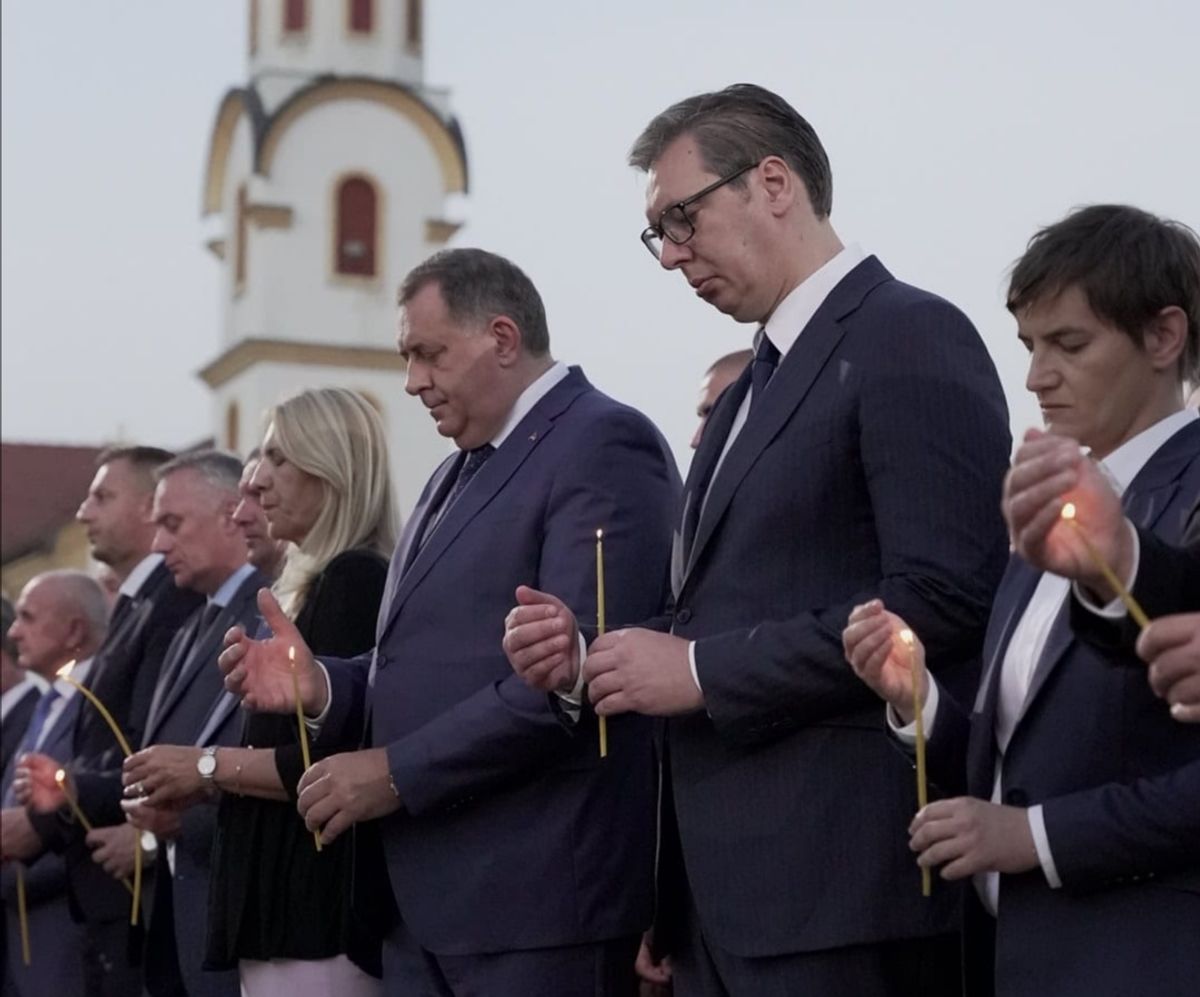
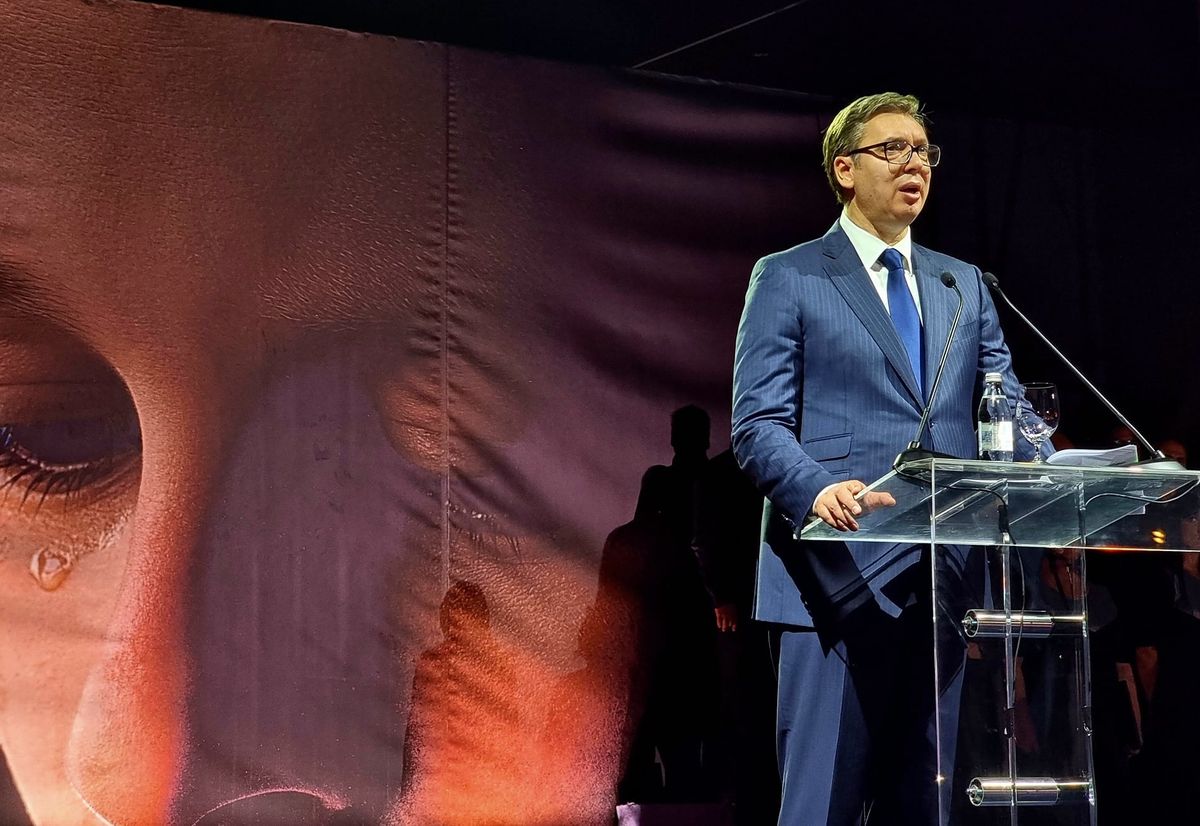 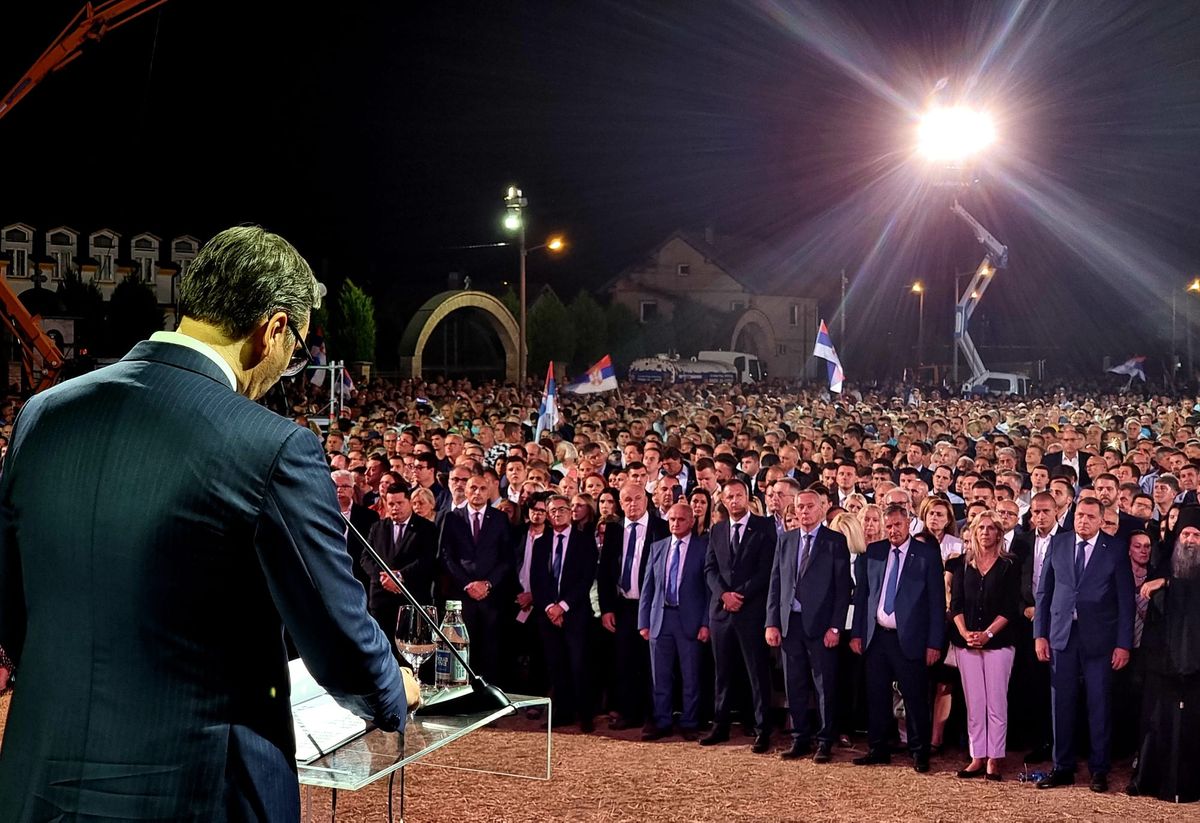
Source: www.predsednik.rs
Photo: www.predsednik.rs |
|
|
| 22 July 2021 President Vučić: We have decided – our goal is the EU, but China is an important partner |
|
We have decided – our goal was and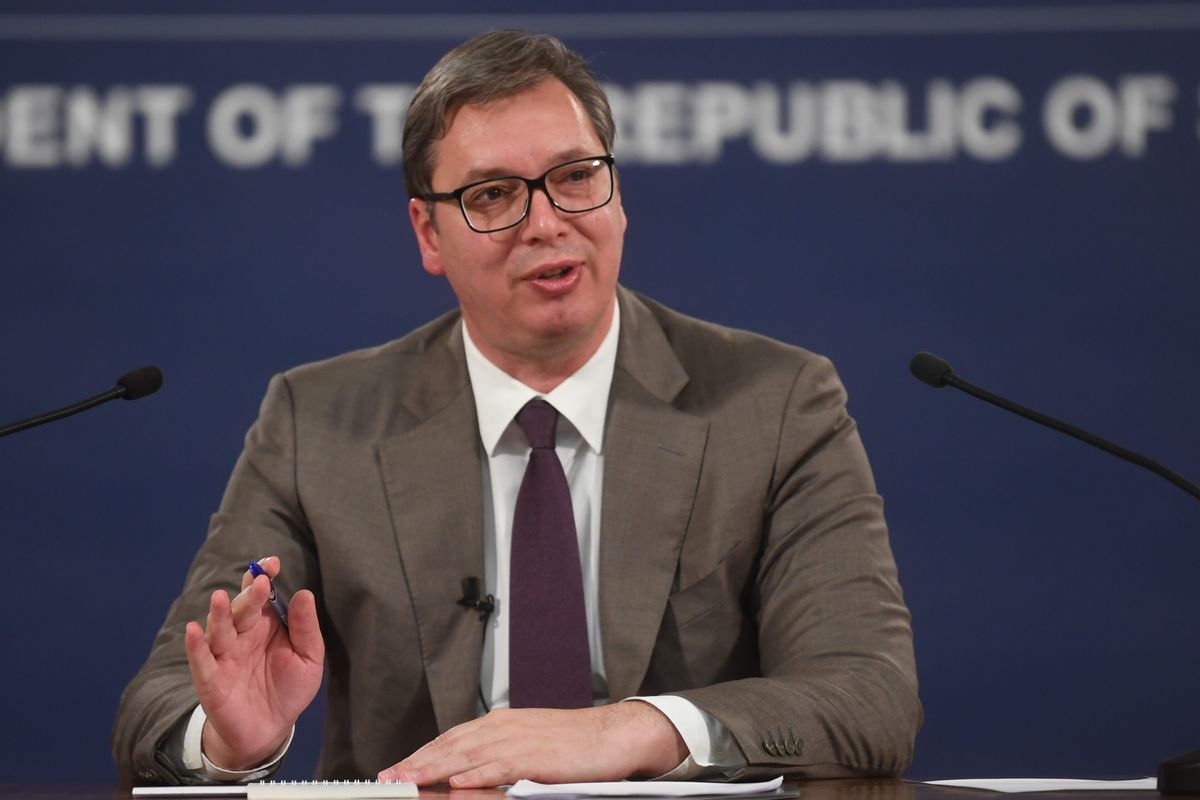 remains the EU, Serbian President Aleksandar Vučić said in an interview with the German daily "Handelsblatt", adding that there is no alternative for Serbia, but also stressing that China is an important partner for Serbia, and that the task of the state is to take care about the interests of its citizens. He thus answered the question of what Serbia will choose once it has to choose between close relations with Beijing or the EU. Vučić emphasized that Serbia wants to become a full member of the EU. "We are connected by history, common culture, EU members are already undoubtedly our most important partners", he explained and added that the trade exchange between Germany and China is 3,000 times higher than between Serbia and China, and, as he noted, even despite that, Serbia's business operations with China are portrayed as a problem. To the statement that the German Chancellor Angela Merkel did not congratulate the 100th anniversary of the Communist Party of China, and that he did so, he replied that Serbia is not Germany, but a small country. On additional insistence on what Serbia will do if it has to choose between the EU and China, he underlined that Serbia has already decided, that its goal was and remains the EU membership. "Our biggest investors are from the EU. The EU accounts for 67% of our trade while 17 percent of the trade is with countries of the region that are all on the way to the EU. We cannot survive without the EU", he added. "But can we do a lot of good things with China – of course. And we do that, just like Germany does", Vučić pointed out, and to the remark that the quality of the Silk Road projects was being criticized, primarily because of Chinese workers, he answered that the quality of roads or bridges, which Serbia is building with China, is excellent. "We give jobs to those who submit the best offer to us. That is why I tell Europeans who criticize Chinese projects in our country – offer us a project for one euro more and you will get it", he emphasized. In that regard, he pointed out that Serbia is building a railway to Northern Macedonia with 600 million euros of EU aid, stating that that offer was better than China's. "There is often talk of a 180-kilometer railway to Budapest through the territory of Serbia, which is financed by China. But the railway that is being built with the help of the EU from Belgrade to the northern Macedonian border is twice as long and no one is talking about it. It is all too political", he stated. Asked whether he welcomes the plans of the EU and the USA regarding an alternative initiative to the Silk Road, Vučić said that he supports everything that brings advantages to our region. "The Chinese want to expand their presence everywhere, but many processes in the West are, frankly, more efficient and without problems. We still have a lot to learn from the West, but we are getting there", Vučić said. He pointed out that China was an important partner for Serbia and added that when the consolidation of state finances began in 2014, our country received good conditions from China for development projects. He also stated that a competition for a copper mine was announced in eastern Serbia, at the request of the EU, that no European company had made an offer for six months, and that it had then been taken over by the Chinese. "Our job is to take care of our people", he said. He reminded that the Serbian economy grew by 52% in eight and a half years, which for the EU means that Serbia could be a strong member and engine for the entire region. Explaining how Serbia is developing so well economically, he pointed out that Serbia has an excellent workforce, which speaks English, that society and administration are digitalized, and that it has the most flexible labor law in Europe, as well as consolidated public finances. He reminded that previously the public debt was at 78% of GDP, and that today it has been reduced, thanks to the strong growth of the economy, to 52%. "We can afford to give investors an incentive to come", he added, emphasizing that Serbia offers investment assistance, but that, for example, subsidies were not the motive for the arrival of the development center of the company Continental. He pointed out that, five or six years ago, only Serbia started using the dual education system in this region, which Germany, Switzerland and Austria also use, that tens of thousands of people are in dual education, and that this is appreciated by foreign investors, who, in addition, can work closely with universities as well. Germany, he stated, is the most important trade partner and the largest investor. We started with the arrival of small textile companies from Turkey, and now primarily large German companies are coming. Today, 71,000 people work in German companies in Serbia", he explained. Vučić said that the European perspective is very important for investors, stating that Nidek, Toyo Tires or Mitsubishi are coming from Japan to Serbia because our country is on a stable European path. Asked if he believes that Serbia will become an EU member in the foreseeable future, he said that he does not complain. "It is certain that if we had received 45 billion euros of EU aid, we would have been much further economically. Instead, we received 1.6 billion euros from the EU. We are used to achieving our successes on our own", said Vučić. The President of Serbia reminded that in Croatia, salaries used to be 2.2 times higher than in Serbia, and today they are only 1.7 times higher. "We are closing the gap with our own efforts. If we were to become a member of the EU, then we would certainly not ask for the biggest subsidies", he assures. He said that the Serbian path follows the German path to Europe, and that Serbia wants a fair chance. "I believe Merkel's words. She is at the end of her term and I would not have to praise her anymore. But she gave us stability, freedom of travel to the EU, helped us with the migrant crisis in 2015, and asked the Minister of Economy Altmeier and others to work closely with us", he reminded. Asked if there were any indications that the new German government would support Serbia in the same way, Vučić expressed confidence that it would be the same. "I know Armin Laschet, I talked to him while he was the Minister-President of North Rhine-Westphalia. He is very smart and understands the situation in the Balkans, and he will certainly continue Merkel's policy towards our region as the new chancellor", he added. Vučić also expressed his belief that Russia, if Serbia's accession to the EU were concretized, would not react similarly as in the case of Ukraine, as this is a sovereign decision of Serbia. To an additional question in this regard, Vučić pointed out that whenever he met with Vladimir Putin, and there were 18 or 19 meetings, he told him that he was grateful for the traditionally close friendship with Russia, but also that Serbia is on a clear course towards the EU. "He asked if it was our choice and I answered that EU membership is indeed our goal", he added. When it comes to "Kosovo", Vučić emphasized that a compromise is needed regarding this issue. "Only in this way can there be sustainable peace. Serbia wants peace, me as well. Let's stop with the madness of the past. Only then can the whole region become the engine of new growth for Europe", said Vučić. remains the EU, Serbian President Aleksandar Vučić said in an interview with the German daily "Handelsblatt", adding that there is no alternative for Serbia, but also stressing that China is an important partner for Serbia, and that the task of the state is to take care about the interests of its citizens. He thus answered the question of what Serbia will choose once it has to choose between close relations with Beijing or the EU. Vučić emphasized that Serbia wants to become a full member of the EU. "We are connected by history, common culture, EU members are already undoubtedly our most important partners", he explained and added that the trade exchange between Germany and China is 3,000 times higher than between Serbia and China, and, as he noted, even despite that, Serbia's business operations with China are portrayed as a problem. To the statement that the German Chancellor Angela Merkel did not congratulate the 100th anniversary of the Communist Party of China, and that he did so, he replied that Serbia is not Germany, but a small country. On additional insistence on what Serbia will do if it has to choose between the EU and China, he underlined that Serbia has already decided, that its goal was and remains the EU membership. "Our biggest investors are from the EU. The EU accounts for 67% of our trade while 17 percent of the trade is with countries of the region that are all on the way to the EU. We cannot survive without the EU", he added. "But can we do a lot of good things with China – of course. And we do that, just like Germany does", Vučić pointed out, and to the remark that the quality of the Silk Road projects was being criticized, primarily because of Chinese workers, he answered that the quality of roads or bridges, which Serbia is building with China, is excellent. "We give jobs to those who submit the best offer to us. That is why I tell Europeans who criticize Chinese projects in our country – offer us a project for one euro more and you will get it", he emphasized. In that regard, he pointed out that Serbia is building a railway to Northern Macedonia with 600 million euros of EU aid, stating that that offer was better than China's. "There is often talk of a 180-kilometer railway to Budapest through the territory of Serbia, which is financed by China. But the railway that is being built with the help of the EU from Belgrade to the northern Macedonian border is twice as long and no one is talking about it. It is all too political", he stated. Asked whether he welcomes the plans of the EU and the USA regarding an alternative initiative to the Silk Road, Vučić said that he supports everything that brings advantages to our region. "The Chinese want to expand their presence everywhere, but many processes in the West are, frankly, more efficient and without problems. We still have a lot to learn from the West, but we are getting there", Vučić said. He pointed out that China was an important partner for Serbia and added that when the consolidation of state finances began in 2014, our country received good conditions from China for development projects. He also stated that a competition for a copper mine was announced in eastern Serbia, at the request of the EU, that no European company had made an offer for six months, and that it had then been taken over by the Chinese. "Our job is to take care of our people", he said. He reminded that the Serbian economy grew by 52% in eight and a half years, which for the EU means that Serbia could be a strong member and engine for the entire region. Explaining how Serbia is developing so well economically, he pointed out that Serbia has an excellent workforce, which speaks English, that society and administration are digitalized, and that it has the most flexible labor law in Europe, as well as consolidated public finances. He reminded that previously the public debt was at 78% of GDP, and that today it has been reduced, thanks to the strong growth of the economy, to 52%. "We can afford to give investors an incentive to come", he added, emphasizing that Serbia offers investment assistance, but that, for example, subsidies were not the motive for the arrival of the development center of the company Continental. He pointed out that, five or six years ago, only Serbia started using the dual education system in this region, which Germany, Switzerland and Austria also use, that tens of thousands of people are in dual education, and that this is appreciated by foreign investors, who, in addition, can work closely with universities as well. Germany, he stated, is the most important trade partner and the largest investor. We started with the arrival of small textile companies from Turkey, and now primarily large German companies are coming. Today, 71,000 people work in German companies in Serbia", he explained. Vučić said that the European perspective is very important for investors, stating that Nidek, Toyo Tires or Mitsubishi are coming from Japan to Serbia because our country is on a stable European path. Asked if he believes that Serbia will become an EU member in the foreseeable future, he said that he does not complain. "It is certain that if we had received 45 billion euros of EU aid, we would have been much further economically. Instead, we received 1.6 billion euros from the EU. We are used to achieving our successes on our own", said Vučić. The President of Serbia reminded that in Croatia, salaries used to be 2.2 times higher than in Serbia, and today they are only 1.7 times higher. "We are closing the gap with our own efforts. If we were to become a member of the EU, then we would certainly not ask for the biggest subsidies", he assures. He said that the Serbian path follows the German path to Europe, and that Serbia wants a fair chance. "I believe Merkel's words. She is at the end of her term and I would not have to praise her anymore. But she gave us stability, freedom of travel to the EU, helped us with the migrant crisis in 2015, and asked the Minister of Economy Altmeier and others to work closely with us", he reminded. Asked if there were any indications that the new German government would support Serbia in the same way, Vučić expressed confidence that it would be the same. "I know Armin Laschet, I talked to him while he was the Minister-President of North Rhine-Westphalia. He is very smart and understands the situation in the Balkans, and he will certainly continue Merkel's policy towards our region as the new chancellor", he added. Vučić also expressed his belief that Russia, if Serbia's accession to the EU were concretized, would not react similarly as in the case of Ukraine, as this is a sovereign decision of Serbia. To an additional question in this regard, Vučić pointed out that whenever he met with Vladimir Putin, and there were 18 or 19 meetings, he told him that he was grateful for the traditionally close friendship with Russia, but also that Serbia is on a clear course towards the EU. "He asked if it was our choice and I answered that EU membership is indeed our goal", he added. When it comes to "Kosovo", Vučić emphasized that a compromise is needed regarding this issue. "Only in this way can there be sustainable peace. Serbia wants peace, me as well. Let's stop with the madness of the past. Only then can the whole region become the engine of new growth for Europe", said Vučić.
Source: Tanjug |
|
|
| 20 July 2021 Serbia has achieved great success in the field of digitalization |
|
The Prime Minister of the Republic of Serbia, Ana Brnabić, stated at a gathering dedicated to digitalization and the IT sector, which was held in New York, that since she became Prime Minister, she is most proud of Serbia's success in the field of digitalization. Brnabić, who is on a two-day visit to the United States, said that when she was elected Minister of Public Administration and Local Self-Government in August 2016, she wanted to do everything to change the public administration and what bothered her as a citizen. She stated that, when she took office as Prime Minister, she knew what her priorities were and that first of all, digitalization needed to be raised to a higher level, that the education reform was supposed to begin, as well as work on strengthening the economy. I believed in a country that believes in its people, because the Serbian people are creative. From 1 June 2017, we started working as an e-Government, i.e. we started exchanging data electronically, said the Prime Minister. According to her, our citizens no longer had to go to, say, the Tax Administration, and since then, the public administration has exchanged 50 million documents, which means that citizens did not have to go from office to office for 50 million papers. Brnabić pointed out that she is proud of what has been done in the field of education since she became the head of the Government, specifying that in September 2017, programming was introduced as a compulsory subject in primary schools. Nobody believed that we could do that, but we cooperated with the private sector and some social organizations and we succeeded. At the moment, we are far ahead of numerous countries in Europe and the world, said the Prime Minister. The Prime Minister pointed out that she was most proud when the cornerstone was laid for the science and technology park in southern Serbia, noting that so far, our country has four science and technology parks. She pointed out that Serbia has since become one of the most successful countries in the world in the field of technology, and that according to some parameters, it is among the ten countries in the world, or among the five, assessing that this is proof that the country can change quickly. Answering the question about vaccination, the Prime Minister emphasized that our country has never seen it as a geopolitical issue, but as a health issue. According to her, Serbia talked with producers from both the East and the West and was among the first European countries to sign agreements with the company Pfizer-BioNTech and Sinopharm. Unfortunately, many countries have viewed this issue as geopolitical.
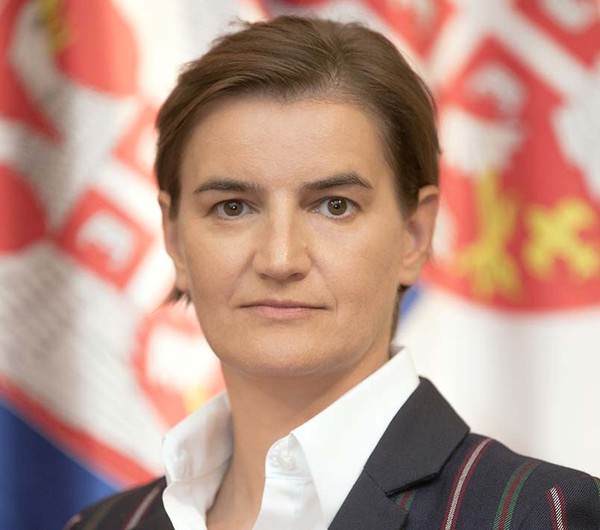
It did not matter to us, as long as the vaccines were safe, the Prime Minister emphasized and added that this was not the end of Serbia's success, because good organization was also needed. Brnabić explained that the organization is another important thing in vaccination, because it is a logistically very difficult process, adding that, with the help of digitalization, success has been achieved and that everything we did in the previous years has paid off. She stated that Serbia quickly established a system through which citizens could express interest in vaccination against the coronavirus and choose which vaccine they wanted to receive, as well as to be informed by a message when to go and get vaccinated. Now I can log in on my phone, to see how many people have received the vaccine, how many more have registered, so that the effects of digitalization are obvious. We have made everything very efficient and easy for our citizens, the Prime Minister explained. Answering the question of what she can tell other countries of the world about how to progress faster, Brnabić said that it is important to invest as much as possible in digitalization and education. You need to teach children how to think, not what to think. Not all children will become IT experts, but what they can learn is an algorithmic way of thinking and how to make decisions, she said. The Prime Minister mentioned investing in high-speed internet and providing infrastructure for start-ups as an important thing for progress, because more and more economies will be based on start-ups and innovations, emphasizing that people should be helped to start companies and implement their ideas. Speaking about social networks, she pointed out that fake news has become the biggest problem on these networks and that it will remain so for some time.This is the biggest challenge I face as Prime Minister, especially during the corona virus pandemic, she said, adding that social networks are also a great opportunity for politicians to communicate with citizens.
Source: www.srbija.gov.rs
Photo: www.srbija.gov.rs |
|
|
| 13. July 2021. Selaković: Decades of friendship and mutual understanding between Serbia and Kenya |
|
Today, the Minister of Foreign Affairs of Serbia, Nikola Selaković, talked on the phone with the Minister of Foreign Affairs of Kenya, Raychelle Omamo. Selaković stated that bilateral relations are very good and friendly, that they are characterized by mutual understanding and trust, but that we also expect the continuation of improved cooperation and further intensification of political dialogue. The Minister underlined that our country is proud of the long history of relations and cooperation that dates back to the period of the SFRY and joint activities in the Non-Aligned Movement. On this occasion, the head of Serbian diplomacy expressed hope that the Kenyan delegation will be present in Belgrade in October, when the 60th anniversary of the first Conference of the Non-Aligned Movement will be marked.
The Minister especially thanked for the principled position of Kenya regarding the non-recognition of the unilaterally declared independence of the so-called Kosovo, emphasizing that he expects the two sides to continue to help each other in international forums in accordance with their national priorities. Selaković assessed that the economic cooperation is insufficiently developed, but also pointed out the significant potentials for its improvement, especially in the field of agriculture, pharmacy, special-purpose industry, construction, heavy industry and energy. Selaković also mentioned cooperation within the project "World in Serbia" and said that Serbia intends to increase the number of scholarships in the next academic year and thus provide an opportunity for new generations to be educated in increasing numbers at faculties in Serbia.
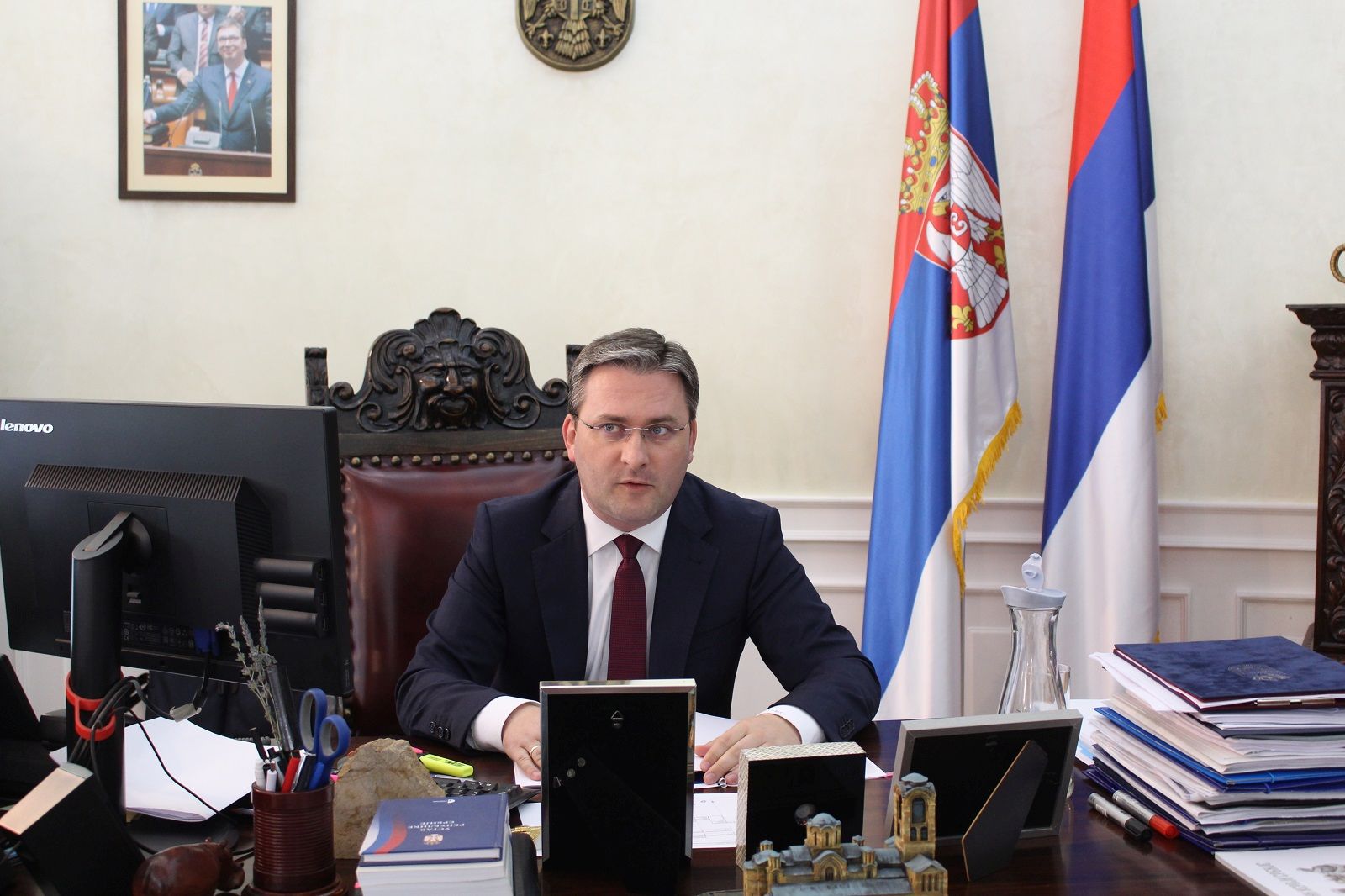 |
|
|
| 13. July 2021. Selaković invited representatives of members of the NAM to gather in Belgrade in October |
|
The Minister of Foreign Affairs of the Republic of Serbia, Nikola Selaković, spoke at the Ministerial Conference of the Non-Aligned Movement (NAM) today and on that occasion sent an invitation to the representatives of the members to gather in Belgrade on 11 and 12 October, when the 60th anniversary of the first Conference of the Non-Aligned Movement held in Belgrade in 1961 will be marked. Selaković informed the participants of the conference that Serbia would organize this important jubilee of non-aligned countries together with Azerbaijan – which is currently chairing the NAM. In his address, Selaković reminded that the former Yugoslavia and President Tito, as co-founders of the Movement, gave their contribution to creating a vision of a different world, and that Serbia, as one of the successors of Yugoslavia, is proud of that part of its history.
.jpg)
"The spirit of non-alignment is based on equality, freedom, lasting peace, sovereign equality of states and peaceful cooperation of all peoples, and these values are also woven into the state-building foundations of Serbia", the minister said. Selaković said that the Non-Aligned Movement throughout its history has been a beacon of freedom to all those who sought the right to existence and prosperity in a world that was often ruled, not by the force of law, but by the law of force. He assessed that even today we find ourselves in times of serious global challenges in which the Movement has the opportunity to reaffirm its libertarian traditions and commitment to a world of equals. "Serbia, as a militarily neutral and politically independent state, will give its most sincere contribution to such goals of the Movement. We hope that by strengthening mutual ties and cooperation, as a group of states and peoples that share the same values and interests, we will strengthen our common capacity to face the challenges of tomorrow. And the challenges are already before us", Selaković pointed out. The Minister emphasized that international law should be a pillar of political and security architecture of the world, and added that Serbia respects the commitment of the members of the Movement towards the goals and principles of the UN Charter. "Many members of this movement are aware that by insisting on international law, they are working in their own favor and in favor of preserving regional and global stability," the minister pointed out. Selaković also said that the COVID-19 pandemic clearly showed that inequality, lack of solidarity and empathy in the world have become very obvious in the roughest way. "Serbia is eternally grateful to all the countries which, such as Azerbaijan, helped us in difficult times. We later extended that chain of solidarity by making vaccines available, not only to our citizens, but also to others in the region. We supported our neighbors with the belief that solidarity is the best investment in a common future", the minister concluded. |
|
|
| 20 May 2021, Minister Selaković presented the new e-Consulate service |
|
A new service of the Ministry of Foreign Affairs "e-Consulate" was presented in Belgrade today, intended for foreign citizens who apply for a visa and aspire to come to Serbia to work. On that occasion, Minister of Foreign Affairs of the Republic of Serbia Nikola Selakovic said that this service was one of the indicators of good development of our country, which, as he pointed out, was becoming a magnet for serious foreign companies, which brought a large number of workers from other countries to work in Serbia. "Not to be pretentious, but completely realistic, this service represents a turning point in the functioning of our system. E-Consulate and digitalization of the procedure for issuing work visas for foreign citizens who want to work in Serbia, is the first electronic service offered by the Foreign Ministry, and I can promise you that this is indeed our first, but by no means the last e-service", Selakovic emphasized. The Head of Serbian diplomacy pointed out that "e-Consulate" reflected the modernization of an extremely important segment of the activities of diplomatic and consular missions of Serbia, and that we were actually talking about something that was essential for the further development processes of our country. The Minister recalled that, when the President of the Republic visited the construction site of the Moravian Corridor, he was told that some construction works were delayed because Bechtel company was not issued work visas on time. “The moment we saw that and heard the President, I alerted the services in the Ministry.
.jpg)
We were surprised, as we knew that the issuance of visas in Turkey had a good dynamic, and then we determined that it was actually workers from Bangladesh who applied for a visa through our Embassy in India, where we have a problem with staff shortage”, the Minister explained. As he added, this is a demanding and laborious task, each of our employees had to receive the documentation on paper, check it, then request additional information, and only then forward it. "Today, this has been fantastically perfected for our consular officers, all that documentation is submitted in electronic form. We used to have two filters to check the documentation, now we actually have three. And the work is significantly more efficient", Selakovic pointed out. As he emphasized, this is a service which was promised less than four months ago and it becomes available on Monday, in 95 diplomatic and consular missions of Serbia, i.e. in all our embassies and consulates general.The biggest result of that endeavor, the Minister pointed out, apart from the advantage it would bring in the future work, was the fact that it was not a project of one state body, but a joint endeavor of the Ministry of Foreign Affairs, IT and eGovernment Office, General Secretariat of the Government, Ministry of the Interior, Ministry of Labor, Employment, Veterans and Social Affairs, National Employment Service. “We did an extremely good job in record time. This is to the pride of our Ministry, to the pride of the entire state. I am convinced that in the period ahead, we will further modernize our affairs and make Serbia one of the few countries that has such mechanisms and such state-of-the-art provision of consular services", Selakovic said. Speaking about the "e-Consulate" portal itself, the Minister explained that there is a cartoon of Nikola Tesla and the building of the old railway station with one crane, which actually symbolizes a historical fact - that Tesla was in Belgrade in the year when it was built."Today it is the place behind which the Belgrade of the future is rising, and what we managed to do together is an indicator of something that is the future of Serbia, the development of artificial intelligence, IT and creating conditions for more people to live and arrive here in Serbia in the future seeking good life and employment", concluded the Minister. The Director of the Office for IT and eGovernment, Mihailo Jovanovic, said that this was the first time that e-services were focused on foreign citizens, which was the case with our citizens so far. In the period from 1 January 2019 to 17 May this year, the most applications for Serbian visas were submitted at the Embassy in Beijing, 6,766 applications, then in New Delhi - 2,973, Shanghai 2,115, Tokyo 1,798, and Cairo 1,756. In that period, 1,270 requests were submitted in Algiers, 1,095 in Jakarta, and 1,077 in Beirut. In terms of their nationality, Serbian D visa for employment is most requested by citizens of China - 9,516 applications, followed by India 1,955, and Ukraine - 673. |
|
|
| High Commissioner of Uganda receives Ambassador Zupanjevac |
|
The new High Commissioner of the Republic of Uganda Dr. Hassan Wasswa Galiwango welcomed the Ambassador of the Republic of Serbia Dragan Zupanjevac in the Ugandan High Commission in Nairobi. The Ambassadors discussed possibilities of enhancing bilateral relations and cooperation which have a long and fruitful history. Particular attention was devoted to the potential of strengthening relations in the sectors of economy, agriculture, education and defense.
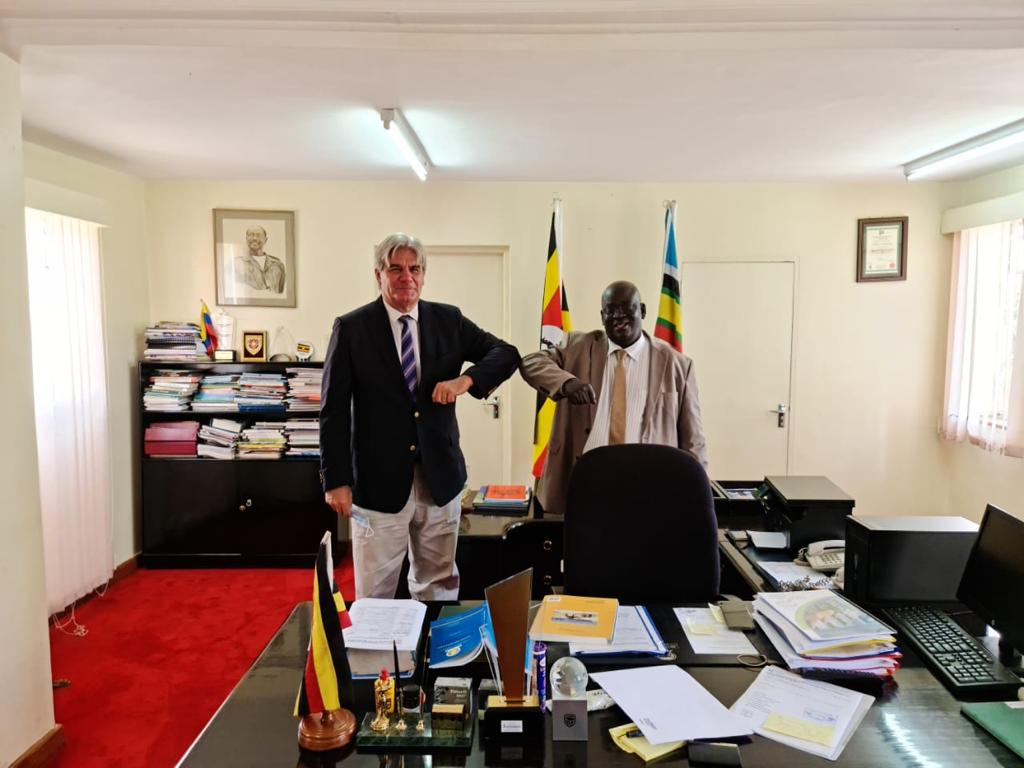 |
|
|
| 21 April 2021 President Vučić met via video link with representatives of the IMF delegation |
|
President of the Republic of Serbia Aleksandar Vučić talked today via a video link with the representatives of the delegation of the International Monetary Fund led by the Head of the Mission, Jan Kees Martijn. The interlocutors concluded that Serbia's main goal remains to preserve the hard-earned reputation of a fiscally secure country, as well as to continue with a responsible fiscal policy so that public debt does not exceed 60 per cent of GDP, whereby Serbia continues to work on further economic growth. During the conversation, President Vučić and Jan Kees Martijn especially referred to the incentive measures and adopted three packages of measures to help the economy and citizens, which preserved macroeconomic stability and even achieved a higher employment rate. Martijn commended the responsible economic policy of Serbia and the successful crisis management during the pandemic. "Serbia achieved one of the best results last year despite the challenges of the pandemic", Martijn said, noting that Serbia was one of the few countries to which the IMF did not adjust the initial projection of the 5% growth rate it gave last year.
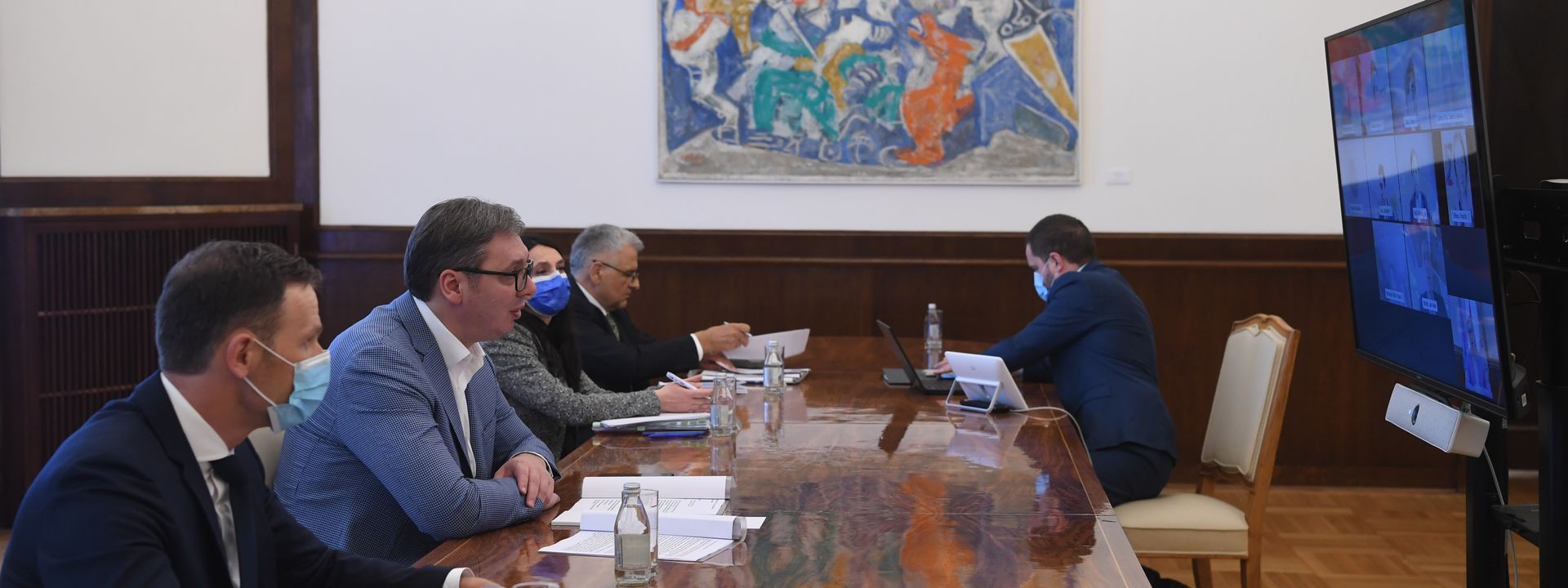
President Vučić added that following the first quarter of 2021, Serbia is well on its way to achieving the planned growth of 6% as planned, since one of the main focuses of the Government is investing in large infrastructure projects and intensifying work on attracting foreign direct investments. "In 2020, Serbia was at the very top in terms of economic growth in Europe, and I am convinced that this year we can enter the first three or four countries in terms of growth", said President Vučić, adding that he was satisfied that Serbia still, despite the pandemic situation, has an extremely strong inflow of investment. President Vučić and Jan Kees Martijn also discussed a new advisory arrangement, which is of special importance in light of the improvement of the general investment climate in Serbia, as well as in the context of even greater investor assurance. "Given Serbia's tremendous progress over the past eight years, the priority goal of this arrangement will be to preserve the results achieved, but also to provide support for further implementation of structural reforms aimed at even faster, stronger and more sustainable growth", said President Vučić and thanked the IMF and the personal engagement of Jan Kees Martijn in the professional and expert support that Serbia is counting on. President Vučić pointed out that Serbia will pay special attention to reforms in public companies, and that priorities will continue to be investments in infrastructure, creating an even better climate for investments, greater investments in the environment, science and capital projects, which will further contribute to the long term stable financial growth in the coming years.
Source: www.predsednik.rs
Photo: www.predsednik.rs |
|
|
| 19 April 2021 WHO describes immunisation process in Serbia as impressive |
|
Prime Minister Ana Brnabic talked today with World Health Organisation (WHO) Regional Director for Europe Hans Kluge about the epidemiological situation and the course of immunisation of citizens in Serbia. Brnabic expressed gratitude for the cooperation in the fight against the pandemic, technical assistance and expertise, emphasising that the support of this organisation is very important for our country. She informed the WHO Regional Director for Europe about the course of immunisation of citizens in Serbia, expressing her belief that, thanks to the large number of vaccinated people, we will be able to create collective immunity and return to normal life. Kluge assessed the immunisation process in Serbia as impressive, and added that Serbia has made a good decision to offer citizens all available vaccines used in the fight against coronavirus. Expressing concern over the emergence of new strains of the virus, he stressed the need to speed up the immunisation process and show mutual solidarity. The WHO Regional Director for Europe praised Serbia for the humanity it has shown by donating vaccines to the countries of the region and enabling vaccination for those who do not have a sufficient number of vaccines for their citizens. The Prime Minister said that Serbia will continue to cooperate with the countries of the region and help in accordance with its capabilities. When it comes to the project "Roadmap for Health in the Western Balkans 2021-2025", it was stated that, if epidemiological conditions allow, a regional meeting will be held in Belgrade at the end of the year, important for future improvement of cooperation between countries in the field of health challenges.
.jpg)
Source: www.srbija.gov.rs
Photo: www.srbija.gov.rs |
|
|
| 13 April 2021 Selakovic: Pristina persists in its campaign of hatred against the Serbian people |
|
Minister of Foreign Affairs of Serbia Nikola Selakovic stated today that Pristina further persisted in its campaign of hatred against the Serbian people, which was most drastically seen in the unfounded accusations of mass rapes and genocide. At the UN Security Council meeting discussing the Report of the UN Secretary-General on the work of UNMIK, Selakovic emphasized that the efforts of the provisional institutions in Kosovo and Metohija to create a narrative about mass rapes of Albanian women were obvious, and that propaganda methods and lies were used for that purpose. "It is clear that there were victims on all sides in the conflict, as well as that our side has evidence of numerous Serb victims. But the precondition for ensuring the protection of rights that belong to each individual victim is a rational and well-argued approach", Selakovic said responding to the slander of the Pristina representative. Selakovic underlined that, contrary to the claims of politicians from Pristina about 20,000 raped Albanian women, the information provided by the Commission for the Verification and Recognition of Sexual Violence Victim Status indicates 912 raped persons, however, failing to include in this number the Serb women who were victims of violence. "Let me emphasize that Serbia condemns every act of sexual violence in conflicts and is committed to achieving justice for all victims.
.jpg)
The number of victims certainly does not diminish the horrific effect of this type of violence on each victim individually, but also, speculating on numbers does not contribute to justice being served and leads to politicization and slowing down the reconciliation process", Selakovic said. Regarding the genocide accusations, Minister Selakovic stated that they only went to prove that Pristina further persisted in its campaign of hatred, propaganda and open hostility towards the Serbian people. "Through statements given on a daily basis, they attempt to paint a picture that Serbia is to blame for everything and that genocide was committed against Albanians, all in order to hide their own responsibility for the committed crimes", the Serbian Foreign Minister said. He underlined that anyone who knew what the definition of genocide implied would understand that it was not Serbia that committed something, but that the Serbian people was instead a victim of the "state-building" project of the Kosovo Albanians, based on the dangerous idea of ethnically clean territories, as evidenced by more than 200,000 expelled Serbs from Kosovo and Metohija. "We are convinced that the civilized world will not agree to be their accomplice in concealing and covering up their crimes, and that a clear message will be sent to them that they must take responsibility for their actions", Selakovic said. He reminded that until 1999, around 40,000 Serbs lived in Pristina, and that today there were only about twenty of them, that around 17,000 Serbs lived in Pec, and that today there were only the Serbian nuns in the Patriarchate of Pec, that around 12,000 Serbs lived in Prizren before the war, and that today only 17 families remained there, and that in Urosevac, out of 10,000 Serbs who lived there before the war, only the family of a Serbian priest remained. |
|
|
| 13 April 2021 Selakovic: Political extremism of Albanians in Kosovo and Metohija is becoming stronger |
|
Minister of Foreign Affairs of Serbia Nikola Selakovic warned, at the United Nations Security Council meeting, that the political extremism among Albanians in Kosovo and Metohija was not decreasing, but on the contrary, was becoming stronger. At the meeting discussing the Report of the UN Secretary-General on the work of UNMIK, Minister Selakovic recalled that the obligation to form the Community of Serb Municipalities remained unfulfilled for 2,917 days now and that, in fact, 19 April marked eight full years since the agreement was reached in Brussels, while Pristina still refused to follow up on its commitment and enable the formation of the Community of Serb Municipalities. The Minister reminded that the current Prime Minister of the provisional institutions of self-government in Pristina repeatedly threatened to unite the self-proclaimed Kosovo and Albania, and that he also stated that the dialogue with Belgrade was low on the list of his priorities. Minister Selakovic pointed out that it was high time for Albanian leaders in Pristina to show responsibility in fulfilling their commitments, but also a sincere commitment to reaching a compromise solution and building mutual trust. "Serbia is determined and will not give up on identifying a compromise solution, which will be sustainable for future generations as well. The only way to build lasting peace and stability in our region is by working to build trust and insisting on positive political agendas", Selakovic concluded. According to the Minister, lasting peace and stability can only be achieved if none of the participants in the dialogue pursued maximalist demands and insisted on the complete humiliation of the other. He pointed out that the Serbian and Albanian peoples, as the two most numerous peoples in the Western Balkans, needed to find a way to reach reconciliation and a basis for cooperation, both in terms of the economy and in achieving shared prospects for membership of the European Union. "Belgrade has made sincere steps in that direction, by being one of the initiators of the idea of relaxing the flow of people, goods, capital and services, popularly referred to as "mini-Schengen", the Minister underlined. Pointing out that Serbia had time and time again demonstrated its commitment to dialogue as the only way towards a peaceful, political solution to the problem in Kosovo and Metohija, Selakovic underscored that the recent elections in the Province confirmed that political extremism among Albanians in Kosovo and Metohija was not decreasing, but on the contrary, was becoming stronger, which could be seen during the recent pre-election process. Minister stressed that political pressures on Serbs continued even after the election process was completed, by denying Serbs fair representation in provisional institutions as the new so-called government in Pristina decided to assign only one ministry to the Serb community. "Serb returnees represent a particularly vulnerable category, who spend their every day in fear of being attacked. I remind you that the southern Serbian province is still an area with the lowest return rate of displaced persons in the world", the Minister said and emphasized that, in the last year alone, more than 80 attacks and incidents took place in our southern province, targeting Serbs, their property and religious sites. It is particularly worrying for the Serbian people in Kosovo and Metohija, Selakovic noted, that in the previous period, and especially in March this year, there were frequent physical attacks on the property of the Serbian Orthodox Church. "A striking example of the disrespectful attitude towards Serbian cultural and religious monuments in the Province, whose exceptional universal value UNESCO confirmed by inscribing them on the World Heritage List, is the case of the Visoki Decani Monastery", the Minister underlined. Furthermore, the Serbian Foreign Minister assessed as concerning the breaking into the Health Center in Strpce by police inspectors and officers, in January this year, who conducted a search aiming to discover Covid-19 vaccines there, originating from central Serbia. "Although we consider this to be an intrusion into a health care institution, our reaction was restrained this time as well. We did not want our decisions to cause escalation and politicization of activities that are solely aimed at protecting public health. We organized the vaccination of citizens from Kosovo and Metohija at three locations in central Serbia and thus clearly demonstrated that people's lives are the top priority to us", the Minister stressed. Minister Selakovic stated that Serbia highly valued the activities of UNMIK mission in Kosovo and Metohija and that it supported it in carrying out its work as efficiently as possible and undiminished in scope, aiming to build and preserve security in the Province. Selakovic said that the international missions in Kosovo and Metohija - UNMIK, KFOR, EULEX and the OSCE mission, under the administration of the United Nations and in line with UNSC Resolution 1244, played a key role in the preservation of peace and protection of the population. "We support and respect their engagement and efforts made in the framework of their mandates, with the common goal of creating conditions for a peaceful and safe coexistence of the inhabitants of Kosovo and Metohija. The Serb and other non-Albanian population in Kosovo and Metohija have the utmost confidence in the international presence and consider it a guarantor of security and a barrier against the arbitrariness of the provisional institutions in Pristina", the Minister emphasized. He said that this demonstrated the need that international missions remain engaged in an undiminished scope, in order to consistently implement UNSC Resolution 1244. Selakovic further emphasized the importance of KFOR international forces and pointed out that any unilateral attempt to assign to someone else or that someone else assumes a part of KFOR's mandate and responsibilities constitutes a violation of UNSC Resolution 1244. The Minister also noted as unacceptable the unilateral decisions on the formation of the Pristina "Ministry of Defence" and launching the process of transforming the so-called "Kosovo Security Forces" (KSF) into the so-called "Kosovo Army". At the beginning of his statement, Minister Selakovic lodged a protest against the abuse of the video format of the session by the representative of Pristina as she had a flag of the self-proclaimed "Kosovo" placed behind her, and the representative of Russia did the same.
.jpg)
Below is an integral version of the speech of the Minister of Foreign Affairs Nikola Selakovic Distinguished President of the Security Council, Distinguished Special Representative, Esteemed members of the Security Council, At the outset, I have no choice but to lodge a protest against the abuse of the video format of this session on the part of the representatives of Pristina in order to promote the symbols of the so-called statehood of Kosovo. Despite the fact that the representatives of Pristina were warned on several occasions, including by the President of the Security Council at the previous session, that such abuses of Security Council sessions are absolutely unacceptable and constitute a flagrant violation of the Security Council rules on participation of representatives of the provisional institutions of self-government in Pristina, under Rule 39 of the UN Security Council Rules of Procedure, we are again faced with their reckless disregard for the rules of this distinguished body. Let me reiterate our call for the necessary steps to be taken to prevent such abuses. It is my great pleasure to address this august body at the meeting on the work of the Mission of the United Nations in Kosovo and Metohija. At the outset, I would like to thank Secretary-General of the United Nations Mr. Guterres and Special Representative of the Secretary-General and Head of UNMIK Mr. Tanin for the report submitted and for their efforts made towards the implementation of the UNMIK mandate, and also to the members of the Security Council for the continued attention they have devoted to the issue of Kosovo and Metohija. The Republic of Serbia highly values the activities of the Mission of the United Nations in Kosovo and Metohija and supports it in carrying out its work as efficiently as possible and undiminished in scope, aiming to build and preserve security in the Province. Mr. President, In the previous period we have faced political instability in Kosovo and Metohija. We recently had elections in the Province, which unfortunately confirmed that political extremism among Albanians in Kosovo and Metohija is not decreasing, but on the contrary, is becoming stronger. We have witnessed Albanian leaders competing among themselves in efforts to find the best way to provoke an incident in Serb communities, in order to score political points of the Albanian electorate. Under the pretext of amending the voter list, a large number of Serbs in Kosovo and Metohija were deprived of one of their fundamental political rights - the opportunity to elect their political representatives. Out of approximately 140,000 of citizens of Kosovo and Metohija who were removed from the voter list in the latest election process, 85% are Serbs. Despite numerous challenges and problems, the Serbian people in Kosovo and Metohija have shown, by high turnout and a convincing victory of the Serb List which won all ten seats reserved for Serbian representatives, that nothing can stop them from resolutely defending their position. Political pressures on Serbs continued even after the election process was completed, by denying Serbs fair representation in provisional institutions as the new so-called government in Pristina decided to assign only one ministry to the Serb community. Distinguished members of the Security Council, Unfortunately, it was not only during the election activities that we witnessed the unreasonable anti-Serb policy being pursued by the provisional institutions in Pristina. This goes to the length of breaking into the Health Center in Strpce, in the south of Kosovo and Metohija, by police inspectors and officers from Pristina, in January this year, who conducted a search aiming to discover Covid-19 vaccines there, originating from central Serbia, which they did not find. In doing so they demonstrated force and threatened to arrest the director of the Health Center, medical staff and doctors. At a time when the whole world is fighting the pandemic with vaccines being the only way to end this challenge, while Serbia is showing support and solidarity by donating vaccines and medical equipment to all in need in the region, Pristina wants to destroy vaccines only because they originate from central Serbia. As the whole world expresses gratitude to medical doctors, who have made great and heroic sacrifices in combating the virus, the provisional institutions in Pristina are attacking Serbian doctors for doing their job. Although we believe that intrusions into health care institutions are inadmissible, our reaction was restrained this time as well. We did not want our decisions to cause escalation and politicization of activities that are solely aimed at protecting public health. We organized the vaccination of citizens from Kosovo and Metohija at three locations in central Serbia and thus clearly demonstrated that people's lives are the top priority to us. Serbia continues to be ready to help all in need of assistance, and we call for reason and responsibility, especially in such difficult times. Mr. President, Attacks targeting Serbs and their property have been on the rise. In the last year alone, more than 80 attacks and incidents took place in our southern province, targeting Serbs, their property and religious sites. According to the information provided by the OSCE Mission in Kosovo and Metohija, in the second half of last year, the number of incidents increased by more than 30% compared to 2019. Therefore, we cannot agree with the assessment that the "security situation in Kosovo remained stable, with a few incidents reported affecting non-majority communities". Last weekend, for example, an entirely unprovoked physical attack by a group of Albanians on two Serb young men took place in the northern part of Kosovska Mitrovica. Serb returnees represent a particularly vulnerable category, who spend their every day in fear of being attacked. The fact that one family of returnees was the target of seven attacks clearly indicates the persistence of those who do not want Serbs in Kosovo and Metohija. There is absolutely no trace of political will in Pristina for 212,995 displaced Serbs who have been living outside Kosovo and Metohija for 22 years to return to their homes. Since 1999, the rate of sustainable return of internally displaced persons in Kosovo and Metohija has been only 1.9%, which according to the UN data is officially the lowest percentage of return of expelled population after a conflict anywhere in the world. At the same time, while arresting internally displaced persons, Pristina authorities are exerting the strongest of pressures on the Specialist Chambers in The Hague. The aim is to completely prevent the further processing of a number of cases against members of the terrorist KLA, on charges of serious crimes committed during the conflict in Kosovo and Metohija against both Serbs and persons belonging to other nationalities. President of the Specialist Chambers Madam Trendafilova recently warned that, should the pressures continue, this would have very dramatic consequences to the trials in progress. President Trendafilova underlined as highly problematic the phenomenon of witness intimidation, who are key for conducting proceedings successfully and rendering a proper verdict. Although the wait to raise indictments was far too long, we consider it commendable that efforts have finally been made to punish the perpetrators of numerous serious crimes which were committed during the armed conflicts a little over two decades ago, but also upon the arrival of the international forces to Kosovo and Metohija. For example, no one has been held accountable to this day for the killings and abductions of 17 journalists in Kosovo and Metohija, which is currently the largest number of unsolved cases of murdered and kidnapped journalists in Europe. Furthermore, the perpetrators of any of the mass crimes committed against Serb civilians after 1999 have not been brought to justice. I will remind you of only a few of these cases: 14 Serb farmers were killed in the village of Staro Gracko, 12 displaced Serbs were killed and 43 wounded in the attack on the "Niš Express" bus in Livadice near Podujevo, and in Gorazdevac near Pec unknown persons fired automatic weapons on children who were swimming in the Bistrica river. Two Serb children were killed then, and four were seriously injured. We expect the EULEX Mission to continue to support the Specialist Chambers and the Specialist Prosecutor's Office, as well as its additional engagement in the field of the rule of law. Special attention needs to be devoted to witness protection, and determining the fate of missing persons. International missions in Kosovo and Metohija - UNMIK, KFOR EULEX and OMIK are an integral part of the international civilian and security presence in our southern province, under the administration of the United Nations and in line with UNSC Resolution 1244 (1999), and play a key role and make an outstanding contribution to the preservation of peace and protection of the population. We support and respect their engagement and efforts made in the framework of their mandates, with the common goal of creating conditions for a peaceful and safe coexistence of the inhabitants of Kosovo and Metohija. The Serb and other non-Albanian population in Kosovo and Metohija have the utmost confidence in the international presence and consider it a guarantor of security and a barrier against the arbitrariness of the provisional institutions in Pristina. This further demonstrates the need that international missions remain engaged in an undiminished scope, in order to consistently implement UNSC Resolution 1244. I would like to further emphasize the importance of KFOR international forces and point out that any unilateral attempt to assign to someone else or that someone else assumes a part of KFOR's mandate and responsibilities constitutes a violation of the UNSC Resolution 1244, while also being a potential source of instability and tensions. I will remind you that Pristina, contrary to international law and completely ignoring the interests and positions of the Serb community in the Province, would not abandon its plans to install a new security actor in the territory of Kosovo and Metohija. We consider the unilateral decisions on the formation of the "Ministry of Defence" and launching the process of transforming the so-called "Kosovo Security Forces" (KSF) into the so-called "Kosovo Army" to be unacceptable. I would like to reiterate that such unilateral moves on the part of Pristina constitute a gross violation of the UNSC Resolution 1244 and the Military Technical Agreement, according to which only the International Security Forces, that is KFOR, have the mandate for all military aspects of security in the territory of Kosovo and Metohija. In this context, an additional reason for concern is the announcement of the construction of the largest base of the "Kosovo Security Forces" in the southern part of Kosovska Mitrovica, which Serbs in the north of Kosovo and Metohija perceive as the most open provocation and threat to their physical safety. Distinguished members of the Security Council, It is particularly worrying for the Serbian people in Kosovo and Metohija that in the previous period, and especially in March this year, there were frequent physical attacks on the property of the Serbian Orthodox Church. In just two weeks, as many as seven Orthodox landmarks in the province were targeted by vandals, at a time when we all remember the March 2004 pogrom against Serbs and Serbian holy sites in Kosovo and Metohija. The condition of the Serbian cultural and spiritual heritage in Kosovo and Metohija is humiliating, including the four monuments that are inscribed on the UNESCO List of World Heritage in Danger (Visoki Decani, Holy Virgin of Ljevisa, Gracanica and the Patriarchate of Pec). Numerous administrative and technical barriers are imposed on priestly and monastic communities, which makes it more difficult or even impossible for them to survive on church property. A striking example of the disrespectful attitude towards Serbian cultural and religious monuments in the Province, whose exceptional universal value UNESCO confirmed by inscribing them on the World Heritage List, is the case of the Visoki Decani Monastery. Distinguished members of the Security Council, The reason for the nervous behaviour of Pristina is all too obvious, as the project of the so-called independence today fails to be recognized by more than a half of the United Nations Member States, including five members of the European Union. However, it is high time for Albanian leaders in Pristina to show responsibility in fulfilling their commitments, but also a sincere commitment to reaching a compromise solution and building mutual trust. I will remind you that the current Prime Minister of the provisional institutions of self-government in Pristina has repeatedly threatened to unite the self-proclaimed Kosovo and Albania in the past. A member of his party publicly said last weekend that the self-proclaimed Kosovo and Albania would be united, I quote, "with rifle and gunpowder, or referendum boxes". I need not explain why such dangerous ideas constitute a direct threat to peace and stability. They violate Resolution 1244, while continuously destabilizing not only our southern province, but the entire region as well, and in no way contribute to the dialogue process, but instead hamper it again. We have demonstrated time and time again our commitment to dialogue as the only way towards a peaceful, political solution to the problem in Kosovo and Metohija. Even today, after many years of negotiations, but also failure to fulfill what was agreed and constant unilateral moves and provocations on the part of the provisional institutions in Pristina, we are still ready to sit down at the table and talk. We are ready for dialogue but not to be blackmailed and threatened and especially not for ultimatums recently presented by Prime Minister of the provisional institutions of self-government in Pristina. I will remind you of his statement that the dialogue will be low on the list of priorities of the Pristina authorities. It is bewildering how Pristina refers to ultimatums completely undermining any chance of dialogue, as the European Union also pointed out, as "principles" and how it persistently insists that Belgrade should recognize the unilaterally declared independence of "Kosovo", upon which, they believe, all else would be resolved. What is the purpose of the dialogue then, if Belgrade is only expected to recognize the so-called Kosovo? Does the dialogue imply that one side should give up everything only for the other to win it all? And does the dialogue, in Pristina's opinion, imply that what was agreed should not be fulfilled? I will remind you that Pristina still refuses to follow up on its obligations arising from the agreements reached so far and does not agree to discuss their implementation within the dialogue. And the situation is quite simple - in April 2013, the first agreement was signed in Brussels, which envisaged four obligations: one for Pristina and three for Belgrade. Belgrade has fulfilled all obligations, while the only obligation that the provisional institutions in Pristina had - to form the Community of Serb Municipalities - has remained unfulfilled for 2,917 days now. In fact, 19 April marks eight full years since the agreement was reached in Brussels, and of Pristina's failure to fulfill the obligation to form the Community of Serb Municipalities. Distinguished Mr. President, Regardless of the discouraging messages heard from Pristina and the fact that the dialogue has been in progress for many years, Serbia is determined and will not give up on identifying a compromise solution, which will be sustainable for future generations as well. Lasting peace and stability can only be achieved if none of the participants in the dialogue pursues maximalist demands and insists on the complete humiliation of the other. The Serbian and Albanian peoples, as the two most numerous peoples in the Western Balkans, need to find a way to reach reconciliation and a basis for cooperation, both in terms of the economy and in achieving shared prospects for membership to the European Union. Belgrade has made sincere steps in that direction, by being one of the initiators of the idea of relaxing the flow of people, goods, capital and services, popularly referred to as "mini-Schengen". As far as Serbia is concerned, we are convinced that the only way to build lasting peace and stability in our region is by working to build trust and insisting on positive political agendas. The inhabitants of Kosovo and Metohija, of any nationality, whether they are Serbs or Albanians, do not deserve anything less. Thank you for your attention |
|
|
| Meeting with High Commissioner of Tanzania |
|
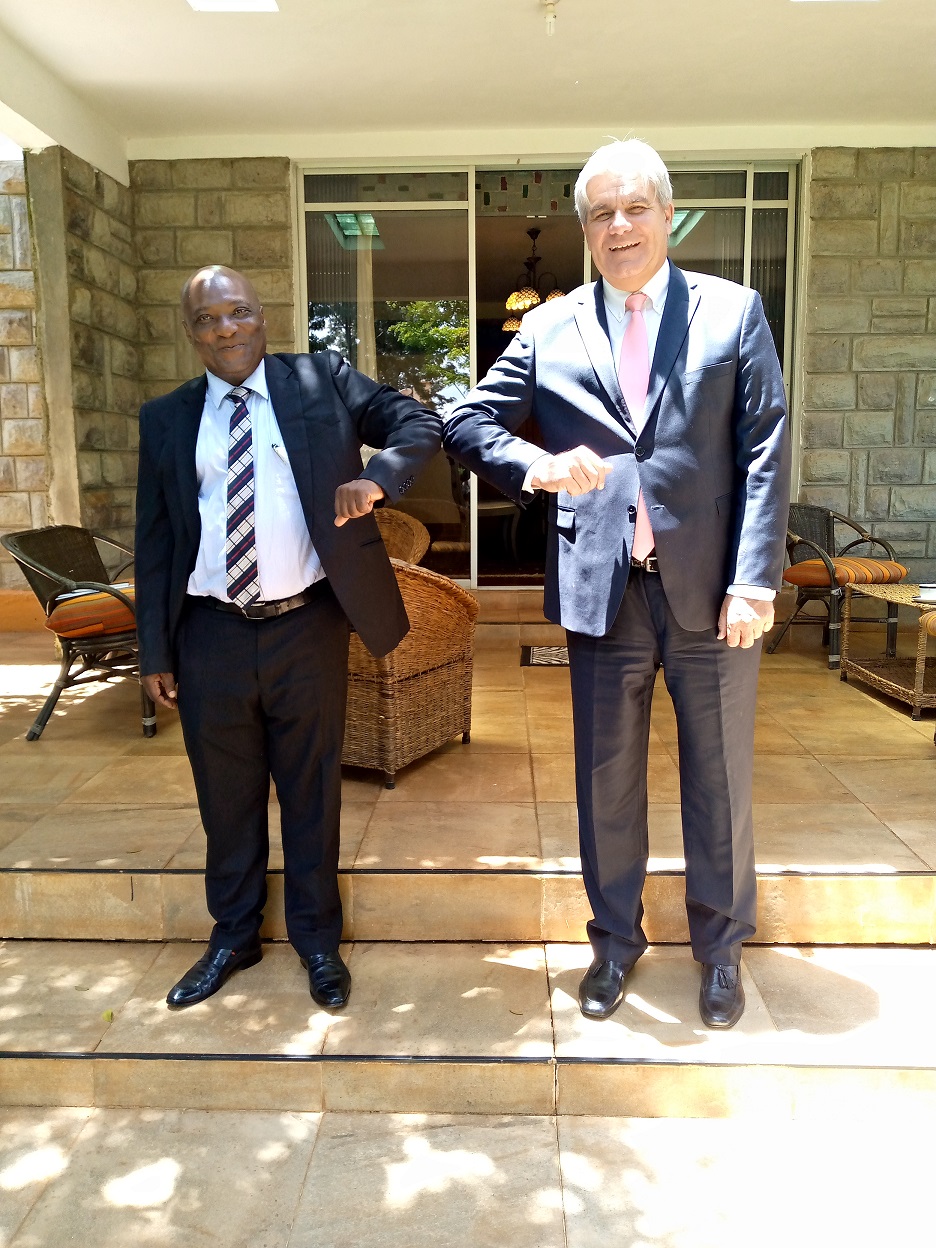
Ambassador Dragan Zupanjevac recieved the High Commissioner of Tanzania H.E Dr John Stephen Simbachawene at the Embassy of the Republic of Serbia. The Tanzania High commissioner informed on the transition taking place with the swearing in office of the new president of Tanzania and possibilites of enhancing the bilateral relationship were discussed. |
|
|
| Meeting with Zambia and Rwanda High Commsioners |
|
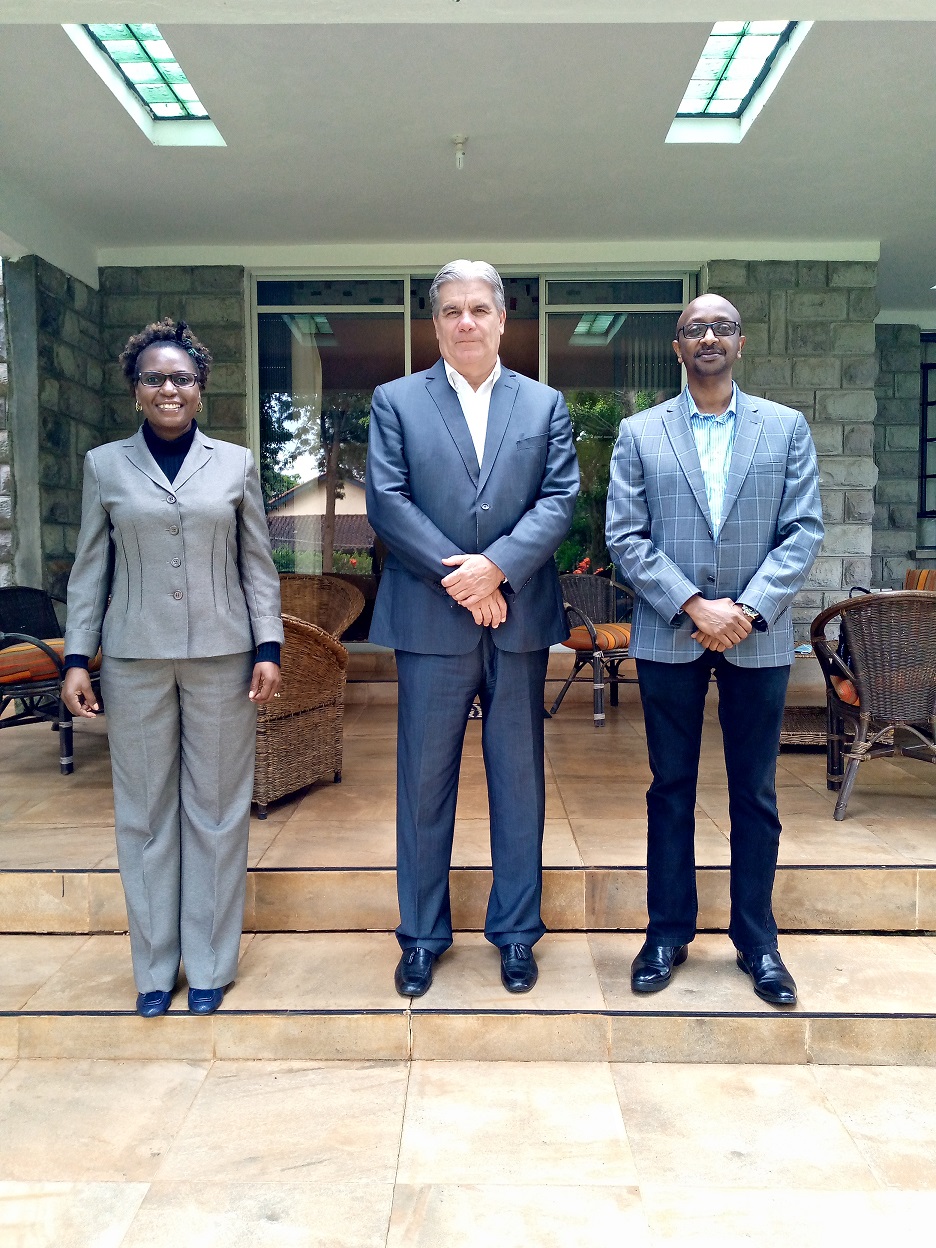
Ambassador Dragan Zupanjevac recieved separately today the High Commisioners of Rwanda and Zambia H.E Dr. Richard Masozera and H.E Ms Joyce Kampampaa Kasosa and talked about ways of enhancing the bilateral cooperation and relations with the two countries. |
|
|
| Marking the Day of Remembrance of the victims of the NATO aggression |
|
President of the Republic of Serbia Aleksandar Vucic made a statement on the occasion of marking the Day of Remembrance of the victims of the NATO aggression. "Your Holiness, distinguished Chairman of the Presidency of Bosnia and Herzegovina, distinguished Speakers of the National Assemblies of the Republic of Serbia and the Republic of Srpska, distinguished Prime Ministers of the Republic of Serbia and the Republic of Srpska, distinguished Ministers of both Governments, dear guests and friends, representatives of the Serbian People from Montenegro, North Macedonia, Croatia, thank you for the fact that we are all together tonight and that the Serbian spirit is unbreakable and invincible. One child a day and a little more than that. That is the most difficult, sickening and painful number of the NATO aggression from 1999. Killed, stopped, guilty of nothing, having committed no sin, without the right to defence, without the right to justice and without the right to life. No one has ever been held accountable for this crime, a crime greater than a crime. No one, for the 2,500 killed civilians, but also soldiers and policemen who were only guilty of guarding, protecting themselves and their homes. No one has ever been held accountable for more than 6,000 persons injured. Even today, 22 years after the aggression, it is not possible to explain that, there is no universal justification, despite all the work done to that end, there is no reason, it makes no sense, and only names remain, as eternal as sin.
Miljana Milic, fifteen years old
Vladimir Milic, twelve years old
Miomir Mladenovic, fourteen years old
Dragan Dimic, three years old
Julijana Brudar, ten years
Olivera Maksimovic, twelve years old
Miroslav Knezevic, thirteen years old
Dajana Pavlovic, five years old
Stevan Pavlovic, eight years old
Marko Simic, two years old
Milica Rakic, three years old
Ivan Ivancic, seven years old
Marko Ivanovic, three years old
And the list goes on, eighty nine names, not only Serbian ones...The senselessness of sheer killing did not choose. Sixteen children, aged two to seventeen, from the Ahmetaj and Hasani families, were killed in a convoy returning home to Prizren. In one headline in the West, this was simply explained as a "tragic mistake". The deaths of Marko Roglic, Milan Ignjatovic, Gordana Nikolic, Irena Mitic, Milica Stojanovic, Bojana Tosovic, Branimir Stanijanovic, our Sanja Milenkovic...could not expect or get even such an explanation. Those deaths were not tragic, for those who caused them, much less a mistake. It was just an excuse, a miserable excuse.
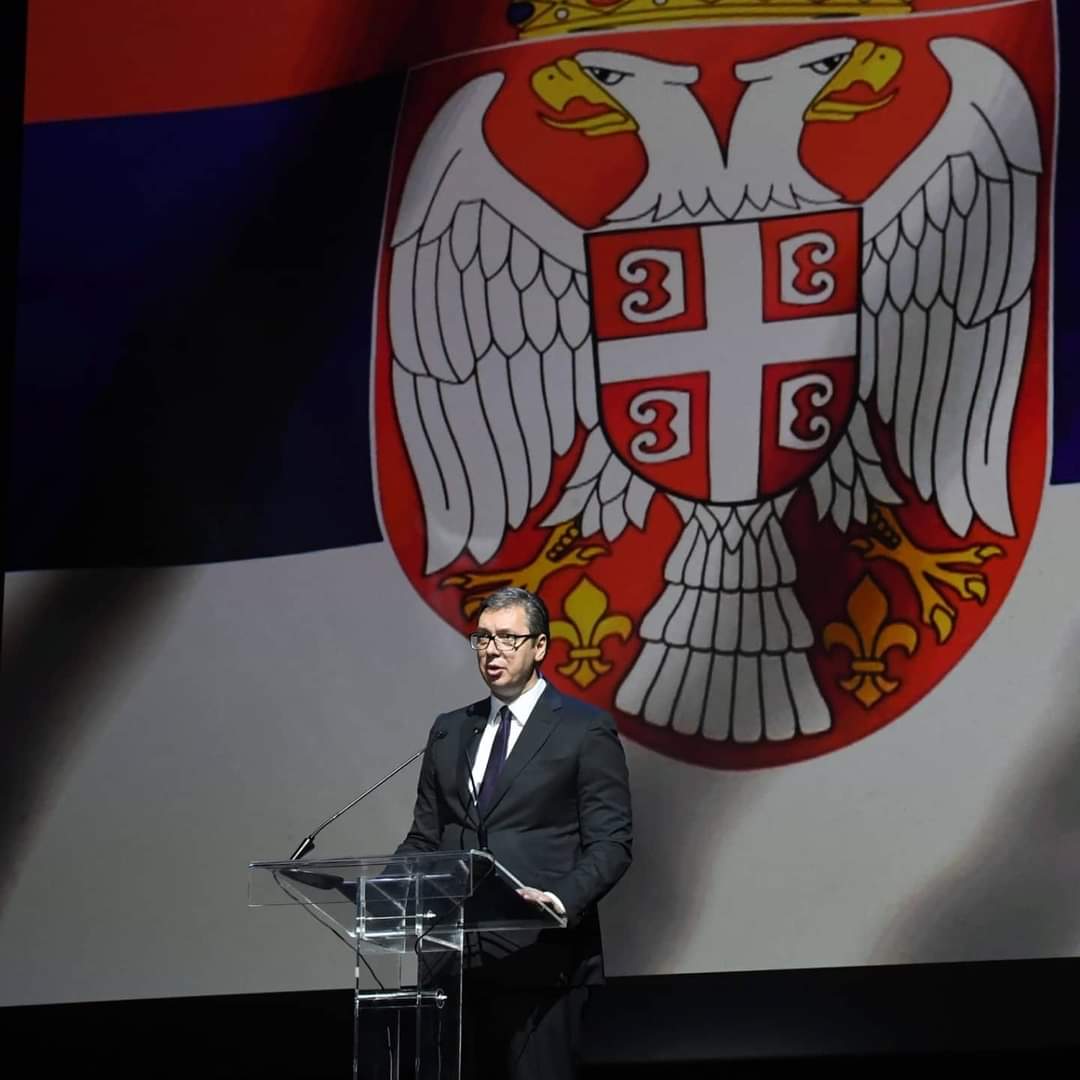
They were a result of intent and a clear decision, as a severe judgment against one country, its people, its children. And that is why today we will refrain from speculation in giving a name to everything that happened during the spring of 1999. Because a crime happened, a heinous and terrible one. And it was an aggression, not a bombing, not an intervention, not a campaign, not an operation. An aggression is what happened. An attack on a sovereign country, without a decision of the United Nations, without a sufficient reason that would justify attacking the then Yugoslavia or a neighbouring or NATO country. No one was attacked by Serbia or the Federal Republic of Yugoslavia at that time. They attacked us, with one goal. To defeat us, to keep killing us, and in the end to take away a part of our territory. And no matter how much we analyze things today, no matter how harsh and critical we are towards ourselves, our policy and leadership at the time, it is clear that the Federal Republic of Yugoslavia and Serbia were left with almost no choice then. The choice was horrible, either the loss of territory and people on the one hand, or the complete disappearance of the Serbian state, morals, honour, Serbian spirit, names and surnames. And we could not help but lose. Nineteen big ones attacked one small country, the Federal Republic of Yugoslavia. They attacked both Serbia and Montenegro. And even when they don't talk about it today, in one of the two independent countries, those are the facts. And that small country, and that small nation, to all nineteen of them so great and powerful, held a lesson in what matters most - honour, morals and love for freedom that a nation can have. Yes, justice, lest we forget justice. All those nineteen great ones today still silently talk about their military success, avoid answering questions, while - can you imagine, one small, only numerically small Serbian people, that small but magnificent nation, with sadness, tears in their eyes, proudly remembers their resistance and struggle against the nineteen cruel and arrogant ones. We lost a lot, we lost our fathers, brothers, spouses, children, but the honour and Serbian heart are still there, to protect Serbia, which is eternal and indestructible. We lost children, we lost people, we lost control over a large part of the territory, we lost billions because of the destroyed infrastructure and economy. And all that was left for us was the body of a tortured, destroyed country, a country in disintegration, mutilated, looted, wounded, deserted, and guilty, condemned for everything that happened not only in the 1990s, but throughout history. A country that, even ten years after the aggression, did not have the strength to stand up, rise to its feet, and do anything but be silent, or bow its head and obediently apologize, for everything, even for its dead, even for its murdered children. Today, it is no longer that failed, tortured, devastated, mutilated Serbia. Today, it is Serbia, which has found its strength and its pride again. Serbia, which calls things by their real names. Serbia, which turned its back on war and defeats, and started working. Serbia, which rose to stand on its own feet and has a voice of its own. Serbia, which, even when they don't believe it, they listen to. Which is capable, which is growing, and is no longer part of the problem. Serbia, which is and will be, at least we will do our best to this end, the very solution that enables the entire region to live in peace and understanding. And that Serbia, today, when there are still many more bombs in the world than vaccines, sends not bombs, but precisely those vaccines to the region. Today, it is ready to produce them as well, and in just a few months we will do just that, but not only for ourselves, but also for others, for the entire Balkans. We are ready, and we are willing to help. We are not ready to be and we will not be silent, nor be humiliated again. We draw the right to that not only from the victims we had, but also from the fact that we stopped looking at others only a long time ago, and looking for fault and guilt only in them, and not sometimes in ourselves as well. We looked at each other and admitted. Every loss, every defeat and every crime that someone committed in our name, every failure and every wrong policy. And we are no longer doing anything that could endanger anyone. We continue to work and work, and grow more and more, gaining strength with only one goal - to be the best in economy and education, health, in culture, science, sports... And we want to be safe, on our own. We want our army to be much stronger than it was in 1999. So that we never again face a situation that someone is killing our children, destroying the country, or expelling our people. We want to remain free, to decide our own destiny, and for no one to take everything away from us ever again, and give us nothing. And that nothing today, and I will repeat it as much as necessary, is the idea of some great, powerful ones, but also those who serve them, the idea that "Kosovo" should recognize us, so that we could recognize "Kosovo". We do not need that recognition. And Serbia will not allow you to walk over our victims, our history, our past, but also to walk over our future. You will get the answer of reasonable, kind and responsible people. We need a compromise. We need all the obligations that we and Pristina have assumed to be fulfilled, but only we have fulfilled them so far. And this is not our whim. It is not a phantasmagoria about a Serbian world that we want to create. Even today, when they threaten us with the formation of a Greater Albania, when they say that the Community of Serb Municipalities is not going to happen, it is ours to be calm, to take care of our people in Kosovo and Metohija, but to send a clear message to all those great, powerful ones that we are not as weak as we were, that we will be able to preserve what is our own, not touching anything that belongs to anyone else. After all, Serbia is not and will not be but a handful of oats that every crow from the whole wide world can eat. As for those who used the strength and power of the nineteen arrogant and cruel ones, I only ask them not to threaten us. Please, please, don't threaten us. They should not think that Serbia is broken and that it will not have the strength to respond. Please, please, our Albanian neighbours, do not threaten us. And we ask all others, who have demonstrated their cruelty towards Serbia, not to help you in that. That is all we are asking and nothing more. And we will respond to calls for peace, calls for compromise, and always with good will, because we do not want to have children killed again. And we do not want the children of others to suffer again. But do not underestimate Serbia, and do not look at Serbia with the same eyes as you did in 1999. Today, Serbia is much stronger, much more powerful. Today, Serbia is a united country of togetherness, not a divided one. Today, Serbia is incomparably stronger and better in every aspect than it was in 1999, from the economy to our army. And we will never threaten anyone, we just ask you and request from you to respect us and nothing more. Today, we are building roads that will connect us, among ourselves, with the region and with the world. Until the end of the year, we will work on eight motorways, on eight routes in the entire Balkans, not only Serbia, eight roads of peace and cooperation. Only a crazy person would trade this for war, for dead children, for demolition and new loss. And yes, we want to have the closest relations with everyone who took part in the aggression against our beautiful Serbia, we have forgiven a long time ago, but no, we will never forget. And don't ask us to. That one day, every year, we will remind both ourselves and you. The nineteen of you, the most powerful, strongest, greatest in terms of might and force, but not so much when it comes to honour and morality. We will keep remind you and ourselves, just so it would never happen again. Not to us only, but to none other freedom-loving people in the world. And if we have an offer, today it reads as follows: we are ready to make the whole Balkans a winner, for everyone to win, as long as no one tries to make Serbs the only losers. And the path to this goal is not difficult at all. We just need to respect and understand each other and not try to humiliate each other. And not to touch into what everyone paid the highest and bloodies price for. Freedom. And we, Serbs, know the price of freedom. Into our right to have it, to keep it and to remember all the victims who are part of it. And our defeats, our lives and our children are built into ours. And the lives of our heroic pilots, and our giants from Kosare and Pastrik, and our children, innocent, completely innocent, and only guilty of living in Serbia. This is too high a price to be quiet about it. Because that would mean that we are ready for another defeat, for another humiliation. And we are not. And when all go quiet, we will keep repeating. A child a day, and a little more. This was how much you killed us. In an aggression that even you did not understand why you carried it out. And we will keep repeating this, just so it does not happen to us again. With special reverence, we are fulfilling our obligation to pay tribute to all innocent Serbian victims who laid their lives on the altar of the homeland, both civilians and our heroic soldiers and policemen, the heroes of Kosare, Prizren, Mitrovica. Today, for us Serbs, life in Kosovo and Metohija is like Via Dolorosa, using their last strength on the road to Golgotha, but we would not be Serbs if we were not capable to "exist in a terrible place". And today, tonight, I can conclude with one important sentence. On the soil of Europe, there was, and today is stronger than ever, an indomitable, unwavering, unconquerable and never conquered Serbia. May eternal glory be to all the victims of the NATO aggression and let us all exclaim together - long live free and proud Serbia", President Vucic said. |
|
|
| La République de Serbie au Mois de la Francophonie |
|
La République de Serbie en qualité de membre associé à l'OIF, de concert avec toute la communauté francophone dans le monde entier, célèbre le Mois de la Francophonie. Pour tous les amateurs de la culture serbe et de la langue française, le Ministère de la Culture et de l'Information de la République de Serbie a préparé un vaste programme et L’Ambassade/la Mission permanente/le Consulat de la République de Serbie à…… vous invite à découvrir la diversité et la richesse de la culture serbe en français.
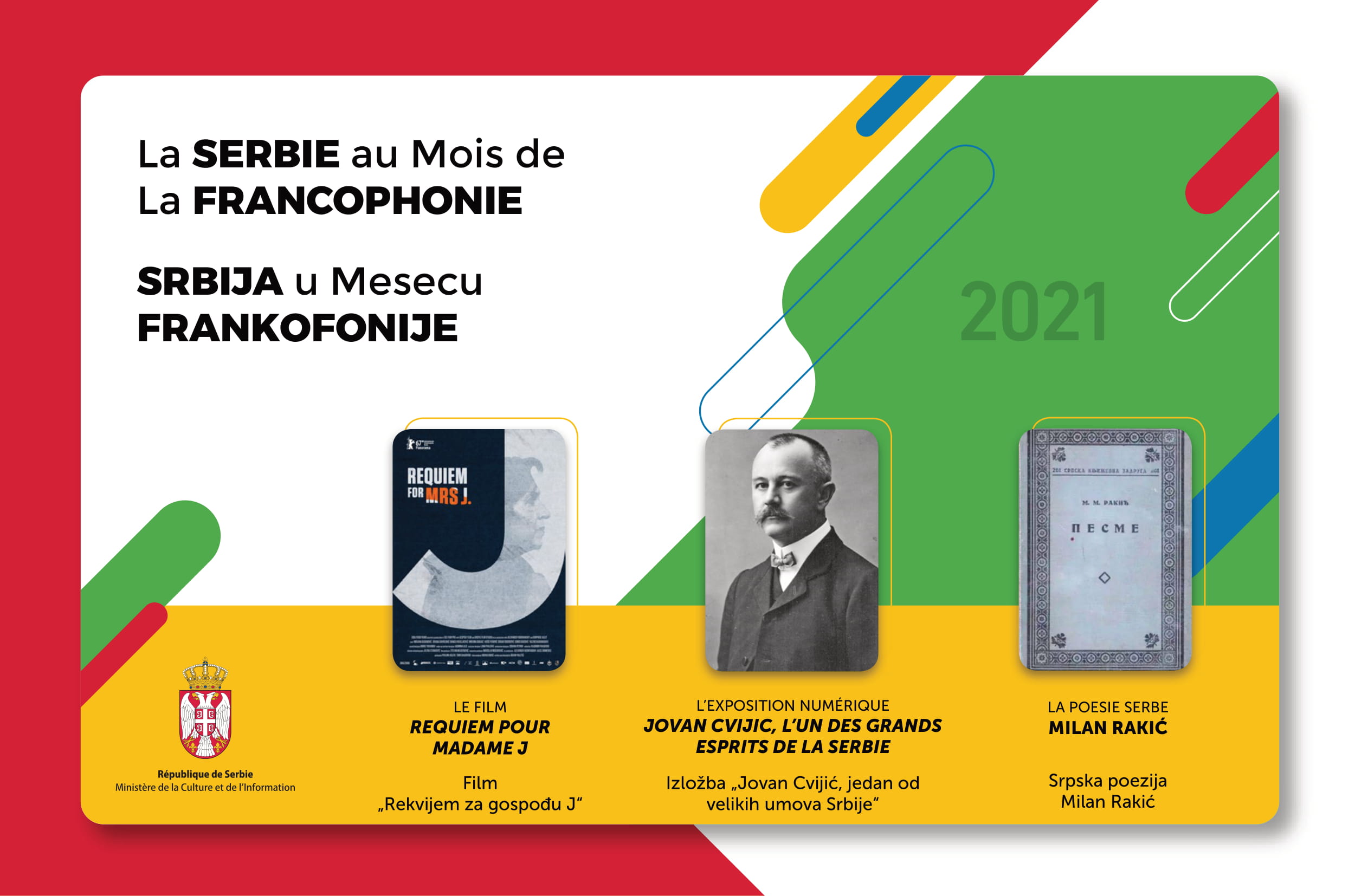 |
|
|
| Commemorating Remembrance Day of 17 March 2004 - Pogrom in Kosovo and Metohija |
|
President of the Republic of Serbia Aleksandar Vucic participated today in the commemoration of the Remembrance Day of 17 March 2004 - Pogrom in Kosovo and Metohija. He said that exactly 17 years ago, a pogrom took place in Kosovo and Metohija, and that pogrom surpassed all other crimes. 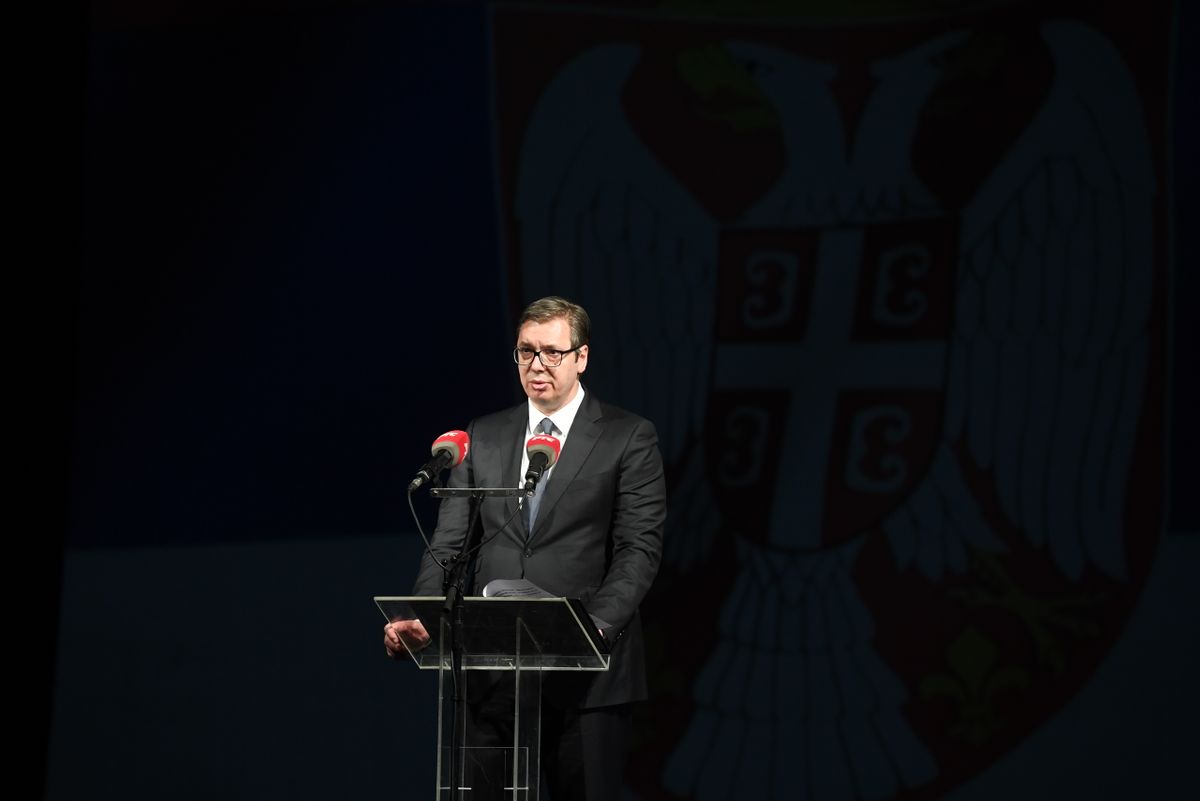 "There may be times when we are powerless to prevent injustice, but there must never be a time when we fail to protest, these words of Elie Wiesel, a camp survivor and Nobel laureate, make it forever incumbent upon us not to remain silent against crime, regardless of who and for what reason committed it", President Vucic stated and added that we remembered and learned every lesson in which we were losers, each one in which we were silent to our own victims, and each one when we were ready to forget. "Serbia is no longer weak today, nor is it a country of losers, it does not threaten, but it does not forget either, it is ready for talks, but not for humiliation. "There may be times when we are powerless to prevent injustice, but there must never be a time when we fail to protest, these words of Elie Wiesel, a camp survivor and Nobel laureate, make it forever incumbent upon us not to remain silent against crime, regardless of who and for what reason committed it", President Vucic stated and added that we remembered and learned every lesson in which we were losers, each one in which we were silent to our own victims, and each one when we were ready to forget. "Serbia is no longer weak today, nor is it a country of losers, it does not threaten, but it does not forget either, it is ready for talks, but not for humiliation. 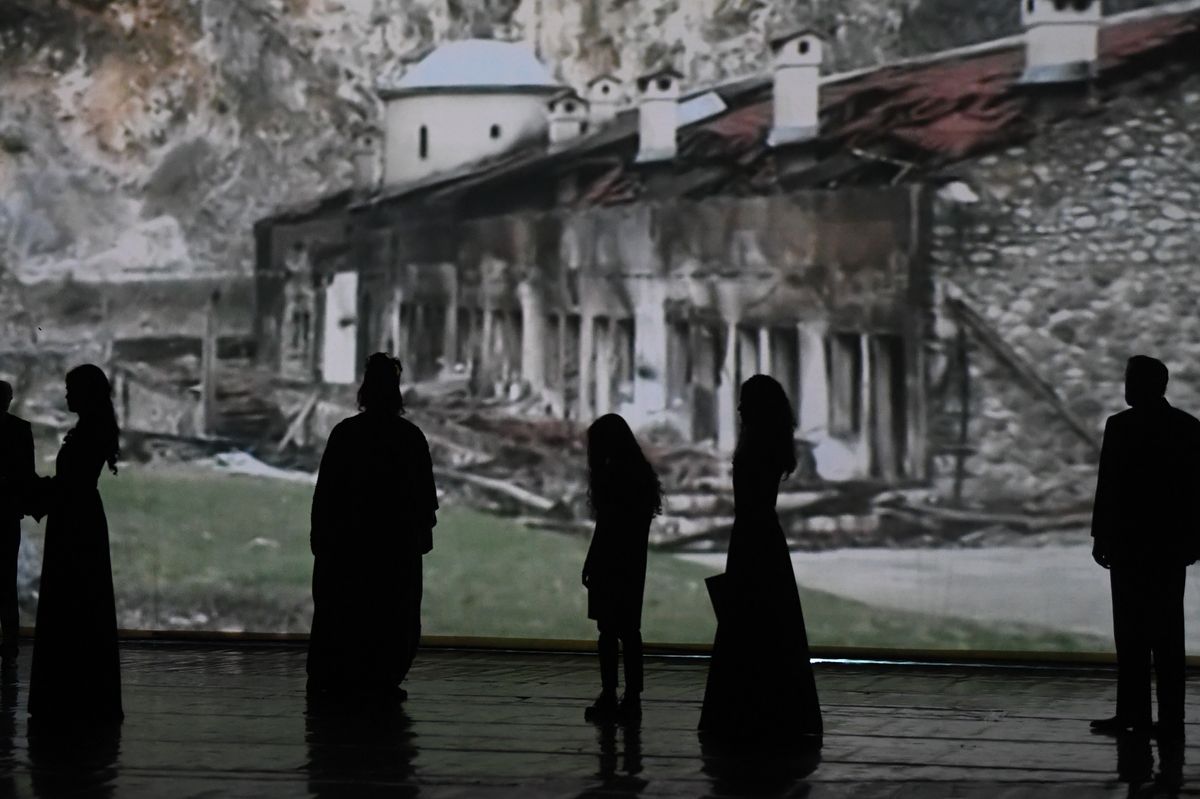 Serbia, just like everyone else, has the right to take care of its people, their safety and well-being. The right to life is a fundamental human right and we will always defend it", President Vucic said. President Vucic said that pogrom surpasses all other crimes, because it is not only an act, but an intention, a policy, a premediated attempt to forcibly cleanse persons belonging to other peoples and faiths from a region or a country. "We have no right to remain silent to that", said the President of Serbia, emphasizing that we have an obligation to be winners without blood spilled and war, to be the best in the economy, healthcare, sports, education and everything else that implies development and progress. "We also wish others to work on themselves and be successful, because we are aware that crime is a tool for losers that winners do not need, as they remember, but forgive and move on, while the losers keep spinning in the same vicious circle. We Serbs do not want to be that anymore, we want a future in which we will remember, but from which we will not return. We know what happened and we call it by its real name", President Vucic concluded. Serbia, just like everyone else, has the right to take care of its people, their safety and well-being. The right to life is a fundamental human right and we will always defend it", President Vucic said. President Vucic said that pogrom surpasses all other crimes, because it is not only an act, but an intention, a policy, a premediated attempt to forcibly cleanse persons belonging to other peoples and faiths from a region or a country. "We have no right to remain silent to that", said the President of Serbia, emphasizing that we have an obligation to be winners without blood spilled and war, to be the best in the economy, healthcare, sports, education and everything else that implies development and progress. "We also wish others to work on themselves and be successful, because we are aware that crime is a tool for losers that winners do not need, as they remember, but forgive and move on, while the losers keep spinning in the same vicious circle. We Serbs do not want to be that anymore, we want a future in which we will remember, but from which we will not return. We know what happened and we call it by its real name", President Vucic concluded. |
|
|
| La première réunion du Groupe de travail pour la coopération avec l’Organisation internationale de la Francophonie |
|
La toute première réunion du Groupe de travail interministériel pour la coopération avec l’Organisation internationale de la Francophonie, présidé par le Ministre des Affaires étrangères Nikola SELAKOVIĆ, a eu lieu aujourd’hui au Ministère des Affaires étrangères de la République de Serbie. La décision de former ce Groupe de travail a été prise par le gouvernement de la République de Serbie le 18 février 2021, visant déterminer les objectifs de la Serbie dans le cadre de sa coopération avec l’Organisation internationale de la Francophonie, ainsi que leur atteinte efficace et à terme.  Le Groupe de travail met l’accent sur la promotion de l’apprentissage et de l’emploi du français, notamment dans l’optique de l’intention de la République de Serbie de devenir membre de plein droit de cette organisation, pour citer le chef de la diplomatie serbe Nikola SELAKOVIĆ lors de la Conférence ministérielle de la Francophonie, le 25 novembre 2020. Le ministre SELAKOVIĆ, en saluant les participants de la réunion de ce jour, a souligné que l’objectif primordial du Groupe de travail était de voir la bonne volonté, la vocation de la Serbie à coopérer avec l’OIF traduite en activités concrètes, afin que notre pays puisse continuer sa voie vers l’adhésion pleine et entière le plus efficacement possible et avec les résultats palpables. Lors de la réunion ont été discutées, entre autres, les mesures proposées par le Groupe d’ambassadeurs francophones en Serbie pour la promotion de la coopération de la Serbie avec l’OIF. Font parti du groupe de travail: représentants du Ministère des Affaires étrangères, Ministère de l’éducation, des sciences et du développement technologique, Ministère de la culture et de l’information, Ministère de la jeunesse et des sports, Ministère de l’administration nationale et de l’autonomie locale, Ministère de l’environnement, Ministère des droits de l’homme et des droits de minorités et du dialogue social, Ministère de la construction, des transports et de l’infrastructure, Ministère de la protection de la famille et de la démographie, Ministère de l’intégration européenne et de l’Académie nationale de l’administration publique. Le Groupe de travail met l’accent sur la promotion de l’apprentissage et de l’emploi du français, notamment dans l’optique de l’intention de la République de Serbie de devenir membre de plein droit de cette organisation, pour citer le chef de la diplomatie serbe Nikola SELAKOVIĆ lors de la Conférence ministérielle de la Francophonie, le 25 novembre 2020. Le ministre SELAKOVIĆ, en saluant les participants de la réunion de ce jour, a souligné que l’objectif primordial du Groupe de travail était de voir la bonne volonté, la vocation de la Serbie à coopérer avec l’OIF traduite en activités concrètes, afin que notre pays puisse continuer sa voie vers l’adhésion pleine et entière le plus efficacement possible et avec les résultats palpables. Lors de la réunion ont été discutées, entre autres, les mesures proposées par le Groupe d’ambassadeurs francophones en Serbie pour la promotion de la coopération de la Serbie avec l’OIF. Font parti du groupe de travail: représentants du Ministère des Affaires étrangères, Ministère de l’éducation, des sciences et du développement technologique, Ministère de la culture et de l’information, Ministère de la jeunesse et des sports, Ministère de l’administration nationale et de l’autonomie locale, Ministère de l’environnement, Ministère des droits de l’homme et des droits de minorités et du dialogue social, Ministère de la construction, des transports et de l’infrastructure, Ministère de la protection de la famille et de la démographie, Ministère de l’intégration européenne et de l’Académie nationale de l’administration publique.
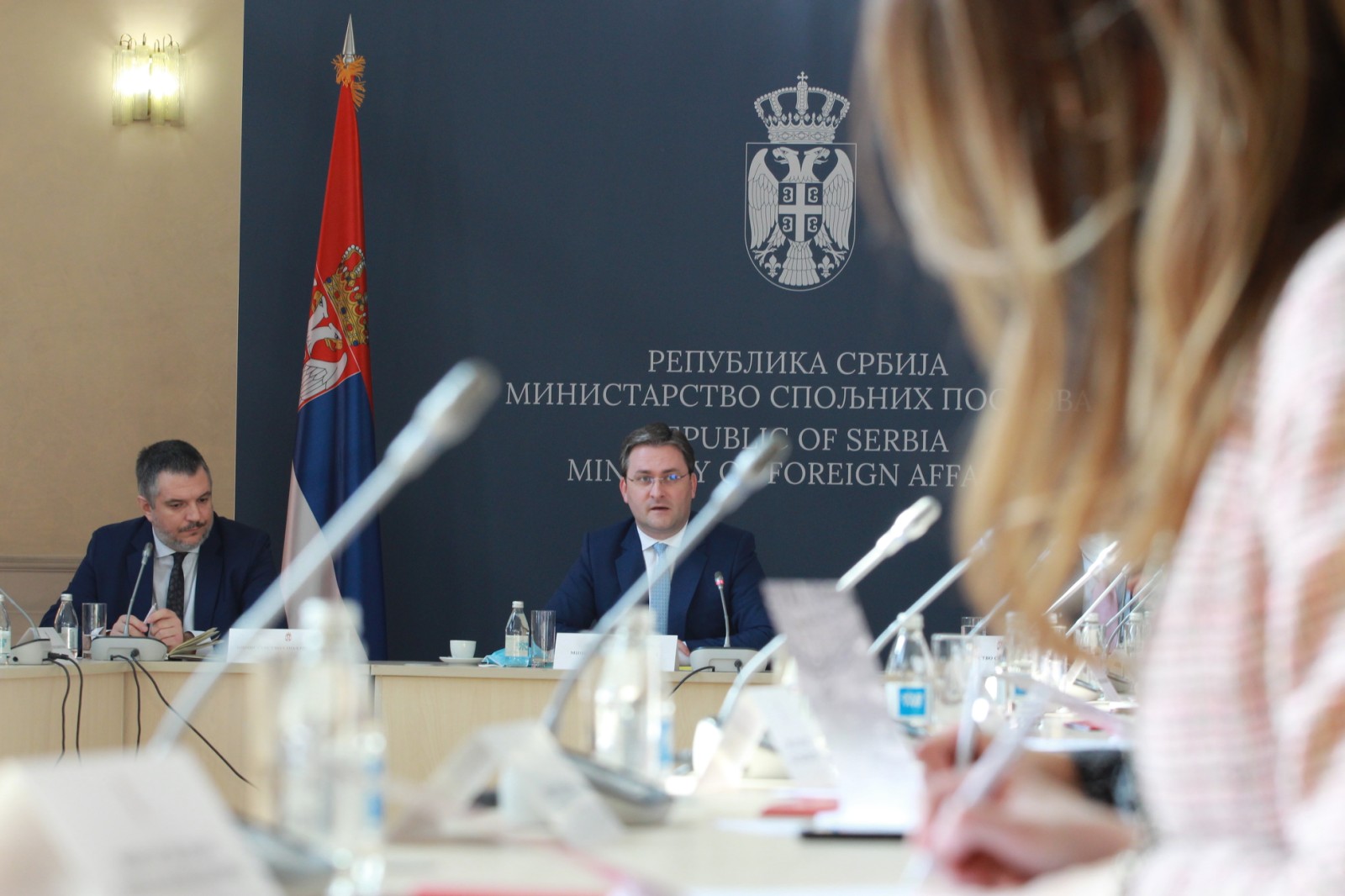 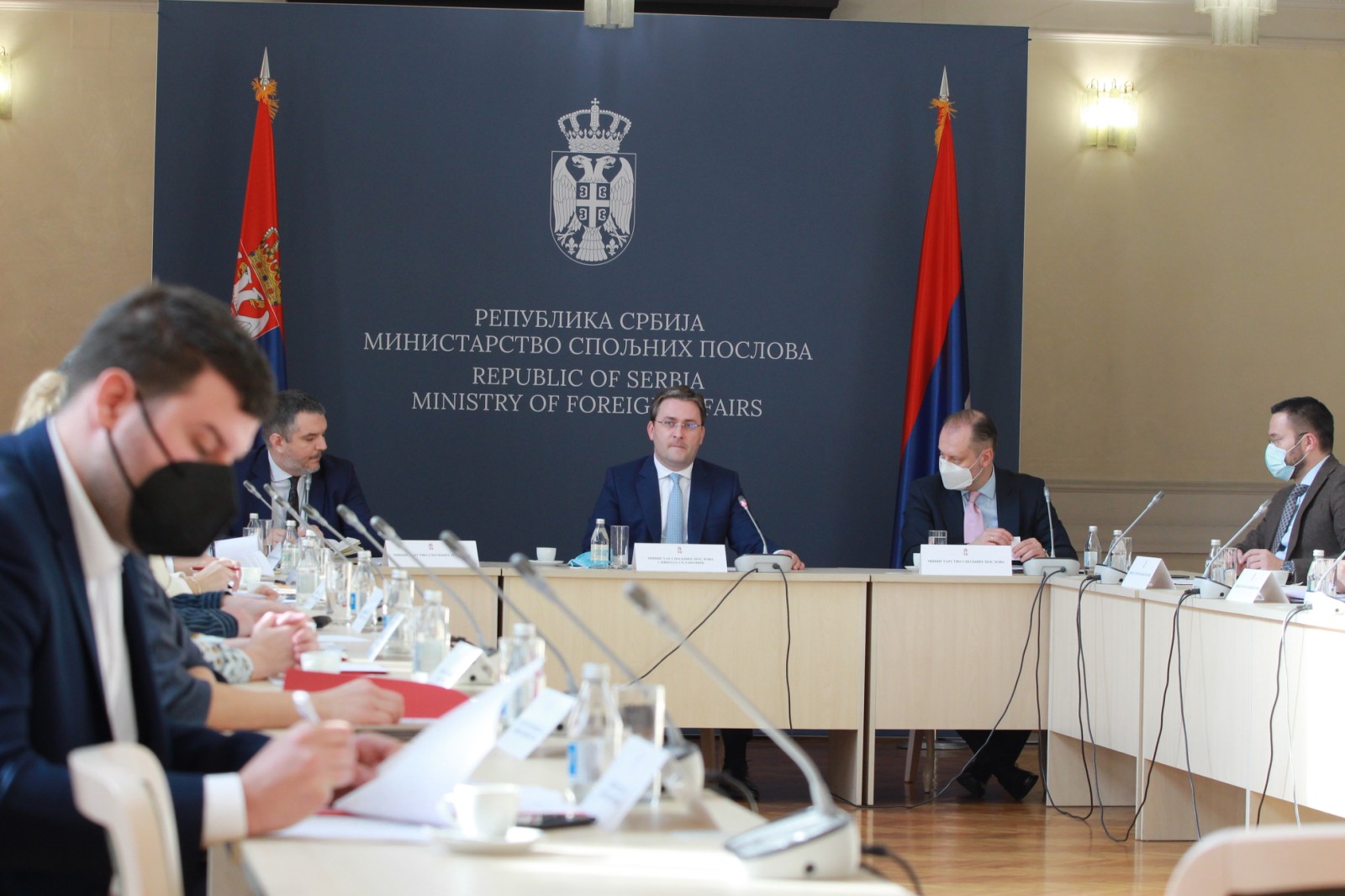 |
|
|
| Metropolitan Porfirije of Zagreb and Ljubljana elected as the new Patriarch of Serbia |
|
The Holy Assembly of Bishops of the Serbian Orthodox Church elected His Eminence Metropolitan Porfirije of Zagreb-Ljubljana, PhD, as the new Serbian Patriarch, in its convocation in Memorial Cathedral of Saint Sava in Belgrade on 18 February 2021. Immediately after the election a thanksgiving service was officiated and Many Years was chanted to the Archbishop of Pec, Metropolitan of Belgrade-Karlovci and Serbian Patriarch Porfirije. Bells at Saint Sava Cathedral in the Vracar district of Belgrade rang a few minutes before 4:00 pm indicating that the 46th Patriarch of Serbia was elected. Newly-elected Archbishop of Pec, Metropolitan of Belgrade-Karlovci and Serbian Patriarch Porfirije (Peric) was born on 22 July 1961 in Becej, to father Radivoje and Mother Radojka. He was baptized as Prvoslav. He finished primary school in Curug, and the “Jovan Jovanovic Zmaj” Grammar School in Novi Sad. He was ordained a monk according to the rite of small schime by his spiritual father, then hieromonk Dr. Irinej (Bulovic), at Decani Monastery on Sunday of St. Thomas in 1985. He graduated from the Faculty of Orthodox Theology in Belgrade in 1986, when the then Bishop of Raska-Prizren Diocese, future Serbian Patriarch Pavle of blessed memory, ordained him a hierodeacon at the monastery of Holy Trinity in Musutiste. He attended postgraduate studies in Athens from 1986 until 1990. That year, upon the blessing of Bishop Dr. Irinej of Backa, he joined the monastery of Holy Archangels in Kovilj, where he was ordained as hieromonk and became its abbot. 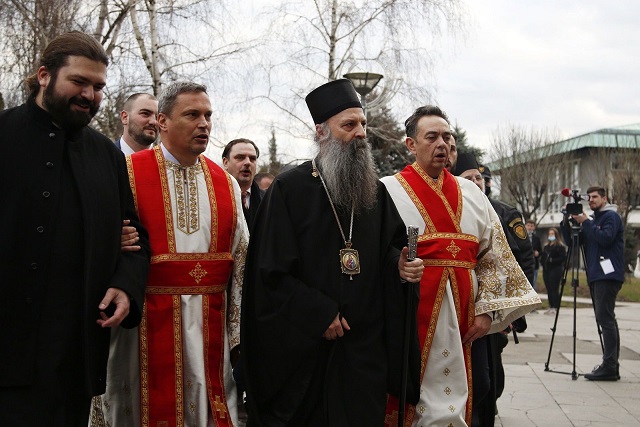 Many young monks and novices came to the monastery following him. These were the years when the Kovilj Monastery became a spiritual center for many young people: intellectuals, artists, popular actors and rock musicians, especially from Novi Sad and Belgrade. Since then abbot Porfirije has particularly dealt with drug-addicted patients. In 2005, he formed for this purpose a therapeutic community called “The Land of the Living”, which is recognized as the most successful drug-addiction therapy project and, under the leadership of Bishop Porfirije, it has more than a hundred residents in camps throughout Serbia today. During the ordinary meeting of the Holy Assembly of Bishops of the Serbian Orthodox Church in Belgrade on 14 May 1999 he was elected as Bishop of Jegar, Vicar of the Diocese of Backa. He defended his PhD thesis Possibility of knowability of God in St. Paul’s understanding according to the interpretation of Saint John Chrysostom at the Faculty of Theology of the University of Athens in 2004. He became a lecturer at the Faculty of Orthodox Theology - Department of Pastoral Psychology - succeeding famous psychiatrist, academician Dr. Vladeta Jerotic. His lectures have been attended not only by students of the Faculty of Orthodox Theology, but other Belgrade faculties as well. Together with a group of experts: psychologists, doctors, criminologists, sociologists, Bishop Porfirije founded a civic association that deals with the resocialization of victims of destructive religious sects and cults. Bishop Porfirije has not been just president of the Steering Board for a decade, but a real spiritus movens of the Humanitarian Fund “Privrednik”, which has provided scholarships for a great number of gifted, but poor pupils and students, regardless of their nationality or religious affiliation. In 2005, the National Assembly elected him as representative of all Churches and religious communities, to be a member of the Council of the Republic Broadcasting Agency, and in 2008 the RBA elected him its president. As President of the Council of the Republic Broadcasting Agency, Bishop Porfirije supported the long-term interests of society and citizens, unaffected by political influences. Since then, church radio stations have been heard in the broadcasting spectrum of Serbia. He has made a key contribution to launching of a series of radio and television shows dealing with religious topics. In 2010, The Holy Assembly of Bishops entrusted him to establish military chaplaincy in the Serbian Armed Forces. The fruits of his labour in that field include not only the suitable legal regulations, but also the selection of military chaplains, the organization and equipping of churches at barracks and performance of the first religious services. His expert theological works Bishop Porfirije published in magazines both in Serbia and abroad. He participated in a large number of scientific conferences and symposia across the globe. Bishop Porfirije, as one of the most prominent contemporary Serbian clergymen and intellectuals, has an extremely wide circle of friends, not only in the Homeland, and he fosters personal friendship and close cooperation with priests and representatives of other Churches and religious communities. He speaks Greek, English, German and uses the Russian language, while his style of communication is always adapted to his interlocutors. He was enthroned as the Metropolitan of Zagreb and Ljubljana on 13 July 2014 in the Cathedral Church of the Transfiguration of the Lord in Zagreb. The solemn Hierarchal Liturgy was served by Serbian Patriarch Irinej, accompanied by a large number of archbishops of the Serbian Church and other sister Churches, as well as priests and monks, and pious people. Many young monks and novices came to the monastery following him. These were the years when the Kovilj Monastery became a spiritual center for many young people: intellectuals, artists, popular actors and rock musicians, especially from Novi Sad and Belgrade. Since then abbot Porfirije has particularly dealt with drug-addicted patients. In 2005, he formed for this purpose a therapeutic community called “The Land of the Living”, which is recognized as the most successful drug-addiction therapy project and, under the leadership of Bishop Porfirije, it has more than a hundred residents in camps throughout Serbia today. During the ordinary meeting of the Holy Assembly of Bishops of the Serbian Orthodox Church in Belgrade on 14 May 1999 he was elected as Bishop of Jegar, Vicar of the Diocese of Backa. He defended his PhD thesis Possibility of knowability of God in St. Paul’s understanding according to the interpretation of Saint John Chrysostom at the Faculty of Theology of the University of Athens in 2004. He became a lecturer at the Faculty of Orthodox Theology - Department of Pastoral Psychology - succeeding famous psychiatrist, academician Dr. Vladeta Jerotic. His lectures have been attended not only by students of the Faculty of Orthodox Theology, but other Belgrade faculties as well. Together with a group of experts: psychologists, doctors, criminologists, sociologists, Bishop Porfirije founded a civic association that deals with the resocialization of victims of destructive religious sects and cults. Bishop Porfirije has not been just president of the Steering Board for a decade, but a real spiritus movens of the Humanitarian Fund “Privrednik”, which has provided scholarships for a great number of gifted, but poor pupils and students, regardless of their nationality or religious affiliation. In 2005, the National Assembly elected him as representative of all Churches and religious communities, to be a member of the Council of the Republic Broadcasting Agency, and in 2008 the RBA elected him its president. As President of the Council of the Republic Broadcasting Agency, Bishop Porfirije supported the long-term interests of society and citizens, unaffected by political influences. Since then, church radio stations have been heard in the broadcasting spectrum of Serbia. He has made a key contribution to launching of a series of radio and television shows dealing with religious topics. In 2010, The Holy Assembly of Bishops entrusted him to establish military chaplaincy in the Serbian Armed Forces. The fruits of his labour in that field include not only the suitable legal regulations, but also the selection of military chaplains, the organization and equipping of churches at barracks and performance of the first religious services. His expert theological works Bishop Porfirije published in magazines both in Serbia and abroad. He participated in a large number of scientific conferences and symposia across the globe. Bishop Porfirije, as one of the most prominent contemporary Serbian clergymen and intellectuals, has an extremely wide circle of friends, not only in the Homeland, and he fosters personal friendship and close cooperation with priests and representatives of other Churches and religious communities. He speaks Greek, English, German and uses the Russian language, while his style of communication is always adapted to his interlocutors. He was enthroned as the Metropolitan of Zagreb and Ljubljana on 13 July 2014 in the Cathedral Church of the Transfiguration of the Lord in Zagreb. The solemn Hierarchal Liturgy was served by Serbian Patriarch Irinej, accompanied by a large number of archbishops of the Serbian Church and other sister Churches, as well as priests and monks, and pious people. |
|
|
| President Vucic: Serbia is ready for dialogue on Kosovo and Metohija, but will refuse being humiliated |
|
President of the Republic and Supreme Commander of the Serbian Army Aleksandar Vucic attended a demonstration of capabilities of one part of Serbian Army units in the "Rastko Nemanjić" barracks in Pancevo. On this occasion, President Vucic stated that Serbia was ready to continue the EU-facilitated dialogue with Pristina at any point, while respecting also the position of the United States as well as the positions of Russia and China. The President said that he would rather put his "head on the chopping block" than sign any document with a recognition and reminded that he had already once refused to do so in Washington, where there were two versions of the agreement. He stated that he immediately had his delegation leave the meeting, that he told the U.S. delegation that Serbia would not sign such an agreement, while conveying that Serbia would always endeavour to hold peaceful talks in order to preserve peace, but that it would not take any humiliation. The Serbian President thanked the U.S. President Joe Biden for the letter of congratulations on the occasion of the upcoming Statehood Day, in which, in addition to the usual emphasis on commitment to promoting economic cooperation, regional stability and democratic values, he unequivocally called for mutual recognition of Serbia and "Kosovo" as a result. Mutual recognition between Serbia and "Kosovo" is not part of any act of any world organization, the President pointed out and reiterated that Serbia was ready to continue the EU-facilitated dialogue with Pristina at any point, while respecting also the position of the United States as well as the positions of Russia and China. .jpg) According to the president, the situation is difficult and will only be increasingly difficult. "As I told you three days ago, I can see it and I expect it, I can see the situation slowly tightening, because the conflicts between them at the global level have been increasing and intensifying, and then we have to pay the price", the President said. President Vucic said that said that it was up to our state to continue strengthening the country in the economic sense.The President added that the role of the army was very important in the highly complex security and political conditions of the modern world, and that was why Serbia needed to do everything it could to deter any potential aggressor and attacks on citizens and the country. "The policy of strengthening the armed forces will continue at a faster pace", the President emphasized, adding that the goal was for the Serbian Army to play a stabilizing role with regard to the political developments in the region. According to him, it should be clear to everyone that Serbia was not a punching bag and that not everyone could attack and threaten it like it was the case in the past. Vucic said that he was pleased with what he saw and that a lot had been done in the previous period, pointing out that the salaries of military personnel would be significantly increased as of April. President Vucic also stated that investments in the Serbian Army would continue, whom he told that he expected the Army to continue to be the guardian of our country, its integrity and freedom. "We expect you to be the guardians of our country, its integrity and freedom, the defenders of our people, the guardians of the homeland, the protectors of the interests of the state of Serbia and to be a deterrent factor for every aggressor and anyone who might consider attacking Serbia", Vucic said. The military exercise called "Spearhead" demostrated the capabilities of the 72nd Special Operations Brigade, and the event, which the President of Serbia and the Supreme Commander of the Serbian Army assessed as very good, was also attended by Deputy Prime Minister and Minister of Defence Nebojsa Stefanovic and Chief of General Staff of the Serbian Armed Forces, General Milan Mojsilovic. According to the president, the situation is difficult and will only be increasingly difficult. "As I told you three days ago, I can see it and I expect it, I can see the situation slowly tightening, because the conflicts between them at the global level have been increasing and intensifying, and then we have to pay the price", the President said. President Vucic said that said that it was up to our state to continue strengthening the country in the economic sense.The President added that the role of the army was very important in the highly complex security and political conditions of the modern world, and that was why Serbia needed to do everything it could to deter any potential aggressor and attacks on citizens and the country. "The policy of strengthening the armed forces will continue at a faster pace", the President emphasized, adding that the goal was for the Serbian Army to play a stabilizing role with regard to the political developments in the region. According to him, it should be clear to everyone that Serbia was not a punching bag and that not everyone could attack and threaten it like it was the case in the past. Vucic said that he was pleased with what he saw and that a lot had been done in the previous period, pointing out that the salaries of military personnel would be significantly increased as of April. President Vucic also stated that investments in the Serbian Army would continue, whom he told that he expected the Army to continue to be the guardian of our country, its integrity and freedom. "We expect you to be the guardians of our country, its integrity and freedom, the defenders of our people, the guardians of the homeland, the protectors of the interests of the state of Serbia and to be a deterrent factor for every aggressor and anyone who might consider attacking Serbia", Vucic said. The military exercise called "Spearhead" demostrated the capabilities of the 72nd Special Operations Brigade, and the event, which the President of Serbia and the Supreme Commander of the Serbian Army assessed as very good, was also attended by Deputy Prime Minister and Minister of Defence Nebojsa Stefanovic and Chief of General Staff of the Serbian Armed Forces, General Milan Mojsilovic. |
|
|
| Minister Selakovic speaks for Politika: The year of rejuvenation of Serbian diplomacy |
|
Serbia's foreign policy positions are naturally being adjusted to the new developments at the international level, but our foreign policy priorities have not changed in a long time. Our top and most important interest is to preserve good-neighbourly relations and stability and peace in the region and, in the same context, to find a peaceful and just solution to the problems in Kosovo and Metohija, Serbian Foreign Minister Nikola Selakovic said in an interview with Politika daily. Another lasting interest of ours is full membership of the European Union, because this is the type of society we strive for. At the bilateral level, our goal is to strengthen ties with traditional friends, the Russian Federation and the People's Republic of China, but also to build new partner relations with the United States. One of the most important tasks of our foreign policy is to improve the position and protect the rights and identity of our people in the region, as well as to provide various types of support to Serbs in the diaspora. All these are very important and more often than not complementary goals, Nikola Selakovic pointed out.
What kind of relations do you expect Serbia to have with the new U.S. administration?
It is too early to speculate about this in public. The new presidential administration in Washington is currently preoccupied with internal issues and this will be the case for some time. There are people in the team of President Joseph Biden who have dealt with our region, and it is likely that the Balkans and Serbia will be the focus of the U.S. foreign policy at some point. I will remind you that President Vucic and President Biden not so long ago had very substantive talks in Belgrade, after which our President stated that he had the opportunity to talk to someone extremely well acquainted with the situation in this part of the world and an extraordinarily prepared interlocutor. Taking their personal relationship into account, but also the importance of enhancing the ties between Serbia and the United States, we have reason to expect that a meeting between the two presidents will be organized in the foreseeable future. I am sure that the nature and dynamics of the relations between Serbia and the United States will be influenced by the fact that Ambassador Marko Djuric now represents us in Washington, whose presence at President Biden's inauguration ceremony is an important signal and, I believe, a harbinger of positive developments in bilateral relations between our two countries.
How would you describe our country's relations with Moscow, Brussels and Beijing?
Russia is our traditional friend and that friendship goes beyond merely political ties. These are deep spiritual, cultural and civilizational bonds, and it is only natural that we have a mutual interest in improving those ties, even though they are at a very high level. We have a relationship with the People's Republic of China which is, in addition to the sincere iron-clad friendship between our peoples and high political representatives, based on deep trust and mutual support. Full membership of the European Union is Serbia's strategic orientation that all our friends are aware of, but our country does not forget its friendships, but strengthens and promotes them instead, and approaches all with honesty and no ulterior motives. In this context, we do not seek any preferential treatment, but only the right to freely and independently make decisions about our future and relations with all who respect us.
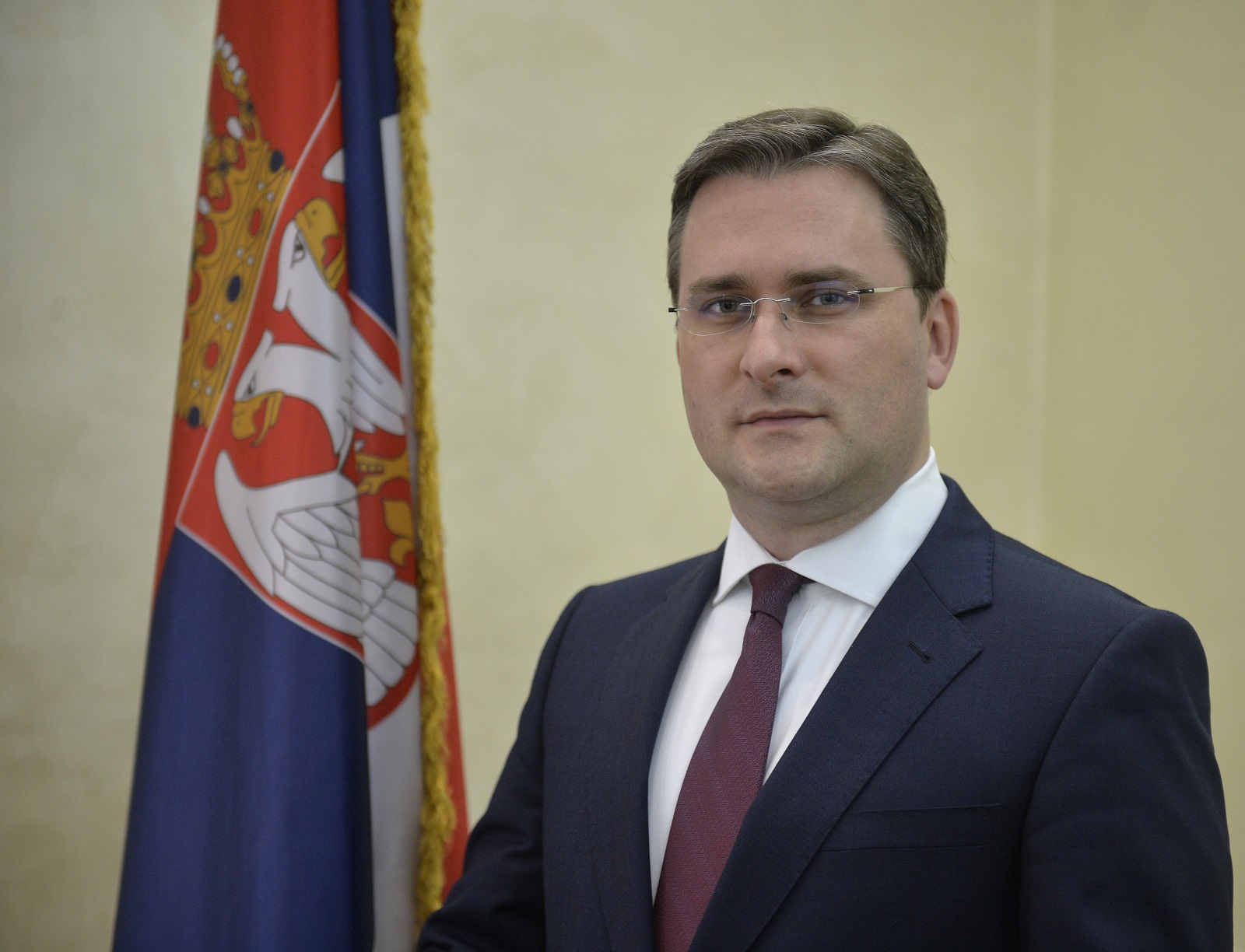
Could Serbia pursue a different foreign policy than the one it is pursuing at the moment?
It is always possible to have a different policy, just look at the foreign policy of Serbia ten, twenty or thirty years ago, examine the results at that time and you will realize how irretrievably expensive that policy turned out to be. Whether a policy is right, at either foreign or domestic level, is measured through its results and effect on the lives of citizens and the fate of the entire state. Our foreign policy priorities are not being defined on a whim, but are instead the result of a serious and deep examination of our complex position and strategic thinking about ways to improve it. Today, Serbia has a better international reputation and credibility than two decades ago, and the main reason for that is that our results have shown how serious and responsible we are as a country. That kind of credibility is not achieved by trickery, but only by hard and well-thought-out work on oneself. And I need to emphasize on this occasion as well that the main inspiration for such an attitude towards politics, the state and its future comes from none other than President Aleksandar Vucic. As Minister of Foreign Affairs, I have the opportunity on a daily basis to see the level of appreciation and respect President Vucic enjoys beyond the borders of our country.
When can we expect the vacant posts of Serbian ambassadors and consuls across the globe to be filled?
That is one of the main tasks for 2021. This will be a year of reinvigoration and I believe also rejuvenation of Serbian diplomacy. Our country, given its size, has a fairly extensive diplomatic network, which provides it with great opportunities for deepening political and economic relations with countries in all parts of the world. But we need more fresh and energetic staff, people who will be the most honourable representatives of a modern and dynamic Serbia. There are such people in Serbia, and we do need a serious rejuvenation, in order to avoid wide generation gaps in our personnel, and to lay the foundations of a modern career diplomacy.
How would you describe your relationship with Serbian President Aleksandar Vucic?
President Vucic and I are, in addition to having close and friendly relations, by virtue of the work we do and our constitutional competencies, the closest collaborators in the realization of Serbia's foreign policy goals. This allows me to talk to him often, and on many occasions learn a lot of new and important things. President Vucic is a man who inspires people around him with his strategic and visionary approach to politics, and I am proud to have had the opportunity to be part of his closest team of associates over the years, and to have had him as a kind of political mentor. In any case, his vision of Serbia as a modern, progressive and prosperous state, which independently and on its own will decides on its destiny, is my wish as well and key motivation for political engagement. For only such Serbia is a country that its own citizens, as well as Serbs beyond our borders, can confidently rely on, while also being an inspiration to the entire region. |
|
|
| President Vucic: Serbia is the first in Europe in terms of growth |
|
Serbian President Aleksandar Vucic pointed out that Serbia is the first in Europe in terms of economic growth, which will be officially confirmed at the end of March, and that this was possible owing to the reform measures taken since 2014 and the rapid opening of the country after the first wave of corona virus. The President pointed out that Serbia had a growth of 5.2 percent in the first quarter, while the Eurozone was at minus 3.2 percent, in the second quarter Serbia had a growth of minus 6.3 percent, while the Eurozone was at minus 14.7 percent, and in the third quarter, when the Eurozone was at minus 4.3 percent, Serbia's figure was only minus 1.4 percent. Vucic stated that Montenegro, for example, recorded as much as 26 percent minus in the third quarter. Furthermore, the President emphasized that hospitals were built and renovated in our country, and that two hospitals were built from the ground up in just four months. He said that the state made significant efforts to procure respirators, masks, gloves, protective suits, medicines, everything that was needed, and pointed out that work was being done on 10 general hospitals throughout Serbia, adding that all these were major achievements that were only possible owing to the success of the 2014 reforms, the enactment of the Labor Law, which yielded excellent results, and also through fiscal consolidation measures. .jpg) "These are unprecedented results for Serbia. Was Serbia ever before the first in Europe in terms of growth rate? We will get the results on 31 March that will confirm that Serbia is number one in Europe. All that was possible thanks to people who believed in difficult changes", Vucic said. According to the President, this year, as many as six highways will be built in Serbia at the same time, and in this regard, he noted that Bulgaria has announced that the highway from our border to Sofia will be completed by the end of the year, after which it will be possible to use motorway to travel to Istanbul, which is very important to ensure that our country is on a transport route. President Vucic emphasized that in 2020, the so-called year of corona, our country had a net inflow of foreign direct investment amounting to EUR 2.9 billion net, and three billion gross, which means that many foreign companies such as Toyota Tires, Boysen, ZTF and Brose have invested in Serbia even in this year of crisis. The President said that Serbia has the highest average wages in the region, amounting to 511 or 512 euros, and that in February, due to the January increase, the average wage will be 535 or 536 euros, and that only in Belgrade in the last seven years the average wage increased by 180 euros or 40 percent. That President said that Serbia was fourth in the region in terms of salaries before, and that today we are officially the first, and that the difference in relation to other countries will only increase faster. He also pointed out that the employment rate is growing in Serbia as well as that our public debt increased less than in most European countries. This is illustrated by the data that in Italy the public debt surged to 156 percent, in Germany to 87 percent, in France to 114 percent, in Croatia to 88 percent, while in Serbia it is at 57 percent. The Serbian President announced that by Sretenje, 15 February, an additional package of assistance to the economy will be earmarked, and as he explained, it will be a new capital injection for companies, the trade, entrepreneurs, small, medium and large enterprises which, as he said, concerns 1,052,000 people within that system. Vucic specified that it will most likely be help in the form of two or three payments amounting to half a minimum wage each, and that there will also be sectoral aid for tourism, hotel owners, travel agencies, guides, for bus carriers, through another half minimum wage payment. The President added that efforts will be made to extend the guarantee schemes as well, which proved to be excellent, amounting to 1.5 billion, and this time, through the same system, two more portions amounting to 500 million each could be provided. Vucic said that the first agreements with DFC worth 300 to 400 million dollars are expected in seven days. He also stated that the state will endeavour to help pensioners further, in addition to increasing pensions by 5.9 percent in January, which will be reflected in their first checks in February, and added that pensioners should by March receive symbolic aid in the form of packages with vitamin C, D and zinc, which, as the President said, are small things, but they reflect the state's care and efforts made to protect health. The President announced that negotiations on the procurement of the Chinese vaccine would be completed in the next seven to eight days, after the first quantities of the Pfizer and Sputnik V vaccines have arrived in Serbia, and pointed out that the Chinese vaccine was of exceptional quality, but probably the most expensive, which is why he wrote to the Chinese President and asked for a discount for our country. Vucic thanked the Americans for deciding to sell the vaccine to our country and noted that no one in the region other than Serbia has received it, except for the small quantity that Albania got. He pointed out that our state relied on itself and its own capacities, and that our state leadership anticipated that vaccines within the European COVAX plan would arrive late. The President rejected the claims about bad results of Serbia in the fight against the corona virus and stated that our country has recorded the lowest corona virus mortality rate in the region. He presented statistical information indicating that Slovenia had 144 deaths per 100,000 inhabitants, North Macedonia 126, Bosnia and Herzegovina 123, Bulgaria 115, Montenegro 115, Hungary 110, Croatia 107, Romania 85, and Serbia 51. "The mortality rate in the region is as follows: Bulgaria 3.9, Bosnia and Herzegovina 3.7, Hungary 3.11, North Macedonia 3.03, Romania 2.48. Slovenia 2.15, Croatia 1.99, Montenegro 1.4, and Serbia 1.0. This can be seen in the graphs and is no fabrication", the President stressed. He said that the state will fight for vaccines, and that only Serbia, in the Western Balkans, received significant quantities of vaccines, other than a smaller quantity that Albania received, and added that in one day since the registration for vaccination opened, as many as 63,000 persons have registered. President Vucic expressed his belief that the year ahead will be better than the previous one as well as that the corona virus will be defeated through vaccination of citizens. "These are unprecedented results for Serbia. Was Serbia ever before the first in Europe in terms of growth rate? We will get the results on 31 March that will confirm that Serbia is number one in Europe. All that was possible thanks to people who believed in difficult changes", Vucic said. According to the President, this year, as many as six highways will be built in Serbia at the same time, and in this regard, he noted that Bulgaria has announced that the highway from our border to Sofia will be completed by the end of the year, after which it will be possible to use motorway to travel to Istanbul, which is very important to ensure that our country is on a transport route. President Vucic emphasized that in 2020, the so-called year of corona, our country had a net inflow of foreign direct investment amounting to EUR 2.9 billion net, and three billion gross, which means that many foreign companies such as Toyota Tires, Boysen, ZTF and Brose have invested in Serbia even in this year of crisis. The President said that Serbia has the highest average wages in the region, amounting to 511 or 512 euros, and that in February, due to the January increase, the average wage will be 535 or 536 euros, and that only in Belgrade in the last seven years the average wage increased by 180 euros or 40 percent. That President said that Serbia was fourth in the region in terms of salaries before, and that today we are officially the first, and that the difference in relation to other countries will only increase faster. He also pointed out that the employment rate is growing in Serbia as well as that our public debt increased less than in most European countries. This is illustrated by the data that in Italy the public debt surged to 156 percent, in Germany to 87 percent, in France to 114 percent, in Croatia to 88 percent, while in Serbia it is at 57 percent. The Serbian President announced that by Sretenje, 15 February, an additional package of assistance to the economy will be earmarked, and as he explained, it will be a new capital injection for companies, the trade, entrepreneurs, small, medium and large enterprises which, as he said, concerns 1,052,000 people within that system. Vucic specified that it will most likely be help in the form of two or three payments amounting to half a minimum wage each, and that there will also be sectoral aid for tourism, hotel owners, travel agencies, guides, for bus carriers, through another half minimum wage payment. The President added that efforts will be made to extend the guarantee schemes as well, which proved to be excellent, amounting to 1.5 billion, and this time, through the same system, two more portions amounting to 500 million each could be provided. Vucic said that the first agreements with DFC worth 300 to 400 million dollars are expected in seven days. He also stated that the state will endeavour to help pensioners further, in addition to increasing pensions by 5.9 percent in January, which will be reflected in their first checks in February, and added that pensioners should by March receive symbolic aid in the form of packages with vitamin C, D and zinc, which, as the President said, are small things, but they reflect the state's care and efforts made to protect health. The President announced that negotiations on the procurement of the Chinese vaccine would be completed in the next seven to eight days, after the first quantities of the Pfizer and Sputnik V vaccines have arrived in Serbia, and pointed out that the Chinese vaccine was of exceptional quality, but probably the most expensive, which is why he wrote to the Chinese President and asked for a discount for our country. Vucic thanked the Americans for deciding to sell the vaccine to our country and noted that no one in the region other than Serbia has received it, except for the small quantity that Albania got. He pointed out that our state relied on itself and its own capacities, and that our state leadership anticipated that vaccines within the European COVAX plan would arrive late. The President rejected the claims about bad results of Serbia in the fight against the corona virus and stated that our country has recorded the lowest corona virus mortality rate in the region. He presented statistical information indicating that Slovenia had 144 deaths per 100,000 inhabitants, North Macedonia 126, Bosnia and Herzegovina 123, Bulgaria 115, Montenegro 115, Hungary 110, Croatia 107, Romania 85, and Serbia 51. "The mortality rate in the region is as follows: Bulgaria 3.9, Bosnia and Herzegovina 3.7, Hungary 3.11, North Macedonia 3.03, Romania 2.48. Slovenia 2.15, Croatia 1.99, Montenegro 1.4, and Serbia 1.0. This can be seen in the graphs and is no fabrication", the President stressed. He said that the state will fight for vaccines, and that only Serbia, in the Western Balkans, received significant quantities of vaccines, other than a smaller quantity that Albania received, and added that in one day since the registration for vaccination opened, as many as 63,000 persons have registered. President Vucic expressed his belief that the year ahead will be better than the previous one as well as that the corona virus will be defeated through vaccination of citizens. |
|
|
| Every Serb in the diaspora is potentially a lobbyist |
|
Our compatriots living abroad are one of the great potentials that the state has not recognized in the right way so far, which is why a different approach is needed to the issue of how to strengthen our diaspora and use the good will of people who are potential lobbyists for the interests of Serbia and the Serbian people, Foreign Minister Nikola Selakovic said. "When it comes to Serbs in the diaspora, and especially in the region, this issue has been a kind of an unattended crop which requires a lot of work, and even when a lot is done at once this is not apparent immediately ", Minister Selakovic stated in an interview with Tanjug. 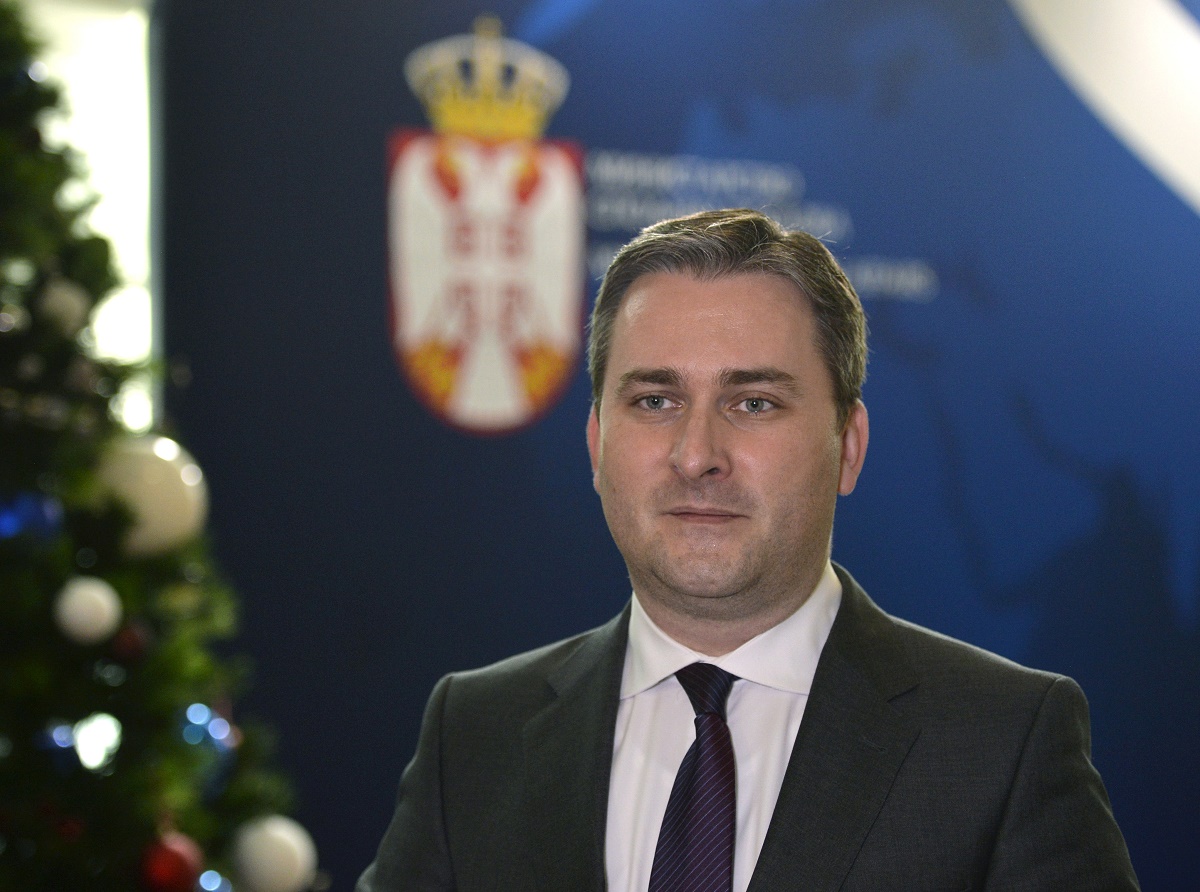 He emphasized that the appointment of the Director of the Office for Cooperation with the Diaspora and Serbs in the Region for the first time after almost seven years since this body was formed within the Ministry of Foreign Affairs, shows that it is one of the priorities of the Ministry he is at the helm of. Selaković notes that intensive efforts have been long underway on forming a plan to make the diaspora more visible both outside the borders of Serbia and in the mother country itself. "Every person in the diaspora is a potential lobbyist for the interests of our country and people, and we need to find the right way to use that", he said. That much can be done in that regar Selakovic illustrates with the fact that only in Switzerland, in 24 cities, there are Serbian cultural and artistic associations which amounts to more than 3,000 young people who get together in order to preserve our tradition, culture, the Serbian language and history. "If they were able to set up such associations in 24 cities, it speaks volumes about the enthusiasm of these people. There is so much enthusiasm, energy and love in these people. We need to explore ways to help them and use their good will and potential", the Minister points out. He also cites the example of an emigrant family in Canada, the Varaklic family from southwestern Serbia, who sends Christmas packages for children in the Raska region every year. He adds that they have so far donated hundreds of thousands of dollars to non-governmental organizations for those needs alone, but he says that we do not see that here. "The state does not recognize this, and these are people who gained success as entrepreneurs working in a distant country, who can be serious lobbyists for Serbia, for Serbian interests, someone who represents us in the best possible way", Minister Selakovic said. Minister Selakovic also pointed out that Arnaud Gouillon has been appointed as head of the Office for Cooperation with the Diaspora and Serbs in the Region and described him as a man of extraordinary energy, great love for the Serbian people, which he showed in his engagement towards Serbs in Kosovo and Metohija, where they were seriously endangered. "By doing so, he showed and set an example to many of our compatriots of what an individual can do. And when one such individual focuses energy, enthusiasm and love for people, on work done within the state administration system, I think that the preconditions have been created for such activities to yield good results", Minister Selakovic said. He emphasized that the appointment of the Director of the Office for Cooperation with the Diaspora and Serbs in the Region for the first time after almost seven years since this body was formed within the Ministry of Foreign Affairs, shows that it is one of the priorities of the Ministry he is at the helm of. Selaković notes that intensive efforts have been long underway on forming a plan to make the diaspora more visible both outside the borders of Serbia and in the mother country itself. "Every person in the diaspora is a potential lobbyist for the interests of our country and people, and we need to find the right way to use that", he said. That much can be done in that regar Selakovic illustrates with the fact that only in Switzerland, in 24 cities, there are Serbian cultural and artistic associations which amounts to more than 3,000 young people who get together in order to preserve our tradition, culture, the Serbian language and history. "If they were able to set up such associations in 24 cities, it speaks volumes about the enthusiasm of these people. There is so much enthusiasm, energy and love in these people. We need to explore ways to help them and use their good will and potential", the Minister points out. He also cites the example of an emigrant family in Canada, the Varaklic family from southwestern Serbia, who sends Christmas packages for children in the Raska region every year. He adds that they have so far donated hundreds of thousands of dollars to non-governmental organizations for those needs alone, but he says that we do not see that here. "The state does not recognize this, and these are people who gained success as entrepreneurs working in a distant country, who can be serious lobbyists for Serbia, for Serbian interests, someone who represents us in the best possible way", Minister Selakovic said. Minister Selakovic also pointed out that Arnaud Gouillon has been appointed as head of the Office for Cooperation with the Diaspora and Serbs in the Region and described him as a man of extraordinary energy, great love for the Serbian people, which he showed in his engagement towards Serbs in Kosovo and Metohija, where they were seriously endangered. "By doing so, he showed and set an example to many of our compatriots of what an individual can do. And when one such individual focuses energy, enthusiasm and love for people, on work done within the state administration system, I think that the preconditions have been created for such activities to yield good results", Minister Selakovic said. |
|
|
| Minister Selakovic: New ambassadors will be appointed this year, but the goals remain the same |
|
This year, Serbia could finally have Ambassadors and Consuls General appointed to about a third of the currently vacant positions in the country's diplomatic and consular missions in the world, and Minister of Foreign Affairs Nikola Selakovic is convinced that most of these positions will be filled, as he points out, by the best possible people. "In the next year, I am convinced that the majority of these vacancies will be filled", Selakovic told Tanjug, emphasizing that the work is being done gradually, because the state wants to show that is has a quality staff who will represent Serbia's interests in the best possible way. The Head of Serbian diplomacy reminded that in a number of diplomatic missions, the four-year mandate of Ambassadors and Consuls General has already expired, so that the procedure for appointing new ones will follow, after their recall. One of the "vacant" spots is the post of the Serbian Ambassador to China. "We are working hard to find the best possible solution for our new Ambassador to China and as we appointed one of the best people in the state system as Ambassador to the United States, who, I am sure, will perform his duties in the best possible way, I am convinced that it will be the same for the Ambassador in Beijing", Selakovic said. 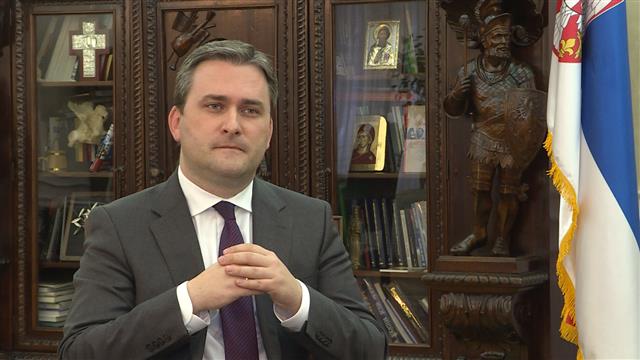 The Minister, who took over the foreign policy sector in the Government a little over two months ago, points out that circumstances in the world, as well as Serbia's position in it, have changed, but that Serbia's foreign policy goals do not change: the country remains strategically committed to European integration and, while pursuing the EU path, it will also strengthen traditional friendships with Russia and China, as well as promote and strengthen new partner relations with the United States. "Relations in the region, good-neighborly relations, regional cooperation are also important for Serbia, because this fits into the set of requirements on the European path. But, even regardless of the European path, it is always important who you live next to, who you live with, what your neighbors are like and what the relations are like in the neighborhood", Minister Selakovic said. He also points out that the issue of Kosovo and Metohija is of inestimable importance, it being the main national and state issue for Serbia and the Serbian people. "When I say that circumstances are changing, but not the goals - the EU and European integration was our goal seven years ago as well, but look at what our room for maneuver was then, in terms of economic aspects, and look at it today. Circumstances changed, and then you adjust your actions to these changed circumstances, to the best extent possible", Minister Selakovic said. He reminds that foreign policy priorities for 2021 were also outlined by the President of the Republic, and that maintaining peace and stability in the region is the absolute priority. "Only in a peaceful and stable region of the Western Balkans and Southeast Europe can Serbia thrive economically, culturally and scientifically - in every respect. Peace and stability in the region are “sine qua non” without which there is no development and progress. Serbia has acted, is acting and will act as a factor that stabilizes the entire region and maintains peace in the region, showing that it is the region that benefits everyone the most", Minister Selakovic said. Relations in the region have always been complex, and the region, Minister Selakovic noted, is to our great regret, burdened with issues that we cannot have a bearing on, and which concern the past. Serbia's approach is to seek room to influence what is happening today and what will happen happen in the future. In this context, he states that the so-called "mini-Schengen" initiative for market unification of the region, which originated from Aleksandar Vucic and was met with a positive response from the Prime Ministers of Albania and North Macedonia, is one of the opportunities to do much more for the region. "To show how much more we can do if we act together and if we seek our common denominators, and not what separates and divides us ", Selakovic points out. When it comes to relations with the United States, Selakovic said that one should not expect the great powers to change their positions the way we would like, want or imagine, but that it is important that the Ambassador in Washington, Marko Djuric, also emphasized that his task, among other things, will be to make efforts to change the climate in bilateral relations with the United States - the most important country in the world, as our lacking communication with them in the past seriously affected the position of the Serbian people and Serbia. "I am convinced that Djuric will work seriously on that, together with President Vucic, Prime Minister Brnabic and the Ministry of Foreign Affairs, and contribute to a large extent to changing that climate", Minister Selakovic said. He points out that it is extremely important for Serbia to promote its partner relations with the United States to a higher level. "This is a country with which we cooperate closely in many areas and a country with which we must strive, and not give up in doing so, to find what we have in common, our common ground and good examples of our cooperation in the past, and to create space for such cooperation in the future as well", Minister Selakovic concluded. The Minister, who took over the foreign policy sector in the Government a little over two months ago, points out that circumstances in the world, as well as Serbia's position in it, have changed, but that Serbia's foreign policy goals do not change: the country remains strategically committed to European integration and, while pursuing the EU path, it will also strengthen traditional friendships with Russia and China, as well as promote and strengthen new partner relations with the United States. "Relations in the region, good-neighborly relations, regional cooperation are also important for Serbia, because this fits into the set of requirements on the European path. But, even regardless of the European path, it is always important who you live next to, who you live with, what your neighbors are like and what the relations are like in the neighborhood", Minister Selakovic said. He also points out that the issue of Kosovo and Metohija is of inestimable importance, it being the main national and state issue for Serbia and the Serbian people. "When I say that circumstances are changing, but not the goals - the EU and European integration was our goal seven years ago as well, but look at what our room for maneuver was then, in terms of economic aspects, and look at it today. Circumstances changed, and then you adjust your actions to these changed circumstances, to the best extent possible", Minister Selakovic said. He reminds that foreign policy priorities for 2021 were also outlined by the President of the Republic, and that maintaining peace and stability in the region is the absolute priority. "Only in a peaceful and stable region of the Western Balkans and Southeast Europe can Serbia thrive economically, culturally and scientifically - in every respect. Peace and stability in the region are “sine qua non” without which there is no development and progress. Serbia has acted, is acting and will act as a factor that stabilizes the entire region and maintains peace in the region, showing that it is the region that benefits everyone the most", Minister Selakovic said. Relations in the region have always been complex, and the region, Minister Selakovic noted, is to our great regret, burdened with issues that we cannot have a bearing on, and which concern the past. Serbia's approach is to seek room to influence what is happening today and what will happen happen in the future. In this context, he states that the so-called "mini-Schengen" initiative for market unification of the region, which originated from Aleksandar Vucic and was met with a positive response from the Prime Ministers of Albania and North Macedonia, is one of the opportunities to do much more for the region. "To show how much more we can do if we act together and if we seek our common denominators, and not what separates and divides us ", Selakovic points out. When it comes to relations with the United States, Selakovic said that one should not expect the great powers to change their positions the way we would like, want or imagine, but that it is important that the Ambassador in Washington, Marko Djuric, also emphasized that his task, among other things, will be to make efforts to change the climate in bilateral relations with the United States - the most important country in the world, as our lacking communication with them in the past seriously affected the position of the Serbian people and Serbia. "I am convinced that Djuric will work seriously on that, together with President Vucic, Prime Minister Brnabic and the Ministry of Foreign Affairs, and contribute to a large extent to changing that climate", Minister Selakovic said. He points out that it is extremely important for Serbia to promote its partner relations with the United States to a higher level. "This is a country with which we cooperate closely in many areas and a country with which we must strive, and not give up in doing so, to find what we have in common, our common ground and good examples of our cooperation in the past, and to create space for such cooperation in the future as well", Minister Selakovic concluded. |
|
|
| President Vucic: Serbia to remain on the course of a winning policy of stability |
|
Preservation of peace, taking care of the health and better living standard are key for Serbia in 2021, underlined President of the Republic Aleksandar Vucic, convinced that even though the completion of this ambitious and by no means easy task will be anything but straightforward, best results can be achieved by working in concert with the Government, while ensuring security and a future of certainty for the citizens. The President said that Serbia has set for itself great and ambitious goals for the next year, notwithstanding the complex international and regional circumstances, and that it will endeavour to fully preserve peace and stability in the region and the country, while safeguarding the vital national and state interests. "Serbia will remain on the course of a winning policy - the policy of stability", President Vucic said and stressed that our country remains on the European integration path and that it will carefully foster its friendship with Russia and China, while building a friendship with the United States as well. 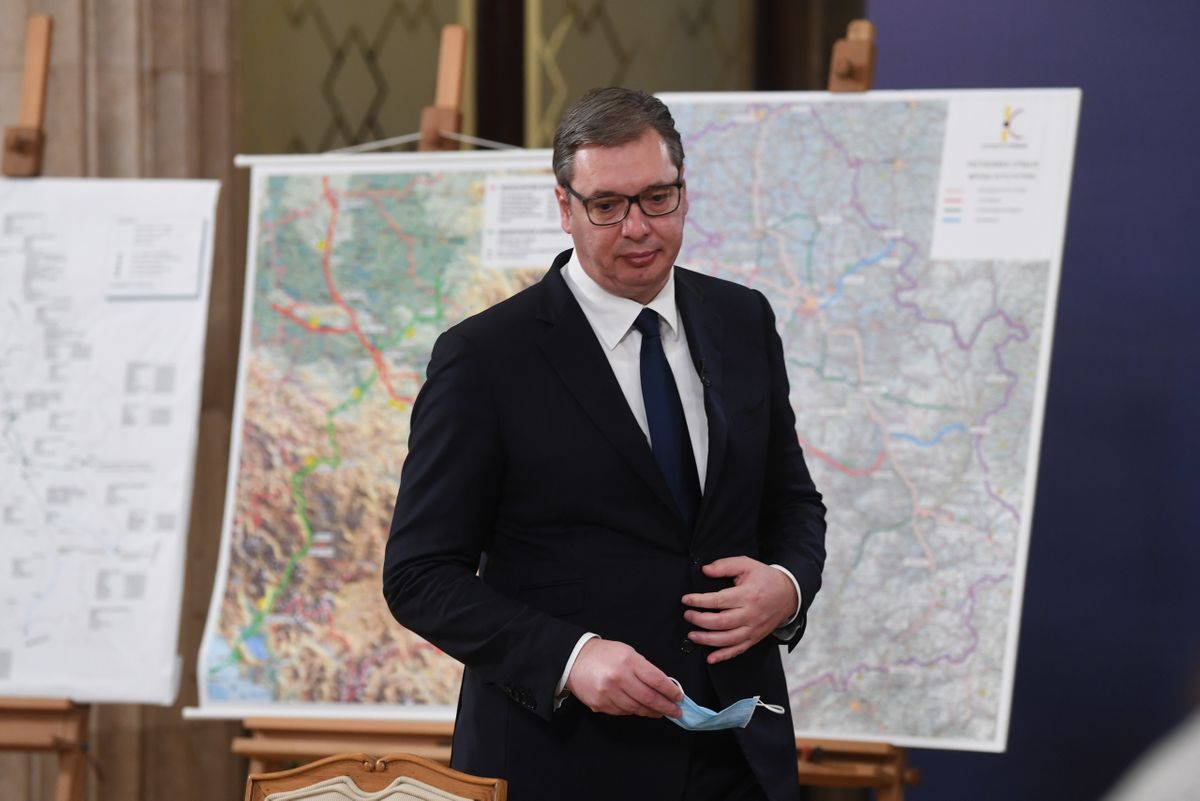 According to the President, Serbia will continue to pursue a winning policy, with the country itself as a top priority, i.e., a policy that will enable Serbia to continue being one of the top three countries in Europe in terms of growth rate in the next two years. A precondition for that, the President noted, is to crack down on criminal groups, but also to ensure even bigger investments in the police and army forces. "Serbia is the country that recorded the highest growth in Europe in 2020", the President pointed out at the annual press conference and added that he expects to conclude a new arrangement with the IMF, as well as that Serbia, by the end of next year or early 2022, will raise its credit rating to an "investment" one, which will put our country's rating on par with the most developed EU countries. As the greatest success in 2020, Vucic noted that Serbia will end the year with the highest growth rate in Europe, which, as he said, is expected to be from minus 0.75 percent to minus one. "I am proud to be the President of a country that is the European champion in terms of GDP", Vucic pointed out and added that German Chancellor Angela Merkel was also pleased with Serbia's success. According to President Vucic, this result will encourage Serbia to accelerate its European path, while continuing friendships with those who did not turn their backs on Serbia when it was at its darkest hour, namely Russia and China. The President pointed out that the activities to attract foreign investors will continue, then that work will be done on investments in agriculture, primarily the food industry, new machinery, and digitalization of agriculture. President Vucic also emphasized that the goal is for salaries in the public sector to average between 560 and 570 euros by the end of the year. Only in Belgrade, the average salary would be around 700 euros. According to the President, Serbia will continue to pursue a winning policy, with the country itself as a top priority, i.e., a policy that will enable Serbia to continue being one of the top three countries in Europe in terms of growth rate in the next two years. A precondition for that, the President noted, is to crack down on criminal groups, but also to ensure even bigger investments in the police and army forces. "Serbia is the country that recorded the highest growth in Europe in 2020", the President pointed out at the annual press conference and added that he expects to conclude a new arrangement with the IMF, as well as that Serbia, by the end of next year or early 2022, will raise its credit rating to an "investment" one, which will put our country's rating on par with the most developed EU countries. As the greatest success in 2020, Vucic noted that Serbia will end the year with the highest growth rate in Europe, which, as he said, is expected to be from minus 0.75 percent to minus one. "I am proud to be the President of a country that is the European champion in terms of GDP", Vucic pointed out and added that German Chancellor Angela Merkel was also pleased with Serbia's success. According to President Vucic, this result will encourage Serbia to accelerate its European path, while continuing friendships with those who did not turn their backs on Serbia when it was at its darkest hour, namely Russia and China. The President pointed out that the activities to attract foreign investors will continue, then that work will be done on investments in agriculture, primarily the food industry, new machinery, and digitalization of agriculture. President Vucic also emphasized that the goal is for salaries in the public sector to average between 560 and 570 euros by the end of the year. Only in Belgrade, the average salary would be around 700 euros. 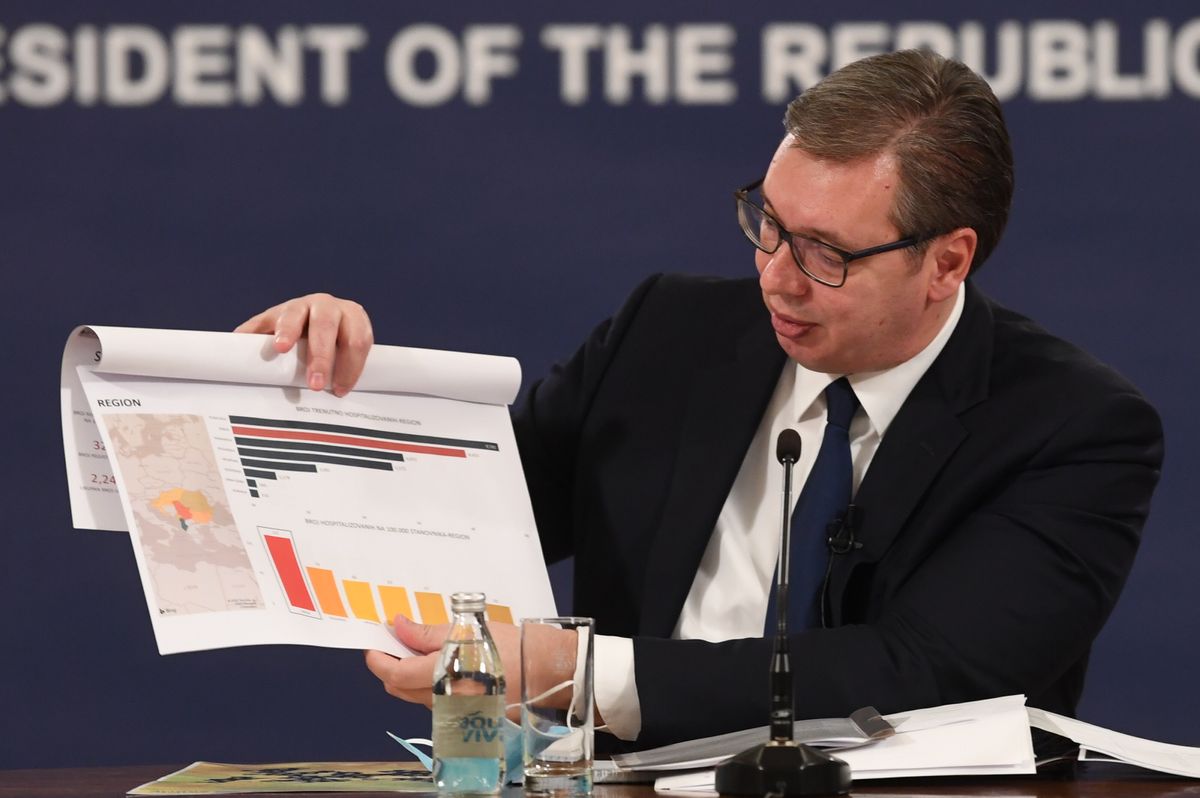 President Vucic reminded that the salaries of health care workers will increase by five percent from January 1, while the salaries of others in the public sector will increase by 3.5 percent and an additional 1.5 percent as of April 1, while corporal, private first class and non-commissioned officer army ranks will get an increase of an additional 10 percent. He noted that the minimum wage will be increased by 6.6 percent and so will pensions from January 1, by 5.9 percent, with the plan that the average pension amounts to 270 euros by the end of 2021. The President especially pointed out investments in health care, reminding that two new covid hospitals have been opened and that the renovation and construction of health facilities continues throughout Serbia, while stressing that Serbia is by far the first in the region in terms of hospitalized persons per 100,000 citizens, which is why it has recorded a low mortality rate , and also that Serbia this year has been among the top three countries in the region according to the number of PCR tests performed. Speaking about tourism, the President said that, next year, efforts will be made on the development of the Danube basin region, from Apatin to Kladovo, that the Ovcar-Kablar Gorge will be developed, as well as our mountain centers. Discussing the field of culture and information, President Vucic said that the implementation of the media strategy and the completion of the reconstruction of the National Theater in Subotica are important for next year, and he announced investments in museums, especially emphasizing the relocation of the History Museum to the train station building. He also stated that the floor heating in the Church of Saint Sava will be completed next year. He pointed out that the state will continue to take care of our citizens in Kosovo and Metohija, that no one can forbid Serbia to help its people, and that Serbia will not give up on helping our people. As he emphasized, Serbia is ready to send medicines and vaccines to the Albanian population as well, and pointed out that in the upcoming period our country will pursue a policy of peace in the region and will endeavour to cooperate with Zagreb, Sarajevo, Podgorica and others. President Vucic reminded that the salaries of health care workers will increase by five percent from January 1, while the salaries of others in the public sector will increase by 3.5 percent and an additional 1.5 percent as of April 1, while corporal, private first class and non-commissioned officer army ranks will get an increase of an additional 10 percent. He noted that the minimum wage will be increased by 6.6 percent and so will pensions from January 1, by 5.9 percent, with the plan that the average pension amounts to 270 euros by the end of 2021. The President especially pointed out investments in health care, reminding that two new covid hospitals have been opened and that the renovation and construction of health facilities continues throughout Serbia, while stressing that Serbia is by far the first in the region in terms of hospitalized persons per 100,000 citizens, which is why it has recorded a low mortality rate , and also that Serbia this year has been among the top three countries in the region according to the number of PCR tests performed. Speaking about tourism, the President said that, next year, efforts will be made on the development of the Danube basin region, from Apatin to Kladovo, that the Ovcar-Kablar Gorge will be developed, as well as our mountain centers. Discussing the field of culture and information, President Vucic said that the implementation of the media strategy and the completion of the reconstruction of the National Theater in Subotica are important for next year, and he announced investments in museums, especially emphasizing the relocation of the History Museum to the train station building. He also stated that the floor heating in the Church of Saint Sava will be completed next year. He pointed out that the state will continue to take care of our citizens in Kosovo and Metohija, that no one can forbid Serbia to help its people, and that Serbia will not give up on helping our people. As he emphasized, Serbia is ready to send medicines and vaccines to the Albanian population as well, and pointed out that in the upcoming period our country will pursue a policy of peace in the region and will endeavour to cooperate with Zagreb, Sarajevo, Podgorica and others. |
|
|
| Serbian Prime Minister the first PM in Europe to receive a Covid-19 vaccine |
|
Prime Minister of the Republic of Serbia Ana Brnabic received today the first vaccine against the coronavirus made by Pfizer company, at the Torlak Institute of Virology, Vaccines and Sera. Brnabic, who is the first European Prime Minister to receive the vaccine, pointed out that this day may be the first since 6 March that we have a reason for a smile on our faces as it marks the beginning of the end of the coronavirus pandemic in Serbia, but also in Europe and the world. As Prime Minister and as someone who leads the COVID-19 Crisis Response Team, I felt obliged to be the first to receive the vaccine, to show that we believe in it, as well as in our institutions - the Medicines and Medical Devices Agency of Serbia and experts who worked round the clock to test the vaccine, she said. Underlining that it was an honour to do this for her country and be the first to pave the way for all citizens, the Prime Minister said that she agreed with President of the Republic Aleksandar Vucic that the two of them receive different vaccines, so he will most likely receive the next one that arrives, most probably the one produced by China.  At the moment we have the Pfizer-BioNTech consortium vaccine, and the vaccines from the Chinese Sinopharm are expected in the near future, as well as certain quantities of the Russian vaccine Sputnik V. She expressed her belief that at the end of the first quarter or the beginning of the second quarter of next year we will have the vaccine of the company AstraZeneca, and after that the vaccine manufactured by Moderna. As we promised, all vaccines licensed in their countries and approved by relevant international agencies will be available to our citizens, and of course they will be tested by all of our agencies and institutes as well, the Prime Minister pointed out. She said that prior to the vaccination of health care workers, Minister of Health Zlatibor Loncar will also receive a vaccine shot as we endeavour to serve as an example and show how confident we are in the vaccines and institutions. Brnabic pointed out that Serbia, not counting Great Britain, is the first country in Europe to receive the Pfizer-BioNTech vaccine, and the third to start a mass immunization and campaign for giving the vaccine - after Great Britain and Switzerland. We achieved something very important and we will not stop even for a moment until the immunization of the population is completed, the Prime Minister said. She specified that our country will receive another 16,000 doses of Pfizer-BioNTech vaccine in January, as well as that together with other vaccines we will have a total of one million doses in January, and a total of approximately two million doses during the first quarter of next year. There is a dynamic on which Pfizer delivers vaccines and it varies depending on the production, and this is the case with deliveries to both Serbia and all other countries worldwide. We expected to receive 10,000 doses from Pfizer-BioNTech in December, however 4,807 doses arrived, the Prime Minister explained. Serbia demonstrated that it is able to fight and succeed if we all work as a team, Brnabic said and called on all not to see the beginning of vaccination as the end of the fight already, but to continue to apply all measures instead. This is to be certain and to be able to help our health care workers, and once the immunity is acquired we will be able to slowly start taking off the masks in 2021, but until then we should not see this as a victory but as the beginning of the end, the Prime Minister concluded. After the Prime Minister, vaccine shots were also administered to the Minister of Labour, Employment, Veteran and Social Affairs and a member of the COVID-19 Crisis Response Team Darija Kisic Tepavcevic and to Predrag Kon who is also on the COVID-19 Crisis Response Team. Furthermore, vaccine shots were also given to Head of the MMA Department for the Prevention and Control of Nosocomial Infections prof. Dr. Vesna Suljagic and academician Predrag Pesko, professor of Belgrade and Heidelberg universities and full member of the Serbian Academy of Sciences and Arts. The first quantities of the vaccine arrived in Serbia on 22 December, and today they will be administered to patrons of nursing homes in Belgrade and Novi Sad. Serbia is the first country in the region to receive a shipment of Pfizer-BioNTech vaccine. In addition to procuring the vaccine among the first countries in the world, even before EU countries, Serbia is one of the rare countries that managed to build and open two covid hospitals in record time. The hospitals with 930 beds in Batajnica and 500 beds in Krusevac are a major contribution to the expansion of capacities and strengthening the health care system in the fight against coronavirus and, as President Vucic said, represent a monument of the future, that will talk about the accomplishments the state made in a short time. Also, we recall that investments in health infrastructure have been large in Serbia, and since 2016, 80 health centers and clinics have been renovated, and works are underway on six large health centers. This way more than EUR 200 million was invested in the reconstruction, construction and equipping of hospitals and more than 300 million in the renovation of clinics and specialized hospitals, and many have already been completed, such as the University Children's Hospital Tiršova, and KBC Zemun nad KBC "Dragiša Mišović" hospitals. The absolute priority of the Serbian Government is the successful completion of health infrastructure projects that are underway, but great attention is also paid to health workers, whose salaries have, by 2020, been increased by 56.8% for specialist doctors, and 66.9% for nurses, while significant funding is invested in the education of health professionals, as well as in equipment and working conditions. Like other countries, Serbia has faced great challenges this year, most notably health challenges, and all factors in the state were focused on preventing the spread of the virus and safeguarding the lives and health of citizens. Serbia has faced these challenges better than many wealthier and more developed countries in Europe and the world. At the moment we have the Pfizer-BioNTech consortium vaccine, and the vaccines from the Chinese Sinopharm are expected in the near future, as well as certain quantities of the Russian vaccine Sputnik V. She expressed her belief that at the end of the first quarter or the beginning of the second quarter of next year we will have the vaccine of the company AstraZeneca, and after that the vaccine manufactured by Moderna. As we promised, all vaccines licensed in their countries and approved by relevant international agencies will be available to our citizens, and of course they will be tested by all of our agencies and institutes as well, the Prime Minister pointed out. She said that prior to the vaccination of health care workers, Minister of Health Zlatibor Loncar will also receive a vaccine shot as we endeavour to serve as an example and show how confident we are in the vaccines and institutions. Brnabic pointed out that Serbia, not counting Great Britain, is the first country in Europe to receive the Pfizer-BioNTech vaccine, and the third to start a mass immunization and campaign for giving the vaccine - after Great Britain and Switzerland. We achieved something very important and we will not stop even for a moment until the immunization of the population is completed, the Prime Minister said. She specified that our country will receive another 16,000 doses of Pfizer-BioNTech vaccine in January, as well as that together with other vaccines we will have a total of one million doses in January, and a total of approximately two million doses during the first quarter of next year. There is a dynamic on which Pfizer delivers vaccines and it varies depending on the production, and this is the case with deliveries to both Serbia and all other countries worldwide. We expected to receive 10,000 doses from Pfizer-BioNTech in December, however 4,807 doses arrived, the Prime Minister explained. Serbia demonstrated that it is able to fight and succeed if we all work as a team, Brnabic said and called on all not to see the beginning of vaccination as the end of the fight already, but to continue to apply all measures instead. This is to be certain and to be able to help our health care workers, and once the immunity is acquired we will be able to slowly start taking off the masks in 2021, but until then we should not see this as a victory but as the beginning of the end, the Prime Minister concluded. After the Prime Minister, vaccine shots were also administered to the Minister of Labour, Employment, Veteran and Social Affairs and a member of the COVID-19 Crisis Response Team Darija Kisic Tepavcevic and to Predrag Kon who is also on the COVID-19 Crisis Response Team. Furthermore, vaccine shots were also given to Head of the MMA Department for the Prevention and Control of Nosocomial Infections prof. Dr. Vesna Suljagic and academician Predrag Pesko, professor of Belgrade and Heidelberg universities and full member of the Serbian Academy of Sciences and Arts. The first quantities of the vaccine arrived in Serbia on 22 December, and today they will be administered to patrons of nursing homes in Belgrade and Novi Sad. Serbia is the first country in the region to receive a shipment of Pfizer-BioNTech vaccine. In addition to procuring the vaccine among the first countries in the world, even before EU countries, Serbia is one of the rare countries that managed to build and open two covid hospitals in record time. The hospitals with 930 beds in Batajnica and 500 beds in Krusevac are a major contribution to the expansion of capacities and strengthening the health care system in the fight against coronavirus and, as President Vucic said, represent a monument of the future, that will talk about the accomplishments the state made in a short time. Also, we recall that investments in health infrastructure have been large in Serbia, and since 2016, 80 health centers and clinics have been renovated, and works are underway on six large health centers. This way more than EUR 200 million was invested in the reconstruction, construction and equipping of hospitals and more than 300 million in the renovation of clinics and specialized hospitals, and many have already been completed, such as the University Children's Hospital Tiršova, and KBC Zemun nad KBC "Dragiša Mišović" hospitals. The absolute priority of the Serbian Government is the successful completion of health infrastructure projects that are underway, but great attention is also paid to health workers, whose salaries have, by 2020, been increased by 56.8% for specialist doctors, and 66.9% for nurses, while significant funding is invested in the education of health professionals, as well as in equipment and working conditions. Like other countries, Serbia has faced great challenges this year, most notably health challenges, and all factors in the state were focused on preventing the spread of the virus and safeguarding the lives and health of citizens. Serbia has faced these challenges better than many wealthier and more developed countries in Europe and the world. |
|
|
| STATEMENT BY THE MINISTRY OF FOREIGN AFFAIRS. |
|
On the occasion of 10 December, the international Human Rights Day, the Ministry of Foreign Affairs of the Republic of Serbia reaffirms its commitment to the principles and values of the Universal Declaration of Human Rights, adopted on this day in 1948.
The principles enshrined in the Universal Declaration of Human Rights have been the foundation for the development of international law in this field, and of the international system for the promotion and protection of human rights, as a unique achievement of modern civilization. It is incumbent upon us today to safeguard and strengthen the international system ensuring respect for human rights, to develop human rights standards, control the implementation of commitments, and also to continue cooperating with international and regional institutions on the protection of human rights.
Serbia is fully committed to the universal values of human rights and implementing in practice the international legal instruments relating to human rights. Our continued cooperation with the Human Rights Council mechanisms in the framework of the United Nations, with the Council of Europe and the mechanisms of the OSCE human dimension, represents an important segment of activities carried out by all state authorities, thus demonstrating our consistent commitment to the implementation of international human rights standards.
The international Human Rights Day is an opportunity to point out once again that Serb and other non-Albanian population is being deprived of its rights in Kosovo and Metohija and to call again on the international community to ensure the respect for the guaranteed international human rights norms and contribute to creating conditions for the return of internally displaced persons and giving them back their usurped property. |
|
|
| Ambassador Zupanjevac lays wreath at Commonwealth cemetary in Nairobi commemorating Remembrance and Armistice day that marked the end of the First World War. |
|
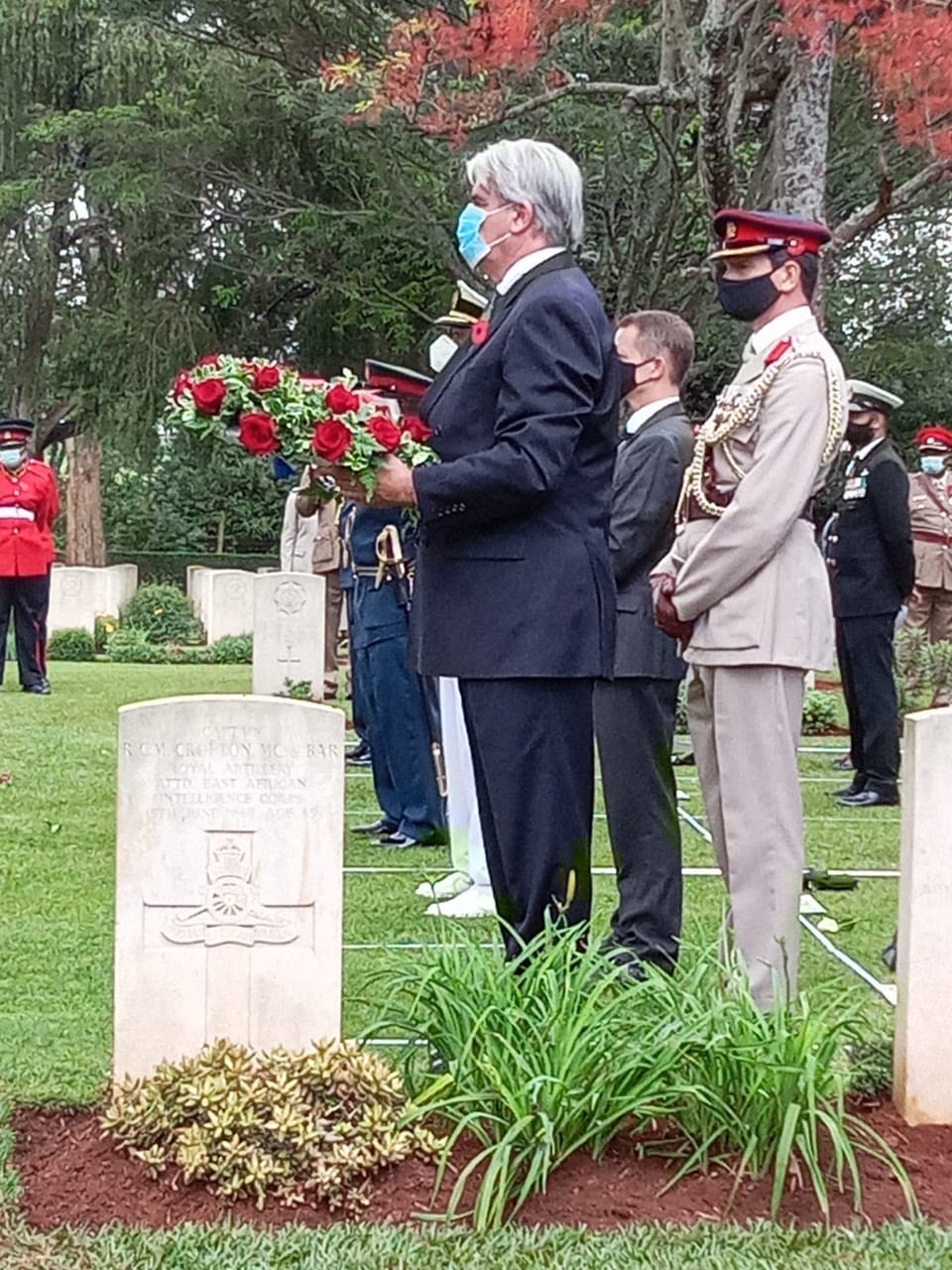 |
|
|
| Ambassador Zupanjevac Meeting with Hon. Esther Passaris. |
|
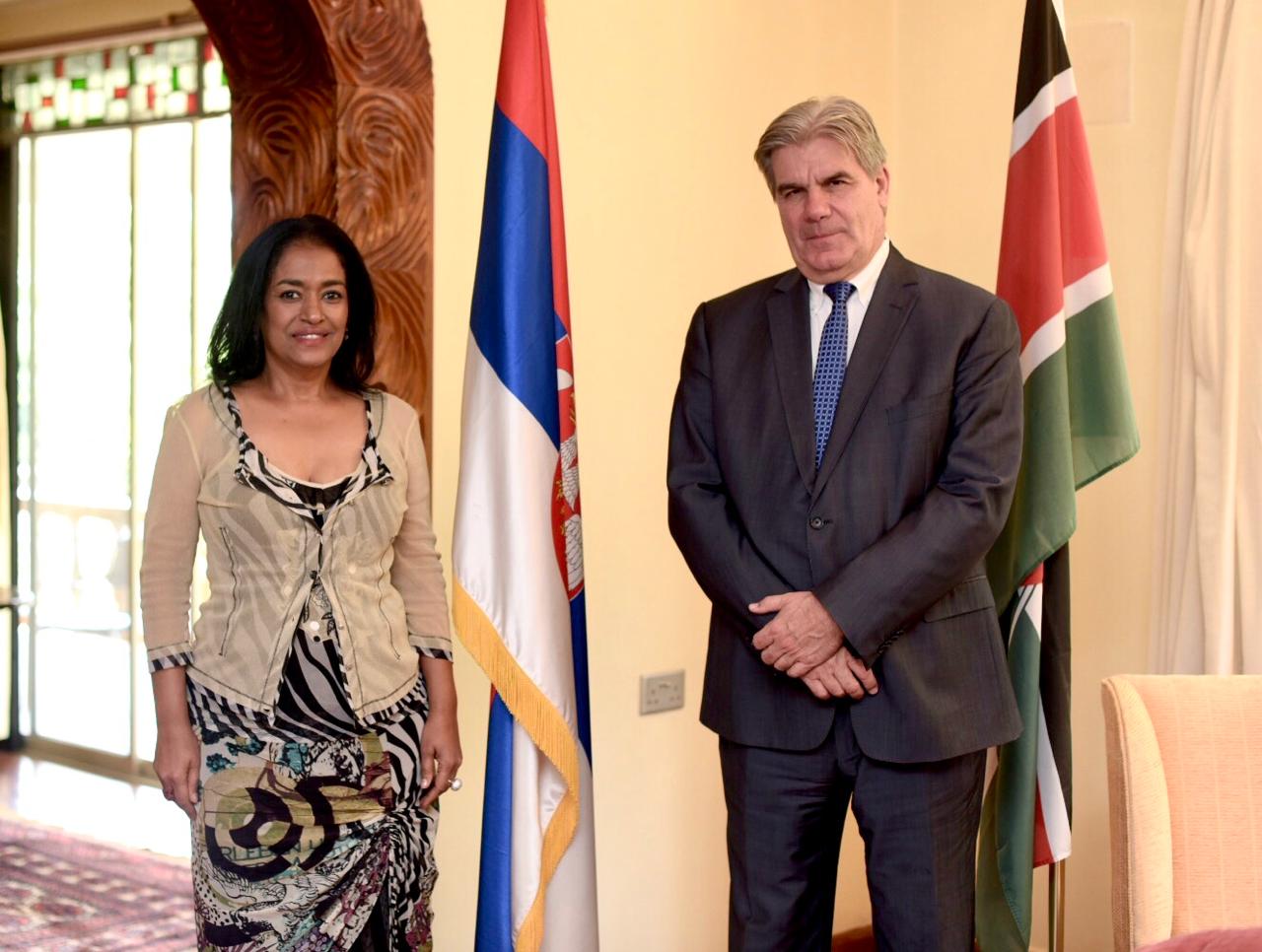 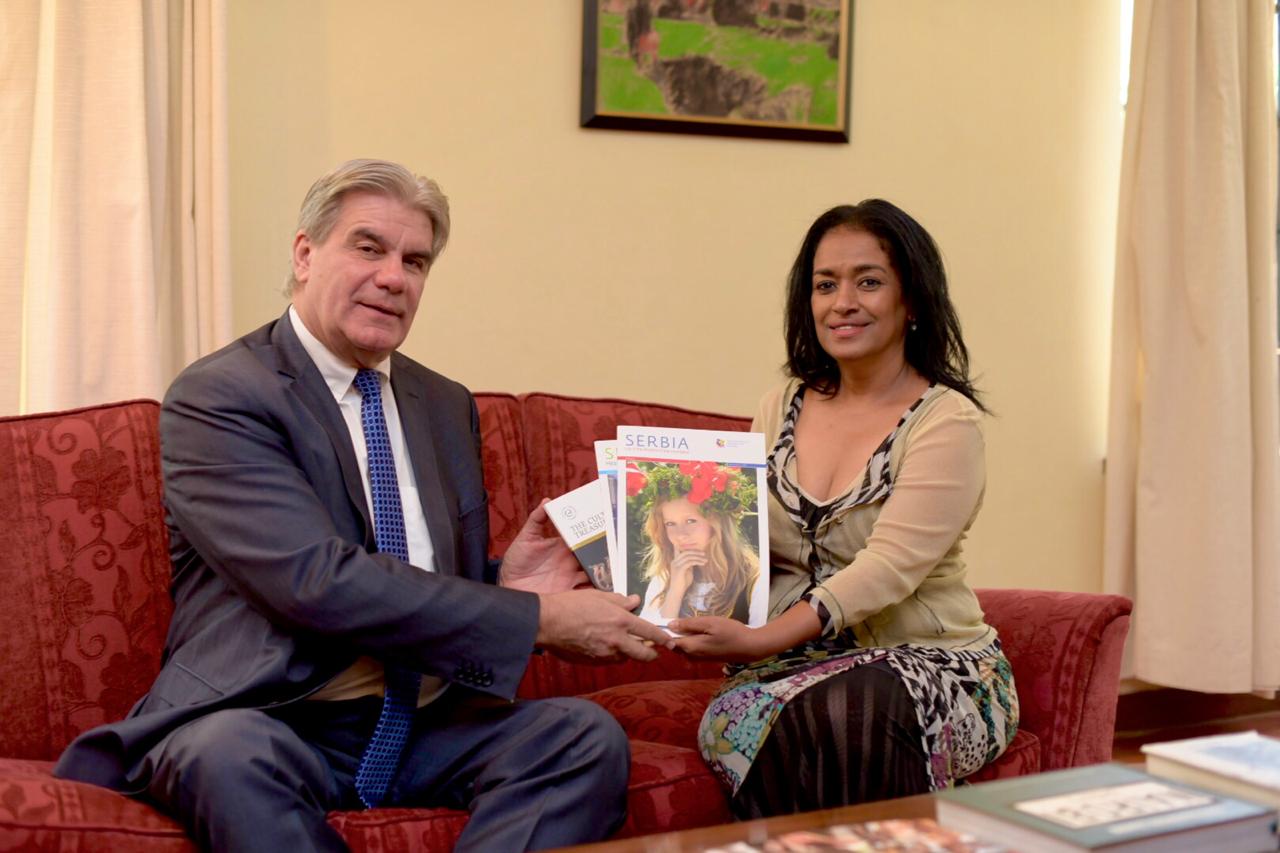 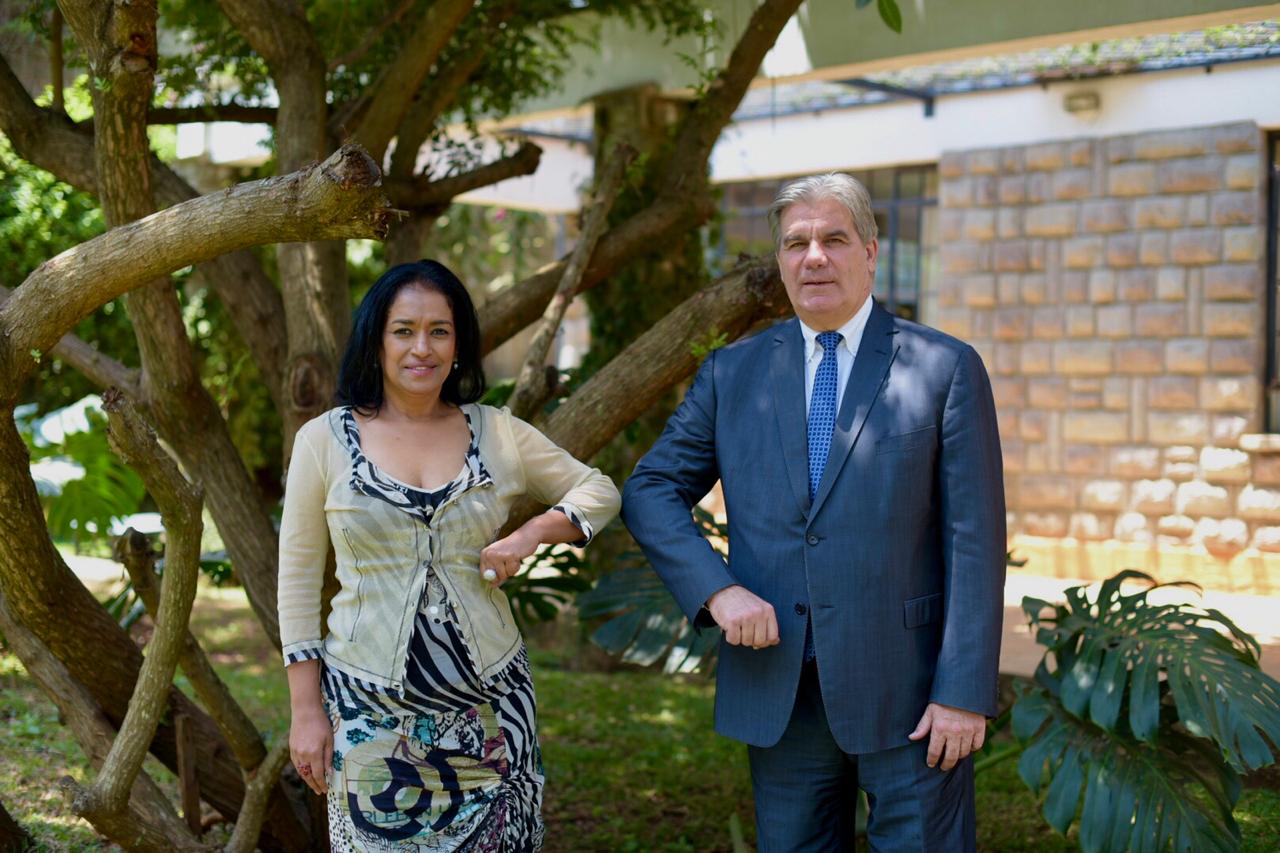
Hon. Esther Passaris visited Ambassador Dragan Zupanjevac to talk about economic cooperation and trade between the Republic of Kenya and the Republic of Serbia as well as enhancing parliamentary cooperation. |
|
|
| Reception on the occasion of the Statehood Day of Serbia |
|
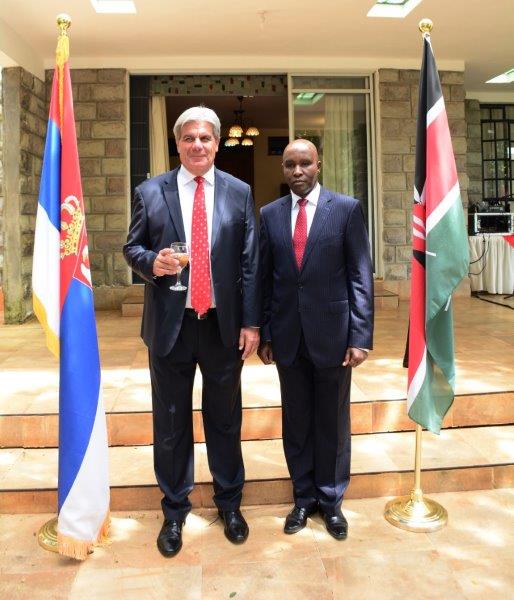 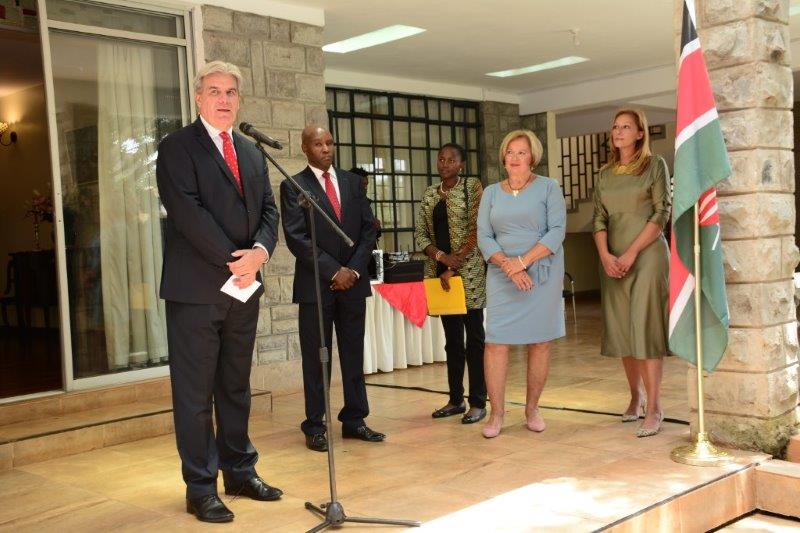 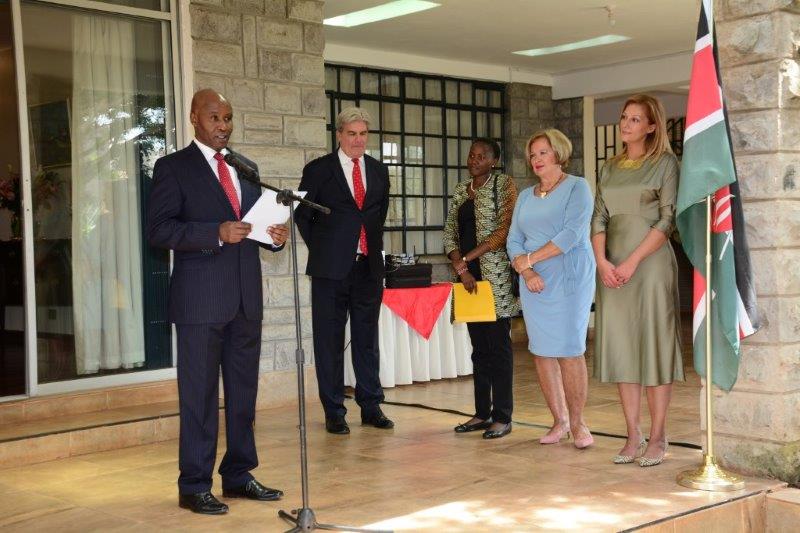
Ambassador Dragan Zupanjevac organized a reception on the occasion of the Statehood Day of the Republic of Serbia. The reception was held on 14 February 2020 in the presence of numerous representatives from Kenyan institutions, diplomatic core, former Kenyan students in our country, private sector and Serbian diaspora who live and work in Kenya. |
|
|
| Co-financing projects that contribute to the preservation and strengthening ties between the home country and diaspora as well as the home country and Serbs in the region |
|
First Deputy Prime Minister and Minister of Foreign Affairs of the Republic of Serbia, Ivica Dacic, issued Decision No. 24-596/30-2024/1 on co-financing projects that, with their quality, contribute to the preservation and strengthening ties between the home country and diaspora as well as the home country and Serbs in the region
You can view published decisions on co-financing projects at the following links:
https://mfa.rs/
https://www.dijaspora.gov.rs/konkursi2024.php |
|
|
| Financial Guide for Returnees |
|
The NBS's Financial Guide for Returnees aims to improve the availability of information for our citizens wishing to come back to the Republic of Serbia, in order to facilitate their return and faster intergration as well as their money disposal. The purpose of the financial guide is to provide a single place comprehensive and user friendly information about most of the questions regarding FX operations relevant for the return of our citizens from abroad.
You can download finacial guide from the following link: https:www.nbs.rs/internet/english/20/dev/finansijski_vodic_za_povratnike_e.pdf |
|
|
| Ambassador presents Credentials in Rwanda |
|
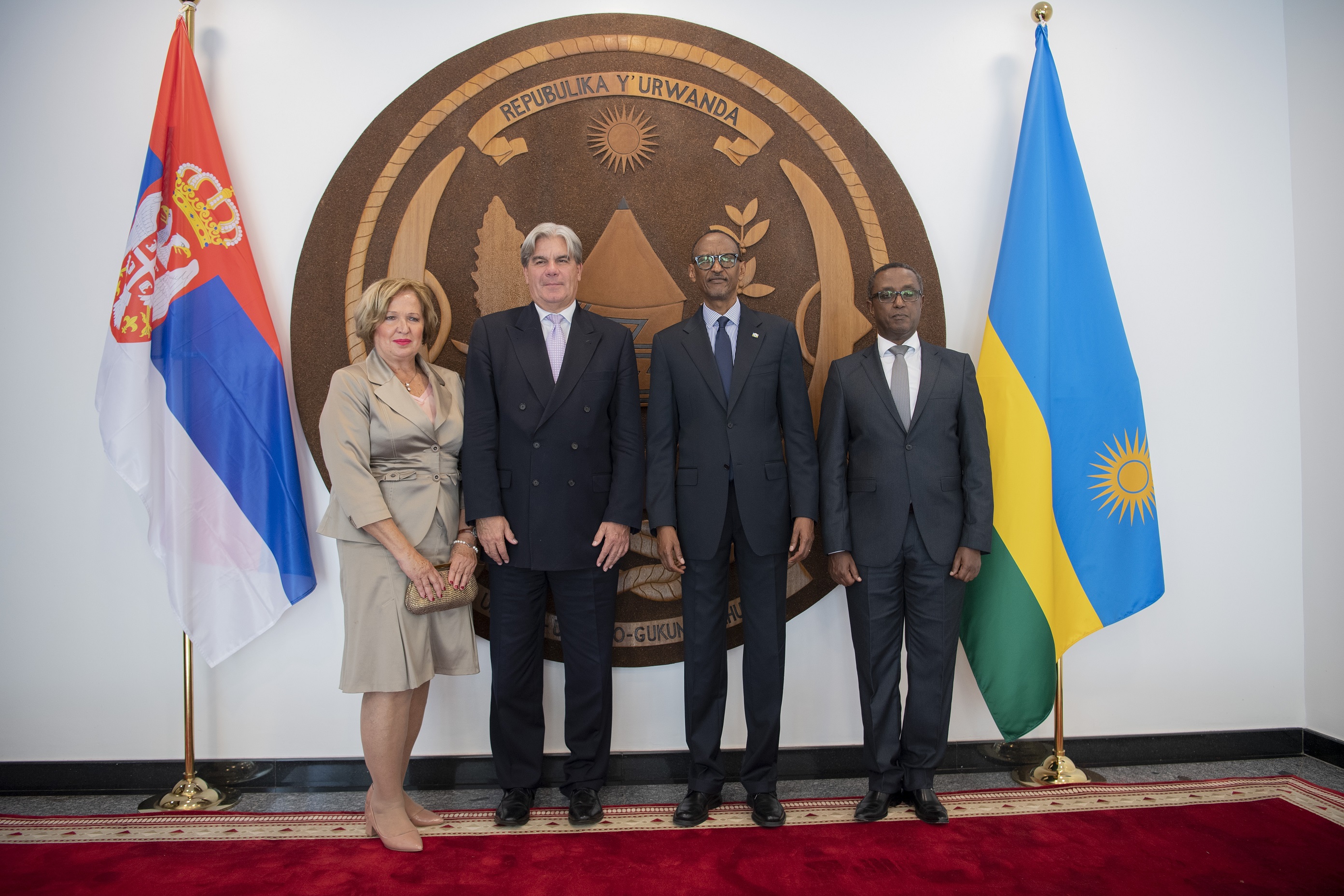 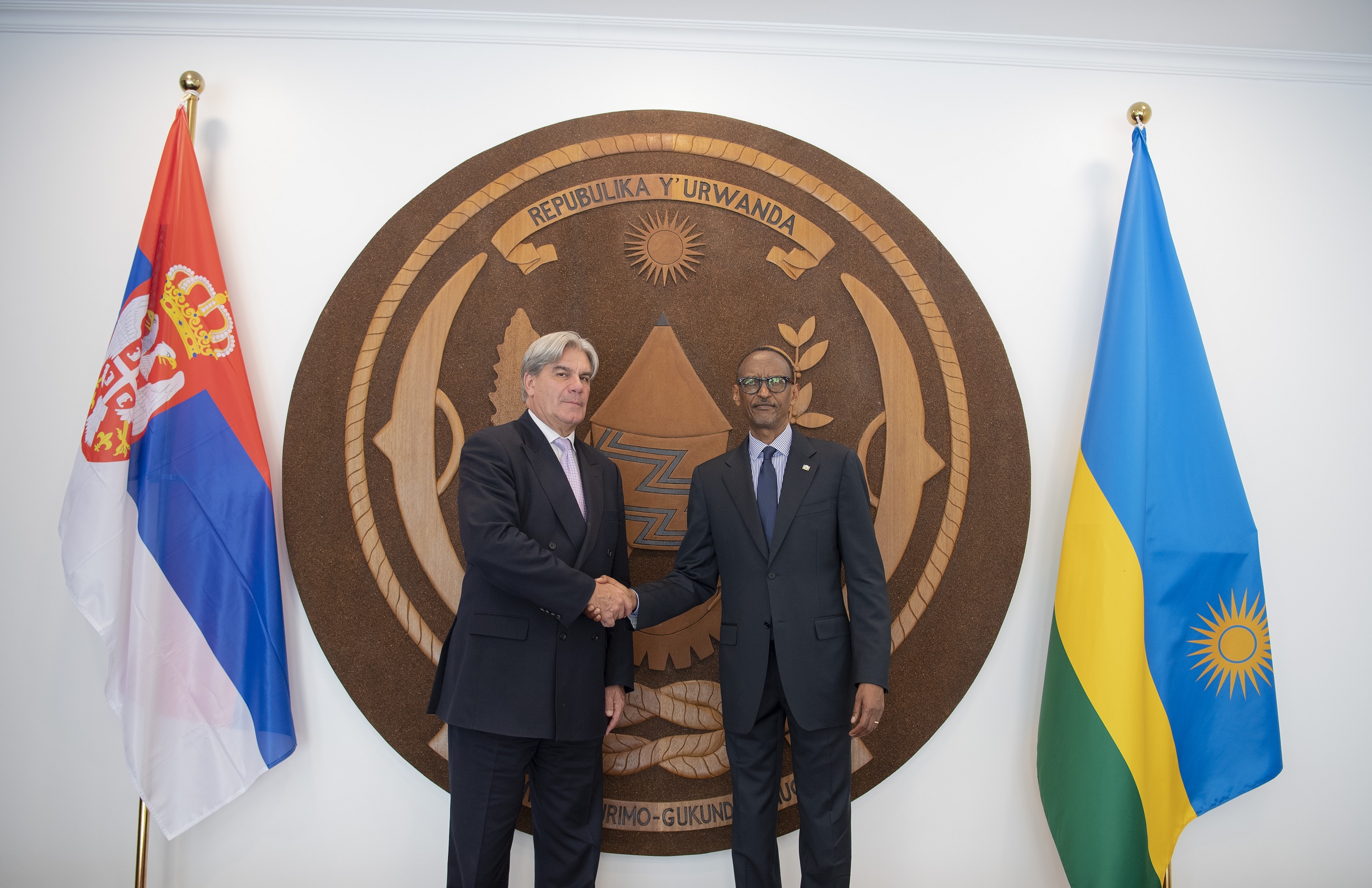
H.E Ambassador Dragan Zupanjevac presented his letters of Credence to the President of the Republic of Rwanda H.E Mr. Paul Kagame on 15 Nov 2019. |
|
|
| Ambassador Zupanjevac's interview for the Kenyan Daily Standard newspaper |
|
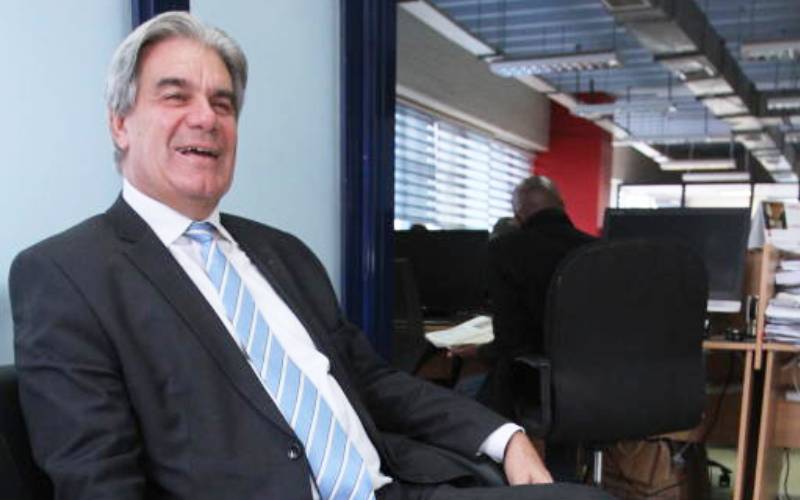
Ambassador Zupanjevac was interviewed by the Kenyan Daily Standard on 19 October, stating that Serbia would support Kenya's bid for a non permanent seat in the UN Security Council for 2021 to 2022.
The interview can be found on the following link.
https:www.standardmedia.co.ke/article/2001346327/serbia-now-backs-kenya-un-council-bid |
|
|
| Ambassador of the Republic of Serbia Mr. Dragan Zupanjevac presented his credentials to the President of Somalia Mr. Mohamed Abdullahi Mohamed "Farmaajo" |
|
Ambassador Dragan Zupanjevac presented his credentials on April 10. 2019. in Mogadishu to the President of Somalia Mohamed Abdullahi Mohamed „Farmaajo“. During his visit he also spoke to the state minister of the foreign affairs of Somalia and ambassador of Somalia accredited to Kenya. Ambassador Zupanjevac also wisited the Serbian medical congingent in the EU Training Mission, where he had also a meeting with the commander and chief of the EUTM gen. Matteo Spreafico.
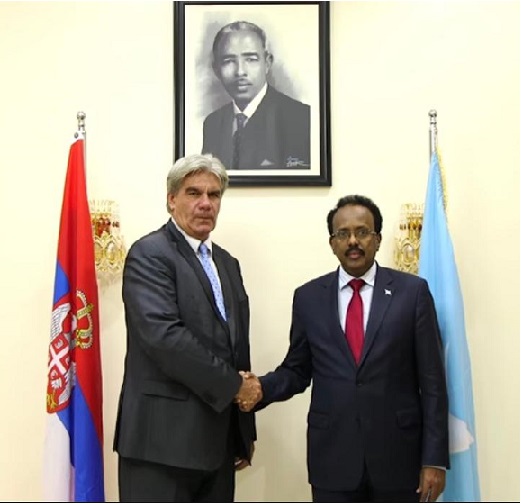 |
|
|
| UNEA 4 - participation of the Minister for the Environment Protection of the Republic of Serbia Mr. Goran Trivan |
|
The Minister for the Environment Protection Mr Goran Trivan participated in the UNEA4 assembly, taking place March 11 to 15. 2019 in Nairobi. Minister Trivan delivered a speach and later participated on the side event presenting the results of the Belgrade Regional Conference „Chalenges of the Polution in Southern and Southeastern Europe“, held in december 2018. During his visit minister spoke with the new executive director of UNEP Ms Inger Andersen and also with the acting executive director UNEP Ms Joice Msuia. On this occasion minister Trivan was elected as a vice chair of the East Europe group for the forthcoming UNEA5.
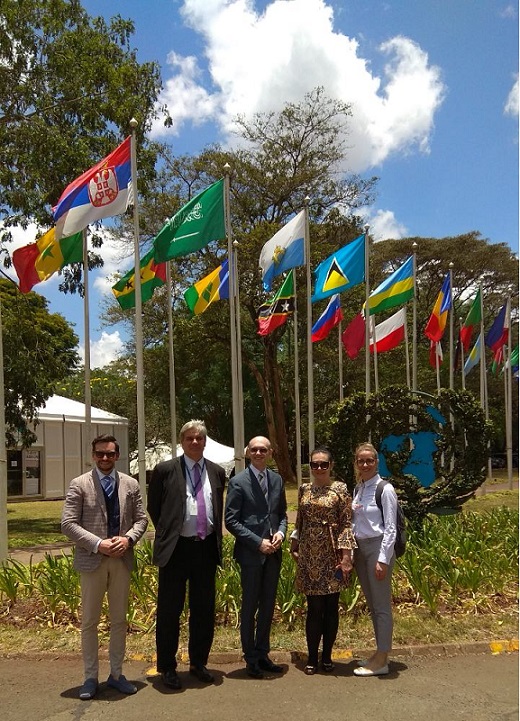 |
|
|
| Celebration of the National Day of the Republic of Serbia |
|
On the National day reception, held on February 27. 2019, many Kenyan colleagues and friends were present, including arround 50 foreign ambassadors.
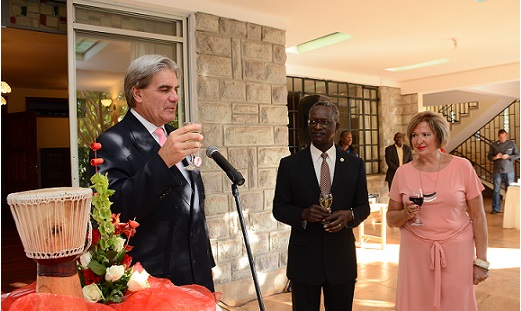
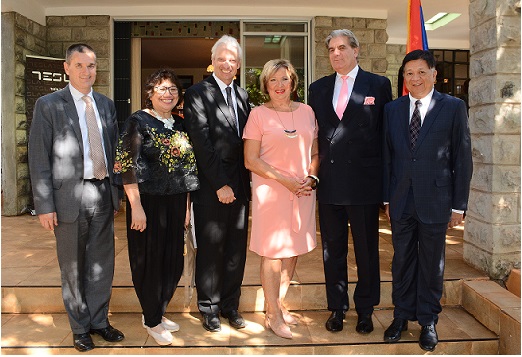
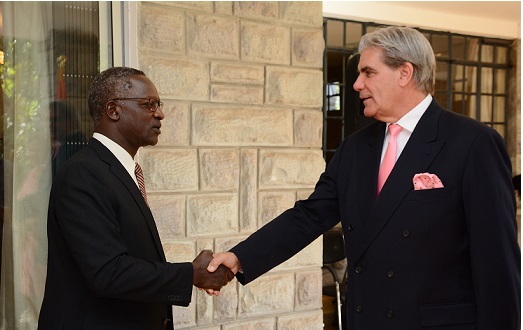 |
|
|
| The official visit to the Republic of Uganda of the President of the National Assembly of the Republic of Serbia Ms Maja Gojkovic |
|
During the official visit to the Republic of Uganda, February 21 - 23. 2019, President of the National Assembly of Serbia Ms Maja Gojkovic had a meeting with the President of Uganda Mr. Yoweri Musaveni, THE Speaker of the Parliament of Uganda Ms Rebecca Kidaga, president of the Committee for foreign affairs and with a group of parliamentarians who will form the Parliamentary Group of Friendship between Uganda and Serbia. A Memorandum of Cooperation between two parliaments was signed.
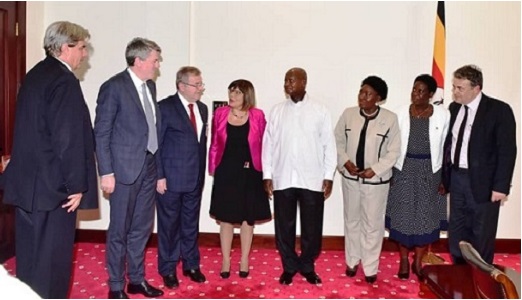
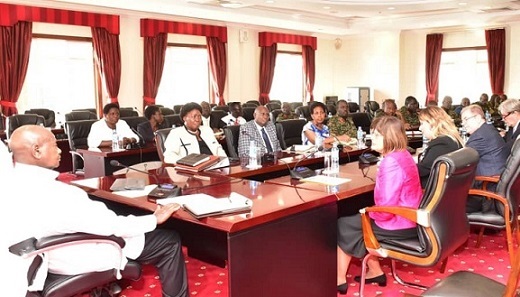 |
|
|
| The official visit to the Republic of Kenya of the President of the National Assembly of the Republic of Serbia Ms Maja Gojkovic |
|
During the official visit to Kenya, Feb. 18 - 20. 2019, the President of the National Assembly of Serbia Ms Maja Gojkovic was received by the Speaker of the National Assembly of the Parliament of Kenya Mr. Justin Bedan Njoka Muturi,the Speaker of of the Senate of the Parliament of Kenya Senator Mr. Kenneth Makelo Lusaka, participated at the regular working session of the National Assembly of Kenya and had a meeting with the minister of foreign affairs of Kenya Ms Monica Juma. During the visit a Memorandum of Cooperation between parliaments was signed.
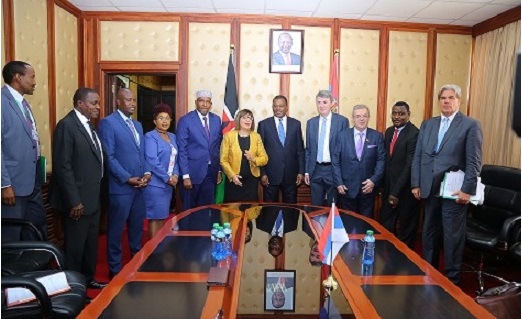
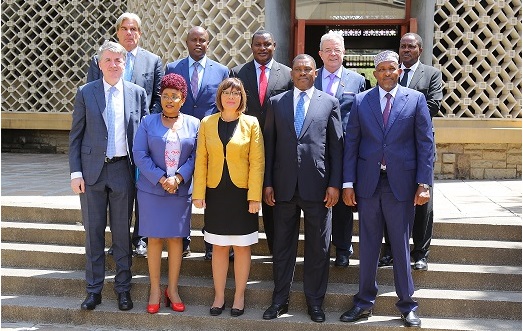
|
|
|
| Minister Dacic in talks with Union of the Comoros’ Chief of Defence Staff |
|
First Deputy Prime Minister and Minister of Foreign Affairs of the Republic of Serbia Ivica Dacic met today with Youssouf Idjihadi, Chief of Defence Staff of the Union of the Comoros, who is on a visit to Serbia.
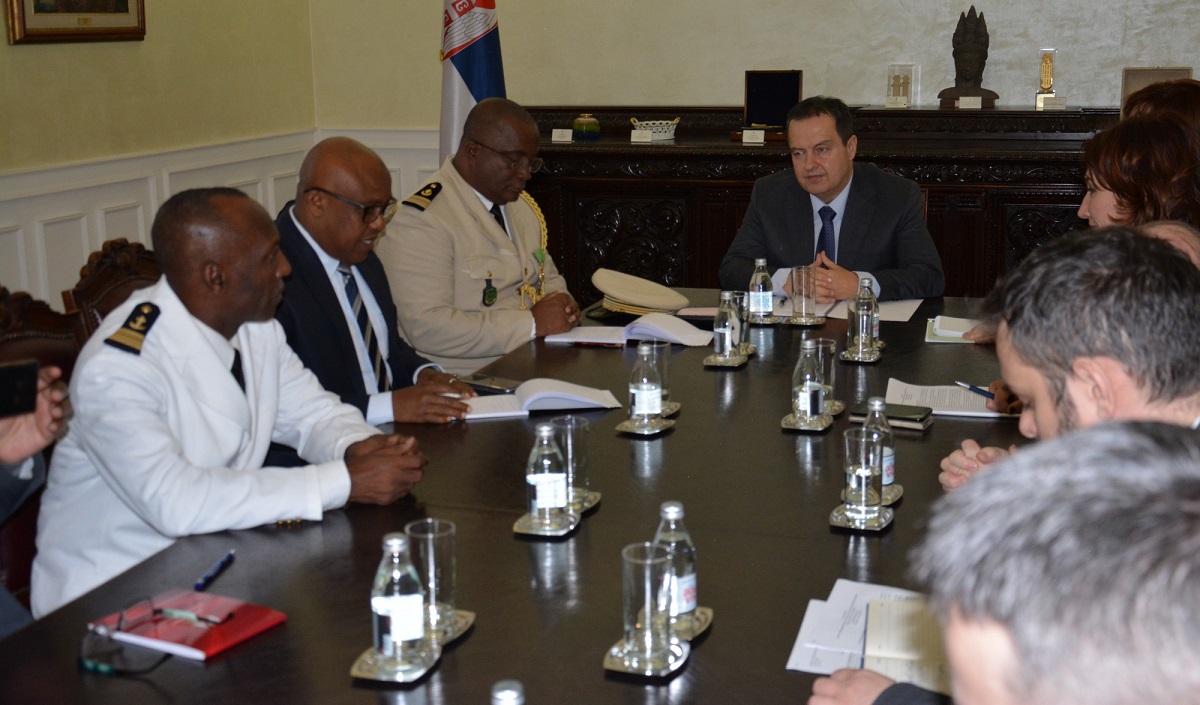
Minister Dacic said that he was pleased that the relations between the two countries were being revitalized. He stressed that Serbia and the Comoros were tied by a long history of traditionally friendly relations. The Minister recalled that he had visited the Union of the Comoros in 2018 as well as that the Comorian Foreign Minister paid a visit to Belgrade in November last year, on which occasion it was agreed to deepen cooperation in all areas of mutual interest. He said that he was very glad that the agreements made were being carried out, as demonstrated by today's visit of the Comorian Chief of Defence Staff to our country. |
|
|
| International Sports Film Festival in Nairobi |
|
The first of its kind, International Sports Film Festival, has been held in Nairobi. The Republic of Serbia has participated in the festival with three movies that have been screened out of which the movie "Montevideo" has won awards for the best screenplay and production design. The awards have been handed over to the Ambassador Dragan Zupanjevac.
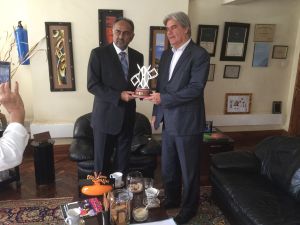 |
|
|
| Ministerial conference on innovative solutions to pollution in South and South-East Europe, 4-5.12.2018. Belgrade |
|
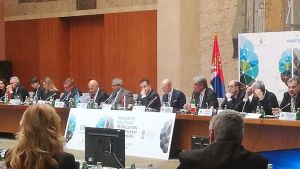 |
|
|
| Mr. Vladimir Dzamic, State secretary at the Ministry of Environmental Protection of the Republic of Serbia ddresses participants of the Sustainable Blue Economy Conference on November 26th 2018 in Nairobi |
|
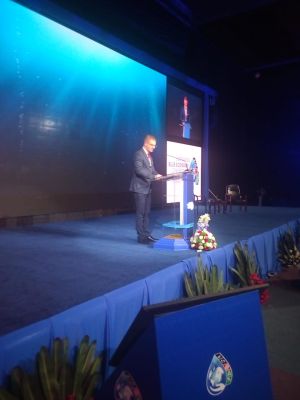 |
|
|
| State secretary of the Ministry for Environmental Protection of the Republic of Serbia Mr. Vladimir Dzamic and H. E. Mr. Dragan Zupanjevac, Ambassador of the Republic of Serbia at the opening of the Sustainable Blue Economy Conference, 26.11.2018, Nairobi |
|
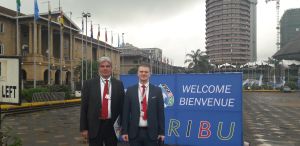
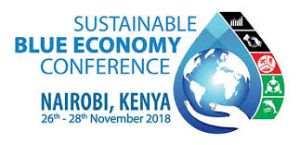 |
|
|
| Commemorating the end of the WWI |
|
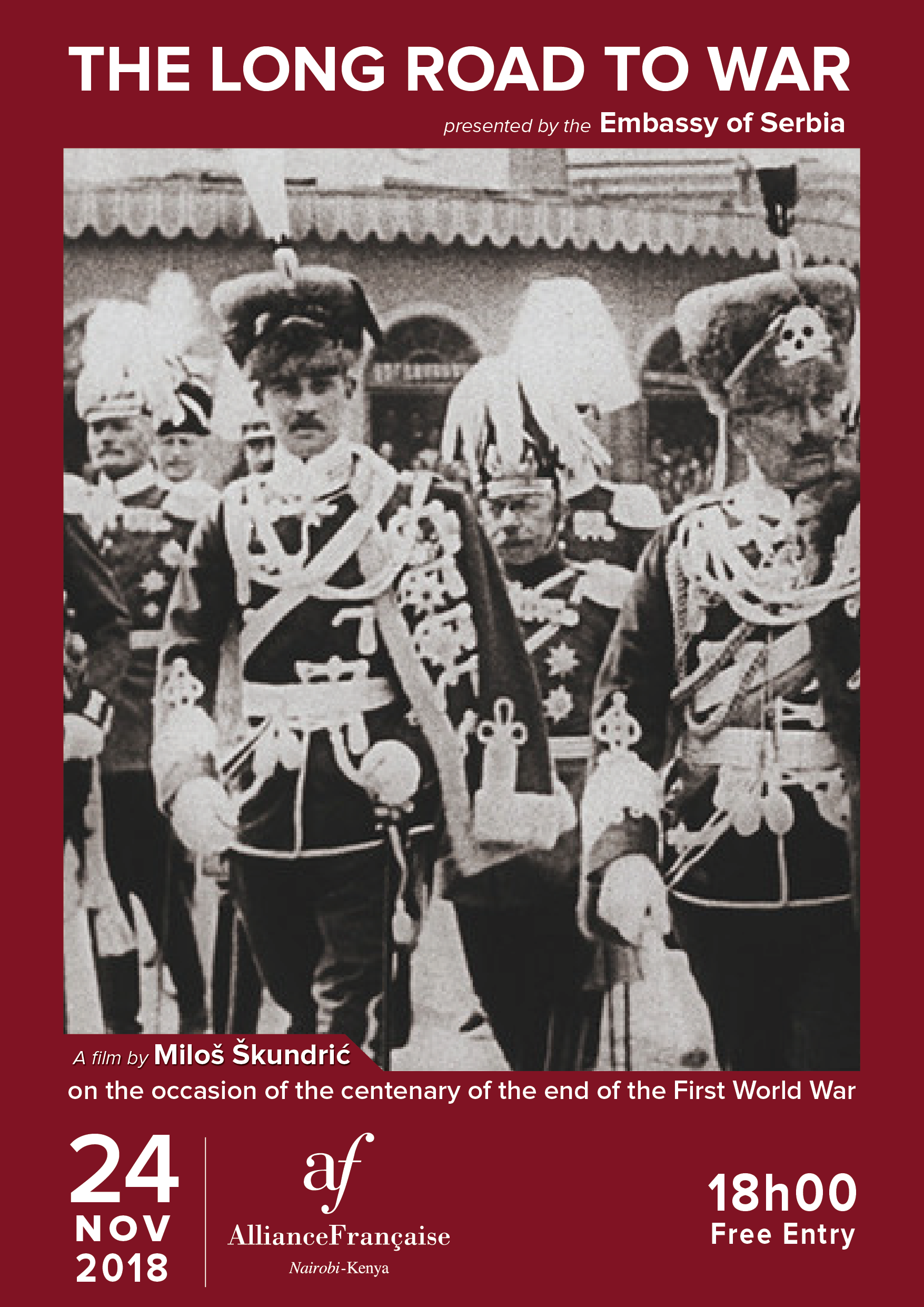 The Embassy of the Republic of Serbia in Nairobi together with Alliacnce Francaise will screen a movie entitled "The long road to war" from the director Milos Skundric, with the aim to commemorate 100-years from the end of the WWI. The Embassy of the Republic of Serbia in Nairobi together with Alliacnce Francaise will screen a movie entitled "The long road to war" from the director Milos Skundric, with the aim to commemorate 100-years from the end of the WWI.
The movie will be screened on Saturday, November 24th 2018 at 18 hours at the premises of the Alliance Francaise in Nairobi.
The entrance is free. |
|
|
| Visit of the "Energoprojekt" representatives and meeting with the Minister for water and irrigation of the Republic of Kenya |
|
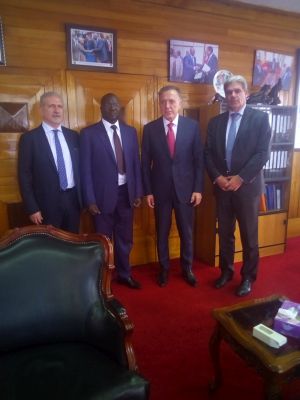 |
|
|
| Chairman of the Foreign Policy Committee of the Parliament of Uganda with a group of parliamentarians in the Embassy of the Republic of Serbia |
|
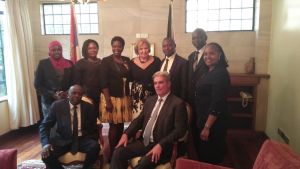 |
|
|
| Reward to researchers from Serbia |
|
On Friday, October 5th 2018 in Nairobi, the finals of the competition for implementing IT in agriculture, organized by the CGIAR, International organization for research in agriculture, has been held. From 130 enrolled teams, only 12 have made it to the finals, while 5 teams have received $100k worth of finances to realize their idea within the next year. Among the awarded teams was also the Institute BioSens from Novi Sad, represented by Oskar Marko and Gordan Mimic. Their idea has sparked great interest since it enables enhancement of proceeds based on the selection of adequate seed without any additional investments. This solution has great potential, especially in Africa, where investments in agricultural production are restricted while the need for food is great.
Rewarded researchers of BioSens, after the awards proclamation, were received by Mr. Dragan Zupanjevac, Ambassador of the Republic of Serbia to Kenya.
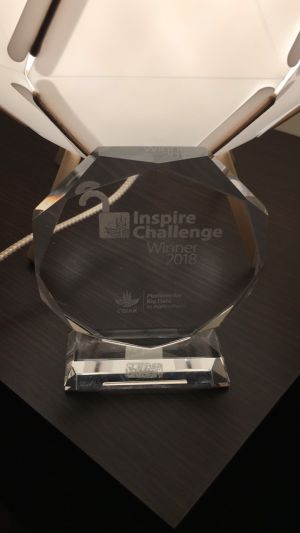
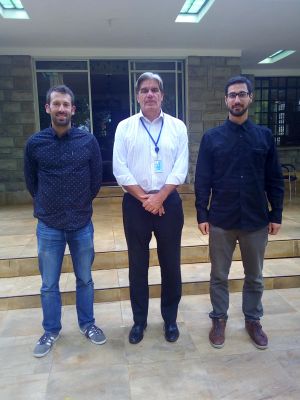 |
|
|
| Ambassador Zupanjevac submitts his credential letters to Azali Assoumani, President of the Union of Comoros |
|
 |
|
|
| Meeting of Ambassador Zupanjevac with the Cabinet Administrative Secretary in MFA Kenya, Mr. A. Namembwa |
|
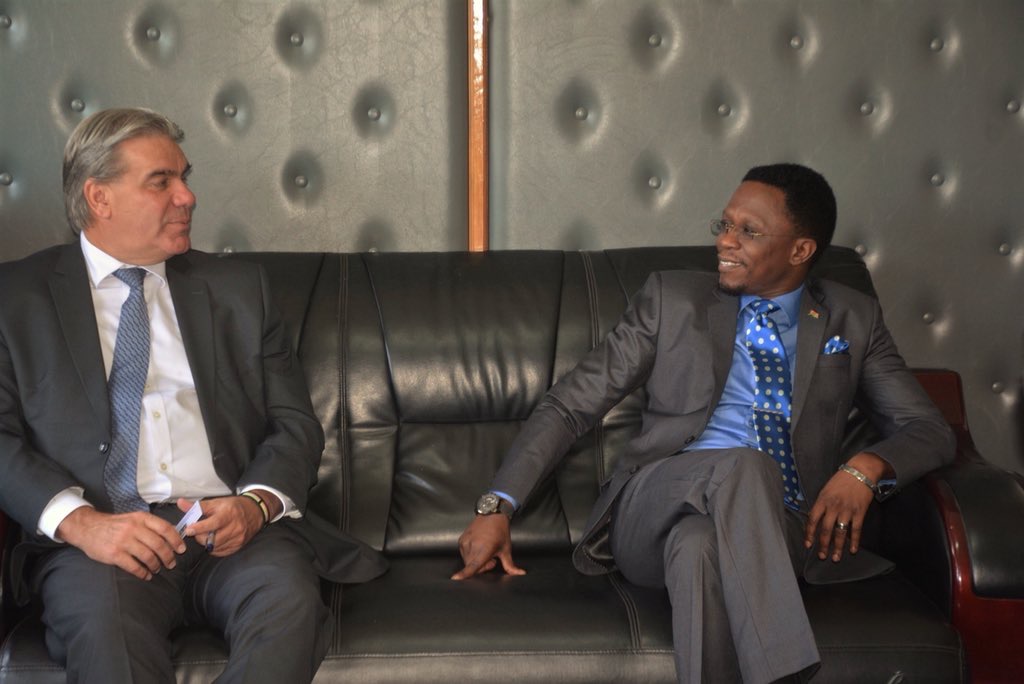 |
|
|
| Reception for Statehood Day of the Republic of Serbia |
|
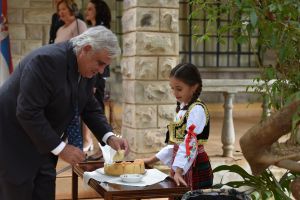

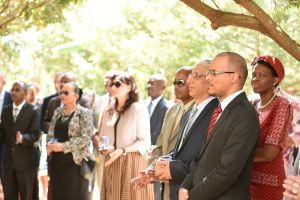
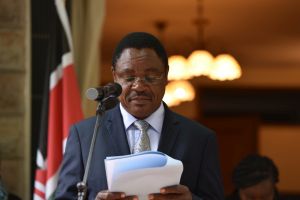 |
|
|
| Meeting of Ambassador Dragan Zupanjevac with Speaker of the National Assembly of the Republic of Kenya, Justin Muturi |
|
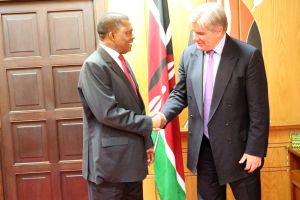
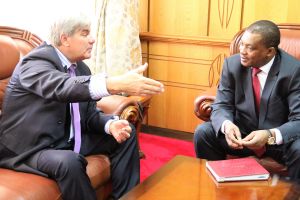 |
|
|
| Meeting of Ambassador Dragan Zupanjevac with Director prof. Maria Nzomo of the Institute for diplomacy and international studies at the University of Nairobi |
|
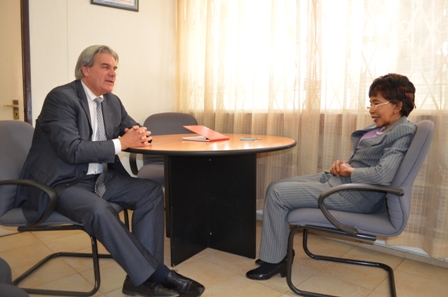
 |
|
|
| H. E. Ambassador of the Republic of Serbia meets the new High Commissioner of Uganda in Nairobi |
|
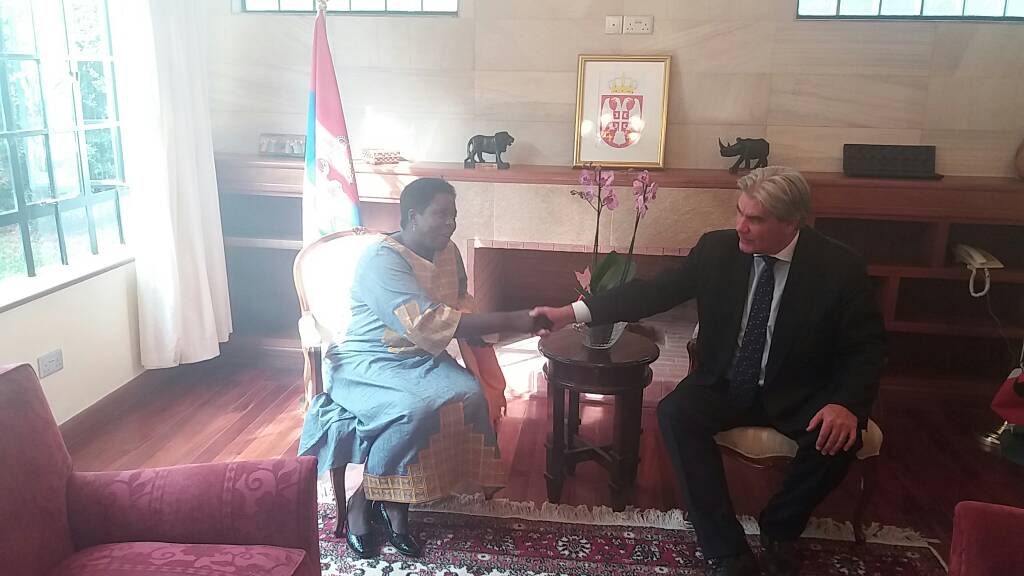 |
|
|
| Ambassador Dragan Županjevac submitts his credentials to Uhuru Kenyatta, President of the Republic of Kenya |
|
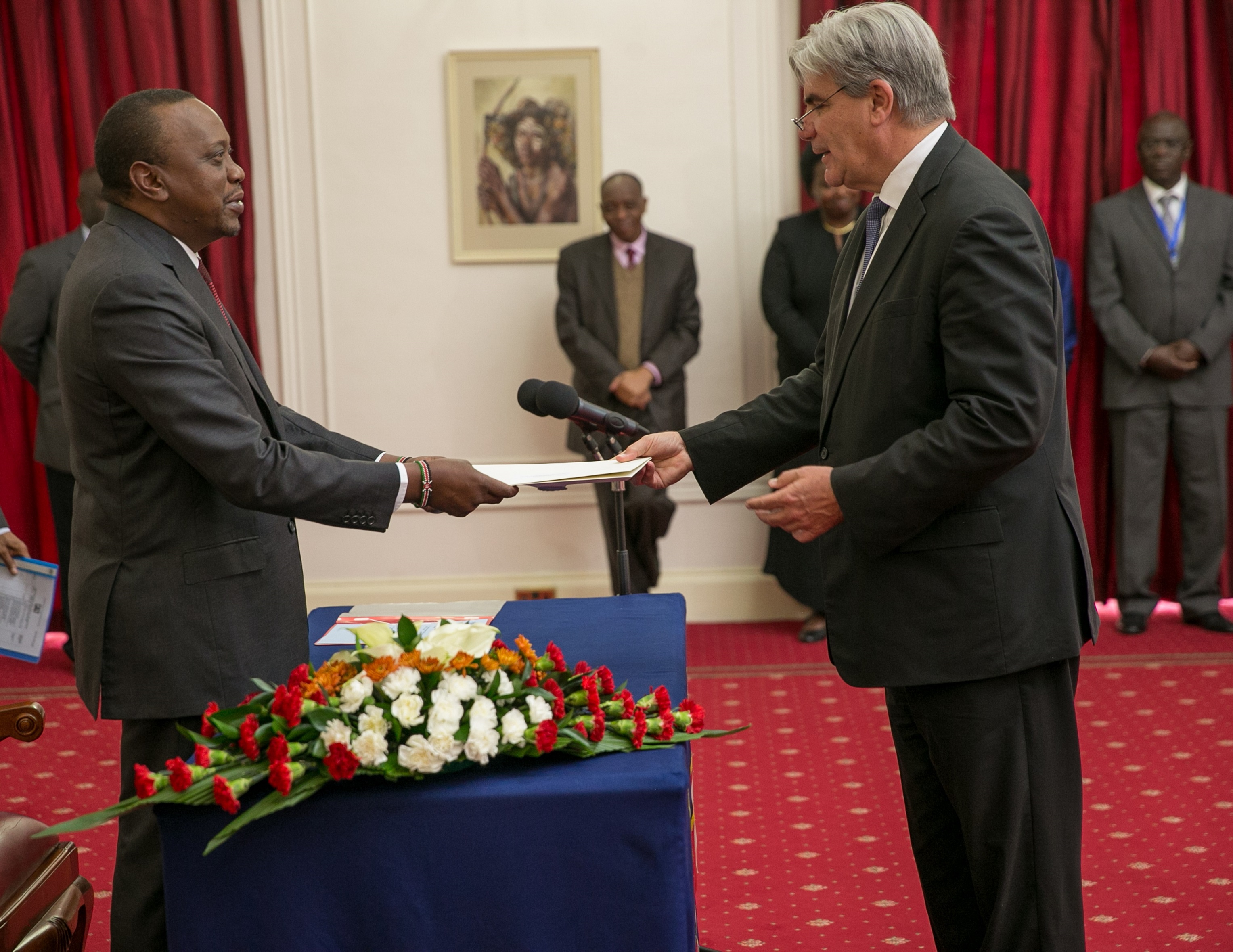 |
|
|
| First Deputy Prime Minister and Minister of Foreign Affairs of the Republic of Serbia, Mr. Ivica Dačić meets the Minister of Foreign Affairs of the State of Eritrea, Mr. Osman Saleh Mohammed |
|
First Deputy Pirme Minister amd Minister of Foreign Affairs of the Republic of Serbia, Mr. Ivica Dačić meets the Minister of Foreign Affairs of the State of Eritrea, Mr. Osman Mohammed.
Video can be found here. |
|
|
| The First Deputy Prime Minister and Minister of Foreign Affairs of the Republic of Serbia, Mr. Ivica Dačić met with the Cabinet Secretary for Foreign Affairs and International Trade of the Republic of Kenya, Amina C. Mohamed on the sidelines of the 72. Session of the UN General Assembly in New York |
|
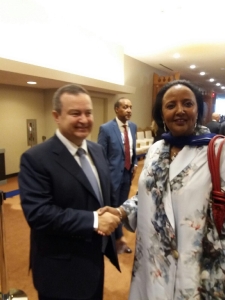 |
|
|
| Decision on visa suspension for citizens of the Republic of Peru to enter Republic of Serbia |
|
The Government of the Republic of Serbia, on its session held on May 11th 2017, has decided to suspend visas for citizens of the Republic of Peru, holders of ordinary passports, according to which they can enter, transit and stay on the territory of the Republic of Serbia, not more than 90 days within the period of 6 months from the day that they enter the Republic of Serbia, unless there are obstacles deriving from the art.11 of the Law on Foreigners.
The Decission has been published in the "Official Gazette of the Republic of Serbia" no.46/2017 dated May 12th 2017 and it enters into force on May 20th 2017.
|
|
|
| Public International two-phase competition for the design of a conceptual solution for the Zoran Djindjic Memorial |
|
The Belgrade City Administration has announced the Public International two-phase competition for the design of a conceptual solution for the Zoran Djindjic Memorial at the Students Square in Belgrade.
For more information please consult the following web-page:
http://www.beograd.rs/en/. |
|
|
| Tender bond |
|
TENDER BOND (GUARANTEE)
Name of the bank:
Place and date:
Beneficiary (Contracting Authority): Permanent Mission of the Republic of Slovenia to the United Nations in New York, 630 Third Avenue, 20th Floor, New York, N. Y. 10017, USA, representing the successor states of the former Socialist Federal Republic of Yugoslavia, namely Bosnia and Herzegovina, the Republic of Croatia, the Republic of Macedonia, the Republic of Slovenia and the Republic of Serbia
Guarantee No.
In accordance with the Invitation to tender for the provision of real estate sales services – the sale of diplomatic real estate in New Yok (United States of America), Tokyo (Japan), Bonn (Germany), and Berne (Switzerland), dated ______________ for the following transaction: 1. Service of brokering the sale of immovable property listed above by a single real estate agency, which will be awarded the contract by the successor states of the former SFRY
for the needs of the Contracting Authority (beneficiary of this guarantee), the Tenderer _______________________________________________________________________ is bound - in order to prove seriousness of the Tender in this procurement procedure - to submit a bank guarantee amounting to USD 50,000.00 (fifty thousand 00/100).
The bank is bound to pay the sum indicated in the following cases:
a) if the Tenderer withdraws or changes the bid during the Tender validity period specified in the Tender (e.g. until the successor states of the former SFRY notify tenderers of their decision) or
b) if the Tenderer having been notified of the acceptance of its Tender during the Tender validity period:
• fails or refuses to conclude the contract in compliance with the provisions of the Instructions to Tenderers, or
• fails or refuses to submit the performance bond in compliance with the provisions of the Instructions to Tenderers.
We hereby undertake to be bound within 15 days upon the receipt of the first written claim of the Contracting Authority to pay to the Contracting Authority the abovementioned sum without requiring any additional argumentation, if it states in its claim that this sum belongs to it due to the occurrence of one or both of the above cases and states which case or cases occurred.
The claim invoking the bond shall be submitted to the bank and it shall contain:
1. an original statement of the Contracting Authority invoking the performance bond in compliance with the aforementioned paragraph and
2. the original of the Tender Bond No. _______ /_______.
This bond decreases with each, by this guarantee, realized payment.
This bond shall be valid until the Tenderer is selected in the aforementioned Tender procedure and (in case the whole or partial Tender is accepted) until the moment when the selected Tenderer concludes the contract with the Contracting Authority and submits to it the performance bond, but no later than until the expiration of the validity of the contract.
If we do not receive any claim from you regarding the payment of the guaranteed sum within 90 days from the deadline for submitting tenders, this guarantee ceases to be valid regardless of whether it has been returned.
This guarantee is not transferable.
Any disputes between the beneficiary and the bank shall fall within the jurisdiction of the competent court in New York City and are subject to law, valid in New York City.
Bank
(Seal and signature)
INSTRUCTIONS FOR COMPLETING THE FORM*: Tender Bond (Form B-1)
The Tenderer may submit equivalent suretyship insurance with an insurance company with the same content as defined in this sample. |
|
|
| Performance bond |
|
PERFORMANCE BOND (GUARANTEE)
Name of the bank:
Place and date:
Beneficiary (Contracting Authority): Permanent Mission of the Republic of Slovenia to the United Nations in New York, 630 Third Avenue, 20th Floor, New York, N. Y. 10017, USA, representing the successor states of the former Socialist Federal Republic of Yugoslavia, namely Bosnia and Herzegovina, the Republic of Croatia, the Republic of Macedonia, the Republic of Slovenia and the Republic of Serbia
Guarantee No.
In accordance with the contract ______________________________________ (contract title, contract number, date), concluded between the beneficiary and the contractor __________________________________________ (name of the Contractor) for the performance of __________________________ (subject matter of the contract), in the time limit ____________ (date, days, months), in the quantity and quality, defined in the contract, the Contractor is bound to perform the following services:
Service of brokering the sale of immovable property listed above by a single real estate agency, which will be awarded the contract by the successor states of the former SFRY
On the Contractor’s request, we hereby undertake to be irrevocably and unconditionally bound by this guarantee to pay USD 100,000.00 (in writing one hundred thousand 00/100) within 15 days upon the receipt of your first written claim, if the Contractor does not fulfill his contractual obligations in agreed quality, quantity and time limits defined in the aforementioned contract. Our obligation is also valid in case the fulfillment of contractual obligations is only partial.
The claim invoking the performance bond shall be submitted to the bank and it shall contain:
1. an original statement of the Contracting Authority invoking the performance bond in compliance with the previous paragraph, and
2. the original of the Performance Bond No. ________ /________.
This performance bond decreases with each, by this guarantee, realized payment.
This performance bond shall be valid at the latest until __________. After the expiry of this date, the bond shall be void. Our obligation expires automatically regardless of whether the bond has been returned.
If at any time during the validity of this bond the beneficiary agrees with the Contractor to extend the time limit for the execution of the awarded project, or in case the Contractor fails to fulfill the contractual obligations, the Contractor and the bank may reach a mutual agreement to extend the validity of this bond.
This bond is not transferable.
Any disputes between the beneficiary and the bank shall fall within the jurisdiction of the competent court in New York City and are subject to law, which is valid in New York City.
Bank
(Seal and signature)
INSTRUCTIONS FOR COMPLETING THE FORM*: Performance Bond (Form B-2)
The Tenderer may submit equivalent suretyship insurance with an insurance company with the same content as defined in the sample. |
|
|
| Tender information sheet |
|
TENDERER INFORMATION SHEET
Tenderer's legal name
Tenderer's country of constitution
Tenderer's year of constitution
Tenderer's legal address
Tenderer's authorized representative (name, address, telephone numbers, fax numbers, e-mail address)
Eventual partner organizations in countries where the property for sale is located a) New York:
b) Tokyo:
c) Bonn:
d) Berne:
Tenderer's turnover by year (indicated in local currency and in EUR applying the reference rates of the European Central Bank - http://www.ecb.europa.eu/home/html/index.en.html)
2013: 2014: 2015:
Submission of tender guarantee using the attached Form B-1 (underline) yes no
Accept performance guarantee using the attached Form B-2 (underline) yes no
Evidence of financial and business solvency (underline) yes no
Evidence of technical and professional capacities and references proving the successful provision of brokerage services (underline) yes
no
Certificate of no conviction of the tenderer/legal entity and its CEO (underline) yes no
Period of validity of the tender (minimum taking in consideration Invitation to tender provisions – deadline for submitting tender 30 days following issuing of invitation and notification of decision within 50 days from deadline for submission of tenders = 80 days) (insert dd.mm.yyyy)
Brokerage fee
(in % of total gross sales price of immovable property)
Suggested method of sale for each immovable property a) Permanent Mission, New York:
b) Residence, New York:
c) Embassy and residence, Tokyo:
d) Embassy, Bonn:
e) Embassy and residence, Berne:
|
|
|
| iNVITATION TO TENDER FOR THE PROVISION OF REAL ESTATES SALES SERVICES |
|
INVITATION TO TENDER FOR THE PROVISION OF REAL ESTATE SALES SERVICES – THE SALE OF DIPLOMATIC REAL ESTATE IN NEW YORK (UNITED STATES OF AMERICA), TOKYO (JAPAN), BONN (GERMANY), AND BERNE (SWITZERLAND)
- Bosnia and Herzegovina, the Republic of Croatia, the Republic of Macedonia, the Republic of Slovenia, and the Republic of Serbia – as the sole Successor States to the former Socialist Federal Republic of Yugoslavia (hereinafter “the SFRY”) – and the co-owners of diplomatic and consular property of the SFRY, as the previous title owner, hereby issue an invitation to tender for the provision of the service of brokering the sale of the following immovable property :
a) Permanent Mission of the SFRY to the UN, New York, USA (854 Fifth Avenue, N.Y. 10065); additional indicative data: block 1391, Lot 6, site area 3,600 sq. ft./30 x 120, gross living area 16,125 sq. ft, est. 1910;
b) Residence of the Permanent Representative of the SFRY to the UN, New York, USA (730 Park Avenue, N.Y. 10021); additional indicative data: Apt. 16/17B, cooperative interest, 718/30.000 shares, block 1385, Lot 37, project name: Park 71st St. Corp., gross living area above grade 4,294 sq. ft., Act. Age: 1929;
c) Embassy and residence of the SFRY in Tokyo, Japan (7-24, 4-chome, Kitashinagawa Shinagawa-ku, Tokyo); additional indicative data: land 316-37 Kita Shinagawa 4-Chome, Shinagawa Ward, Tokyo, registered total area 995.27 m2 (app. 28 m x 30 m), building 316-37 Kita Shinagawa 4-Chome, Shinagawa Ward, Tokyo, total floor area 1,725.70 m2 (size in building design document), time of completion 1965;
d) Embassy of the SFRY in Bonn, Germany (Schlossallee 5, 5300 Bonn 2), additional indicative data: land register Mehlem, entry no. 2,865, building and garden/courtyard area 5,441 m2, Schlossallee 1 and 5, floor area 1,565 m2 (ground floor, cellar, attic, underground garage with 14 parking spaces);
e) Embassy and residence of the SFRY in Berne, Switzerland (Seminarstrasse 5, 3006 Bern), additional indicative data: estate: nr. 199 Bern 4, land area: total 1,760 m2, building gross area 540 m2, garden area/courtyard 1,220 m2, construction year: 1978.
The Successor States underline the following:
- The service of brokering the sale of all the immovable property listed above will be awarded to a single real estate agency, which will be awarded the contract by the Successor States;
- The deadline for submitting tenders is 30 days from the day following the issuing of this invitation to tender, while the Successor States will notify tenderers of their decision within 50 days from the deadline for submitting tenders;
- Among the references qualifying them to successfully broker the sale of the listed property, interested tenderers will submit the following documents, and define their conditions for providing brokerage services. In their offer, the interested tenderers will include:
a) Documents certifying that the tenderer is a registered company;
b) Documents proving that the tenderer has offices, branches, or partner organisations in the countries where the property on sale is located, operating in the listed cities (New York, USA; Tokyo, Japan; Bonn, Germany; Bern, Switzerland);
c) Documents showing the tenderer’s turnover amounted to at least US$ 100 million in the last three years;
d) Guarantee for the offer in the amount of US$ 50,000.00 (the guarantee will be returned to the tenderer upon the signing of the brokerage contract);
e) Performance guarantee in the amount of US$ 100,000.00 (the performance guarantee will be returned to the tenderer upon the completion of the contract);
f) Evidence of financial and business solvency;
g) Evidence of technical and professional capacities and references proving the successful provision of brokerage services;
h) Certificate of no conviction of the tenderer/legal entity and its CEO, in accordance with the legal provisions of the country of the registered seat of the tenderer and permanent residence of its CEO;
- The period of validity of the tender shall be at least 90 days from the date of submission;
- Interested tenderers will specify their tenders as a brokerage fee, which is a percentage of the total gross sales price of the property listed above;
- The lowest brokerage fee shall be the decisive criterion in selecting the successful tenderer, provided that the tenderer meets all the above conditions;
- Interested tenderers will submit their tenders (in a sealed envelope, marked with the designation ‘Do not open’) by registered mail addressed to:
Stanislav Vidovič, Ministry of Foreign Affairs of the Republic of Slovenia, SI-1001 Ljubljana, Prešernova cesta 25.
- The Successor States will provide appraisals of the market value of all the listed immovable property to the successful tenderer; the property’s appraised market value will represent the minimum asking price for the property concerned, unless otherwise decided by the Successor States;
- The sale of the immovable property will be conducted preferably by way of public auction or by any other method in accordance with the local real estate market practice for each immovable property concerned, as advised by interested tenderers in their tenders;
- The Successor States reserve the right not to select any tenderer, even if all conditions are met;
- The immovable property listed in this invitation to tender may be sold separately or not. Each Successor State must confirm the sale of each immovable property under the terms to be negotiated with the best offer/potential buyer prior to concluding the sale if the purchase price offered is below the appraised market value or the minimum asking price.
- Contact details for additional information: gp.mzz@gov.si or sekretariat.mzz@gov.si. |
|
|
| NOTICE |
|
EMBASSY OF THE REPUBLIC OF SERBIA - NAIROBI
Based on the Article 27. paragraph 1. and 33. paragraph 2. of the Law on Public Property ('Official Gazette RS', no. 24/12, 88/13 and 105/14) announces
NOTICE
FOR SALE OF SMALL ITEMS - EQUIPMENT REMOVED FROM AN INVENTORY
by collecting written offers
The subject of this procedure is sale of small items - equipment removed from the inventory owned by the Republic of Serbia which is being managed by the EMBASSY OF THE REPUBLIC OF SERBIA NAIROBI, composed out of:
1. wall lamps - 12 pcs
2. chandeliers - 2 smaller (with 2 lightbulbs) and 1 bigger (with 8 lightbulbs)
3. ceiling lamps - 7 pcs
4. sheer curtains 40m wide.
Total value of the items for sale is estimated at the amount of 850 Euro.
The sale will be conducted by collecting closed written offers.
The list of items is offered in its entirety and the items are sold as presented.
Opening of the offers will be conducted publicly on September 2nd 2016 at 12h in the presence of bidders at the EMBASSY OF THE REPUBLIC OF SERBIA, State House Avenue 00100 - 30504, NAIROBI.
If two bidders offer the same price, the procedure will be continued through auction.
The choice of the most acceptable offer will be conducted by applying the criteria of the highest price.
All bidders will be informed in writing about the most acceptable offer while contract will be concluded with the most acceptable bidder.
The bidder whose offer is to be chosen as the most acceptable one is complied to take over the equipment in question within 15 days from the moment of concluding the contract, and make payment for the same within 7 days after the contract has been signed.
The viewing of the items in question will be available on August 29th and 30th 2016 at the Embassy.
All necessary information in relation to preparing the offer are available through tel.no. +254 (20) 271 0076, 4016, contact person Sila Simon or in writing via e-mail: nairobi@embassyofserbia.or.ke. |
|
|
| Agreement between the Republic of Serbia and the Republic of Lebanon on visa free travel for holders of diplomatic and official passports |
|
The Republic of Serbia and the Republic of Lebanon have signed an Agreement on visa free travel for holders of diplomatic and official passports. The Agreement was signed in Beirut on July 22nd 2015 and will enter into force on May 28th 2016. Based on this Agreement, nationals of both States, who are holders of diplomatic and official passports, will have the right to enter into, transit through and stay on the territory of the other Party without a visa within the period that does not exceed 90 days during six months from the date of the entry. |
|
|
| 25th European Film Festival - Nairobi |
|
The 25th European Film Festival will take place from 11th until 28th May 2016 in Nairobi.
Among the movies that will be shown at the Festival is "Chasing a dream" directed by Mr. Mladen Mitrovic in co-production of Serbia, Bosnia and Herzegovina and Croatia. This documentary has been filmed for more than five years on four different continents in twelve countries. The movie has been awarded by the Audience Award at the recent Sarajevo Film Festival.
A brief synopsis and poster of the movie can be found here.
Program of the European Film Festival can be found here.
Local media report abouts the event can be found here.
|
|
|
| WHY KOSOVO IS INELIGIBLE FOR MEMBERSHIP IN UNESCO? |
|
• Because the request for its membership is a serious breach of the International law, the Constitution of UNESCO, the legally binding UN Security Council Resolution 1244 (1999) and the Charter of the UN whose Article 25 says that “The members of the UN agree to accept and carry out the decisions of the Security Council in accordance with the present Charter”.
• Because according to the UN Security Council resolution 1244, which reaffirms the sovereignty and territorial integrity of the Federal Republic of Yugoslavia (Serbia), Kosovo and Metohija is an integral part of the Republic of Serbia, under the administration of the UN. Since Kososvo cannot be a State, it does not fulfill the basic requirement for membership set out by the UNESCO Constitution.
• Because unilateral attempts such as this one seriously harm and disrupt the dialogue between Belgrade and Pristina, under the auspices of the European Union in which mutually acceptable solutions for many complex issues have been devised so far. The issue of the Serbian cultural heritage and the property of the Serbia Orthodox Church has not yet been discussed within the dialogue where it belongs.
• Because this is an unacceptable politicization of UNESCO which should not overtake the competences of the UN Security Council as the highest authority for the preservation of the International peace and Security. UNESCO should not serve as an instrument for the affirmation of an illegal and unilaterally declared independence of a part of the territory of one UN member state. The primary goal of UNESCO is to promote universal values of humanity through education, science and culture not to make political decisions with regard to the statehood.
• Because this would be a dangerous precedent, harmful for many states. This would open the door for other entities to follow the same path thus threatening territorial integrity and sovereignty of other member states.
• Because this issue is polarizing the membership of UNESCO.
• Because, besides not being a state, Pristina does not have moral credibility for membership. Anyone aspiring to UNESCO membership must prove not only in words but as well in deeds its commitment to the goals of the UNESCO Constitution, which certainly is incompatible with deliberate, systematic, vandal demolition of Serbian cultural and historic monuments with the aim to remove the traces of centuries-long existence of Serbs in this area as well as the impunity of the perpetrators of such barbaric acts unworthy of the 21st century. These acts are comparable only to the acts of destruction of cultural heritage by terrorist groups in the Middle East and elsewhere that the world is witnessing and UNESCO is strongly condemning.
• Because four Serbian Orthodox monasteries are inscribed on the UNESCO List of World Heritage in danger although the armed conflict in Kosovo is over for many years now. In danger from whom?
• Because the inclusion of this item in the provisional agenda of the 197th session of the UNESCO Executive board raises serious concerns about the compliance with procedure and the respect of the established UNESCO rules. Just to mention that even publishing of the document on the unacceptability of Kosovo’s application for UNESCO membership from the standpoint of the international law, prepared by Serbian Delegation to UNESCO, as an official document, as we requested, was refused. And the only intention was the voice of Serbia also to be heard.
• Because we all would have to live with the negative consequences of such an irresponsible decision from the lesioning of the international law up to the fate of the Serbian cultural heritage in the province of Kosovo and Metohija which not only belongs to the Serbian people but also represents a part of the historical and civilizational heritage of modern Europe and the World. |
|
|
| Message of condolence of H.E. Tomislav Nikolic, President of the Republic of Serbia to H.E. Uhuru Kenyatta, President of the Republic of Kenya |
|
Excellency,
I was deeply shocked by the news of a terror attack in Nairobi claiming great many lives of your fellow Kenyans.
The citizens of Serbia stand in solidarity with you at this difficult and trying moment and share in the grief and sorrow of the victims’ families.
I offer you, Excellency, my deepest condolences over this tragedy which befell the friendly people of Kenya. |
|
|
| Serbian Foreign Minister offers condolences to the Republic of Kenya |
|
Minister of Foreign Affairs of the Republic of Serbia Ivan Mrkic offered his condolences to the Government of Kenya following the unprecedented attack by the terrorists in Nairobi.
Message reads as follows:
Deeply touched by the tragedy in Nairobi and with great sadness, I use this opportunity to express, on behalf of the Ministry of Foreign Affairs and the Government of the Republic of Serbia, sincere solidarity with the friendly people of Kenya.
The Republic of Serbia strongly condemns the terrorist attack in the Republic of Kenya and fully supports the Kenyan Government in the fight against terrorism and every other form of extremism.
The Republic of Serbia expresses its solidarity with the friendly people of Kenya in the face of such a brutal attack by terrorist groups.
I offer the Government and the people of Kenya my deepest condolences over the tragic death of innocent civilians. |
|
|
|
|
|